60+ French Phrases for Travel You Need to Know [PLUS Printable]
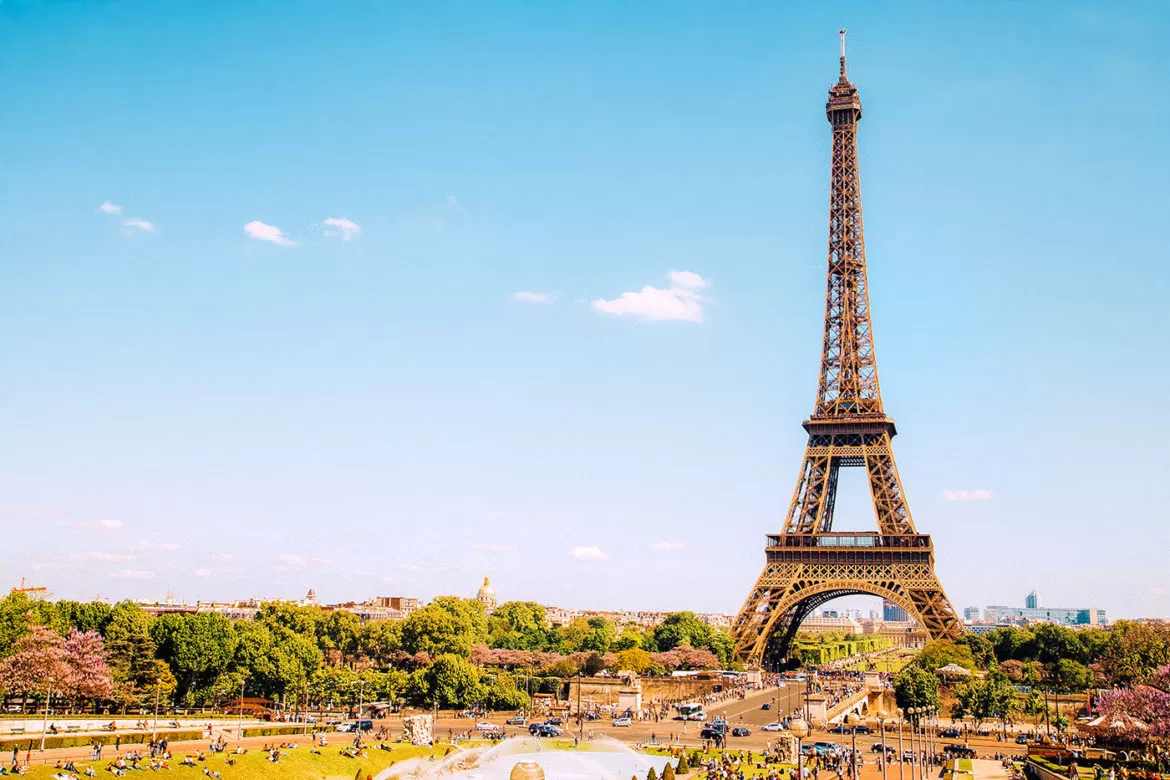

Order your petit-déjeuner (breakfast) or buy your billets (tickets) to the Louvre all in French! Here are the most useful French phrases for travel you need to know.
Learning some French will offer you further insight into the French culture, mentality, and way of life. The ability to speak even un peu français (a little bit of French) and avoid making these French faux pas will enhance your travel experience and open the doors to unique connections with the locals.
France is the world’s top tourist destination, attracting more than 79,5 million visitors a year! That’s why French is the next language in my travel phrase guide series.
Not only that, but speaking French also comes in handy when travelling to Africa, Switzerland, Canada , Monaco, French Polynesia, the Seychelles amongst other places.
Why else should you learn French? Well, it makes learning other languages, especially Romance languages like Spanish , Italian , Portuguese and Romanian much easier.
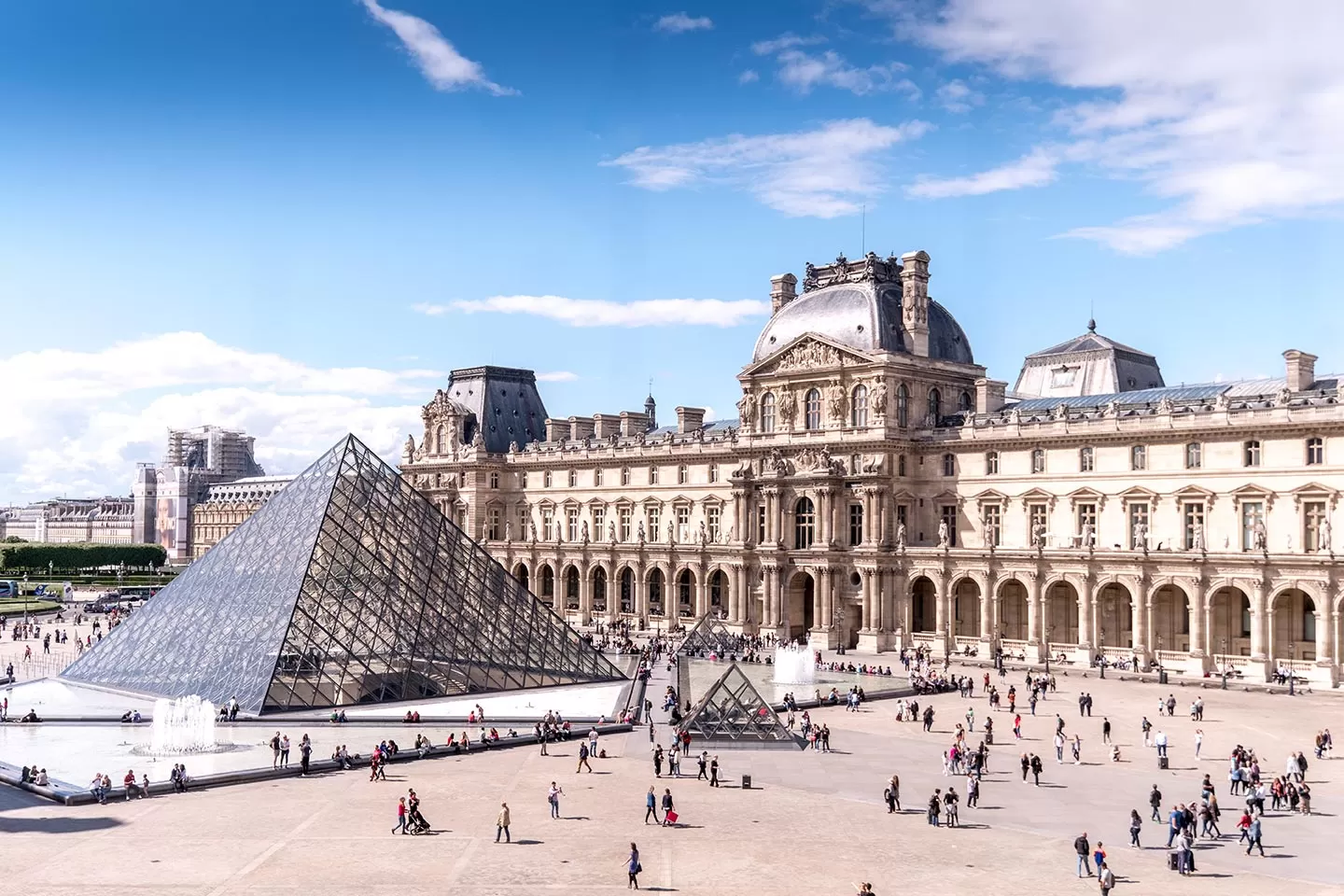
Want to have fun whilst learning French? Struggling to find decent French language resources? I recommend getting uTalk . Available as a desktop site and app, uTalk is awesome for learning key words and phrases in French especially if you want to use it for travel purposes. It’s great for beginners getting started in a language and invaluable for intermediates looking to fill in gaps in their vocabulary and pronunciation.
What I love most about uTalk is that you can jump around their extensive library of topics and choose what you want to learn, when you want, and at your own pace. Because I believe in uTalk so much, I reached out to them and we’ve teamed up to offer you an exclusive 30% OFF reader discount across all of uTalk’s 140 languages! This offer isn’t available anywhere else! Click here to claim your exclusive 30% discount.
Let’s take a quick look at the French language so you’re a bit more clued up on its origin, use, and vocabulary.
I hope you enjoy this post as much as I enjoyed bringing it together. If you have any requests for other languages, let me know in the comments section!
Where is French spoken?
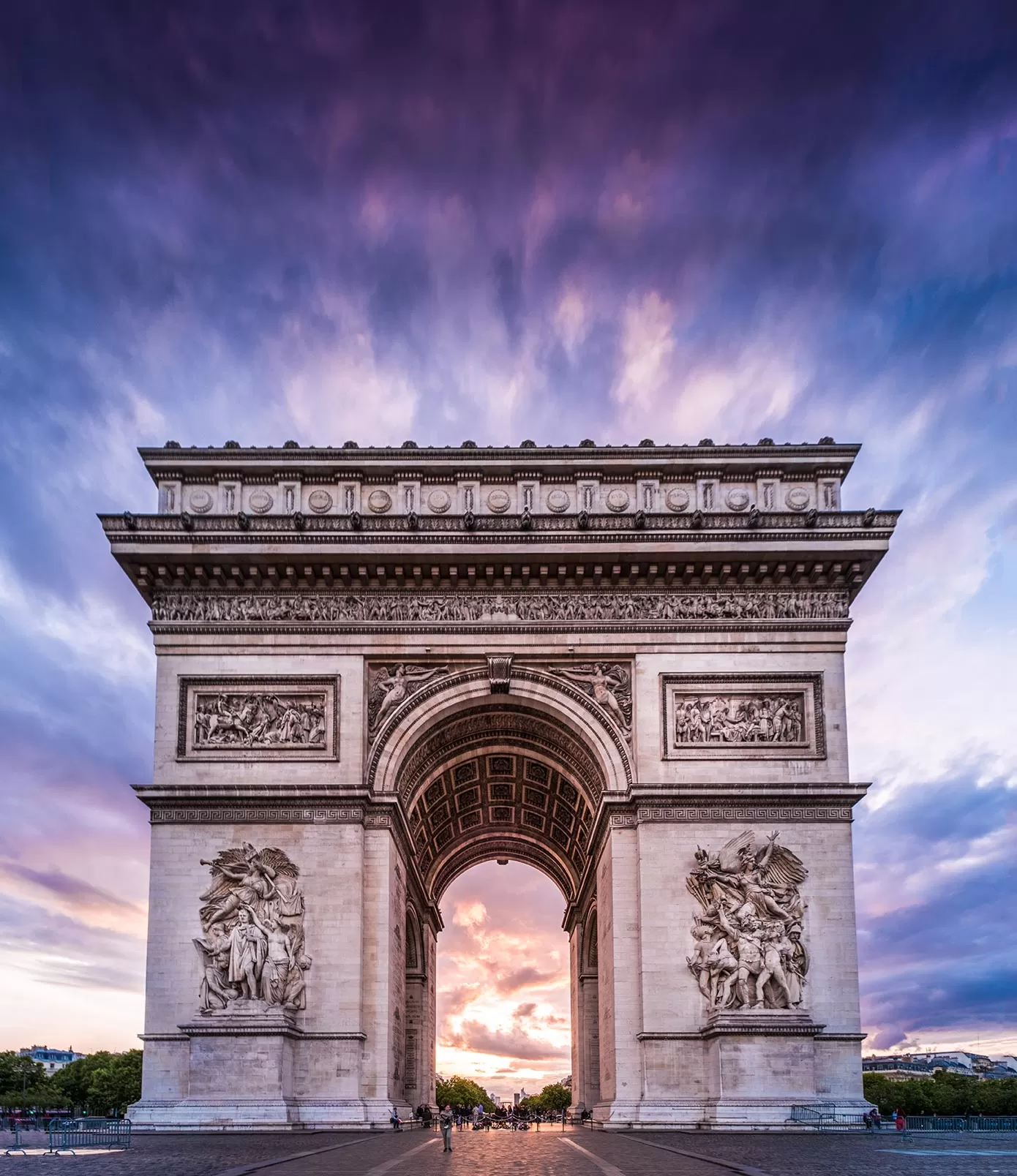
That’s a lot of Bonjour -ing!
French is the third most spoken language in Europe, after German and English and has official-language status in 29 countries, including: Belgium , Benin, Burkina Faso, Burundi, Cameroon, Canada , Chad, the Ivory Coast, the Democratic Republic of the Congo, Djibouti, Equatorial Guinea, France , Haiti, Luxembourg, Madagascar, Mali, Monaco, Niger, Rwanda, Senegal, Seychelles, Switzerland , Togo and Vanuatu. French is even one of six official languages of the United Nations.
It seems like nearly everyone wants to learn French, it’s the only language, alongside English, that is taught in every country in the world!
And the best way to learn it? Well, France operates the biggest international network of cultural institutes, which run French-language courses close to a million learners. My two favourite ways to learn French is by attending language classes – so I’m not only held accountable but also for the social aspect – and going on language holiday too!
A Brief History of the French Language
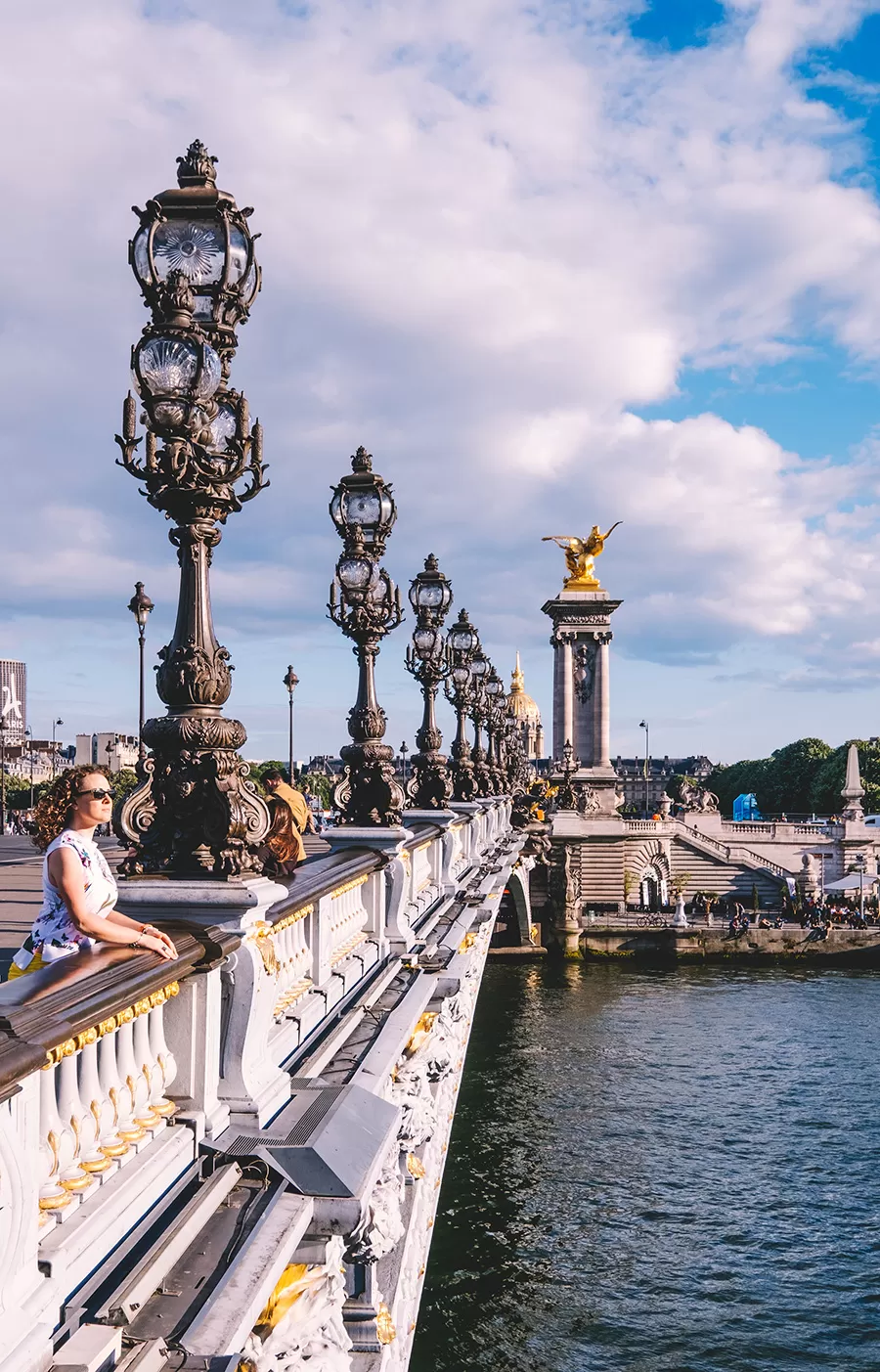
The French and English languages have a pretty mixed-up history. Following the Norman Conquest of 1066, Norman French was adopted as the language of power on the British Isles.
For the next 400 years, French was the language of the nobility and of most official documents. King Henry V put a stop to that when he went to war with France, but because the two languages existed in parallel for so long, the English language is peppered with words of French origin, many of which can be traced back to French roots. This means that you actually already know a lot of French, even if you don’t think you do.
Now for the tricky stuff!
French Pronunciation Tips
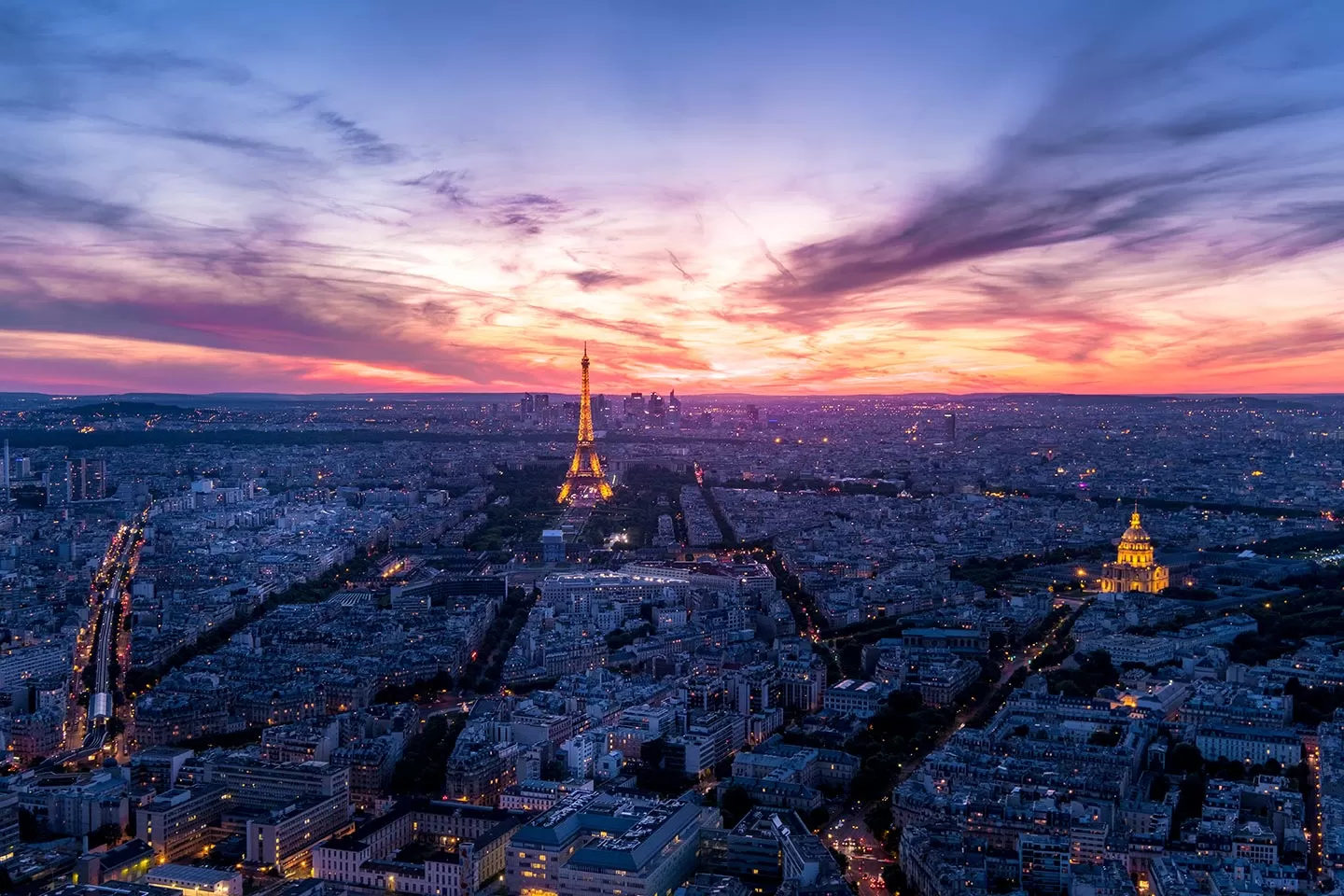
There is a total of 26 letters in the French alphabet. Standard French contains 13 oral vowels and up to 4 nasal vowels, but there are 5 additional accented letters that can be applied to change the sound of a letter.
Here are some helpful pronunciation tips:
Using Liaisons
One of the fundamental rules of pronouncing French (and many other Latin-based languages) is that everything has to flow. That’s one of the reasons why French sounds so beautiful.
If you’re speaking French correctly, everything should sound like a continuous melody.
That’s where liaisons come in.
Liaisons are a phonetic link between two words that may sound awkward if left unconnected.
Let’s take a look at some examples where they are used when speaking:
- After pronouns e.g. vous avez sounds like vooz-ah-vey not voo ah-vey
- Numbers and nouns e.g. deux amis sounds like derz-ah-mee not der ah-me
- One syllable prepositions e.g chez eux sounds like shez-uur not sheh uur
And liaisons that are forbidden when speaking:
- When using full names e.g.
- After et (and)
Liaisons may seem complicated at first, but they will become easier the more you listen to spoken French. After a while, you’ll automatically be able to notice where a liaison is needed (and where it isn’t) and how to make it sound natural when speaking.
What Not to Pronounce in French
Much like English, the French language isn’t written phonetically. The same sound can be represented by several different combinations of letters, and there are many cases of silent French letters. Two of the most well known are the silent “e” and the silent “h.”
The Silent “e”
The letter “e” is often silent in French, especially at the end of a word. Here are some examples:
Rue (road/street) is pronounced roo not roo-ee and inacceptable (unacceptable) is pronounced an-ah-sep-tah-bil not an-ah-sep-tah-ble
Of course, there are exceptions when it comes to masculine and feminine adjectives and nouns.
In the case of feminine adjectives and nouns, this typically means that the final consonant of the masculine form will now be pronounced. So, the masculine ouvert , meaning open in the masculine form and pronounced oo-ver , will become ouverte in the feminine form and pronounced oo-vert . The ‘ e ’ makes the final letter sounded.
The Final Consonant
As you’ve probably already noticed, there are a tonne of French letters that simply aren’t pronounced at the end of words. Don’t worry, you’ll get used to it!
In French, silent letters, or lettres muettes , have rules and exceptions just like many other linguistic concepts.
In general, the final consonants of a word are usually silent in French except in some cases of the letters c, f, l or r .
Just remember this simple rule, the consonants in the word ‘ careful ’ are always pronounced.
For example,
Avec (with) is pronounced ah-ve k
Cinq (five) is pronounced saan k
Hiver (winter) is pronounced ee-ve r
The general rule regarding French word endings is that when in doubt, you probably don’t pronounce it. But, French is full of exceptions!
The Infamous “r”
For many English speakers, the French “r” can be a source of frustration. To pronounce it, you’ll need to use your throat and imagine you’re trying to gargle. The French “r” is pronounced in the same place as the English “k”, but with your throat closed.
The Silent “h”
As you’ve probably noticed from every French speaker’s failed attempt to say the word “hamburger” in English, the “h” in French is a silent letter no matter where it’s located in a word.
The only exception to this is when the preceding letter is “c,” in which case the “ch” combination makes a “sh” sound or “k” sound.
Here are a few examples of the silent “h”:
Le haricot vert (French bean) is pronounced leh ah-ree-coh ver
Huit (eight) is pronounced weet
Hiver (winter) is pronounced ee-ver
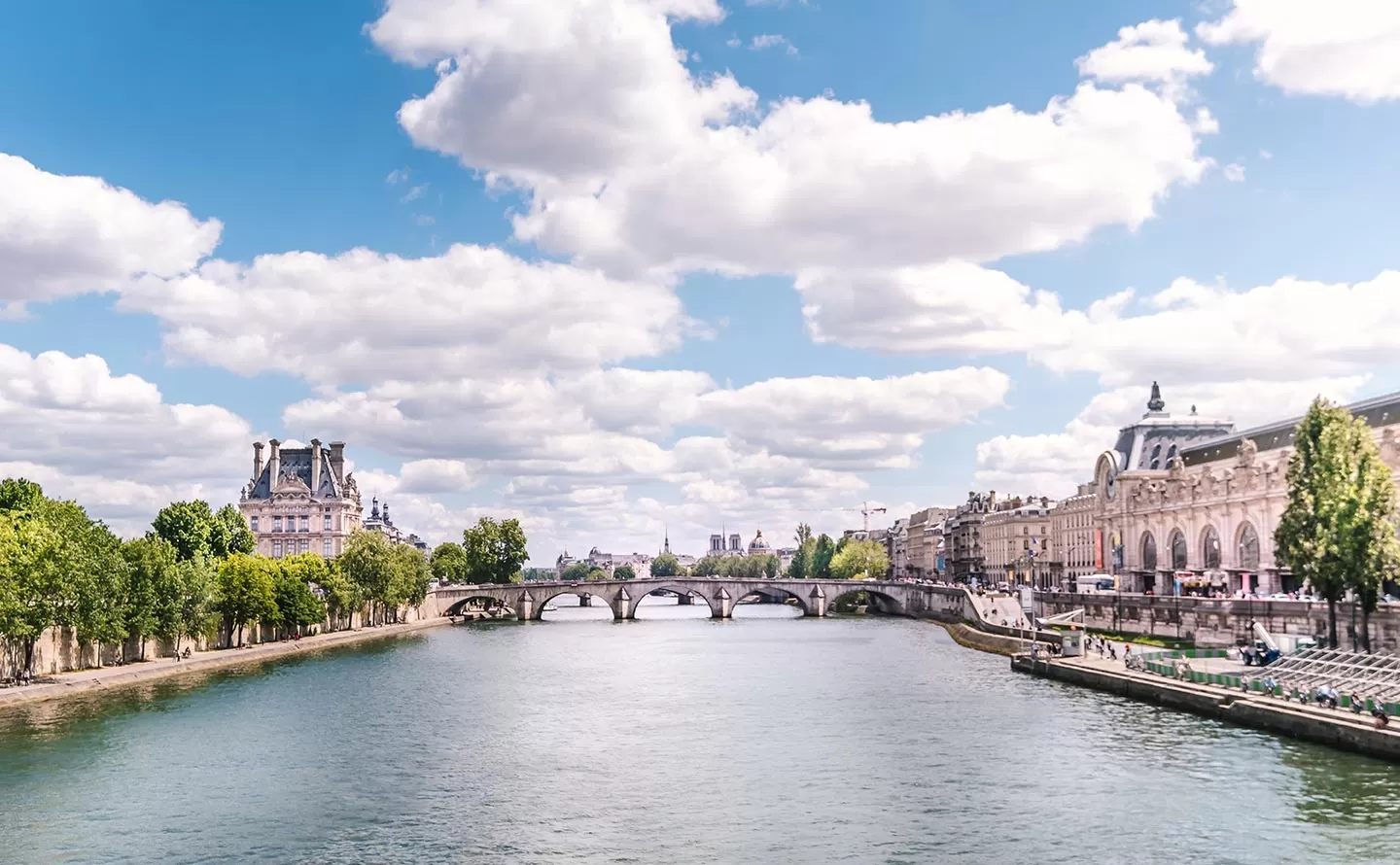
Admittedly there are a few finicky grammar rules to learn, but generally speaking, English grammar corresponds relatively closely to French grammar.
Consider words in English that end with – ible and -able , these are the same in French, only the pronunciation changes. So, the French word ‘possible’ sounds like poss-ee-bleh and ‘comfortable’ becomes kom-for-tah-bleh .
Then we have English words ending in -ent and -ant which also come from French and have the same spelling and the same meaning. So, the word, différent sounds like diff-er-ohnt and important sounds like ahm-poor-tahnt . The ‘t’ at the end is just slightly sounded.
Had enough? Ok, one more! Words in English ending in -ary l ike contrary become -aire in French. So, ‘contrary’ becomes contraire and sounds like kon-trair .
There are so many rules like this, so you can see just how easy learning French can be.
Here are top 10 French Italian Phrases for Travel You SHOULD Know [& How to Use Them]
Top french phrases for travellers.
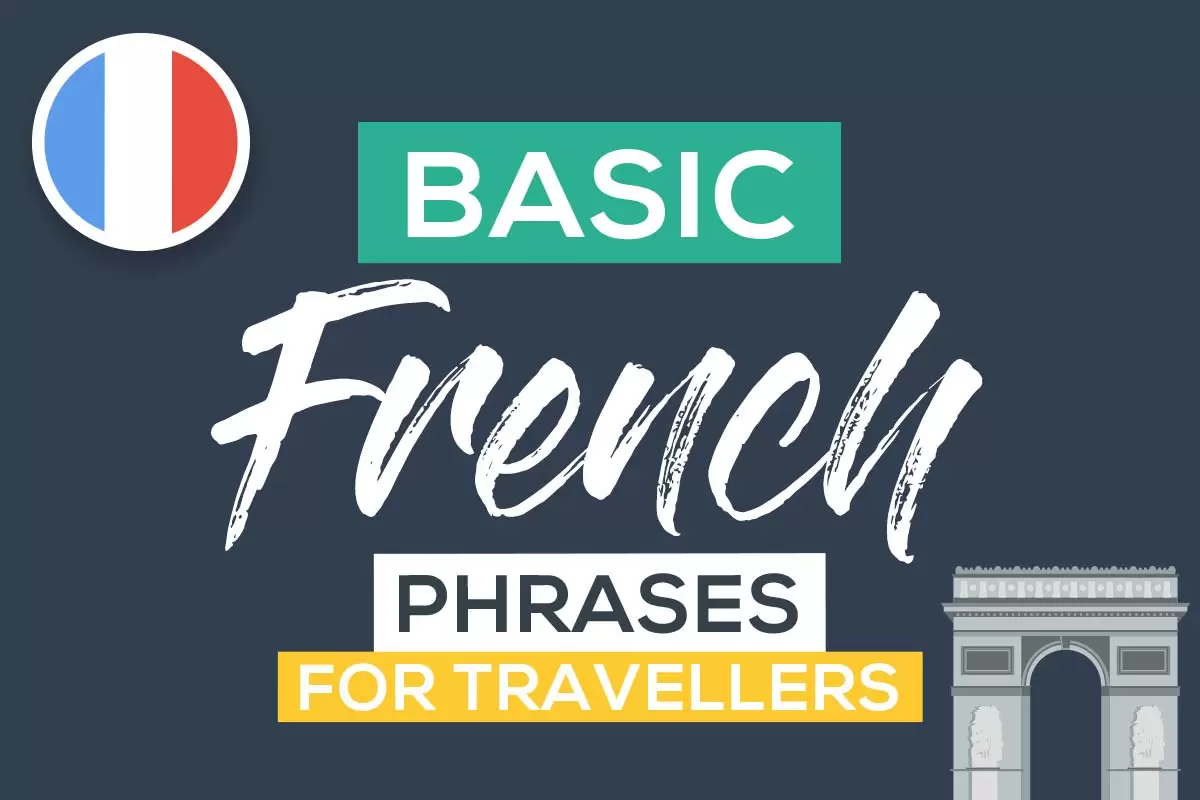
Want the infographic to take with you? Scroll to the bottom of the page.
Greetings Essentials Questions Eating Out Getting Around Numbers Days Emergencies
**There are a few places that use unique words for the numbers 70 ( septante ) and 90 ( nonante ), such as Belgium and Switzerland. With the numbers 80 to 89, combine the number 4, the number 20, and the ones.
For example, in French 80 is four 20s, 81 is four 20s plus 1, and so forth. (Unlike most French-speaking countries, Switzerland actually has a word for the number 80. It’s huitante .)
Want more? Learn French with me, with Intrepid French!
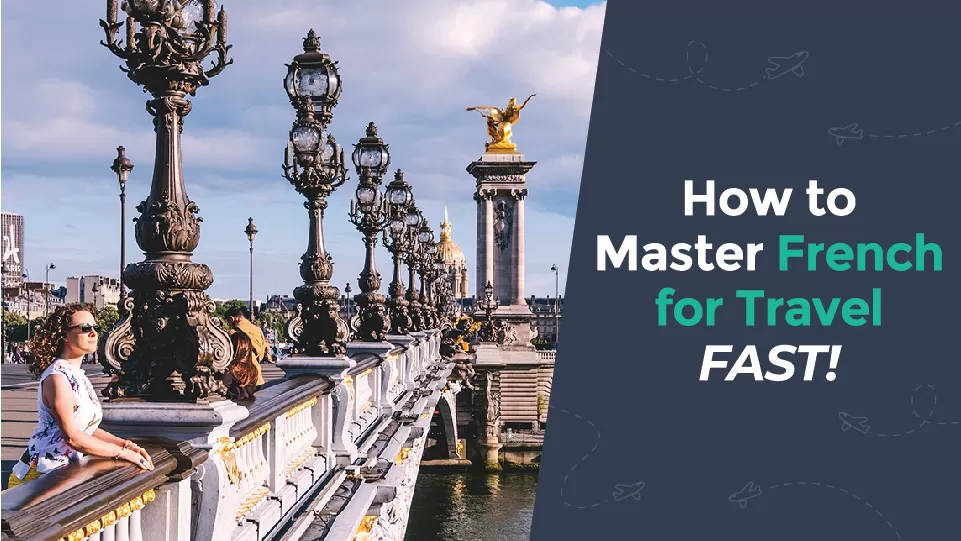
Travelling to France? Don’t be treated like a tourist! Live your best travel experiences and learn France for less than the cost of eating at a tourist trap restaurant or a taxi driver who has “taken you for a ride”. In addition to my free French travel phrase guide , I’ve made it even easier for you to master the French language so you can create lifelong memories as you mingle with locals , get local tips , avoid tourist traps , and make new friends . Join my popular French course here.
Here’s what my students are saying:

Loved it, loved it, loved it. I’ve been trying to learn languages using various language learning apps for years now and although I know random words I feel no more confident in actually speaking the language than I was when I started.” – Basil Pereira
Click here more details and get instant access!
Have a laugh with these funny French expressions
Like it? Pin or download this French travel phrase guide

Like it? Pin it for later!
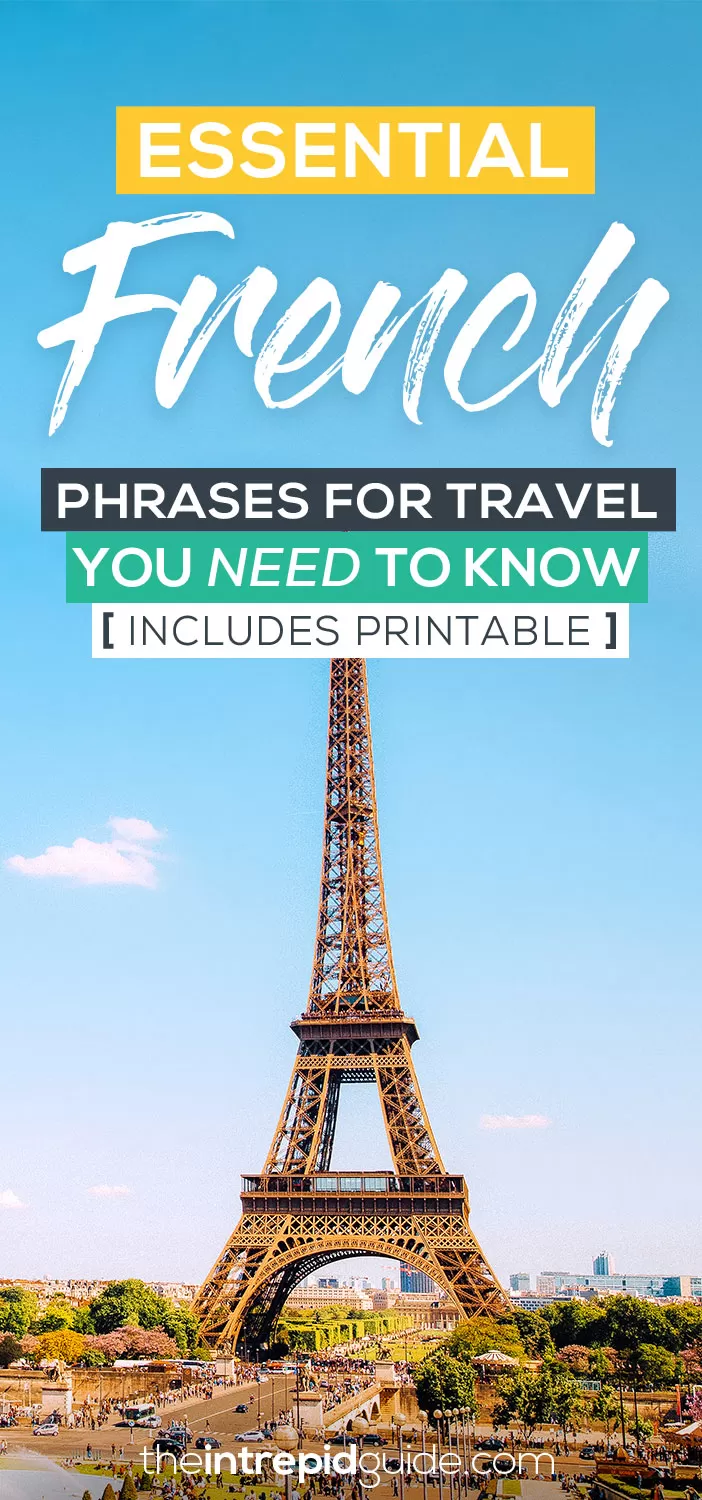
Learning French? Check out these French language guides
- Top 10 French Phrases You Should NEVER Say [& What to Use Instead]
- How to Sound More French: Top 10 French Phrases the French Love Saying
- How a ‘potato’ improved my French pronunciation
- 25 Funny French Idioms Translated Literally
- 22 Most Common French Grammar Mistakes [& How to Avoid Them]
Want to know more about learning languages? Start here!
- 6 Language Learning Tips: How to Learn a Language from Home
- What Type of Language Learner Are You? Your 4-Step Personalised Learning Plan
- 15 Top Language Learning Resources You Should Use
- 44 Best Movies on Disney Plus for Learning Languages
- 13 Ways to Seamlessly Integrate Language Learning into Your Daily Life
- 10 Pro Tips: How to Learn a Language with a Full-Time Job
- 7 Reasons Why You Should Go on a Language Holiday
- Essential Travel Phrases: How to be Travel Fluent in 10 Simple Steps
- 23 Cool Gift for Language Learners They Will Actually Use and Love
- How to Learn Your First Foreign Language in 8 Simple Steps: A Beginner’s Guide
- 11 Life-Changing Reasons Why You Should Learn a Language
- 42 beautiful Inspirational Quotes for Language Learners
- Language learning tips: 11 Polyglots Reveal The Secrets of Their Success
- Top 10 Best Ways to Learn a Language Better and Faster
- How Many Languages are there in the World?
Don’t miss my France Travel Guides
- How to Spend 4 Days in Paris: Ultimate First Timer’s Guide to Paris
- Where to Stay in Paris: A Fairytale Stay at Hotel Trianon Rive Gauche [Hotel Review]
- Where to Stay in Paris: A Decadent Stay at Hôtel Thérèse [Hotel Review]
Over to you!
Which of these French phrases are the most useful? What other languages would you like a travel phrase guide for? Have you been to a French-speaking country? Let me know using the comments section below or join me on social media to start a conversation.
Thanks for reading and I hope you enjoyed this post.
Like what you see? Subscribe using the form below to have all of my posts delivered directly to your email.
Success! Now check your email to confirm your subscription.
There was an error submitting your subscription. Please try again.
Get my best language and travel tips FREE by email...
Subscribe to my newsletter to receive detailed travel guides, exclusive travel and language learning tips, priority access to giveaways and more!
I will never give away, trade or sell your email address. You can unsubscribe at any time.
Michele creates language learning guides and courses for travel. What separates her from other instructors is her ability to explain complex grammar in a no-nonsense, straightforward manner using her unique 80/20 method. Get her free guide 9 reasons you’re not fluent…YET & how to fix it! Planning a trip? Learn the local language with her 80/20 method for less than the cost of eating at a tourist trap restaurant Start learning today!
Blond or Blonde: Why Does Grammatical Gender in English Still Exist?
How to sound more french: top 10 french phrases you should use.
This is great. I took years of French when in school, 40-years ago and now want to re-learn and be able to get by when traveling. Merci
Hi! (Sorry for the Failures, I don’t speak english very well because I am french) My Name is Salomé and I am from France. I felt random on your Website and I watched you tables and the picture called ” French travel Cheat sheet “. What you’re doing is awesome because you help people open us to the World. I am proud of what you do. I want to help because I am a native speaker of French not of all the French (Canada, Belgium..) but from France. Salomé
Hey Michele, love the article, love the guide. I think there are some mistakes on the French spelling and pronuciation for the word Right.
Right =droite drrrwa (with the funny r for the French). Apart from that, what a precious website!! Well done!
Hi Monique, thank you for correcting this typo, I’ve just fixed it now 🙂
Hey Michele
This is so cool. Thanks for sharing it. I was I Paris about a month ago and these would have come in very handy. Keep up the good work.
Merci Au revour
Thanks Basil, I’m so glad you enjoyed this post. I hope you’ll find it useful for future travels in Francophone countries 🙂
Leave a Comment Cancel Reply
Save my name, email, and website in this browser for the next time I comment.
This site uses Akismet to reduce spam. Learn how your comment data is processed .
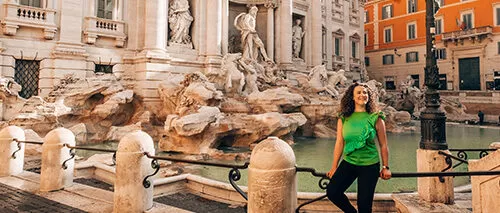
If you don't know where you are , how do you know where you're going? Find out how well you know Italian grammar today!

The Complete Guide: 30+ Basic French Phrases For Travel
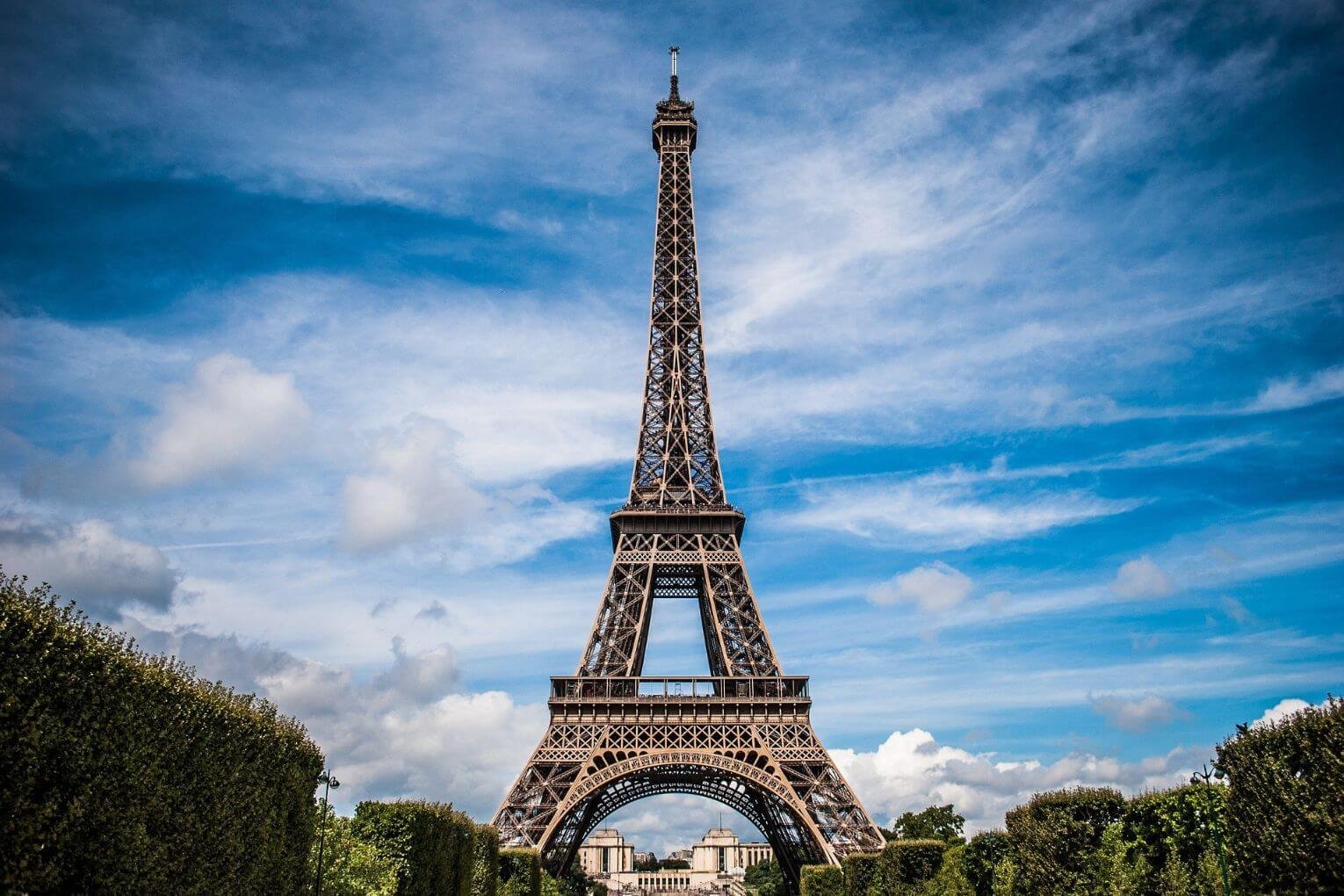
Affiliate Disclaimer: This post contains affiliate links. This means I will earn an affiliate commission if you click and/or make a purchase through the link (at no extra cost to you). And of course, I only recommend products I’ve used from companies I completely trust and love. For more information please see my disclosure .
What Are The Essential Words For Travel In French?
Traveling to France sounds like a dream, right? But the thought of not speaking French might feel overwhelming. Imagine walking through the charming streets of Paris, wanting to order a croissant or ask for directions but not knowing how.
Here's something comforting: you don't need to be fluent in French to make your way around France!
RELATED: Canadian French vs French: 13 Key Differences And Which Is Worth Learning?
A handful of basic French phrases can transform your travel experience from confusing to enjoyable. Whether it’s greeting someone with a "Bonjour" or asking "Parlez-vous anglais?" (Do you speak English?), these simple words will open doors for you.
This article is designed to equip you with essential French phrases that are easy to learn and absolutely crucial for any traveler heading to this beautiful country.
Get ready for an adventure!
Essential French Greetings And Polite Expressions
Starting your journey with some essential French greetings and polite expressions opens doors. It shows respect to the French people you meet along the way.
Bonjour (Hello)
Using "Bonjour" opens doors in France. It's the key to polite interaction with French people, a nod to their culture and language. Say it with a smile when entering shops or meeting someone new.
This simple gesture of respect sets a positive tone for what follows.
Practice this basic French greeting before your next trip. It helps break the ice and shows your willingness to engage with the local language, even if it's just a little bit of French you know.
You'll find that most native speakers appreciate the effort, often responding with patience and friendliness.
Keep "Bonjour" ready at all times during your journey in a French-speaking country. Whether asking for directions or starting a conversation, this essential word makes communication smoother and more enjoyable.
Excusez-Moi (Excuse me)
"Excusez-moi" stands as a polite phrase in the French language, essential for expressing apology or seeking attention. Mastering its pronunciation paves your way toward effective communication while traveling through French-speaking regions.
It shows respect and courtesy, characteristics highly regarded in French culture.
You might use "excusez-moi" to navigate crowded places, signal a waiter at a café, or initiate a conversation with locals. This phrase represents more than just words; it's an entry key to engaging with native French speakers smoothly.
Learning it demonstrates your willingness to embrace the nuances of the French language and culture.
Incorporating "excusez-moi" into your vocabulary enhances interactions during your journey. Whether you're shopping on the bustling streets of Paris or exploring the scenic views of the French Riviera, this phrase will surely come in handy time and again.
Its correct usage reflects politeness and helps build connections with new people you meet along your travels.
Merci (Thank you)
Using "Merci" shows your appreciation and is a key element of polite expression in French. It's crucial while navigating France, from charming cafes to bustling marketplaces. Just saying "Merci" can make interactions more pleasant, making it an essential word in your travel vocabulary.
It doesn't just convey gratitude; it opens doors to friendlier conversations and connections with locals.
Incorporate "Merci beaucoup" (Thank you very much) for added emphasis when someone goes out of their way to assist you. This small phrase greatly enhances the interaction, showcasing not just your manners but also your effort to engage respectfully in the local culture.
Whether you're buying a croissant or finding directions, this simple term is powerful in acknowledging others' help or kindness during your travels in France.
S’il vous plaît (Please)
Adding "s'il vous plaît" to your requests in French goes a long way in showing politeness. Whether you're asking for directions, the menu at a restaurant, or assistance in a shop, this phrase softens your request and shows respect for the person you're speaking to.
It's an essential part of everyday situations while traveling, making it one of the most useful phrases to have at your disposal.
Incorporating "s'il vous plaît" when expressing desires or needs helps bridge the language gap with kindness.
For instance, if you wish to place an order, simply starting with "Je voudrais.. s’il vous plaît" translates into "I would like.. please," which is polite and much appreciated by French speakers.
Always keep in mind that incorporating these fundamental phrases into conversations can enrich interactions, leading to a more seamless and pleasant experience.
Au Revoir (Goodbye)
Learning to say "au revoir" is your key to parting on a good note in any French-speaking country. This essential word lets you exit conversations gracefully and shows respect towards the person you're speaking with.
Its correct pronunciation, as outlined in our guide, ensures you sound like a native speaker, making your farewell more heartfelt.
Including "au revoir" at the end of your interaction not only marks the conversation's closure but also leaves a lasting impression. It reflects an understanding and appreciation for French customs, adding depth to your cultural experience while traveling.
Use this phrase when leaving shops, restaurants, or bidding farewell to new friends made on your journey.
"Traveling to France sounds like a dream. But the thought of not speaking French might feel overwhelming. A handful of basic French phrases can transform your travel experience from confusing to enjoyable. Imagine walking through the streets of Paris with ease." - @sololingual
CLICK TO TWEET
Basic French Phrases To Introduce Yourself
Meeting new people in France gets easier when you know how to introduce yourself. Starting conversations with basic French phrases can open doors to exciting exchanges.
Je ne parle pas Francais (I do not speak French)
Saying "Je ne parle pas Francais" is a key phrase for any traveler. It's honest and direct, showing that you don't speak French. This phrase helps set expectations right away. Use it to encourage people to switch to English if they can.
It’s a polite way of acknowledging your limitations while making an effort to communicate.
After you say this, try following up with “Parlez-vous Anglais?” which asks if the person speaks English. This opens up the possibility of finding a common language to communicate in.
Remember, making an attempt at the local language shows respect and can lead to more helpful interactions during your travels.
Parlez-vous Anglais? (Do you speak English?)
Asking "Parlez-vous anglais?" is a key phrase for any traveler in France. It facilitates communication, particularly if you're not fluent in French.
This question can be your lifeline, allowing you to find someone who speaks English and can help you navigate through various situations, from ordering at a restaurant to finding your way around.
Learning this phrase and other essential French travel phrases greatly enhances your vacation experience. It shows respect for the local language and culture while also making practical aspects of your trip smoother.
Whether it's asking for directions or seeking clarification on something you don't understand, knowing how to ask if someone speaks English is invaluable.
Always aim to pronounce it as clearly as possible, and remember that most people appreciate the effort you put into speaking their native language, even if it's just a few words.
Je ne comprends pas (I do not understand)
After asking if someone speaks English, you may still encounter situations where the conversation isn’t clear. In such instances, knowing how to say "Je ne comprends pas" can be a lifesaver.
This phrase opens up an avenue for clearer communication and signals to the other person that you need further clarification or a slower pace in speaking.
Using "Je ne comprends pas" effectively bridges gaps in understanding and fosters patience from those you're interacting with. It's not just about expressing confusion; it’s also showing willingness to learn and engage despite language barriers.
This essential phrase is your tool for navigating conversations smoothly, ensuring you remain respectful and considerate in your attempts to communicate.
Pourriez-vous répéter, s’il vous plaît? (Could you repeat, please?)
Learning the phrase "Pourriez-vous répéter, s’il vous plaît?" is a game-changer for travelers. It lets you politely ask someone to repeat what they just said. This comes in handy when you miss or don't understand something important.
Always use it with a smile, showing respect and eagerness to learn.
This phrase is crucial in a multitude of scenarios. You might be asking for directions, trying out new French cuisine, or engaging in small talk. Not catching every word can lead to confusion or missed opportunities.
Requesting repetition helps bridge that gap, making your travel experience smoother and more enjoyable.
Using this phrase also shows native French speakers that you're putting effort into communicating properly. They often appreciate the attempt and are usually happy to slow down or clarify things for you.
So next time you find yourself puzzled by a conversation, remember this key phrase – it could save the day!
Je m'appelle (My name is)
After mastering how to ask someone to repeat themselves, the next step is sharing who you are. Saying "Je m'appelle" followed by your name is a fantastic way to begin interactions in French-speaking countries.
This phrase helps break the ice and fosters a more personal connection right from the start.
Using "Je m'appelle" not only introduces you but also opens up the opportunity for others to share their names, creating an immediate sense of familiarity. It's essential when meeting new people, whether you're navigating through France or engaging with French speakers anywhere else in the world.
This basic yet powerful introduction can pave the way for richer conversations and deeper cultural experiences on your travels.
French Phrases For Directions And Transportation
Navigating through France becomes easier when you know the right phrases to ask for directions. Whether it’s catching a bus or finding the nearest train station, mastering these terms will make your journey easier.
Gauche (Left)
Mastering the word "gauche" is crucial for getting around in France. If you're looking for directions, knowing how to say "left" can unveil the city's path for you. For instance, when someone tells you, "Tournez à gauche," they're guiding you to turn left.
This phrase becomes your key to exploring more without confusion.
Saying "À gauche" points out that something is on your left side. Imagine walking down a picturesque street in Paris and asking where the famous museum is. You might hear, “Le musée est à gauche.” Now, you know it's on your left.
And if you’re riding a bus and hoping to get off at just the right spot, remember that “À gauche du bus” means on the left side of the bus. With these phrases in your pocket, navigating through French cities feels less daunting and more like an adventure waiting at every turn or twist—literally!
Droite (Right)
Understanding the word "droite" in French can make a huge difference when you're trying to navigate through cities or find specific locations. It simply means "right," as opposed to "gauche," which means left.
If you hear someone say, "Tournez à droite après le café," they’re instructing you to turn right after the café. This phrase is key for smoothly getting around and reaching your destinations without too many detours.
You'll often use “droite” combined with other basic French travel phrases, like “Où est la gare?” (Where is the train station?) or “Où se trouve l'hôtel?” (Where is the hotel?).
Knowing how to follow directions that include “à droite” ensures you won't miss important turns or landmarks on your journey. Plus, it adds a great deal of confidence to your travels, knowing you can understand and apply these essential words effectively.
Tout Droit (Direct/Straight)
Knowing how to say "direct" or "straight" in French, which is “tout droit”, can save you a lot of time while navigating the streets of France. If someone tells you to go “tout droit,” you're being instructed to head straight ahead without turning.
This simple direction could lead you directly to your destination, making it an essential phrase for travelers.
Asking for directions is a common need, and adding “tout droit” into your vocabulary enhances your ability to follow instructions through towns and cities. It seamlessly connects with related keywords like "gauche" (left), "droite" (right), and different destination terms, establishing coherent routes for exploration.
Use it when you’re unsure if your path involves turns or detours; more often than not, a helpful local will guide you with this straightforward direction.
Où est…?(Where is…?)
Navigating through France becomes much easier when you know how to ask for directions using the phrase "Où est…?" (Where is…?). This simple question can lead you to vital places like train stations, bus stops, or your hotel.
Making use of this phrase along with polite words such as "Excusez-moi" (excuse me) and adding a "S’il vous plaît" (please) at the end shows respect and often leads to more helpful responses from locals.
Learning essential French phrases before your trip offers numerous benefits. Not only does it demonstrate respect for the culture, but it also enhances your travel experience by making interactions smoother.
Asking "Où est la gare?" helps you find the train station quickly, proving itself as one of the most useful French phrases in your toolkit.
Remembering to approach people politely increases the chances they'll take time to assist you, making navigation through bustling French cities a breeze and enriching your adventure in exploring new places.
Ou se trouve (Where is)
"Ou se trouve" plays a crucial role in getting around French-speaking countries. This phrase is your key to finding transportation options like bus stops, train stations, or taxi stands.
Being prepared with this question will boost your confidence as you navigate cities and towns. You can ask locals for directions without much hassle, making your travel experience smoother.
Using "Ou se trouve" also helps in locating landmarks and points of interest that are essential to your visit. It opens the door to exploring hidden gems and popular spots alike by simply asking for their whereabouts.
This simple yet powerful question is an indispensable part of any traveler's vocabulary, ensuring that you're never lost or too far from your next destination.
Practice saying "Ou se trouve" before you embark on your journey. Familiarity with this phrase not only facilitates in getting around but also enriches your travel experience by fostering interactions with locals.
Whether it's finding the nearest metro station or discovering a quaint café tucked away on a cobblestone street, mastering this phrase makes exploration effortless and enjoyable.
Le train (The train)
Traveling by train in France can be a great way to see the country. The trains are fast, punctual, and connect almost every major city and many smaller towns. You'll find it helpful to know phrases like “Où est la gare?” which means "Where is the train station?" This question is essential because knowing where the station is will help you plan your journey effectively.
Buying your ticket might require another key phrase: “Je voudrais un billet pour…” followed by your destination, which translates as "I would like a ticket to…”. It’s a straightforward way to get what you need without confusion.
Also, asking for schedules by saying "Quel est l'horaire du train?" which translates as "What is the train schedule?" keeps you informed about departure and arrival times.
Navigating through French stations becomes easier when you understand signs indicating platforms (“Quai”) and track numbers (“Voie”). So before boarding, ensure you're heading towards the right platform for a smooth travel experience across this great place known for its efficient rail service.
L’aeroport (The airport)
Navigating through an airport in a French-speaking country can be stress-free if you know some key phrases. Start with "Où se trouve la sortie?" when you're looking for the exit or ask "Où est la gare?" to find the train station.
If you need a taxi, simply say "Un taxi, s'il vous plaît." Purchasing tickets also becomes easier when you use phrases like "Un billet pour le train," ensuring that your transportation needs are met without confusion.
At the check-in counter or security, being familiar with basic inquiries can smooth over many of the typical travel hiccups. Saying "Je voudrais" followed by what you require helps in getting assistance or finding facilities like restrooms and eateries.
For navigating to your gate or understanding airport announcements, phrases such as "La navette" for shuttle services make it simpler to move around. This array of helpful French phrases enriches your experience at l’aeroport, making it a pleasant start or end to your journey.
Le bus (The bus)
Traveling by bus in French-speaking countries becomes easier when you know how to ask about the bus schedule and directions. Use "Quel est l'horaire du bus?" to inquire about the bus timetable.
If you need to find the bus stop, simply ask, "Où est l'arrêt de bus?" Having these phrases handy ensures you never miss your ride and navigate public transportation like a pro.
Purchasing a ticket requires another set of expressions. Say "Je voudrais acheter un billet de bus," which means "I would like to buy a bus ticket." When unsure about where your destination is or which bus route to take, asking "Ce bus va-t-il à [your destination]?" helps clarify whether you're on the right track.
Mastering these common french phrases makes using buses across France and other francophone regions less daunting and more enjoyable.

French Phrases For Food And Dining
Exploring France means diving into a world of exquisite flavors and culinary wonders. Mastering a few basic French phrases for food and dining will elevate your experience, allowing you to savor each meal like a local.
Je voudrais (I would like)
"Je voudrais" opens many doors while you're dining in France. This phrase, translating to "I would like," is your best friend in restaurants or cafes. Say it with confidence before ordering your meal or a cup of coffee.
Knowing this key expression helps you share your preferences and desires clearly.
Mastering the art of explaining dietary restrictions is crucial too. For instance, if you are vegetarian, saying “Je ne peux pas manger de…” followed by what you can't eat makes your dining experience smoother and enjoyable.
It’s a great way to ensure that your food adventures align with your dietary needs without any hiccups.
Moving on, understanding how to request the bill in French will make ending meals just as seamless as starting them.
Je prendrai (I will have)
Moving from expressing desires to making a definitive choice, "Je prendrai" becomes your go-to phrase. It's essential for confidently telling the waiter what you will have. This phrase shows that you've made up your mind and are ready to place your order.
Using "Je prendrai" at a restaurant not only helps you blend in but also ensures that your dining experience goes smoothly. It demonstrates a clear decision, removing any confusion and making it easier for the staff to serve you.
So next time, instead of just pointing at the menu, try saying "Je prendrai," followed by your choice; it's a simple yet effective way to practice the French language while enjoying fine dining in France or any French-speaking country.
L’addition (The bill)
After enjoying your meal and saying "Je prendrai (I will have)" when they take your dishes away, it’s time to ask for the bill. You simply say, "L’addition, s’il vous plaît" to let the server know you’re ready to pay.
This phrase is a key part of dining in any French-speaking country and shows both your respect for the language and cultural etiquette.
Requesting the bill accurately guarantees a seamless conclusion to your dining experience. It signals the staff that you're finished eating and would like to settle your bill. Keep in mind; credit cards are widely accepted in France, but always confirm if chip-and-pin is required.
Using this phrase confidently adds an authentic touch to your dining experience while practicing essential French words.
L’addition, s’il vous plaît (The bill, please)
Knowing "L’addition, s’il vous plaît" can enhance your dining experience in French-speaking countries. This polite phrase signals to the waitstaff that you're ready to pay for your meal.
It reflects good manners and shows respect for local customs. Using it correctly might even earn you a smile or an appreciative nod from the server.
In French restaurants, waiters usually do not bring the bill until you ask for it. This approach differs from many places where the check comes right after your last dish. So, after enjoying your delectable dishes or concluding a business dinner, saying "L'addition, s'il vous plaît" is the best way to indicate that you're ready to settle the account gracefully.
As we continue exploring essential phrases for navigating France's culinary scene, understanding how to express dietary preferences will be our next focus.
Une tasse (A cup)
Ordering a hot beverage in France? You'll likely need to use the phrase "une tasse" to ask for your drink. This term is essential if you enjoy starting your day with a cup of coffee or tea.
In a French café, simply start with “Je voudrais une tasse de..” followed by your preferred beverage. It's a straightforward way to ensure you get exactly what you're craving.
In dining situations, understanding how to request items like "une tasse" can enhance your experience and show respect for the local language and customs. Whether it's coffee, tea, or even hot chocolate, knowing this simple phrase can make ordering at any café smoother.
Plus, it adds an authentic touch to your adventures in France or any French-speaking country.
Un verre (A glass)
If you find yourself in a French café or restaurant, asking for "un verre" could be very useful. This phrase helps you request a glass of water or any other beverage that you might want to try.
Keep it handy, especially during meals or when you're just looking to quench your thirst on a warm day. It's a simple yet essential part of dining out in France.
Knowing how to say "un verre" also lets you specify what kind of drink you'd like by adding the name of the beverage afterwards. For instance, "un verre de vin" means a glass of wine, and "un verre d'eau" is a glass of water.
This way, you can easily navigate through your dining experiences without worrying about communication barriers. Utilize it with confidence the next time to elevate your pleasure when delving into French cuisine and culture.
Je suis vegetarien (I am vegetarian)
Navigating dining experiences in France becomes easier when you know how to express your dietary preferences.
Say "Je suis vegetarien" to let waiters know you are vegetarian. This simple phrase helps ensure that your meals align with your diet, making for a smoother and more enjoyable dining experience.
Using this sentence is a good idea when scanning the menu or asking about dish ingredients. French restaurants often accommodate vegetarians, but clear communication remains key.
Make sure to also learn phrases for specific foods you do not eat, like meat or fish, to avoid any mix-ups and enjoy delectable French cuisine worry-free.

French Phrases For Shopping
Combien ça coûte (how much does it cost).
Knowing how to ask “Combien ça coûte?” (How much does it cost?) in French is essential while shopping or dining. This phrase helps you manage your budget and ensures you're not caught off guard by the price of items or services.
Use it when picking souvenirs, ordering a delectable meal at a local bistro, or even negotiating prices at flea markets.
Prices can vary widely depending on where you are in France. For instance, dining out in the French capital might be pricier than in smaller towns. Always ask for "le menu" to get an idea of the costs before making your choice.
After learning this key phrase, practice it along with other common French words like bonjour (good morning) and merci (thank you). This will not just help you navigate shopping and dining experiences, but also enhance your journey with genuine and respectful interactions with locals.
Plus, mastering these phrases could make your trip smoother and more enjoyable.
Puis-je l’essayer (Can I try this)
After figuring out how much something costs, the next logical step is to see if it meets your expectations. "Puis-je l’essayer" becomes an indispensable phrase in this situation.
This question allows you to try on a piece of clothing or test out a product before making a purchase, ensuring it's just right for you. Asking to try something on not only helps you make informed decisions but also engages you more deeply with the local shopping experience.
Using this phrase shows respect for the shop's rules and demonstrates your effort to communicate in French, often leading to more helpful interactions with staff. It’s essential for making sure that what catches your eye fits well or works correctly, preventing any post-purchase regrets.
Whether browsing through boutiques or selecting souvenirs, confidently asking "Puis-je l’essayer?" can greatly enhance your shopping adventures abroad.
Le magasin (The store)
Navigating through French stores becomes much easier when you know how to say "le magasin." This phrase is your key to shopping in France or any French-speaking country. Use it to ask for directions, find what you're looking for, or strike up a conversation with locals about the best places to shop.
Knowing this term helps immerse you in the local culture and makes your shopping experience more enjoyable.
Ask for help or directions by saying “Où est le magasin?” if you're looking for a specific store. It's a simple question that can lead you to discover both hidden gems and popular shopping spots.
Don't hesitate to use it when exploring new areas. The phrase "le magasin" opens up a world of retail adventures, from quaint boutiques to grand department stores, enriching your travel experience with every purchase.
Je le prendrai (I will take it)
Shopping in France can be an exhilarating experience, especially when you find something you love. Say "Je le prendrai" to tell the store personnel that you've made your choice and will purchase the item.
This phrase is a clear, confident way to communicate your decision. It's far more decisive than just pointing or nodding and shows respect for the French language and culture.
Using "Je le prendrai" not only smooths out transactions but also minimizes confusion at the cash register. Imagine finding a souvenir that captures the essence of your trip or spotting fashion pieces unique to France; this phrase becomes indispensable.
It makes shopping more enjoyable, allowing you to immerse yourself fully in the local commerce scene without stumbling over complex language barriers.
Practice saying it before your trip—French pronunciation can be tricky with its silent letters and phonetic pronunciation nuances. Getting comfortable with this phrase helps ensure that when you're ready to make a purchase, there's no hesitation or misunderstanding between you and the seller.
You'll come across as polite and well-prepared—a win-win in any shopping scenario!

Basic French Phrases For Emergencies
When you're in a pinch or facing trouble abroad, knowing how to ask for help in French can be a lifesaver. These phrases will equip you to tackle urgent situations confidently and reach out for assistance when needed.
Pouvez-vous m’aider ? (Can you help me?)
Traveling can sometimes put you in tricky situations where you might require assistance. Asking "Pouvez-vous m’aider?" translates to saying "Can you help me?" in French, showing locals that you're reaching out respectfully and politely.
It's a key phrase that opens up opportunities for interaction, making it easier to navigate through unexpected challenges. Whether you've lost your way or need recommendations, this question is your go-to for initiating help from those around you.
Using polite phrases like "Pouvez-vous m'aider?" not only demonstrates good manners but also increases the likelihood of receiving the support you're looking for.
This approach reflects an understanding and appreciation of the local culture, which often leads to more meaningful exchanges with natives.
Où est l’ambassade américaine? (Where is the American Embassy?)
If you find yourself in a sticky situation or just need assistance while traveling in France, knowing how to ask for the American Embassy is crucial. The phrase "Où est l'ambassade américaine?" translates to "Where is the American Embassy?" in English.
This question can be a lifeline if you lose your passport, need legal help, or encounter any problems abroad.
You might approach a local or a police officer and start with a polite “Excusez-moi” before asking “Où est l’ambassade américaine?” Always remember to speak slowly and clearly.
Many French people understand English but appreciating their language by attempting to communicate in French goes a long way. It shows respect and effort on your part as you navigate through your journey, making it easier to get the help you need promptly.
What Is The Best Way To Learn French For Travel?
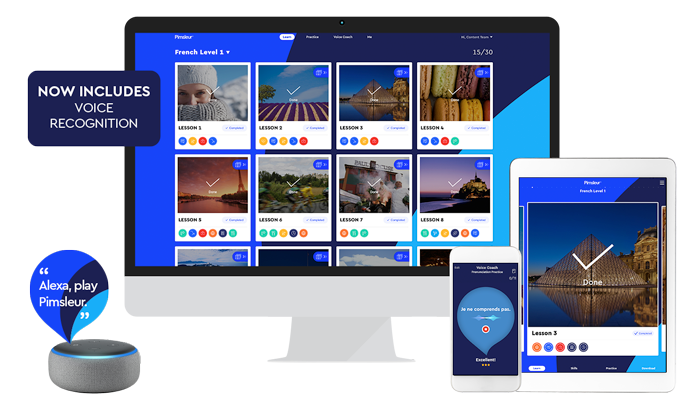
Pimsleur stands out as an exceptionally effective method for learning French, especially for travelers. Its unique approach emphasizes auditory learning and practical conversation skills, making it ideal for those preparing for real-world interactions.
The program is structured around the principle of graduated interval recall, which significantly enhances the retention of new vocabulary and phrases.
By focusing on listening and speaking rather than reading and writing, Pimsleur enables learners to quickly gain the confidence needed to engage in basic conversations.
RELATED: Pimsleur Review: How To Learn Any Language With This Super Easy Method .
This method is particularly beneficial for travelers, as it equips them with the essential language tools to navigate through France, from asking for directions to ordering food.
Additionally, Pimsleur's convenient audio format allows learners to study on the go, be it during a commute or while packing for their next adventure, making every moment a learning opportunity.
Start your 7-Day FREE Trial of Pimsleur French!

Learning basic French phrases greatly enhances your travel experience in France. These simple words and expressions open doors to richer interactions with locals. Mastering greetings, directions, dining, and shopping phrases is both easy and practical.
Remember, a little effort in learning a language can transform a good vacation into an unforgettable journey.
So pack your phrasebook alongside your adventurous spirit and embrace the beauty of France through its language!
A TINY REQUEST: IF YOU LIKED THIS POST, PLEASE SHARE THIS?
Ready to have some fun learning a new language? Then take action on what you just learned - you’ll be glad you did! Be a good friend and share this post on social media.
Also, share this post with anyone you know who’s looking to learn a foreign language! Just think how good you’ll feel when your friends thank you for bringing them insight and some surprising discoveries about language learning!
I know most people don’t share because they feel that us bloggers don’t need their “tiny” social share. But here’s the truth…
I built this blog piece by piece, one small share at a time, and will continue to do so. So thank you so much for your support, my reader.
A share from you would seriously help a lot with the growth of this blog.
Some great suggestions:
Pin it! (I even made a pretty pin for ya!)
Share it to Facebook
It won’t take more than 10 seconds of your time. The share buttons are right here.:)
Thank you so much!
So, here’s the question: When are you planning on traveling to France? Is there any phrase on this list that I missed? Let us know in the comments section down below!

P.S. I want to hear from you today. No for real, get out from behind that keyboard and tell us more about yourself! Use the comment section down below and introduce yourself.
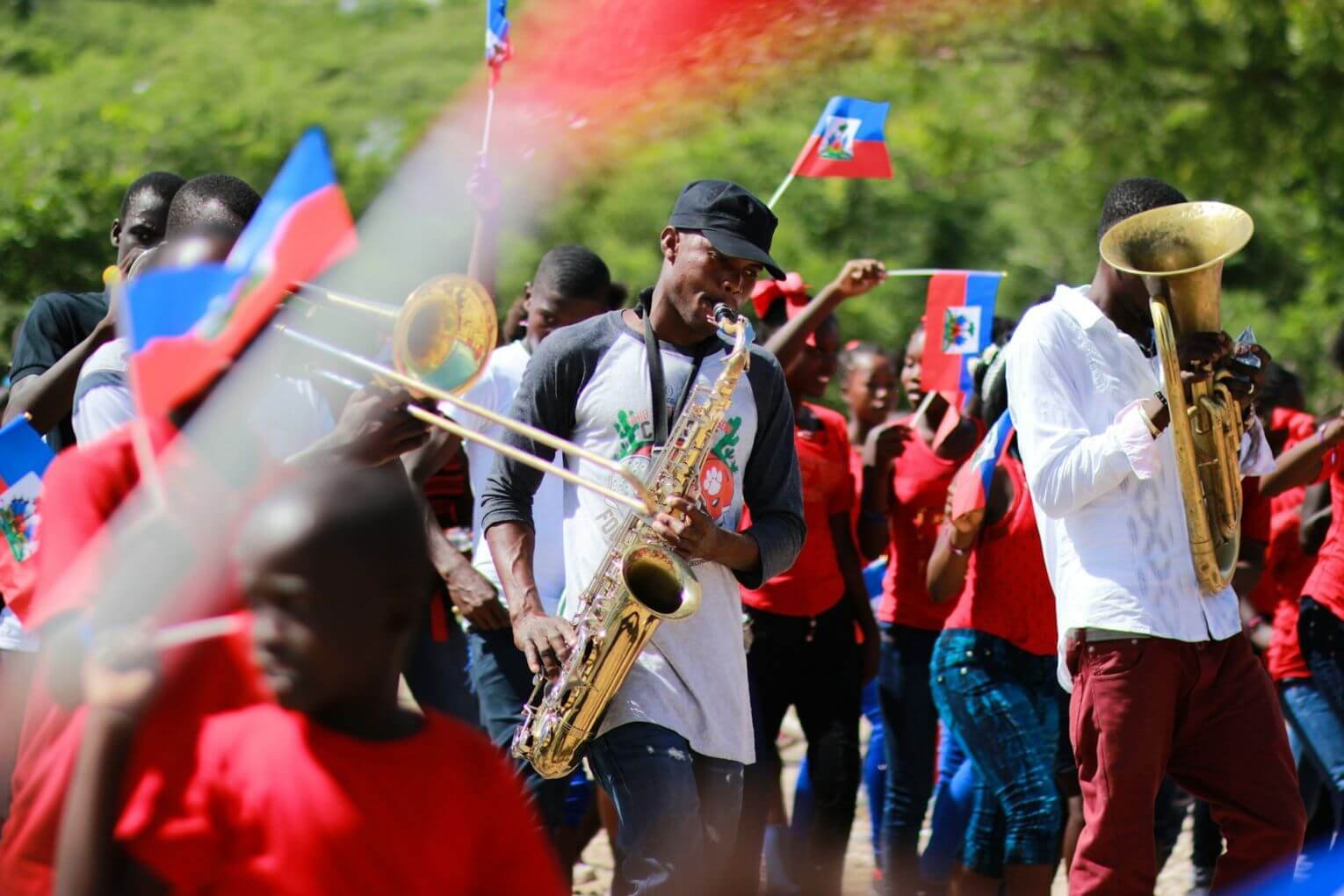
Hey, I’m Mara.
I am the founder and blogger of Sololingual helping anyone at any age, from any place, who wants to learn a new language. You can learn how to reach fluency in your chosen language fast, fun and easily studying a short amount each day and spending very little money using different language learning techniques, programs and resources at your disposal. Fluency isn't difficult to achieve. In fact, it’s easy when you find a solid method that walks you through every step of the way, and believing in yourself so that you can achieve your goal at becoming fluent in any language.
More About My Story >>

Search This Site:

20 Essential Haitian Creole Phrases Made Easy: A Beginner's Guide
Romantic spanish words: 50+ ways to express love in spanish.
Vocabulary Lesson: French for Travelers
Learn Common French Words You'll Use While Traveling
- Pronunciation & Conversation
- Resources For Teachers
Travelers to France and other countries where French is spoken will want to learn a few basic words in the local language. It will help you on your trip ( le voyage ) as you make your way around and speak to people.
In this French vocabulary lesson, you will learn how to ask for directions, navigate your transportation options and rent a car, avoid danger, and enjoy local shopping and dining during your stay. It is an introductory lesson and you will find links to other lessons so you can further your studies.
As a traveler ( voyageur ) , you may also want to brush up on French phrases required for politeness as well as a few that are essential and let people know that you are new to the language.
Have a good trip! ( Bon voyage ! )
Note: Many of the words below are linked to .wav files. Simply click on the link to listen to the pronunciation.
Getting Around and Asking for Directions
Whether you are roaming the streets of Paris or decide to take a drive in the French countryside, these simple phrases are useful for those times when you need to ask for help.
Travel Essentials
Every traveler needs know these basic words for their journey.
- Tourist information - information touristique
- Customs - la douane
- Passport - le passeport
- Map - la carte
Important Signs You Need to Know
Travelers can find themselves in precarious situations if they don't know how to read signs. Some signs will warn you of danger while others simply draw your attention to a simple fact (like the museum is closed or the restroom is out of service).
Before you travel, memorize these simple words and phrases that are found to ensure your trip goes a little smoother.
- Watch out! - Attention !
- Open - ouvert
- Closed - fermé
- Forbidden - interdit
- Do not enter - défense d'entrer
- Out of service - hors service or en panne
In case you should have a medical emergency, get sick, or have a specific medical condition, you will want to review and learn French vocabulary related to ailments and illnesses .
Shops, Restaurants, and Hotels
In your journey, you will probably do quite a bit of shopping and dining. You will also need to stay at a hotel and all of these require you . The following vocabulary lessons will help you navigate all of these situations.
- At the Hotel
- Banking and Money
- Dining at Restaurants
As a primer to those lessons, you will find that you will need to use these two phrases when making purchases.
Transportation Essentials
You will also need to rely on various types of transportation ( le transport ) during your trip and reviewing these French words will be very useful.
The airport comes with an entirely new set of vocabulary that you will want to know for your arrival and departure flights. See if you're ready with this quiz .
- Airplane - l' avion
- Airport - l' aéroport
Quite often, you will find that a subway is a great way to get from one place to another. Familiarizing yourself with these words will help you find the subway station.
- Subway - le métro
- Subway station - la gare / station de métro
The bus is another great form of local transportation ( le transport local ) and you will want to know just a few words in French.
- Bus - l' autobus
- Bus stop - l' arrêt d'autobus
- Bus station - la gare d'autobus
Traveling by train is an affordable and comfortable way to get around France and trains also come with a unique set of vocabulary that you will want to study.
- Train - le train
- Platform - le quai
- Train station - la gare
At the Ticket Booth
No matter which mode of public transportation you choose, a ticket is often required and you will need to visit the ticket booth ( billetterie ) .
- Round-trip ticket - un billet aller-retour
- One-way ticket - un billet simple
- Price - le prix
Renting a Car in French
If you want to break out on your own, renting a car is a great way to do it. This portion of the lesson focuses on what you will need to know about car rentals, including what to ask for and important details in the rental agreement.
When you do get in the car ( la voiture ) , you will also want to know basic French vocabulary for driving .
- Rental - la location
Requesting a Particular Car
You can make special requests for the car you would like to rent with a simple sentence. Begin the request with " Je voudrais..." a nd specify the style of car you're seeking.
Requesting Specific Features in a Car
If you have special requirements, such as a seat for your child, begin the sentence with " Je voudrais..." (I would like...) and ask for one of these.
- Air conditioning - la clime
- Baby seat - une nacelle bébé
- Booster seat - un réhausseur intégral
- Child seat - un siège enfant
Details of the Rental Agreement
It is vital that you understand your rental agreement and these questions will ensure that there is no confusion lost in translation.
- Extra driver - un conducteur supplémentaire
- Damages - les dommages
- Free French Worksheets
- French Vocabulary: At the Hotel
- French Vocabulary: Driving and Cars
- French Trains Vocabulary - Prendre le Train En France
- Best Apps to Learn French
- French Vocabulary: At the Dentist
- Vocabulaire Du Métro - French Subway Vocabulary
- French Vocabulary Lesson: Banking and Money
- French Vocabulary: Illnesses and Ailments
- French Vocabulary: On the Phone
- French Vocabulary: Jewelry and Accessories
- French Reading Comprehension Test
- Tips for Learning French As an Adult
- Telling Time in French
- Tips to Improve Your French Vocabulary
- French Vocabulary: Physical Descriptions of People
You are using an outdated browser. Please upgrade your browser or activate Google Chrome Frame to improve your experience.
108 French Travel Phrases for a Smooth Trip to France
Having essential French travel phrases on hand can totally transform your trip.
If you meet people, get lost or just need to ask a local some questions , these expressions and sayings will help you out in most tourist scenarios and make your time in France truly memorable!
In this post, I’ll introduce you to 108 basic French phrases for travelers, as well as tips and cultural context so they’re easier to memorize ahead of time.
Oui ! Non ! Common French Words and Phrases
Basic french phrases to introduce yourself, questions you’ll ask while traveling in france, french for travelers to get around town, what was that clarifying french phrases, basic french phrases for shopping, phrases for dining out in french, going hard(ish) in the club, how to prepare for traveling to france, and one more thing....
Download: This blog post is available as a convenient and portable PDF that you can take anywhere. Click here to get a copy. (Download)

Let’s start with the absolute basics.
Bonjour (Hello) Add a monsieur (sir) or madame (ma’am) to be polite.
Salut ! (Hi/Hey!) This is a more casual version of “hello.” You’ll hear the young folks throwing this one around.
Au revoir (Goodbye)
À plus / À plus tard ! (See you/See you later!)
À la prochaine ! (See you next time!)
Bisous / Bises ! (Kisses!) This is a casual way to say goodbye.
Bonsoir (Good evening)
Bonne journée ! ([Have a] good day!)
Bonne soirée ! ([Have a] good evening!)
Vous me manquez déjà ! (I miss you already!)
Pardon (Excuse me)
Merci (Thank you)
S’il vous plaît (Please)
Excusez-moi monsieur / madame (Excuse me sir/ma’am)
Parlez-vous anglais ? (Do you speak English?)
Comment dit-on … en français ? (How do you say … in French?)

These phrases will help you out when meeting locals and trying to make French-speaking friends.
Je m’appelle… (My name is…)
Moi, c’est… (Me, I’m…) This is a more casual way of introducing yourself.
Comment vous appelez-vous ? (What is your name?)
Tu t’appelles comment ? (What’s your name?) Use this one for when you want to keep things casual, with the tu form .
Comment allez-vous ? (How are you?)
Ça va ? En forme ? (How are you? You good?)
Nous sommes arrivés / arrivées… (We arrived…) Use this phrase to let someone know when you got into town.
Nous restons… (We’re staying…) Use this phrase to explain to your new friends where you’re staying, as well as how long you’re staying.
Je vous présente… (lit. “I present you…”) This is another way of saying “This is [my]…” when you want to introduce two people to each other.
Enchanté/Enchantée. (Pleased to meet you.)
Je suis ravi / ravie de faire votre connaissance. (I am glad/delighted to meet you.) You’ll raise some impressed eyebrows if you bust out this fancy French “nice to meet ya.”
Je parle un peu français. (I speak a little French.)
If you’re learning French, chances are you’ll want to practice your language skills when you go out there. However, it can be intimidating approaching a native—letting them know that you’re not fluent will really put your mind to rest!
Saying je parle un peu français will enable you to continue practicing your speaking skills, while at the same time alleviating any pressure you might feel to talk fluently . Use this phrase when you’re first starting a conversation, or want to continue talking to someone in French.
J’apprends le français depuis… (I’ve been learning French for…)
People are sure to notice your French accent and they’ll probably want to know how long you’ve been learning the language of love.
Je suis là pour les vacances / le travail. (I’m here for vacation/work.)
After you’ve made your initial introductions, it’s likely that a person with whom you’re speaking will ask about the time you’re spending in France. While many people travel to the country for vacation, this isn’t always the case, so informing the other person of your reasons for traveling can help fuel the conversation you have.
It’s likely that the other person will want to expand on the topic, so having a few words ready about your future itinerary or your job wouldn’t go amiss.
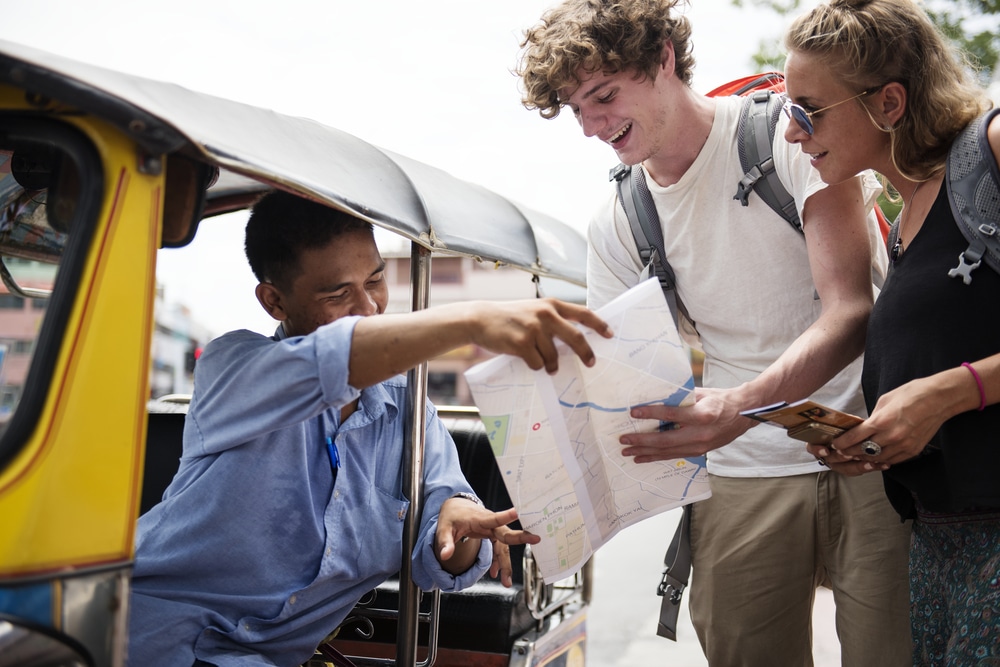
Où est… ? (Where is…?)
This is a phrase that you’ll need to use a lot in France, and it pays to memorize the names of a few places so you can get by if you’re stuck.
Here are some French phrases for travelers to build off of “où est.”
Où est…
l’hôtel ? (the hotel?)
la banque ? (the bank?)
l’aéroport ? (the airport?)
le guichet ? (the ticket window?)
la plage ? (the beach?)
Quel temps va-t-il faire aujourd’hui ? (What will the weather be like today?)
Don’t forget that much of the time, the weather in France is described using the verb faire .
Learning some French vocabulary for weather is a great idea before you venture out—being able to understand what sun and rain are in French will help you to listen out for all the right words.
Il fait beau aujourd’hui (It’s beautiful weather today)
Il pleut (It’s raining)
Il fait chaud (It’s hot)
Il fait froid (It’s cold)
Il fait soleil / Il y a du soleil (It’s sunny)
Il fait venteux / Il y a du vent (It’s windy)
Est-ce que vous pourriez prendre ma photo, s’il vous plaît ? (Could you take my photo, please?)
Everyone loves a souvenir, and it’s likely that you’ll take your camera along with you to capture precious memories. In touristy zones, natives are used to being asked to take photos, but if you’re going to do it, it’s especially nice to be able to inquire in French.
If there are a group of you, replace ma photo (my photo) with notre photo (our photo). And to be polite, start your request with excusez-moi monsieur/madame .
Addressing someone by the equivalent of “sir” or “madam” in French is generally expected, so if in doubt, err on the side of being over-polite—the person taking your photo is much more likely to accept your request!
Pouvez-vous m’appeler un taxi, s’il vous plaît ? (Can you call me a taxi, please ?)
Getting home in France when public transport has stopped running can be a real worry, and unless you’re right next to a taxi stand, it can be very difficult to find a cab. If you’re at a venue late, ask this question to one of the staff.
Staff are likely to have all the information about local transport and taxis and normally will be able to supply you with one in no time at all! As usual, address the person in the most polite way you can and thank them for their help.
Learning about other forms of transport will also help you to no end, especially when you’re searching for a way to get home.
Le bus (The bus)
Le train (The train)
Le bateau (The boat)
Le car (The coach)
La voiture (The car)
Pouvez-vous m’aider ? (Can you help me?)
In the unlikely scenario that you get into trouble when in France, it’s really important to have armed yourself with the right words to get out of a bind. Even just knowing this phrase is incredibly handy.
Of course, just because you need help doesn’t mean you’re in trouble—you might just need directions . The above phrase can be used in those scenarios, too, and is a great way to identify people who are able to speak French and who know their way around town.
Où est l’ambassade américaine ? (Where is the American Embassy?)
Again, travel French isn’t just about getting around, eating well and having fun. There are also French phrases to know in case of emergency.
If you run into trouble in France, one good address to have on hand is that of the American embassy . A stolen U.S. passport or ID card can be replaced at the embassy, and you might need their help if there is ever a political problem in France and you need to exit the country quickly.
That’s a rarity to be sure, but it’s better to be prepared while traveling!
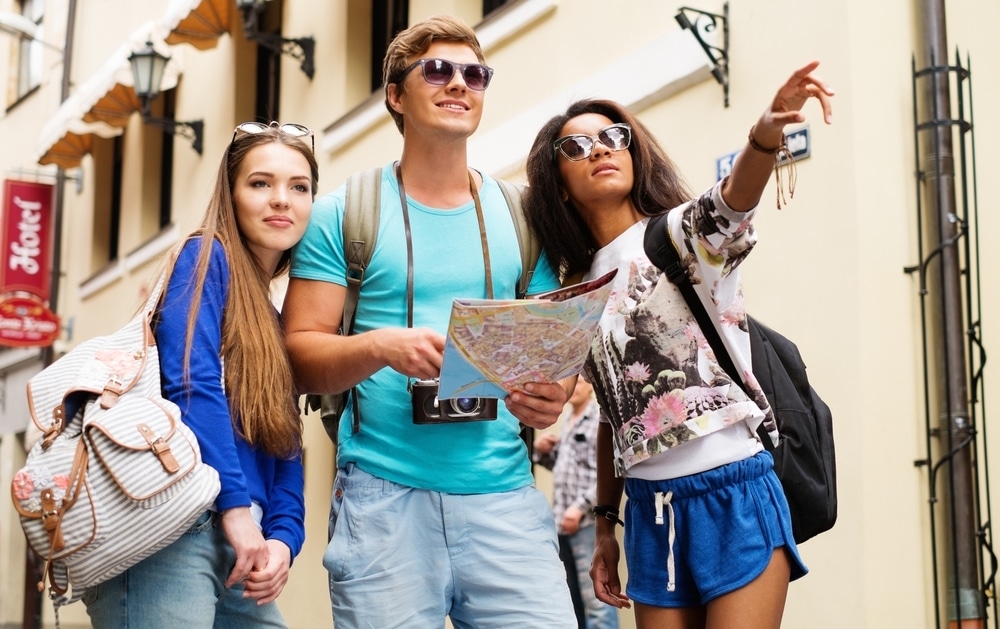
You’ll likely benefit from some further directional guidance while traveling around France. These phrases will come in handy.
Où est le métro ? (Where is the metro?)
Où sont les taxis ? (Where are the taxis?)
Où est la sortie ? (Where is the exit?)
C’est près d’ici ? (Is it close by?)
C’est loin ? (Is it far?)
Est-ce que ce bus passe par… (Does this bus pass by…)
Emmenez-moi à cette adresse, s’il vous plaît. (Take me to this address, please.)
Use this polite phrase with your taxi driver before you hand over that crumpled sticky note with François’ address on it.
Je vous dois combien ? (How much do I owe you?)
After your chauffeur de taxi (taxi driver) has so graciously driven you to François’ place, you’ll have to pay up.
Puis-je avoir un plan de la ville, s’il vous plaît ? (Can I have a map of the city, please?)
Use this phrase when you roll up to the office de tourisme (tourist office). You can also ask for a public transit map specifically:
Puis-je avoir un plan du métro, s’il vous plaît ? (Can I have a metro map, please?)
Je cherche… (I am looking for…)
Je cherche is another handy French travel phrase, especially if you’re traveling for the first time in a French city.
Unlike in English, where we say “I am looking for …” the French don’t use a preposition (“for”) after the verb, and simply follow this phrase with what they’re searching for.
Je cherche…
le bus (the bus)
un taxi (a taxi)
les toilettes (the toilets)
l’hôpital (the hospital)
Je ne comprends pas. (I don’t understand.)
A necessity if you’re trying to make conversation with a native, je ne comprends pas will serve you well if you ever get stuck.
Often, French people are so pleased to find a foreigner who’s able to speak their language that they’ll get a little carried away and enthusiastically try to start a complex conversation. While situations like these are incredible if you’re a learner, they can also be very intimidating.
Don’t worry if you don’t understand. Simply excuse yourself, say that you don’t understand and if you would like to continue the conversation, try the following French phrase:
Pouvez-vous répéter, s’il vous plaît ? (Could you repeat that, please?)
Parlez plus lentement, s’il vous plaît. (Speak a little slower, please.)
For French learners, the coveted native speed of speaking can seem unattainable, and while you can learn to understand it over time, it does take a little adjusting to. If you’re speaking to a local and would like them to speak a little more slowly, it’s better to just ask them, rather than suffering in silence.
Saying parlez plus lentement, s’il vous plaît will let your speaking partner realize they might be going a little too fast for you, but that you would still like to continue.
If you’d like them to go back over something they’ve been talking about, you can again ask them to repeat themselves to have them re-cover a topic that might have gone over your head.
Don’t worry about seeming rude—French people are often willing to help learners with their language skills, and will likely have no problem adjusting their speed.

If you’re traveling in France, you’ll probably be doing some shopping while you’re there!
Je suis à la recherche d’un… (I’m looking for a…) A great line for engaging the chipper shop girl, practicing your French and finding gifts for the folks back home.
Non, je regarde pour l’instant. (No, I’m [just] looking for the moment.)
C’est pour… (It’s for…)
Combien ça coûte ? (How much does this cost?)
Puis-je commander cela sur l’Internet ? (Can I order this on the internet?)
Je voudrais payer en liquide / espèces. (I would like to pay in cash.)
Est-ce que vous acceptez les cartes étrangères ? (Do you accept foreign cards?)
Be aware that paying for items when abroad may not work the same way as at home.
If you’re in a smaller town in France especially, it’s always worth checking with hotels or shop owners if they accept foreign modes of transaction. Asking est-ce que vous acceptez les cartes étrangères ? will ensure that you don’t find yourself in any sticky payment situations down the line.
If you’re from North America, asking acceptez-vous les cartes sans puce ? (do you accept non-chip cards?) might be more to the point. Many North American cards don’t have chip-and-pin security, and some stores in France don’t have magnetic strip readers.
Generally, most tourist destinations will be equipped to deal with foreign credit cards, but if you’re ever not sure, it always pays to double check!
À quelle heure est-ce que cela ferme ? (What time does it close?)
Across France, especially in the summer months, it’s worth checking out closing times. To ask when a shop or attraction is closing, use this question.
On the other hand, to inquire when a place will be opening, ask à quelle heure est-ce que cela ouvre ? (what time does it open?). Both of these phrases are really essential when traveling, so make sure you learn them ahead of time!
And remember, French time works a little differently and is often given on a 24-hour cycle, so if someone responds with dix-sept heures (literally, “17 hours”), they mean 5 p.m.
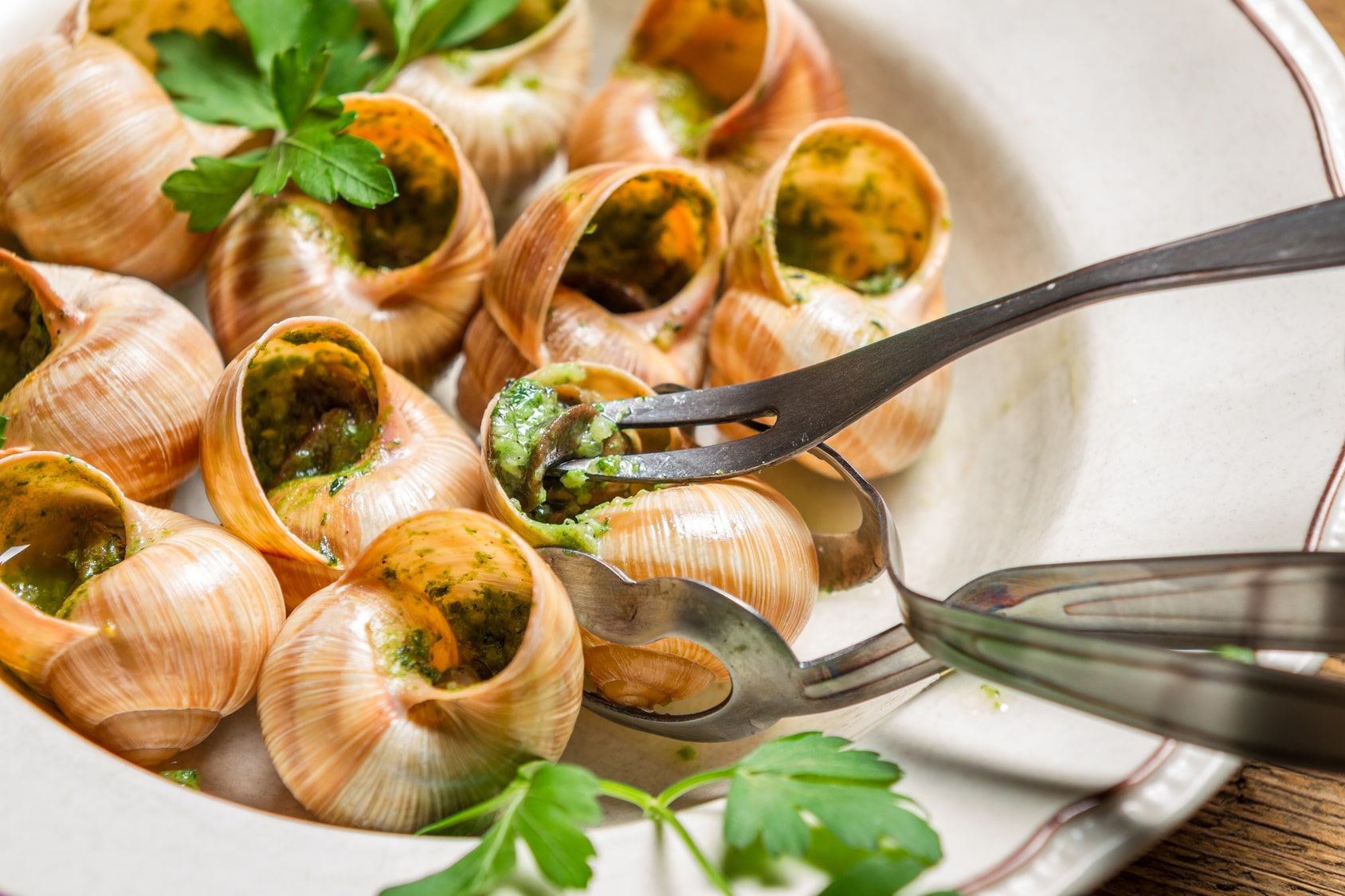
French cuisine is famous around the world, so what better place to try it than in its country of origin? These French phrases will help you make the most of dining in France.
Une table pour 4, s’il vous plaît. (A table for 4, please.
Le menu, s’il vous plaît. (The menu, please.)
La carte des vins, s’il vous plaît. (The wine menu, please.)
Est-ce que le service est compris ? (Is the tip included?)
C’est trop bon ! (This is so good!)
J’ai bien mangé. (I ate well/I’m full.)
Je suis répu / repue. (I’m satisfied/I’m full.) This one will really impress people. This is some real français soutenu (formal French) , and you’ll rarely hear a young French person say this.
On prend l’apéro ensemble ? (Let’s have an apéritif together?)
An apéritif is a beverage one drinks before eating—typically something alcoholic like whiskey, vodka or pastis , for example.
Je voudrais… (I would like…)
Je voudrais is likely to be a phrase that you’ll need to use very frequently—when ordering food , attending new places or just trying to buy something in a shop.
While most phrasebooks will contain the names of most foods and items that you would need to order, it’s worth remembering a few so that you don’t get stuck in a sticky situation! Here are a few you may want to commit to memory.
Je voudrais…
un café (a coffee)
une bière (a beer)
une baguette (a baguette)
de l’eau (some water)
l’addition (the bill)
À votre santé ! (To your health!)
Say this right before you clink glasses with your new French pals. Be sure to make eye contact while doing so .
You can also just say santé ! (health!). À la vôtre ! (to yours!) is also a good option when you’re with more than one person or having a tête-à-tête (one-on-one discussion) with a distinguished gentleperson.
À la tienne ! (to yours!) works for casual one-on-one scenarios. Tchin tchin ! (clink clink!) has the benefit of being pretty cute and onomatopoeic.
You’re sure to exude a certain je ne sais quoi (“I don’t know what”) as well as an ease with pronouns .
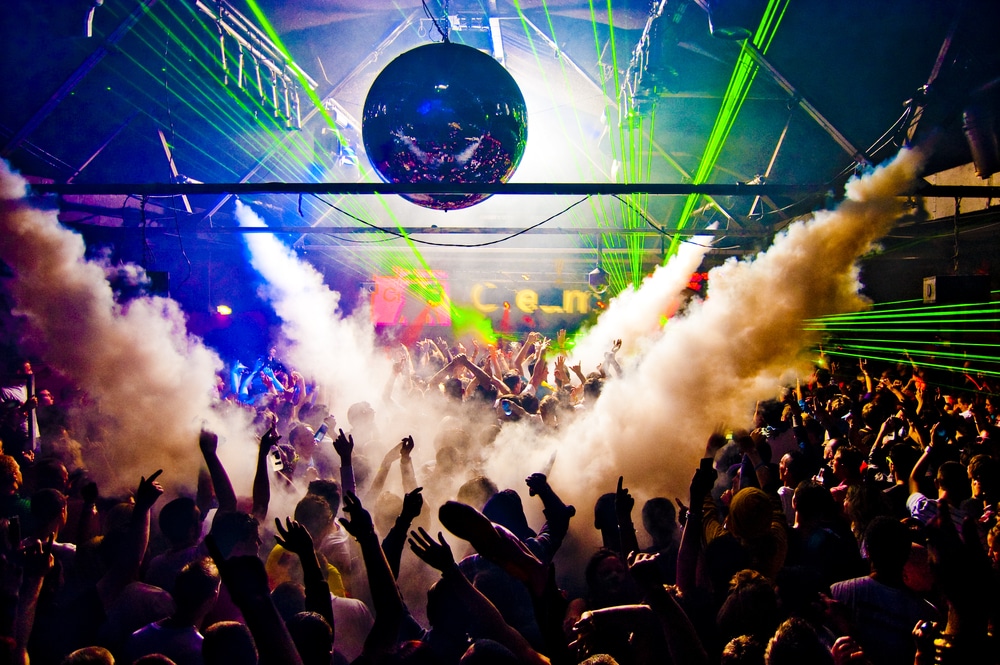
You’ve done the museums, the galleries, the restaurants, the cafés… time to party!
Ça te dit d’aller boire un verre ce soir ? (Want to go get a drink tonight?)
J’ai envie de faire la fête ! (I want to party!)
On s’installe là-bas ? (Let’s sit over there?)
Je voudrais une pinte de blonde / un verre de vin. (I would like a pint of light ale/glass of wine.)
On va prendre la bouteille. (We’ll take the bottle.)
On prend des shooters ! (We’re taking shots!)
Est-ce qu’il y a un after ? (Is there an after party?)
Je suis crevé / crevée, j’y vais. (I’m spent, I’m leaving.)
Rentrez-bien ! (Get home safely!) A good phrase to keep in your pocket when you’re leaving your party animal friends in the club.
Je me suis vraiment bien amusé / amusée. (I really enjoyed myself.) Did your new French pals take you on an exhilarating tour of the coins et recoins (nooks and crannies) of a charming neighborhood? Then let them know that you had fun!
Find a French phrasebook for travelers

Before you travel, you’re going to want to arm yourself with a few essentials, and at the top of your list should be a really great French phrasebook . Although I’ve just given you lots of helpful, common French travel phrases, it’s always good to be ready for any eventuality, and a phrasebook will act as a great backup.
One great phrasebooks for French learners are the “Collins French Phrasebook,” which contains a French dictionary for your convenience.

For more options, you’ll want to explore Lonely Planet to see what’s available. There are French phrasebooks for every corner of the French-speaking world, and some have additional features like accompanying audio files, travel guides or apps.
Research local customs
Wherever you go in France, you’ll find a whole host of things that make the area unique. Whether it’s local French cooking , events or linguistic differences, it pays to research the place you’re going and, if necessary, learn a few basic French phrases relating to whatever may be going on around you.

In Paris, for example, some museums and galleries are free to all on the first Sunday of the month—a deal worth taking full advantage of! If you want to check out the region to which you’re traveling, France.fr is a great place to do so.
And of course, your French phrasebooks or regional travel guides can offer you insight into customs, culture, etiquette and holidays.
Make a list of activities
Just getting to France may seem like a dream come true, but unless you have some idea of how you want to spend your time, it can pass you by in a haze.
Before you leave for your trip, try making a list of things you’d like to do. This way, you can adjust the phrases you learn accordingly and be ready to ask about certain exhibitions in the area or how to find a place to eat that serves a certain local dish you’d like to try.
Spontaneity is wonderful, but a little planning doesn’t hurt, either!
Use an immersion program
You can get used to hearing the French language before you leave your house with immersion programs. Using an immersion program at home is a good way to get used to the sounds and natural speed of the language. It’s also a way to hear turns of phrases , filler words and slang —basically, parts of the language that are rarely taught in textbooks. Learn these, and your French will sound much more natural.
Learn polite French terms of address
The French take manners very seriously, and if you’re meeting someone for the first time, or talking to a stranger, it’s important that you address them in the right way.
If you’re trying to attract the attention of someone who might be able to help you, say either “hello sir/madam” or “excuse me sir/madam” in French, as given above. Similarly, when you enter a shop, it’s always nice to greet the shopkeeper by saying hello or good morning, also as you learned above.

You can get a head start on polite conversation for practical, everyday matters with ed2go’s Beginning Conversational French course. This is a short online course that prepares you for communication in places like restaurants, hotels and other typical scenarios you may encounter on your travels.
There are also different terms of address in French, and depending on how well you know someone, you’ll have to address them in a certain way. For people you know, you can say tu (you) when talking to them. This can also be used for children and animals.
For strangers, figures of authority or your elders, you must use vous (you). This is a much more polite term of address, and expected when you haven’t gotten to know someone well yet.
If you’re struggling to know which one to use, always veer on the side of caution and use vous. The other person will tell you if they want you to say tu to them instead!
Traveling to France is a thrilling and eye-opening experience.
In order to get the most out of the trip, it’s a great idea for tourists and travelers to learn some basic French phrases and words ahead of time.
These French travel phrases will have your back throughout your trip!
FluentU has a wide variety of great content, like interviews, documentary excerpts and web series, as you can see here:

FluentU brings native French videos with reach. With interactive captions, you can tap on any word to see an image, definition and useful examples.

For example, if you tap on the word "crois," you'll see this:

Practice and reinforce all the vocabulary you've learned in a given video with learn mode. Swipe left or right to see more examples for the word you’re learning, and play the mini-games found in our dynamic flashcards, like "fill in the blank."

All throughout, FluentU tracks the vocabulary that you’re learning and uses this information to give you a totally personalized experience. It gives you extra practice with difficult words—and reminds you when it’s time to review what you’ve learned.
Start using the FluentU website on your computer or tablet or, better yet, download the FluentU app from the iTunes or Google Play store. Click here to take advantage of our current sale! (Expires at the end of this month.)
Enter your e-mail address to get your free PDF!
We hate SPAM and promise to keep your email address safe

Unconventional language hacking tips from Benny the Irish polyglot; travelling the world to learn languages to fluency and beyond!
Looking for something? Use the search field below.
Home » Articles » 60+ Essential French Phrases for Beginners to Start Speaking Now
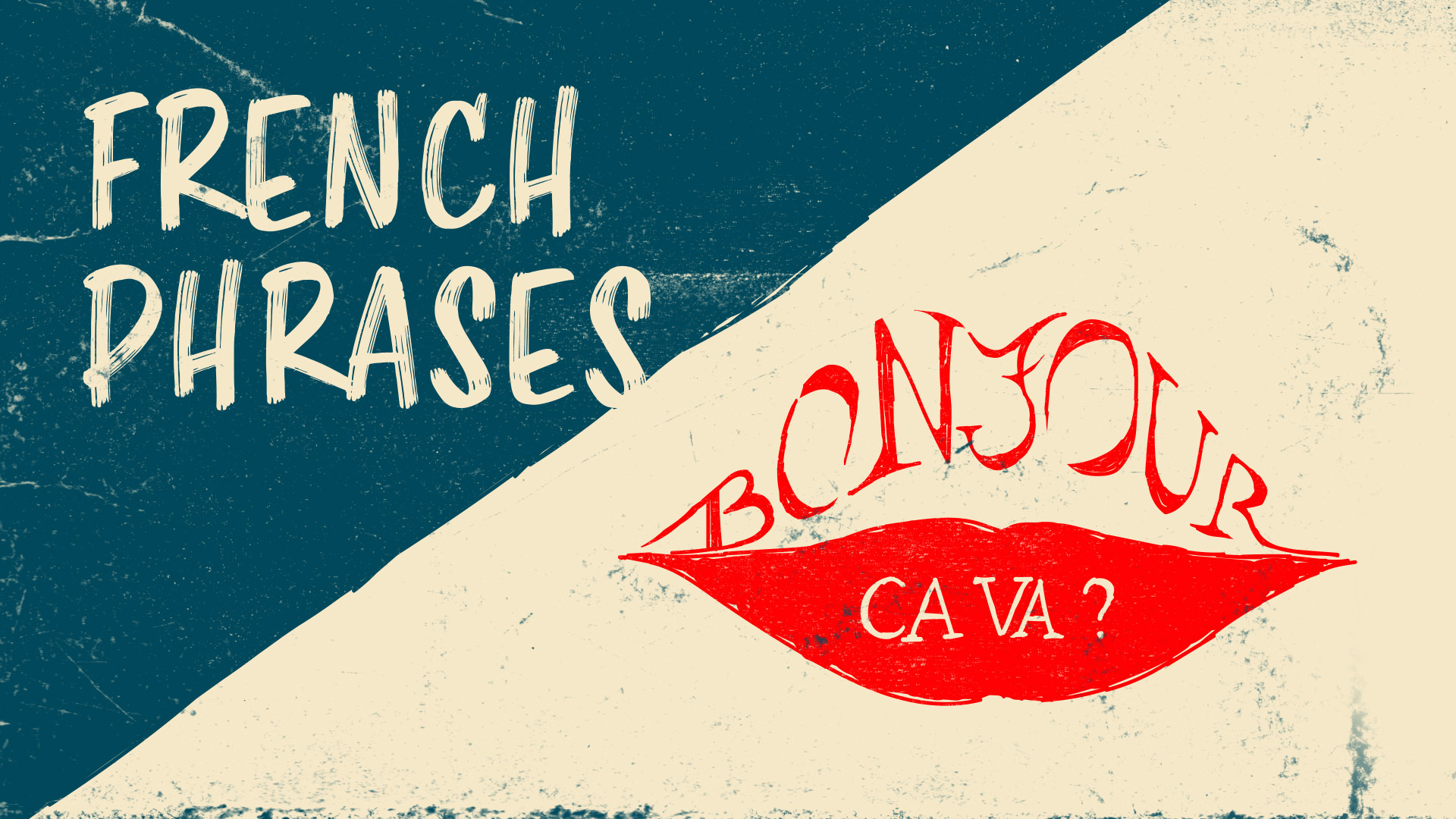
Full disclosure: This post contains affiliate links. ?
written by Benny Lewis
Language: French
Reading time: 17 minutes
Published: Jan 11, 2021
Updated: Sep 17, 2021
60+ Essential French Phrases for Beginners to Start Speaking Now
What are some French sayings? What are the most common phrases in French? And can learning a few powerful French phrases really help you start speaking right away?
Absolutely!
Even if you'll only be spending a short time in the country, learning a few basic French phrases can be very rewarding and make a big difference to your trip.
Let’s start by mastering some of the most common French phrases you need to know as a beginner:
I've long advocated that set phrases are the best thing for beginners to learn when starting out.
After all, isn't the goal of language learning to communicate?
How do you expect to communicate with anybody if the only thing you've learned so far is a verb table?
So whether you're planning to travel to Paris for a week or move to Saint-Louis-du-Ha! Ha! for the rest of your life, here are the most important and useful French phrases that you should learn A.S.A.P.
Listen to the French Phrases:
Here's a quick “French phrases” video I made that will help you with pronunciation for most of the phrases in this article:
Before we get started, if you’re looking for an online French course, here’s the course I recommend: French Uncovered – Learn French Through the Power of Story, a course with a fascinating new method by my friend Olly.
French Greetings and Polite Phrases
Bonjour – “hello”.
There are many ways in French to say “hello” , but bonjour is undoubtedly the most well-known. It's universally polite and friendly, whether the situation is formal or informal.
Bonjour is a combination of the words bon (“good”) and jour (“day”).
In the evening, you could also say bonsoir (“good evening”). A more casual way to greet people is salut , which can mean either “hi!” or “bye!”.
S'il vous plaît / s'il te plaît – “Please”
As a tourist, the last thing you want to be is rude. So when in France, remember what your mother taught you, and say s'il vous plaît (“please”) when making a request.
You can also say s'il te plaît. What's the difference? It's all about “you”:
In French there are two ways of saying “you”.
Tu is what you'd use when addressing a friend. Vous is a more polite and formal version, best used when talking to a stranger or older person.
( Vous is also what you should use when addressing a group of people in any situation, similar to saying “you guys” or “you all” in English).
So s'il vous plaît and s'il te plaît both mean “please” (literally, “if it pleases you”), but s'il vous plait is the more polite version. If in doubt, use s'il vous plaît .
(Why is it s'il te plait and not s'il tu plait ? It's a grammatical thing that you don't need to worry about as a beginner. Just learn the phrase as a whole for now, and things will become clear later.)
In fact, when asking for something in French – e.g. asking a stranger for directions or asking to see a menu in a restaurant, you should start with “ Bonjour. S'il vous plaît… ” It literally means “Hello, please…”, which would sound a bit strange in English, but it's the normal way to start a polite request in French.
Comment vous appelez-vous? / Comment t'appelles-tu? – “What’s your name?”
When meeting anyone, one of the first things you'll want to know is their name.
In French, you can find it out by asking “ Comment vous appelez-vous? ” (formal) or “ Comment t'appelles-tu? ” (informal).
Literally, these questions mean “what do you call yourself?”. You could also ask “ c'est quoi ton nom? ” – which is a more literal translation of “what's your name?”
If you're on the receiving end of this question, answer with “ Je m'appelle… ” (“my name is”, literally “I call myself”) or a simple “ Je suis… ” (“I am…”).
Oui/Non/Si – “Yes/No”
Two essential words to learn in any language are “yes” and “no”. In French, “yes” is oui and “no” is non .
Informally, it's also common to say ouais or ouaip instead of oui – like saying “yeah” or “yep” in English.
Then you have si . This is a handy little word that has no direct equivalent in English. Use it to say “yes” when someone asks you a negatively phrased question.
To illustrate what I mean, imagine that someone asks you, in English, “haven't you been to Paris?”
If you reply “yes”, it's not exactly clear what you're saying. Do you mean “yes, I have been to Paris – contrary to your assertion” or “yes, you're correct: I haven't been to Paris”?
French avoids this confusion with the word si . It means “yes”, but more specifically it contradicts the assertion in the question. In the above example, if you say si , it clearly conveys that you have, in fact, been to Paris.
Si is one of many linguistic features that I sorely miss when I speak English.
Comment allez-vous? – “How are you?”
This is the polite way of saying “how are you?” in French. Note the use of the polite vous rather than the informal tu .
Another, more informal way to say “how are you?” is ça va ? This phrase is extremely common – when in France you'll likely hear it several times per day.
If someone asks you “ ça va? ”, you can respond with a simple “ ça va bien ” – “it's going well”.
Excusez-moi – “Excuse me”
To get someone's attention, whether they're a waiter in a restaurant or a stranger on the street, say “ excusez-moi ”, “excuse me”.
This is also the polite way to ask someone to get out of your way. For example, if you're trying to exit a crowded train, a soft “ excusez-moi ” should (hopefully) be enough to make people step aside.
Pardon – “Sorry”
Picture getting off a crowded train, being careful you don't bump into anyone as you walk through the crowded metro station. But if a collision does occur, it's fine. Just say pardon , “sorry”, and all will be forgiven.
“ Pardon? ” is also how you'd ask someone to repeat themselves if you didn't hear or understand what they said. In this case, you should say it with a rising tone to indicate that it's a question.
Another way to say this is “ pourriez-vous répéter, s’il vous plaît ?” – “Could you repeat, please?”
Merci beaucoup – “Thanks a lot”
And of course, don't forget to say thank you!
The French word for “thank you” is merci . Or you can make it stronger by saying merci beaucoup – “thanks very much”.
Use merci in all the same situations you'd say “thank you” in English.
Other Must-Know French Greetings and Polite Phrases:
- Nice to meet you – Enchanté
- How’s it going? – Comment ça va?
- And you? – Et toi?
- Are you well? – Vous allez bien?
- What’s new? / What’s up? – Quoi de neuf?
- Good, thanks! – Bien, merci!
- So-so / It’s okay – Comme ci, comme ça (Literally: “like this, like that”)
- Same as always – Comme d’hab
- It could be worse – Ça pourrait être pire
- You’re welcome – Je t'en prie
- Don’t mention it / You’re welcome – De rien
- Goodbye – Au revoir
- See you soon – À bientôt!
French Phrases for Maintaining a Conversation
Je voudrais parler français – “i would like to speak french”.
The French are famously protective of their language. Sometimes they can be a bit impatient with us anglophones, and reply in English to your imperfect French questions.
It's frustrating when this happens, but if you ever want to make progress in a foreign language, you absolutely must stop speaking English !
Be polite but firm when someone tries to speak English with you – tell them “ Je voudrais parler français ” – “I'd like to speak French.”
Note that, unlike in English, names of languages are not written with a capital letter in French.
Je ne comprends pas – “I don’t understand”
Sometimes pardon doesn't quite cut it. If you really can't figure out what the other person is saying, try telling them “ je ne comprends pas ” – “I don't understand.”
There's no shame in being a beginner! Just remember not to fall back to English when the going gets tough. If you don't understand something, persevere in French anyway – it's the only way you'll learn.
Que veut dire ça? – “What does that mean?”
Maybe the reason you didn't understand is because there was a specific word you didn't recognise. If that's the case, say “ que veut dire X? ” – “What does X mean?”
You can also phrase this as “ ça veut dire quoi? ” – “What does that mean?”
Plus lentement – “More slowly”
Sometimes, vocabulary isn’t the problem. You’d know the words if you could make them out, but you can't because the other person is talking too fast!
In this case, try saying plus lentement – “more slowly”.
Better yet, say a full sentence: “ Pourriez-vous parler plus lentement, s’il vous plaît? ” – “Can you speak more slowly, please?”
Comment dit-on __ en français? – “How do you say __ in French?”
What if you need to say something in French, but the exact word escapes you?
Just fill in the blank in the above sentence: “ Comment dit-on X en français? ” means “How do you say X in French”?
A side note: the pronoun on , seen above, is an interesting one. It’s a colloquial alternative to nous (“we”). However, on is also used to refer to an unspecified person or people in general, like the word “one” is sometimes used in formal English. (If you speak German, note that on in this sense is like the German word man .)
One doesn't use the word “one” very much in modern English – one finds it rather old-timey and stuffy. These days you normally use “you” when you're talking about people in general.
Comment ça s'écrit? – “How do you spell that?”
If you learn a new French word using the phrase above, you might want to write it down before you forget it.
Unfortunately, French spelling isn't the easiest.
The relationship between spelling and French pronunciation can be complicated. Generally, it's easier to figure out a word's pronunciation from its spelling than it is to know its spelling from its pronunciation. I wrote a guide to help you with French pronunciation here .
So if you're not sure, ask someone “ comment ça s'ecrit? ” – “How do you spell that?” Literally: “How does that write itself?”
Or if you don't trust your own transcription abilities, try asking them to write it for you: say “ Est-ce que vous pouvez l'écrire? ” – “Can you write it (down)?”
Other Helpful Phrases for Maintaining a French Conversation:
- Can you speak more slowly please? – Pouvez-vous parler plus lentement s'il vous plaît?
- Can you say it one more time? – Pouvez-vous le dire une fois de plus?
- Do you speak French? – Parlez-vous français?
- Do you understand? – Comprenez vous?
- What do you do for a living? – Qu’est-ce que tu fais dans la vie?
- How old are you? – Quel âge as-tu?
- I’m _ years old – J’ai _ ans
- Where are you from? – D'où êtes-vous?
- I’m from… – Je viens…
- Are you married? – Es-tu marié?
- Are you single? – Es-tu célibataire?
- When can we meet? – Quand pouvons-nous nous rencontrer?
- What’s your phone number? – Quel est ton numéro de téléphone?
French Phrases for Getting Around
Où est… – “where is…”.
Struggling to find your way around? Not to worry. Just get a stranger's attention (remember what phrase would you use to do this?) and ask “ où est X ” – “Where is X?”
“X” could be many things: la Tour Eiffel, le Louvre, Notre Dame … or perhaps something less exotic, like le metro or un restaurant .
Où se trouve la station de métro la plus proche? – “Where is the closest metro station?”
Another way of saying “where is it?” is où se trouve , literally “where is (it) found”.
Here's an example of où se trouve combined with another handy phrase to know: la station de métro la plus proche means “the closest metro station”.
One more piece of useful vocabulary: once you're in the metro station, you might want to ask someone “ où est le guichet? ” – “Where is the ticket window?”
Je voudrais acheter un billet – “I would like to buy a ticket”
Now that you've found the guichet , you probably want to buy a billet – a ticket. But what type of ticket do you want?
- un billet aller simple – a one-way ticket
- un billet aller retour – a round-trip ticket
Make your decision, and tell the assistant “ je voudrais un billet aller simple/retour pour X ” – “I would like to buy a one-way/round-trip ticket to X”, where X is your destination.
C'est combien? – “How much is it?”
France isn't the cheapest of countries – so whether you're at the guichet or elsewhere, it doesn't hurt to be price-conscious.
To ask how much something costs, say “ c'est combien? ” – “how much is it?” You can also say “ Combien ça coûte? ” – literally, “how much does it cost?”
Où sont les toilettes? – “Where are the toilets?”
It's worth learning this phrase, because you might need it in a hurry! Où sont les toilettes means “where are the toilets?”
Although if you want to use a public toilet, you could be searching for a long time.
They aren't very common in France – and if you do find one, you'll probably have to pay to use it. You're probably better off buying something in a café and using their toilets instead.
(Why is it “ où sont “, when previously we used “ où est “? Easy: sont means “are” while est means “is”. Since toilettes is plural, you must use sont , not est – “where are the toilets?”, rather than “where is the toilets”, which wouldn’t make sense.)
À quelle heure est-ce qu’il faut régler la note? – “What time is check out?”
If you're checking into a hotel in a French-speaking country, one useful thing to know the checkout time.
One way to find this out is to ask “ à quelle heure est-ce qu’il faut régler la note? ” – “What time must we check out?”
Another similar expression is: “ quelle est l'heure limite d'occupation? ” (Lit: “What is the occupancy cut-off time?”
La carte/le menu, s’il vous plaît. – “The menu, please.”
France is famous for its food, so while you're there, you'll probably want to dine in a restaurant or two!
When dining out in any language, there are usually a few subtleties around how to order. Here I'll explain one of the more important things to know in French: the words for “menu”.
I say “words” because there are two main ways to say “menu” in French.
The general word is carte , which you may recognise from the expression à la carte .
A carte is what you typically think of when you hear the word “menu”. It's a list of individually-priced options; you pick and choose what you want, then add up the prices to get your total bill.
But you can also ask for a menu , which is usually called a “fixed-price menu” in English. When ordering from a menu , you pick an option for each course (starter, main course, etc.) and pay the same, fixed price no matter what you selected.
Whichever option you choose, inform the serveur/serveuse (“waiter/waitress”) by saying “ la carte/le menu, s’il vous plaît ” – “the menu/fixed-price menu, please.”
Je ne peux pas manger… – “I can’t eat…”
This doesn't apply to everybody, but for those to whom it does apply, it's very important: informing the waiter about your dietary restrictions.
The simplest way to do this is to say “ je ne peux pas manger de X ” – “I can't eat X”. Here are some of the more common ways to fill in the blank:
- cacahuètes – peanuts
- noix – nuts
- gluten – gluten
- fruits de mer – shell fish
- œufs – eggs
- poisson – fish
- produits laitiers – dairy products
- viande – meat
If you're vegetarian, say so with “ je suis végétarien ” (for men) or “ végétarienne ” (for women.)
A vegan is a “ végétalien(ne) “, although végan/végane is sometimes used too.
You could also explain “ je ne consomme pas de produits animaux .” – “I don't consume animal products”
Nous voudrions commander maintenant. – “We would like to place an order now.”
To “order” in French is commander , when you're talking about ordering something in a restaurant.
Don't confuse this with ordonner , which is used in the sense of “to order a person to do something”, such as in the military.
After receiving the carte or the menu , and perhaps informing the waiter of your dietary restrictions, you may be given some time to make a decision. When you're ready, say “ nous voudrions commander maintenant ” – “we'd like to order now.”
It’s also acceptable in nearly any restaurant to use on instead of nous for we, as I mentioned earlier: On voudrait commander maintenant.
Or if you're by yourself, say je voudrais (I'd like) instead of nous voudrions (we'd like). Bon appétit!
L’addition, s’il vous plaît. – “The bill, please”
One final bit of restaurant-related vocabulary – the bill (or “check” if you're American) is l'addition .
So when you're ready to leave, say l’addition, s’il vous plaît – “the bill, please”.
You’ll often hear la facture used in Quebec instead of l’addition – however both are perfectly understandable to waitstaff.
Other French Phrases for Out and About in France:
- Can you help me please? – Pouvez-vous m'aider s'il vous plaît?
- I would like… – Je voudrais…
- I’d like one of those please – J'en voudrais un s'il vous plait
- Three: Trois
- Four: Quatre
- Five: *Cinq
Learn more: French Numbers: Counting in French from 1 – 100+
Romantic French Phrases
Je t'aime – “i love you”.
Finally, let’s talk about love.
They say that French is a romantic language, so maybe in your travels you'll find love on the road? Or maybe after you get home, you'll want to use your newfound French skills to woo that special someone.
So how do you say “I love you” in French?
The French word for “to love” is adorer – but you generally only use this word when talking about things rather than people, for example to say that you love a place, book, or song.
When talking to a person, say je t'aime . Aimer usually means “like”, but in this context it means “love” in the most romantic of senses. Use it wisely!
Here are some other romantic French phrases:
- My heart – Mon cœur
- My love – Mon amour
- You’re beautiful – Tu es belle (to a woman); Tu es beau (to a man)
- You’re too cute – Tu es trop mignon
- I like you (Lit: “You please me”) – Tu me plais
Bonus: French Slang
Wondering what a famous French saying is that you could use in everyday life? Or how do you say “cool” in French slang?
Here are some bonus French sayings and slang to level up your French:
- Cool – Cool (yes, really! Just say it with a French accent 😉)
- Awesome – Génial
- That sucks – C’est nul
- That’s great – C’est top
- Don’t worry – T'inquiète
- Losing my mind – Perdre la tête
Over to You
Can you think of any other useful French phrases for tourists? What are the most important words and phrases for beginners to know? Let us know in the comments.
And if you’re ready to learn more French, check out the 111 core French words that are commonly used. Or learn some more fun French slang !
Benny Lewis
Founder, Fluent in 3 Months
Fun-loving Irish guy, full-time globe trotter and international bestselling author. Benny believes the best approach to language learning is to speak from day one .
Speaks: Spanish, French, German, Italian, Portuguese, Esperanto, Mandarin Chinese, American Sign Language, Dutch, Irish
Have a 15-minute conversation in your new language after 90 days
Survival French: 120 Must-know Phrases for visitors to France
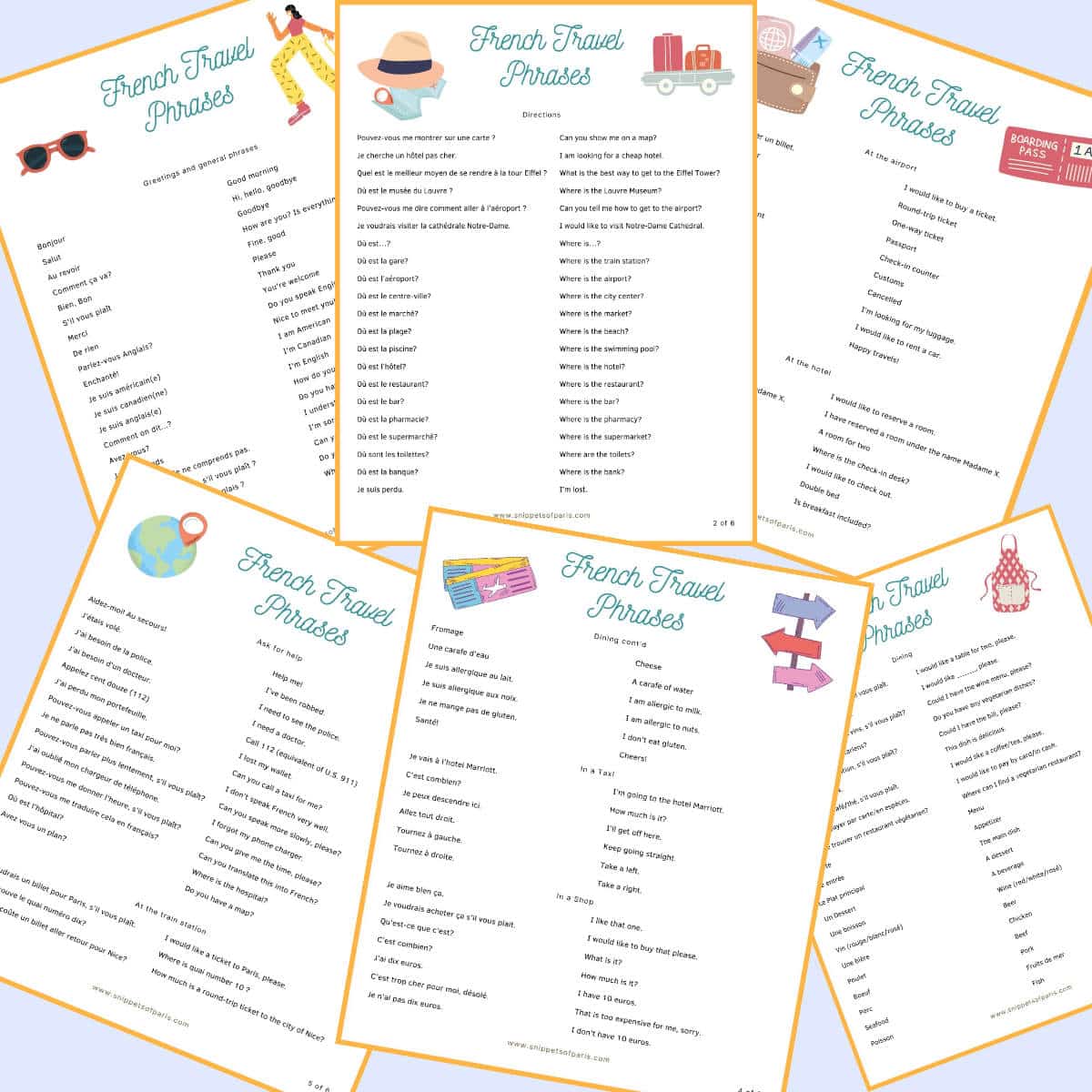
- Post category: French Language / Travel to France
- Post author: Nassie Angadi
If you are planning a trip in France, you may want to learn a few french travel phrases to make the most of your visit. Travel can be stressful, so there’s no better way to calm your nerves than by understanding the local language .
The French are notoriously shy about speaking English, so a few phrases in French is bound to put everyone at ease. In this article, I will cover some useful phrases in various instances, from asking directions, ordering at a restaurant, going somewhere in a taxi, etc.
So, without further ado, let’s take a look at the top useful French travel phrases for your big trip to France. Allons-y!
Greetings and general phrases
There is quite a lot of different French greetings but the most basic is the Bonjour . If there is only one word to remember on your trip, this is the one.

Asking for help
You can find more information on calling emergency numbers in France here.
At the airport
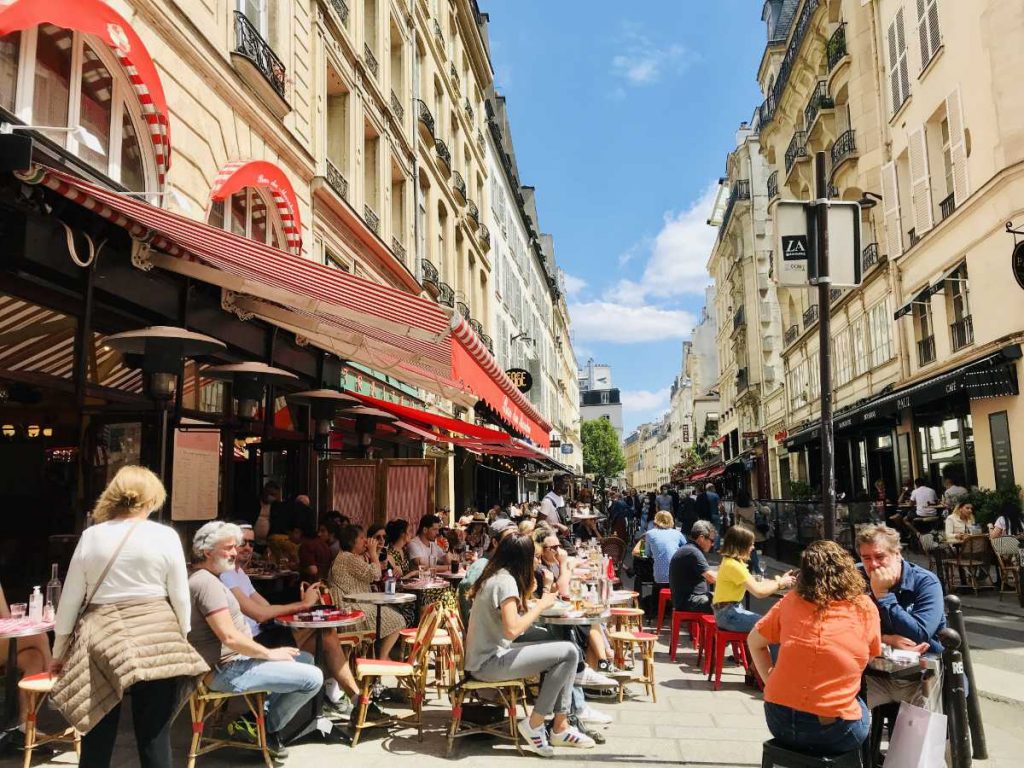
Food, restaurants and dining out
You can find more French food culinary terms here and top foods to eat in France here.
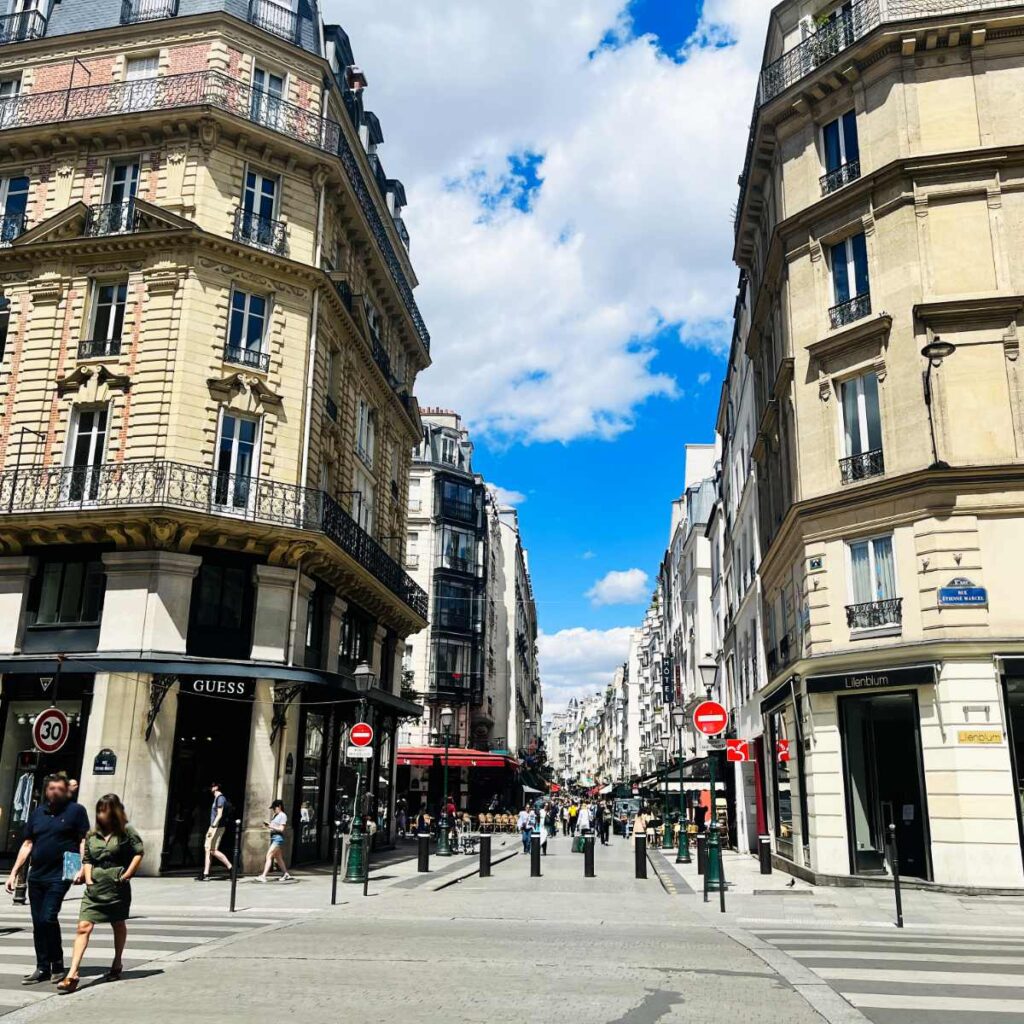
At a train station
For more numbers in French , you can find my printable here.
In a museum
You can find the top museums in Paris here.
If you enjoyed that article, you may like to download the list in printable format below. You can also read more about traveling to Paris here. A bientôt!

You Might Also Like
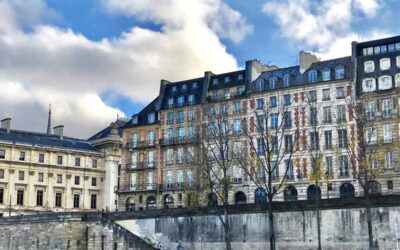
54 French inspirational quotes: Proverbs to motivate & enjoy (with translation)
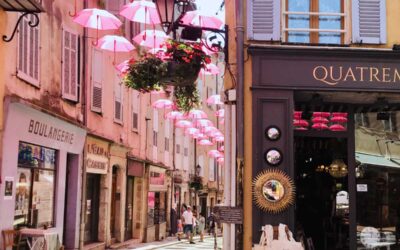
Regional languages in France: From Breton to Alsatian
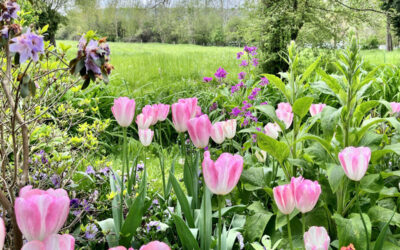
92 French terms of endearment: Nicknames and pet names
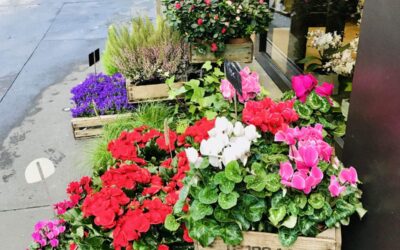
51 French Quotes about Life (and Death)
Leave a reply cancel reply.
- Paris & Île-de-France
- Alsace & Lorraine
- Bourgogne-Franche-Comté
- Bretagne & Normandy
- Auvergne Rhône Alpes
- Loire Valley
- Northern France
- Nouvelle Aquitaine
- Provence & French Riviera
- Living in France
- French Parenting
- French Holidays
- French Language
- French Etiquette
- French Music
- Moving to France
- Facts and history
- Appetizers & Starters
- Main dishes
- Side dishes
- Get the Look
- Newsletter archives
Learn French for travel: The best 100 phrases to know

Learn French for travel ! Our comprehensive guide covers everything from greetings and introductions to ordering food and asking for directions.
Learn French for travel
It is an excellent idea to learn the French language before traveling because it is widely spoken, especially in France and other French-speaking nations in Europe, Africa, and Canada. A few basic French phrases will enable you to interact with locals, find your way around foreign locales, and make the most of your trip.
Here are the best French phrases to know for travel:
- Bonjour (Hello)
- Comment ça va? (How are you?)
- Merci (Thank you)
- S’il vous plaît (Please)
- Excusez-moi (Excuse me)
- Je suis désolé (I’m sorry)
- Je ne comprends pas (I don’t understand)
- Parlez-vous anglais? (Do you speak English?)
- Où se trouve …? (Where is …?)
- Combien ça coûte? (How much does it cost?)
- Je voudrais … (I would like …)
- Je suis perdu (I’m lost)
- Je cherche … (I’m looking for …)
- Je m’appelle … (My name is …)
- J’ai besoin de … (I need …)
- Je viens de … (I come from …)
- Je suis en vacances (I’m on vacation)
- Je suis touriste (I’m a tourist)
- C’est où le …? (Where is the …?)
- C’est combien? (How much is it?)
- C’est combien pour …? (How much for …?)
- C’est à quelle heure? (What time is it?)
- Quel est votre adresse? (What’s your address?)
- Où est la gare? (Where is the train station?)
- Où est l’aéroport? (Where is the airport?)
- Où est la plage? (Where is the beach?)
- Où est la mairie? (Where is the town hall?)
- Où est la banque? (Where is the bank?)
- Où est le musée? (Where is the museum?)
- Où est le restaurant? (Where is the restaurant?)
- Où est le café? (Where is the café?)
- Où est le supermarché? (Where is the supermarket?)
- Où est le cinéma? (Where is the cinema?)
- Où est l’hôpital? (Where is the hospital?)
- Où est le centre-ville? (Where is the city center?)
- Où est le parc? (Where is the park?)
- Où est le marché? (Where is the market?)
- Où est le parking? (Where is the parking?)
- Où est le bureau de poste? (Where is the post office?)
- Je prends … (I’ll have …)
- Je voudrais une chambre pour … nuits (I would like a room for … nights
Why you should learn French when you travel to France?
There are several reasons why you should learn French when you travel to France:
- Improved communication : Knowing French will help you communicate with locals , understand menu items at restaurants, ask for directions, and engage in conversation with the people you meet.
- Cultural understanding : By speaking French, you will gain a deeper appreciation of French culture, history, and customs.
- Increased independence : If you know French, you will be able to navigate your way around France and feel more confident and independent during your travels.
- Better bargains : Knowing French will allow you to negotiate prices and haggle for goods in markets, making shopping more enjoyable and cost-effective.
- Enhanced travel experience : When you speak French, you are more likely to engage with locals and have authentic experiences, creating lasting memories from your travels.
Overall, learning French can greatly enhance your travel experience in France, making it more enjoyable, convenient, and culturally enriching.
Tips on how to learn French for travel
Here are some tips on how to learn French for travel:
- Start with the basics : Focus on learning essential phrases, such as greetings, numbers, and simple questions and answers.
- Use language learning resources : Take advantage of online resources, such as language learning apps, online courses, and audio programs, to improve your speaking and listening skills.
- Immerse yourself in the language : Watch French TV shows, listen to French music, and practice speaking with native speakers to improve your comprehension and pronunciation.
- Learn key travel phrases : Make a list of key phrases related to travel, such as asking for directions, ordering food, and shopping, and focus on learning those first.
- Practice, practice, practice : The more you practice speaking French, the more confident you will become. Try to find opportunities to practice speaking, such as with a language exchange partner or a tutor.
- Get a French language guidebook : Invest in a guidebook that has French phrases and grammar explanations, so you can refer to it while you travel.
- Study before you go : Use your travel time to study the French language , such as on a plane or train ride.
Remember, the key to learning French is consistency and practice, so be patient and persistent with your studies, and you will soon be able to speak the language with confidence on your travels.
Greetings in French while traveling
Here are some common greetings in French that you can use while traveling:
- Bonjour – Hello
- Salut – Hi
- Bonsoir – Good evening
- Comment ça va ? – How are you?
- Ça va bien, merci. Et vous? – I’m fine, thank you. And you?
- Enchanté(e) – Nice to meet you
- Bonne journée – Have a good day
- Bonne soirée – Have a good evening
- Bonne nuit – Good night
- Au revoir – Goodbye
Using these greetings will help you make a good impression and connect with locals during your travels in France. Keep in mind that the French are known for their politeness, so using proper greetings and farewells is an important part of communication in the country.
Introduce yourself in French
Introducing yourself in French is a great way to make a good first impression and start a conversation with locals. To introduce yourself, you can use the phrase “Je m’appelle” followed by your name.
For example: “Je m’appelle Sarah.”
Additionally, you can add information about where you are from and what you do, using the phrases “Je suis de” and “Je suis.” For example: “Je suis de Los Angeles et je suis enseignante.” (I am from Los Angeles and I am a teacher.)
To finish the introduction, you can ask the person you are speaking to about themselves, using the phrase “Et vous ?” (And you?). With these simple phrases, you can make a great introduction and start a conversation in French.
Saying “I don’t understand” in French
When traveling in a foreign country, it’s important to know how to communicate effectively, especially when it comes to expressing that you don’t understand. To say “I don’t understand” in French, you can use the phrase “Je ne comprends pas.”
This phrase is simple, clear, and easy to remember, making it an essential tool for anyone traveling in France. If you need further clarification, you can also ask the person to repeat what they said, using the phrase “Pouvez-vous répéter, s’il vous plaît?” (Can you repeat, please?).
By using these phrases, you can ensure that you can communicate effectively and get the information you need during your travels in France.
Basic questions for learning French for travel
Here are some basic questions in French that you can use while traveling:
- Comment vous appelez-vous ? – What is your name?
- D’où venez-vous ? – Where are you from?
- Qu’est-ce que vous faites dans la vie ? – What do you do for a living?
- Parlez-vous français ? – Do you speak French?
- Pouvez-vous me dire comment aller à … ? – Can you tell me how to get to …?
- Combien coûte … ? – How much does … cost?
- Avez-vous … ? – Do you have …?
- Où est … ? – Where is …?
- Pouvez-vous me recommander un bon restaurant ? – Can you recommend a good restaurant?
- Pourriez-vous me donner un peu d’aide, s’il vous plaît ? – Could you give me a little help, please?
You can effectively interact with locals and obtain the information you require when traveling in France by being aware of these fundamental questions. Always utilize proper pronunciation and grammar when speaking French, and always be courteous and respectful.
Ordering food in French
If you don’t speak French well, ordering food in that language can be a little scary. You can order meals in France with the use of the following simple inquiries and expressions:
- Je voudrais commander … – I would like to order …
- Qu’est-ce que vous recommandez ? – What do you recommend?
- Est-ce que vous avez … ? – Do you have …?
- Je prendrais … – I will have …
- Est-ce que je peux avoir … s’il vous plaît ? – Can I have … please?
- Est-ce que c’est possible de … ? – Is it possible to …?
- Est-ce que je peux avoir une carte des vins ? – Can I have a wine menu?
- Est-ce que je peux avoir l’addition, s’il vous plaît ? – Can I have the bill, please?
- C’était délicieux, merci ! – That was delicious, thank you!
With these basic phrases, you will be able to confidently order food and drinks in French while traveling in France. Remember to use proper pronunciation and grammar, and to be polite when speaking with restaurant staff.
Asking for directions in French
When traveling in France, it’s important to know how to ask for directions. Here are some basic phrases that you can use to ask for directions in French:
- Excusez-moi, où est … ? – Excuse me, where is …?
- Comment aller à … ? – How do I get to …?
- Est-ce loin d’ici ? – Is it far from here?
- Est-ce que c’est à droite ou à gauche ? – Is it to the right or to the left?
- Est-ce que vous pouvez me montrer sur la carte ? – Can you show me on the map?
- Est-ce que vous pouvez me donner des indications ? – Can you give me directions?
- Je cherche … – I am looking for …
- Pouvez-vous me dire comment y aller à pied ? – Can you tell me how to get there on foot?
- Pouvez-vous me dire comment y aller en voiture ? – Can you tell me how to get there by car?
- Merci beaucoup ! – Thank you very much!
With the help of these fundamental words, you will be able to ask for directions and move around France with ease. While requesting instructions, keep in mind to be kind and respectful, and when speaking French, remember to pronounce words correctly and use perfect grammar.
Learn French for travel now
Your journey can now begin. The vocabulary and phrases you acquired here can be used to start making travel arrangements for your planned trip to French now that you are ready to learn French for travel .
Related Posts
French: how to teach on italki.
Why a guide to teaching languages online I’m ready to reveal my small secrets as I transition from providing online instruction to managing my website.
German: Babbel vs Duolingo: differences
Numerous individuals use software and apps to learn new languages. These days, two well-known online resources for language learning include Babbel and Duolingo. They both
Languages: Babbel vs Duolingo: differences
In today’s post, we’ll talk about the differences between Babbel and Duolingo. These are unquestionably the two most well-known language learning programs out there. Let’s
Spanish for “nights”: words and examples
There are several terms and idioms in Spanish that refer to the night, each with its unique sense and function. In Spanish, the most basic
How to say no in Spanish: 15 different ways
Learn 15 different ways to say “no” in Spanish and understand their appropriate usage. Improve your communication skills and broaden your vocabulary. As we go
How to maximize your time in learning French: Tips and strategies for success
Efficiently learn French with expert tips and strategies! Discover how to maximize your time and achieve success in your language journey. Start mastering French today!
How do you say “bon appetit” in Spanish?
Savor the flavors of Spanish cuisine with the proper greeting “Buen Provecho” when dining. Say “Bon Appétit” in Spanish and impress your friends! Bon appetit
German Lifestyle vs American Lifestyle: How to Adapt to German Lifestyle
Discover the intriguing clash of German and American lifestyles and learn essential tips for seamlessly adapting to the distinctive German way of life. As our
7 Common Myths of Learning the German Language
Discover the truth behind learning German as we debunk 7 common myths. From grammar fears to accent hurdles, prepare to unravel the language’s secrets. Over
Top 20 Spanish words used in sports
Discover the top 20 Spanish words commonly used in the world of sports. Enhance your sports vocabulary and understanding with our informative blog. Introduction The
French Phrases You Need in Workplace
Mastering French phrases in the workplace is essential for effective communication. This blog explores key phrases to navigate the professional world en français. I. Introduction
Sea in French: How to say Sea in Italian
Discover the Italian translation for “sea” with our guide. Learn how to pronounce and use this common word in the beautiful Italian language. The sea
11 Must-Know German Gardening Vocabulary Words for Green Thumbs
Master the German gardening jargon with our essential guide! Explore 11 must-know vocabulary words to level up your green thumb skills. If you’re passionate about
10 Must-Know Spanish Gardening Vocabulary Words for Green Thumbs
Expand your green thumb with these 10 essential Spanish gardening vocabulary words. Master the language of plants and enhance your gardening skills. 10 Essential Spanish
12 Must-Know French Gardening Vocabulary Words for Green Thumbs
Enhance your green thumb with our blog! Discover 12 essential French gardening terms to elevate your gardening skills and knowledge. Bonjour! As the warm weather
Spanish adverbials: Mientras…
The word Mientras can be an adverb or conjunction depending on the sentence and its structure. You can use mientras to connect two actions in
Spanish imperative negative + pronouns
The Spanish structure imperativo negativo + pronombres enclíticos is a bit controversial topic since many Spanish students get confused when using it. Los pronombres enclíticos
French Restaurant Phrases for Ordering Food and Drinks with Ease
Je voudrais un verre d’eau, s’il vous plaît. (I would like a glass of water, please.) Pouvez-vous m’apporter le menu, s’il vous plaît? (Can you
Say It Like a Native Speaker: 7 French Sayings You Should Know
Sayings or proverbs have a very important role in any culture and language, and the French language is no exception. They provide people with insight
Avoid vocabulary mistakes about false cognates in french
False cognates, also known as “faux amis“, are words that are similar in French and in English but ultimately, they have completely different meanings. When
Why is it important to respect French grammatical gender?
The grammatical gender is a system of classification in the French language that assigns a gender to nouns and adjectives. This plays a very important
7 Common Myths of Learning the French Language
Unveiling the Truth: Debunking 7 Common Myths of Learning the French Language. Separate fact from fiction in your language journey! 7 Most Popular Myths about
7 Myths About Learning Spanish
Unveiling the truth behind learning Spanish! Discover and debunk the 7 common myths that may be holding you back from mastering this vibrant language. Are
Spanish Lifestyle vs American Lifestyle: How to Adapt with Spanish Lifestyle
Discover the vibrant Spanish lifestyle and learn how to seamlessly adapt to it, contrasting it with the American way of life. Join us on this
French Lifestyle vs American Lifestyle: How to Adapt to French Lifestyle
Know more about the French lifestyle vs the American lifestyle. Which do you think is better for you? Embrace culture, cuisine, and joie de vivre!
Famous French Food You Must Try
Indulge in the flavors of France with our guide to famous French food. Discover must-try dishes like escargots, coq au vin, and crème brûlée. Bon
Famous French Singers You Must Know
Discover the iconic voices that have made French music famous worldwide. Our list of famous French singers features timeless classics and modern hits. French singers
Famous Spanish Food You Must Try
Embark on a delectable journey through Spain’s culinary wonders! Discover the must-try famous Spanish dishes that will tantalize your taste buds. Spanish Food Spain is
Famous German Singers You Must Know
Get ready to immerse yourself in the enchanting world of German music as we showcase the extraordinary talents of renowned singers from Germany. From timeless
Famous Spanish Singers You Must Know
Let the music captivate your senses and ignite your passion for Spanish culture by knowing the famous Spanish singers that ever existed. Importance of Spanish
German Phrases You Need in the Workplace
Discover essential German phrases for the workplace. From greetings to professional conversations, equip yourself with the necessary language skills. German Phrases in the Workplace Learning
Spanish Phrases You Need in Workplace
Master the essential Spanish phrases for the workplace and enhance your communication skills. From greetings to professional requests, we’ve got you covered! Spanish Words in
Top Spanish Speaking Countries
Explore the vibrant cultures and diverse landscapes of the top Spanish-speaking countries in this blog. Discover their history, traditions, and more! Explanation of the importance
Top 20 German Words Used in Sports
Discover the top 20 German words commonly used in sports, from ‘Tor’ to ‘Abseits’. Enhance your sports vocabulary and impress your German-speaking friends! Introduction Explanation
Top 20 French Words Used in Sports
Discover the Top 20 French words used in sports! From “but” to “arbitre,” learn essential vocab to help you better understand the sports world in
How to Say “Food” in Spanish
“Learn the different ways to say ‘food’ in Spanish and expand your vocabulary with our comprehensive guide. Enhance your language skills today!” One of the
How to Say “Food” in French
Learn the various ways to say “food” in French with this comprehensive guide. Expand your vocabulary and impress your francophone friends! “Food” in French: La
How to Say “Food” in German
Learn how to say ‘food’ in German and impress your friends with your language skills! Check out our easy guide and enhance your vocabulary today.
Famous places in France: Where to go in France
Discover the most famous places in France with our guide to the famous places you can’t miss. Plan your trip today! France is well-known for
Top French Slang Words Used in Everyday Life
Discover the most popular French slang words and expressions that French natives use in everyday conversations. Improve your language skills and sound like a local!
Famous Places in Spain: Where to Go in Spain
Discover the most famous places in Spain and plan your next trip. From the iconic cities of Madrid and Barcelona to the stunning beaches of
Communication Skills in a Foreign Language: Achieve Fluency by Solving Tasks
Improve your communication skills in a foreign language by solving tasks. Our blog offers practical tips and strategies to achieve fluency. Start now! Mastering Communication
Top German Slang Words Used in Everyday Life
Discover the top German slang words used in everyday life with our comprehensive guide. Impress your friends and sound like a native speaker! Top German
Famous Places in Germany: Where to Go in Germany
Explore the must-visit famous places in Germany! Discover the top destinations and attractions to add to your itinerary for an unforgettable trip. Germany is a
Top German-Speaking Countries that You Must Know
Discover the top German-speaking countries to visit and explore their rich culture, stunning landscapes, and unique attractions. Start your adventure today! Over 130 million people
Top French Speaking Countries that You Must Know
Discover the top French-speaking countries around the world, their culture, traditions, and why learning French is beneficial. Start your journey today! French Speaking Countries French
How Useful German lessons on YouTube can benefit students
Discover how German lessons on YouTube can empower students with practical language skills, cultural insights, and engaging learning experiences. Boost your German fluency today! Would
How to Maximize Your Time in Learning Spanish
Unlock the secrets to mastering Spanish efficiently! Learn how to maximize your time in learning Spanish. Start your language-learning journey now! Learning a new
Language Learning for Communication: Acquisition is Best
Discover why acquiring Spanish language skills through communication is the most effective approach. Enhance your learning journey with our expert tips. The importance of Spanish
How Useful French Lessons on YouTube to Students
Discover the power of French lessons on YouTube for students! Learn language skills with engaging videos, practice exercises, and interactive lessons. Boost your learning and
Top Spanish Slang Words Used in Everyday Life
Discover the most popular Spanish slang words and phrases used in everyday life! Improve your language skills and sound like a native speaker. Learning Spanish
Communication skills in a foreign language: Achieve fluency by solving tasks
Improve your ability to communicate in a foreign language by solving tasks. This blog helps you work through problems that improve your accuracy and confidence.
Top 7 Reasons for learning French
Parlez-vous Français? Explore the top 7 reasons for learning French and unlock a world of opportunities. Start your language journey with confidence today! 7 reasons
Top 7 Reasons for Learning German
Discover the power of learning German! Unlock opportunities and expand your horizons with compelling reasons to study German. Start your linguistic journey today! Reasons for
Top 9 Reasons for learning Spanish
Is learning Spanish worth it? What are the top reasons for learning the Spanish language? Start your Spanish journey now! Reasons why learning Spanish is worth
How to learn Spanish through Podcasts
Do you want to learn Spanish through podcasts? Immerse yourself in the richness of the Spanish language with our podcast-based learning guide. Learn Spanish through
How to learn Languages through Podcasts
Unlock the power of language learning with podcasts! Explore the ultimate guide to mastering a new language through engaging podcasts. Start your linguistic journey now!
How to Maximize Your Time in Learning German
Learn German efficiently with expert tips! Discover effective techniques on how to maximize your time in learning German. Tips and strategies for efficiently learning German
How to learn French through Podcasts
Unlock the beauty of the French language with our podcast-based learning approach. Master French effortlessly with engaging lessons and practical tips! The Power of Podcasts
How to Learn German through Podcasts
Master German with ease! Explore the ultimate guide to learning German through podcasts. Gain language skills, cultural insights, and fluency. Start your German journey now!
How useful Spanish Lessons on YouTube can Benefit Students
Discover the power of Spanish lessons on YouTube for students! Boost language skills with engaging videos. Learn Spanish anytime, anywhere. ¡Vamos! Learning a new language
How hard is it to learn German?
How hard is it to learn German? Our comprehensive guide provides insights into the challenges and strategies to master the language. How hard is it
How hard is it to learn French?
Discover how difficult it is to learn French in our latest blog post, “Parlez-Vous Français?”. Gain insights and tips to improve your French skills. Parlez-vous
5 ways to say “excuse me” in Spanish and be a polite bilingual
Master the art of politeness with this blog on 5 ways to say “excuse me” in Spanish. Impress native speakers and boost your bilingual skills
Every meaning of Fare | German verbs and how to use them
Unlock the full potential of the German verb “fare” with this comprehensive guide! Learn all its meanings and how to use them in context. Check
How to Curse in French | 12 Most Popular Swear Words
You must have noticed by now that the French have a reputation for swearing a lot. If you are learning French, it’s a good idea
5 ways to say “excuse me” in French and be a polite bilingual
Learn how to say “excuse me” in five different ways in French and impress native speakers with your bilingual skills. Be polite and confident! Excuse
How to say in German
Looking to learn how to say common phrases in German? Check out this blog for tips and tricks on how to speak the language like
French Nasal Vowel /õ/ | Possible Spellings with Examples
The French language is renowned for its multiple nasal vowels, making it a challenging feat for non-native speakers to perfect. One sound that often trips
18 useful Spanish colloquial words and expressions
Spanish is a beautiful and expressive language, full of rich idiomatic expressions that can add flavor and humor to any conversation. If you’re learning Spanish,
French Preposition Dans | Usage and Meaning
Are you struggling with the usage of the French preposition “dans”? It can be confusing to determine when to use “dans” compared to other prepositions
7 ways to say “excuse me” in German and be a polite bilingual
In this blog, you’ll learn seven different ways to say “excuse me” in German, so you can be a polite bilingual and impress native speakers.
Chic Parisian Style: How to Dress when in Paris?
Excited about an upcoming trip to Paris, but not sure what to wear? Paris, the city of lights and fashion, is heaven for those who

French Nasal Vowel ɛ̃: Possible Spellings with Examples
One sound that often trips up learners is the nasal vowel ɛ̃, which is found in words like “temps” and “enfants”. In this blog post,
French Nasal Vowel ɑ̃: Possible Spellings with Examples
One sound that often trips up learners is the nasal vowel ɑ̃, which is found in words like “temps” and “champagne”. In this blog post,
What’s the meaning of “allons-y!”? A common French exclamation
Explore the meaning and cultural significance of “Allons-y!” in the French language. Discover its different uses and learn to use it correctly in conversation. What’s
Every meaning of “Fare” | Spanish verbs and how to use them
Discover the various meanings of ‘Fare’ in Spanish verbs and learn how to use them effectively. Expand your language skills with our comprehensive guide. Narrowing
Every meaning of Faire | French verbs and how to use them
Learn the various meanings of “faire” in French with this comprehensive guide. Master the verb’s usage in different contexts and improve your fluency. Meaning of
What’s the meaning of “¡vamos!”? A common Spanish exclamation
Discover the meaning and uses of “¡Vamos!” in the Spanish language. Learn about its cultural significance and how to use it correctly in conversation. What’s
Daring you to Pronounce the Most Difficult French Words
Ready to tackle some of the most notoriously difficult French words to pronounce? It’s time to flex those linguistic muscles and push your pronunciation skills
French Prepostion Chez: At someone’s place
One of the trickiest aspects of the language can be mastering French prepositions. The French preposition chez is used to indicate that someone is “at”
Enchaînement: Connecting French Sounds
As a French speaker, using enchaînement in French is key to achieving a natural and fluent French. Enchaînement is the glue that binds the sounds
How to Pronounce Luxury Brands in French?
Are you a fashion enthusiast struggling to correctly pronounce luxury brand names in French? Look no further! In this French pronunciation guide for luxury brands,
Understanding French Liaison: The Key to Fluent Speaking
Do you want to sound like a native French speaker? Then you need to master the French art of liaison. What is it? Simply put,
Silent French H: Mute and Aspirated
The silent letter h is often causing trouble to French learners. In this blog post, we’ll take a closer look at the “h” mute and
Learn How to Stress French Words Correctly
Are you ready to learn the key to speaking like a native French? Correctly stressing French words is an important aspect of speaking French accurately
What Not to Pronounce in French? Silent Letters
The most challenging aspect of learning French is spelling words with silent letters. You know you’ve nailed your French accent once you can tell which
Understanding the French Pronunciation Using IPA
Are you struggling with French pronunciation? When it comes to vowels, do you often struggle with the many nuances of French? What if I told
Diphtongs in French: Pronunciation and Spelling
Are you looking to improve your French pronunciation? To help you learn French diphthongs, we’ll discuss their pronunciation, spelling, and examples in this blog post.
Nasal Vowels in French: Pronunciation and Spelling
Are you struggling with the pronunciation of French nasal vowels? From the different spelling patterns to the complex sounds they produce, understanding nasal vowels can
French Vowels for Beginners: Everything You Need to Know
Vowels in French are notoriously difficult for English speakers because they differ greatly from those in other languages. This guide will teach you everything you
Faire la Bise: All about French Kiss
If you’re wondering how to greet in French, either through handshakes or kisses, you are at the right place. Today, you’ll learn how to navigate
Speaking practice: talk to yourself
Improve your speaking skills with these simple tips on how to practice speaking by talking to yourself. Start speaking confidently today! Read more here. Speaking
Spaced repetition for the German language
Master German faster with spaced repetition! Our blog explains how this powerful technique works and offers tips to incorporate it into your learning routine. What
French Art of Subtle Communication: How to Sound Polite?
Understanding the nuances of French communication can be challenging, but it’s essential to understand that the French place politeness standards are pretty high. From the
What does TE AMO mean in Spanish?
Discover the romantic meaning behind Te Amo, the Spanish phrase for ‘I love you’. Explore its cultural significance and usage in everyday life. Te Amo
What are the 10 most spoken languages in the world?
Discover the top 10 most spoken languages in the world with our informative blog. Learn about their origins, unique features, and cultural significance. The most
What does JE T’AIME mean in French?
Discover the meaning and cultural significance of “Je t’aime,” the famous French expression for “I love you.” Explore its nuances and usage in this blog.
What does ICH LIEBE DICH mean in German?
Discover the meaning and cultural significance of ‘Ich liebe dich’ in German. Explore its nuances and usage in this insightful blog post. “Ich liebe dich”
Think Languages LLC
1309 Coffeen Ave, Suite 1200, Sheridan WY, USA, 82801
+1 917 9937880

French Travel Phrases
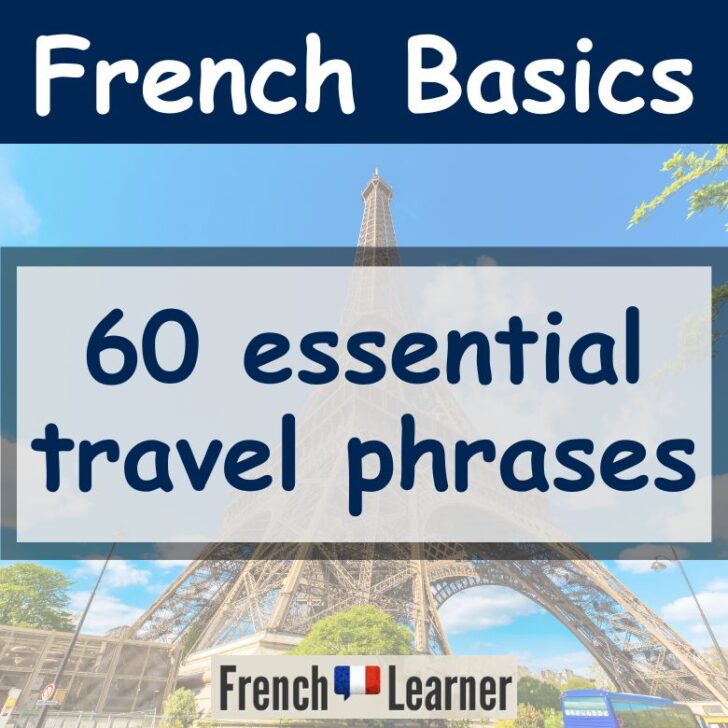
The most essential French travel phrases are Bonjour (hello), au revoir (goodbye), Où est? (Where is), C’est combien? (How much is it?) and l’addition s’il vous plaît (the check, please). This page covers over 60+ useful words and phrases which you can use on a trip to France.

French Greetings
If you are going to France it is very important to learn the basic greetings. While you might not speak French fluently just yet, the French people will really appreciate your trying to make an effort.
- Bonjour Hello, good morning, good day
- Au revoir Goodbye
- Salut Hi/bye (informal)
- Merci! Thank you!
- Merci beaucoup! Thank you very much!
- Ça va? How are you? How’s it going? (informal)
- Bien, merci! Fine, thank you!
- S’il vous plaît Please
- De rien You’re welcome
- Enchanté! Nice to meet you!
This page on our site covers French greetings in detail.
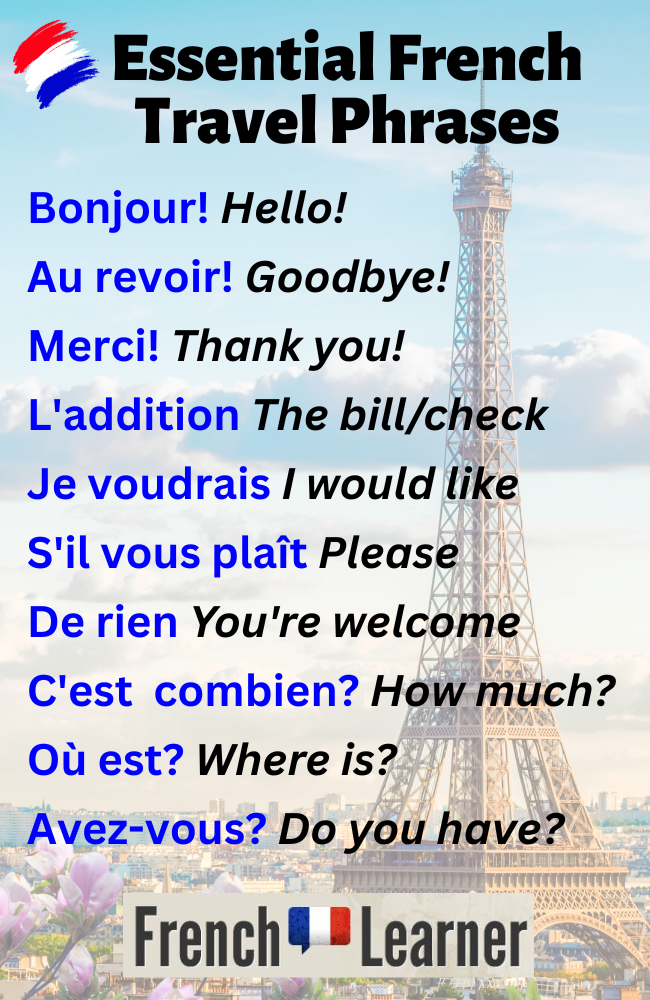
Asking directions
When asking directions in France, it’s very important that you know a few basic words. This page on our site covers asking directions in detail.
- Où est…? Where is…?
- Où est la gare? Where’s the train station?
- Où est la gare routière? Where’s the bus station?
- Où sont les toilettes? Where’s the restroom?
- Où est la banque? Where’ the bank?
- Où est un bureau de change? Where’s a exchange counter?
- Je suis perdu I’m lost
- Le plan city map
Asking for things
On your trip you’ll inevitably need to ask for things. This short list of words is a very good start. Learning the verb vouloir is a good idea as it means “to want”.
- Je veux (slightly informal)
- Je voudrais I would like
- Donnez-moi Give me
- Avez-vous? Do you have?
- Auriez-vous Would you happen to have?
- Qu’est-ce que c’est? What is it?
- Nous avons We have
- Nous n’avons pas We don’t have
- C’est disponible It’s available
Restaurant phrases
One of the best places to try practicing speaking French is a restaurant. Here’s a short list of words in phrases you may use. This page on our site offers a very comprehensive list of restaurant vocabulary . In addition, this page on our site covers food vocabulary and this page covers beverage vocabulary.
- Une table pour deux, s’il vous plaît A table for two, please
- Je prends I’ll have (from the verb prendre , to take)
- La carte menu
- La soupe soup
- La salade salad
- L’entrée appetizer
- Le dessert dessert
- La boisson beverage
- Le vin rouge red wine
- Le vin blanc white wine
- La a bière beer
- Le café coffee
Taxi/Uber phrases
If you find yourself in a taxi or Uber, some of the the following phrases should come in very handy.
- Je vais à I’m going to
- Je descends ici I’ll get off here
- Voici l’adresse Here’s the address
- Allez tout droit Keep going straight
- Tournez à gauche Take a left
- Tournez à droite Take a right
Hotel phrases
The following is a short list of words and phrases that you can use in your hotel. While most hotel staff speak basic English, it’s still nice to know these words in French.
- L’hôtel hotel
- Une chambre à deux double room
- Un grand lit Double bed
- La réception Check-in desk
- Quitter la chambre To check out
- La piscine swimming pool
- Le petit déjeuner compris Breakfast included
- Réserver une chambre To reserve a room
Miscellaneous words and phrases
The following is a list of miscellaneous French words and phrases which we feel are essential for a trip to France and belong on this list.
- Je voudrais louer une voiture. I’d like rent a car.
- Je voudrais acheter un billet. I’d like to buy a ticket.
- Un billet aller-retour Round-trip ticket
- L’aller simple One-way ticket
- Le passeport passport
- Les vacances vacation
- Je voudrais annuler. I’d like to cancel.
- Un voyage A trip
- Bon voyage! Enjoy your trip!
- Bon séjour! Enjoy your stay!
Further your learning We feel that it’s a great idea to carry a French phrase book while traveling in France. Most phrase books on the market won’t show you how to actually say the phrases. For an audio option, check out French Today’s Modern French Audio Phrasebook !
Discover more:
- Ways to say “thank you” in French
- How to say “hello” in French
- Ways to say “you’re welcome” in French
- Guide to French verbs
- Guide to French vocabulary

Sharing is caring!
Affiliate disclosure: Below you will find affiliate links. If you purchase something after clicking the link, we will receive a small commission. To learn more please visit our full disclosure page . Merci!

Read our full review of À Moi Paris and find out why we love it so much!

Read our full review of French Verb Drills and find out why we recommend this course!
David Issokson
David Issokson is a lifelong language enthusiast. His head is swimming with words and sounds as he speaks over six languages. Of all the languages he speaks, he's the most passionate about French! David has helped hundreds of students to improve their French in his private online lessons. When procrastinating working on his site, FrenchLearner.com, David enjoys his time skiing and hiking in Teton Valley, Idaho.
See all posts by David Issokson
The Top 50 Common French Phrases for Travelers and Tourists
Whether you're planning a trip to france or any other french-speaking country, learning a few key phrases can greatly enhance your travel experience., introduction.
French is a widely spoken language that is popular among travelers and tourists. Whether you're planning a trip to France or any other French-speaking country, learning a few key phrases can greatly enhance your travel experience. This article presents the top 50 common French phrases that every traveler should know. These phrases will help you navigate various situations, interact with locals, and make the most of your trip.
Essential Greetings and Polite Expressions
- "Bonjour" - Hello
- "Merci" - Thank you
- "S'il vous plaît" - Please
- "Excusez-moi" - Excuse me
- "Pardon" - Pardon me
- "Au revoir" - Goodbye
- "Oui" - Yes
- "Je m'appelle [Your Name]" - My name is [Your Name]
- "Comment ça va?" - How are you?
Basic Conversational Phrases
- "Parlez-vous anglais?" - Do you speak English?
- "Je ne comprends pas" - I don't understand
- "Pouvez-vous m'aider?" - Can you help me?
- "Je cherche [a hotel]" - I'm looking for [a hotel]
- "Combien ça coûte?" - How much does it cost?
- "Je voudrais [a coffee]" - I would like [a coffee]
- "Où est [the bathroom]?" - Where is [the bathroom]?
- "Qu'est-ce que c'est?" - What is it?
- "Je suis perdu(e)" - I am lost
- "Est-ce que vous acceptez les cartes de crédit?" - Do you accept credit cards?
Transportation and Directions
- "Où est la gare?" - Where is the train station?
- "Je voudrais un billet pour [Paris]" - I would like a ticket to [Paris]
- "Je voudrais un billet aller-retour - I would like a round-trip ticket
- "À quelle heure part le prochain train?" - What time does the next train depart?
- "Est-ce que ce bus va à [l'aéroport]?" - Does this bus go to [the airport]?
- "Combien de temps cela prend-il pour aller à [la plage]?" - How long does it take to get to [the beach]?
- "Excusez-moi, je cherche [la rue Saint-Michel]" - Excuse me, I'm looking for [Saint-Michel Street]
- "Est-ce que vous pouvez m'indiquer le chemin?" - Can you give me directions?
- "Je suis en retard. Pouvez-vous appeler un taxi?" - I'm running late. Can you call a taxi?
- "Est-ce que je peux utiliser mon téléphone ici?" - Can I use my phone here?
- "À quelle heure ferme le métro?" - What time does the metro close?
- "Pouvez-vous me déposer à l'hôtel?" - Can you drop me off at the hotel?
Food and Dining
- "Une table pour [deux personnes], s'il vous plaît" - A table for [two people], please
- "Je voudrais voir le menu, s'il vous plaît" - I would like to see the menu, please
- "Qu'est-ce que vous recommandez?" - What do you recommend?
- "Je suis végétarien(ne)" - I am a vegetarian
- "L'addition, s'il vous plaît" - The bill, please
- "Je voudrais réserver une table pour ce soir" - I would like to book a table for tonight
- "Est-ce que le service est inclus?" - Is the service charge included?
- "Je voudrais essayer [le plat traditionnel]" - I would like to try [the traditional dish]
- "Avez-vous des plats sans gluten?" - Do you have any gluten-free options?
- "Quelle est la spécialité de la région?" - What is the regional specialty?
Learning a few common French phrases can go a long way in enhancing your travel experience. With these top 50 phrases at your disposal, you'll be able to navigate through various situations, communicate with locals, and immerse yourself in the local culture. Remember to practice these phrases and embrace the opportunity to engage with native speakers during your travels. Bon voyage!

Discover a better way to learn French online.
Regular conversation practice is the key to fluency. There's no better way to build confidence, develop comprehension skills and an authentic accent. It's fun, effective and guaranteed to get you talking.
Start for free today. We've helped thousands of students learn a new language online and we can help you too.

Ayami Hamakawa
Radu Titirca

David Askill
John Barton

Sharyn Doherty
Daniel Moore
Get Started Today Bring Learning French to Life
Native teachers, great pricing, ultimate flexibility.
Sign up and take a free trial lesson with no obligation. No credit card required.
FRENCH TOPICS
Success stories, learning french.
Get a free trial lesson with a native speaking online French tutor today.
Which Language Do You Want to Learn?
- Inside Babbel
- Babbel Bytes
ARTICLES ABOUT
How to start speaking french before your vacation.

Illustration by Aura Lewis , courtesy of the Bright Agency.
You’ve bought your plane tickets, done your hours of research, and planned your itinerary. You’re just about ready to go, but there’s one thing missing: You don’t speak French. Whether you’re heading off to Paris for some art and culture, Brittany for a breath of fresh Atlantic air, or Bordeaux for the wine tour you’ve always dreamed of, you’ll enjoy it even more if you have a bit of the language under your belt. But where should you begin? Luckily for you, here at Babbel, we have tons of courses to teach you everything you’ll need for your trip.
Learning some French for your vacation will make it easier for you to get around, to order exactly what you want to eat or drink in a restaurant or café, and to really experience the culture by making connections with the local people. Here’s a little timeline we put together to get you speaking confidently in just two weeks!
Days 1-3: Get Started With The Basics!
There are some pretty standard things everyone should know how to say in the local language when they travel to a foreign country. Here are just a few:
- How are you?
- Good morning / afternoon / evening
- I don’t understand
- How much is _______?
To master these things in French, we suggest you start with our French beginner’s courses. They teach topics that range from introducing yourself and asking simple questions, all the way to booking a hotel and finding your way around a busy Parisian train station! You’ll also find a number of lessons focused on pronunciation, so you won’t have to worry about being misunderstood when you speak.
Depending on what you plan to do during your stay, some courses might be more valuable to you than others. Really think about what you plan to do on your trip, and try to come up with a list of situations you can imagine yourself in. We recommend taking a look at the courses on our web version so that you can see exactly what each lesson contains. This way you can pick and choose which lessons will be the best for you.
Here’s an additional lesson we think is a must-do:
Finish that one, and you’ll have the vocabulary and phrases you need to be the most polite tourist ever!
Days 4-6: Practice Ordering A Meal!
Ratatouille, bœuf bourguignon, crêpes, quiche … the list goes on! France is a veritable wonderland of food and flavor, and you’ll most likely be spending a fair amount of time in restaurants and cafés. That being said, you should plan to brush up on some useful words and phrases for ordering a meal. As menus are often only in French, it’s a good idea to learn as much food vocabulary as you can! After all, you want to make sure you know exactly what you’re ordering.
For example, let’s say you’re craving a nice Surf and Turf with scallops and a juicy steak, so you order the escalope and filet mignon. You will be understandably disappointed when you end up with a veal cutlet and a pork tenderloin. But don’t worry, we can help you avoid embarrassing situations like this. Under the “Countries and Traditions” category, you’ll find our “French Cuisine” section, which gives you a rundown of the culinary specialties from the different regions of France. After doing these courses, you won’t be surprised at what you find on your plate when you order les cuisses de grenouille!
We also have a couple of other courses about food, drink, and ordering. Here are two you should try before you jet off:
These two lessons will introduce the phrases you’ll need in order to understand the menu, order food, and ask for the bill. The satisfaction of getting through an entire meal in a restaurant en français will make the time you spend practicing absolutely worth it!
Bon appétit!
Days 7-10: Learn To Ask For Directions And Use Public Transportation
Getting lost in a place where you speak the language is bad enough. Now imagine being lost somewhere where you can’t communicate with anyone! Knowing how to ask for help will definitely lower your stress levels if you get turned around.
Now, you should have made it through some of the beginner’s courses, but just in case you missed some of them, here’s a little tip. In Beginner’s Course 2, you’ll find a unit called “Pardon, où est … ?” . These lessons will teach you all you need to know to bravely go where no tourist has gone before! You’ll not only be able to ask for and understand directions but also learn some vocabulary for common locations in a city. Make a list of the places you’d like to visit so you can learn the words for these things as well.
If you still feel like you want a little more practice, then check out these lessons too:
These will help you perfect the skills you learned from the beginner’s course, and also give you more specific information about using public transportation, which can be a confusing affair. It’s also a good idea to learn a bit about French signs and street names. After completing these lessons, you’ll truly be a well-prepared voyageur!
Days 11-14: Put It All Together (And Have Some Fun!)
With just a few days left before you leave, you’ll want to review everything you’ve learned so far so that it’s fresh in your mind and ready to be used! This is where the Babbel Review Manager will come in handy. All of the core vocabulary and phrases you’ve picked up over the last two weeks have been stored there so you can easily go back over them and practice.
If you’re feeling confident with the basics, then now it’s time to have a little fun! We have a huge selection of courses with interesting cultural and linguistic content that you can find under the categories “Countries and Traditions” and “Specials.” With these lessons, you can get your French slang up to snuff ( cimer! ), find some ideas for sightseeing, learn a bit about true and false friends, and also pick up a few idioms to really impress the locals. We promise it won’t all be pour des prunes!
After these two weeks, you should be more than ready to communicate effectively during your vacation. Our final tip for you is, of course, to have fun!
Bon Voyage!

105 French Travel Phrases Used by Native Speakers
Are you gearing up for a mesmerizing journey to the heart of France, a land rich with history, culture, and impeccable culinary delights? There’s nothing more rewarding than immersing yourself fully into the authentic French experience. A great way to start is by arming yourself with some handy French travel phrases.
Whether you’re a seasoned traveler or taking your first leap into the French adventure, acquiring a foundational understanding of common phrases can transform your trip from good to extraordinary.
You might also be interested in:
- How to Learn French for Travel and Navigate France with Confidence
- Ultimate List of Timeless French Slang Words and Phrases — With Examples
- 10 Ways to Say How are you in French to Sound Like a Local
- 300+ Indispensable French Words — With Examples
French Greetings

Initiating a conversation in France, especially when traveling, starts with the right greeting. Whether it’s the casual “Salut” or the formal “Bonjour,” understanding these essential French phrases for travel is the first step to meaningful interactions. Dive into the various salutations to kick off any conversation on a pleasant note.
French Farewell Phrases
Every encounter has its ending, and knowing how to say goodbye in French can leave a lasting impression. From the informal “Au revoir” to the more casual “À bientôt,” discover the art of French farewells. Ensure your parting words resonate with warmth and sincerity.
French Polite Phrases
In France, politeness is not just a gesture—it’s a way of life. By understanding and using basic French phrases for travel, such as “S’il vous plaît” and “Merci,” you can navigate social interactions with grace. Embrace the cultural nuances of courtesy that enrich every conversation.
French Travel Inquiries

Traveling through France is an exhilarating adventure, made smoother with the right questions at hand. From inquiring about accommodations to seeking local insights, these queries are invaluable tools for any traveler. Equip yourself with essential questions to enhance your French voyage.
French Travel Directions
Navigating unfamiliar streets can be a daunting task, but armed with the right phrases, you can find your way with ease. Understand how to ask locals for guidance, whether you’re in the heart of Paris or a countryside village. Ensure you’re never lost with phrases that point you in the right direction.
Dining Travel Phrases
The French dining experience is a blend of culinary delights and engaging conversations. To immerse yourself fully in a French bistro or café, it’s vital to know the right phrases. From ordering your meal to praising the chef, enhance your dining escapade with the perfect expressions.
Shopping French Travel Phrases

Shopping in France, with its array of boutiques and markets, is a unique experience. Learn the art of inquiring about prices, sizes, or even bargaining in some places. With the right phrases, you can shop with confidence and secure the best finds.
Getting Around
Transportation in France is diverse, from metros in Paris to scenic train rides in the countryside. To travel seamlessly, it’s crucial to know French travel phrases that assist in buying tickets, asking for schedules, or even hailing a taxi. Move effortlessly through the country with these essential transportation phrases.
French Conversation Phrases
Engaging in casual conversations can provide genuine insights into French daily life. Equip yourself with everyday phrases to chat about the weather, current events, or shared interests. Bond with locals by diving into the heart of casual French dialogue.
Sightseeing Phrases
France is a treasure trove of historic landmarks and breathtaking sights. To enhance your sightseeing journey, familiarize yourself with phrases that help you learn about a monument’s history or ask for recommendations. Immerse yourself in the nation’s rich heritage with the right expressions.
At the Market

The bustling atmosphere of French markets is a sensory delight. Delve into the heart of local trade with phrases that allow you to inquire about freshness, origin, or preparation of goods. Revel in the vibrant market scene by communicating with vendors and fellow shoppers.
Asking for Help
Despite meticulous planning, you’re bound to find yourself in need of assistance. In France, a little help is just a phrase away. Learn how to ask for directions, recommendations, or any form of aid to ensure your journey is both enjoyable and safe.
Final thoughts
As you prepare to set off on your French adventure, let these phrases be your friendly guide, encouraging deeper connections and sparking moments of joy and discovery. We firmly believe that with a heart open to learning and a spirit ready to explore, your trip will be nothing short of magical. So go ahead, embrace the beautiful French language, and let every “Bonjour” and “Merci” pave the way for a journey filled with wonderful memories and vibrant connections.
Entrepreneur | Marketer
Jo is a culture and adventure seeker, born and raised California, and with a love of the outdoors. Jo left corporate life to pursue more of what she loves — exploring new countries and learning languages (of which she speaks five).
Similar Posts
![The Three Best French TV shows on Netflix [2020] 5 The Three Best French TV shows on Netflix [2020]](https://discoverdiscomfort.com/wp-content/uploads/2020/11/French-TV-shows-on-Netflix-top-image-1-768x402.jpg)
The Three Best French TV shows on Netflix [2020]
A selection of the three best French TV shows on Netflix, whether you’re just trying to watch for fun, or learning French.

Learn Arabic Quickly — The Ultimate 90-Day Plan
What we did to learn Arabic quickly, and what we’d do next time. And what we WILL do when we learn MSA!

5 Most Common Meanings of Andiamo
Andiamo means most commonly, “let’s go” or “we go.” But there are a variety of other uses. Let’s learn about the meaning of andiamo!

Glossika Spanish Review — Exhaustive Spanish-Specific Analysis
Glossika Spanish review for those who want to try the “Listen and Repeat” method of language learning with Glossika.

12 Ways to Say How Are You in Arabic + Responses
Learn how to say how are you in Arabic and how to respond to this question in Modern Standard Arabic as well as the most commonly spoken dialects – Egyptian, Maghrebi, Gulf, and Levantine Arabic.

5 Sweet Words to Express Love in Japanese
There are various ways to say love in Japanese. In this blog post, we will give you all of the different ways to say love in Japanese and the cultural significance behind each word.
- , November 17, 2022
50+ Basic French Travel Phrases To Use While Abroad

Bienvenue en France! While traveling through this beautiful country, knowing basic French travel phrases is essential to help you get around. Many French people do not speak English, so it’s actually quite necessary to know a bit of French to help make your travels as smooth as possible.
It can be frustrating to travel to a place that does not speak your native language. Still, one part of exploring new places is navigating these difficulties. If you prepare yourself beforehand by learning a few French phrases, you can turn these frustrations into meaningful interactions with local people.
Whether you need to order food from a restaurant, tell your cab driver where you’re headed, or ask French locals general questions, these 30+ travel phrases will help you navigate easily and cement memories to last a lifetime.
Essential French Phrases For Travelers
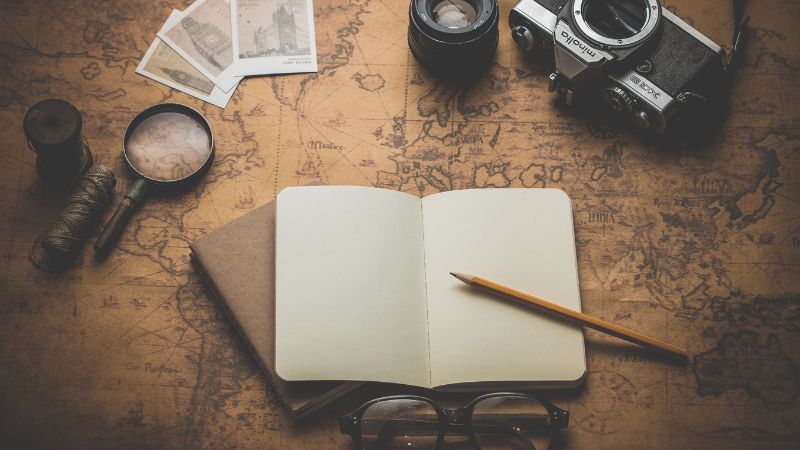
Basic French Phrases For Conversations
These basic words and phrases are the first level of interactions while traveling and probably the words you will use the most in everyday conversations. So pay special attention to them!
These basic words and phrases are the first level of interactions while traveling, and probably the words you will use the most in everyday conversations. So pay special attention to them!
Basic French Phrases For Directions
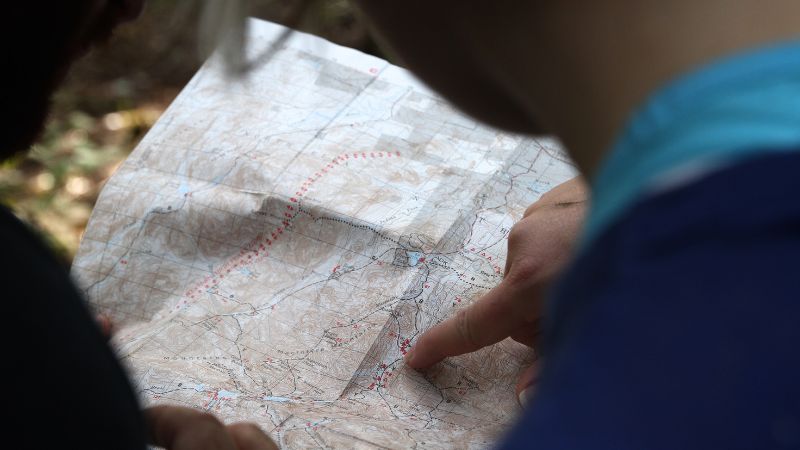
Are you lost in a big city with no phone service? Whip out these basic phrases for directions to get someone to point you in the right direction and save yourself a headache.
Basic French Phrases For Money & Shopping

France is known for its opulent, high-end clothes and style. You’ll definitely be tempted to shop in all the beautiful boutiques, so learn basic phrases for money and shopping. Want to learn more about this topic? Check out Shopping Vocabulary In French: 20+ Useful Phrases & Expressions .
Basic French Phrases For Transportation

France has an excellent public transport system, so you’ll most likely be taking trains and buses while traveling through. These are some phrases to help you get by.
Basic French Phrases For Instruction

These French phrases will help you find the bathroom, the nearest grocery store, or wherever else you need to go. These are easy to pop out while walking or sightseeing, so keep them in mind!
Basic French Phrases For Dining
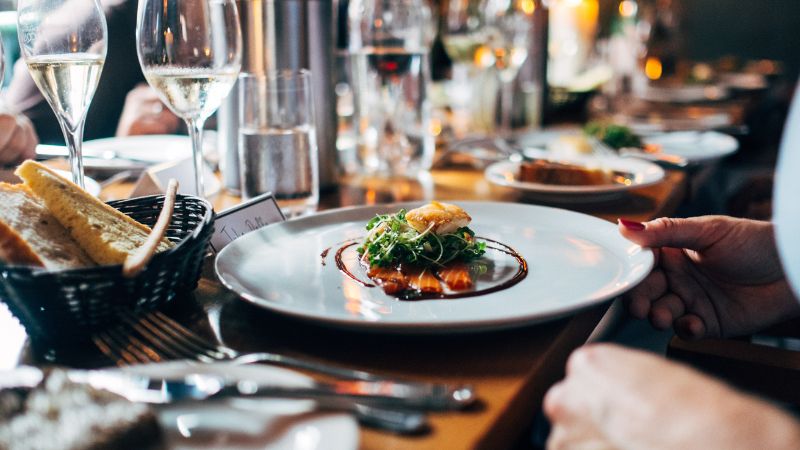
Food is a huge part of French culture, so when you’re fine dining, you’ll definitely want to know some basic phrases to fit in and avoid any awkward situations.
Final Thoughts

Whew! I know that is a lot of information, but take it one category at a time to learn these basic French words and phrases for travelers. Trust me, when you’re in France you’ll want to speak French! Not only is it a beautiful language, but French speakers find it extra respectful when you speak French to them.
Interested in learning more French but need specific, targeted resources? Download the Ling App ! It is a user-friendly language-learning app with games, quizzes, and interactive features proven to help you learn a new language.
You can download it for free on the App Store and Play Store . What are you waiting for? If you start today, you’re one step closer to being prepared for your traverse through France.
Want even more resources? Check out #1 Best Guide: French Vocabulary To Use At The Airport & French .
Leave a Reply Cancel reply
Your email address will not be published. Required fields are marked *
Save my name, email, and website in this browser for the next time I comment.

People also read

Hi In Spanish: 20+ Easy Phrases To Sound Like A Native

15-Minute Program Makes Learning Spanish Child’s Play

10+ Spanish Sports Vocabulary: Sports In Latin America

How To Introduce Yourself In Spanish: #1 Best Practical Guide

7 Days Of The Week In Spanish: Easy Guide

How To Tell The Time In Spanish & 30+ Useful Terms
What makes learning with ling special, interactive exercises.
Improve your pronunciation by starting a conversation with our app’s interactive chatbot
Engaging activities
Practice your skills with mini-games and track your progress with fun quizzes
Mix of languages
Choose from over 60 languages, both big and small, and listen to audio from native speakers
Proven results
Backed by linguistic research, our learning methods can help you achieve fluency in record time
Southeast Asia
East europe.
© 2024 Simya Solutions Ltd.
Real French for Travelers
On your own schedule. at your own pace..
Real French for Travelers Complete Online Course gives you that freedom. Learn from someone who’s been in your shoes, not from a corporation. It’s easier than you think, especially with short, clear videos that’ll show you exactly how to say things and what it all means.
Choose among three options: the complete course, just the Foundations (Part 1) , or Situational French for Travelers (Part 2) to go deeper.
Why learn French?
(it’s easier than you think.).
You won’t have to ask, “Do you speak English?” anymore, and won’t that feel good? (You’ll love it. And feel proud of yourself.)
You’ll do things differently than your fellow tourists because you’re making the effort to learn like an insider. You don’t need to be fluent to do this. You can learn a basic French framework then build as you go. Step-by-step.
What’s even better than a phrasebook?
Real French, that’s what.
Get the complete course or just the first (or second ) half.
Scroll down to access two free sessions!
It’s the closest you can come to learning French in Paris.
(Café au lait not included …)
With real French, you KNOW what you’re saying, and others do, too. You can BUILD on what you learn because it’s real French. Real grammar. Real vocabulary.
Real. Isn’t that better? Especially when it comes to communicating with other people.
Read road signs and menus, ask for directions, ask for help if you’re lost or have a problem, or even strike up a simple conversation with a French person. (By the way, they love it if you make the effort to learn their language. You’d feel the same way.)
Real French for Travelers: The complete online course. Or the basics. Or Part 2, if you’ve had some French. Whichever you choose, it’s yours to keep. Review, practice, and master (all for the price of about 4 lessons with a private tutor) in as little as 8 weeks.
Unlike other French programs, it’s designed specifically for travelers.
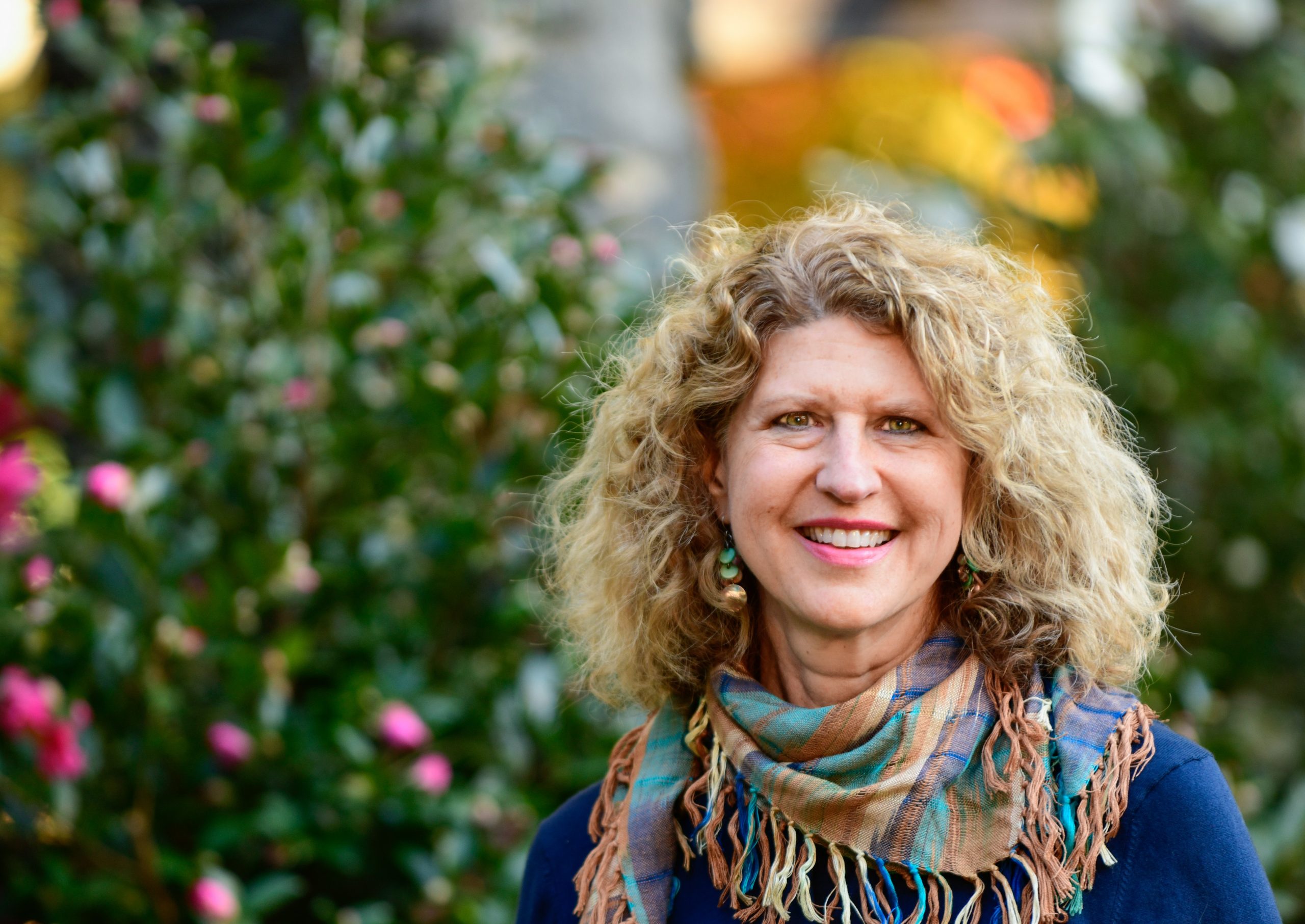
I’m Kyle and I’ll be your teacher for this course.
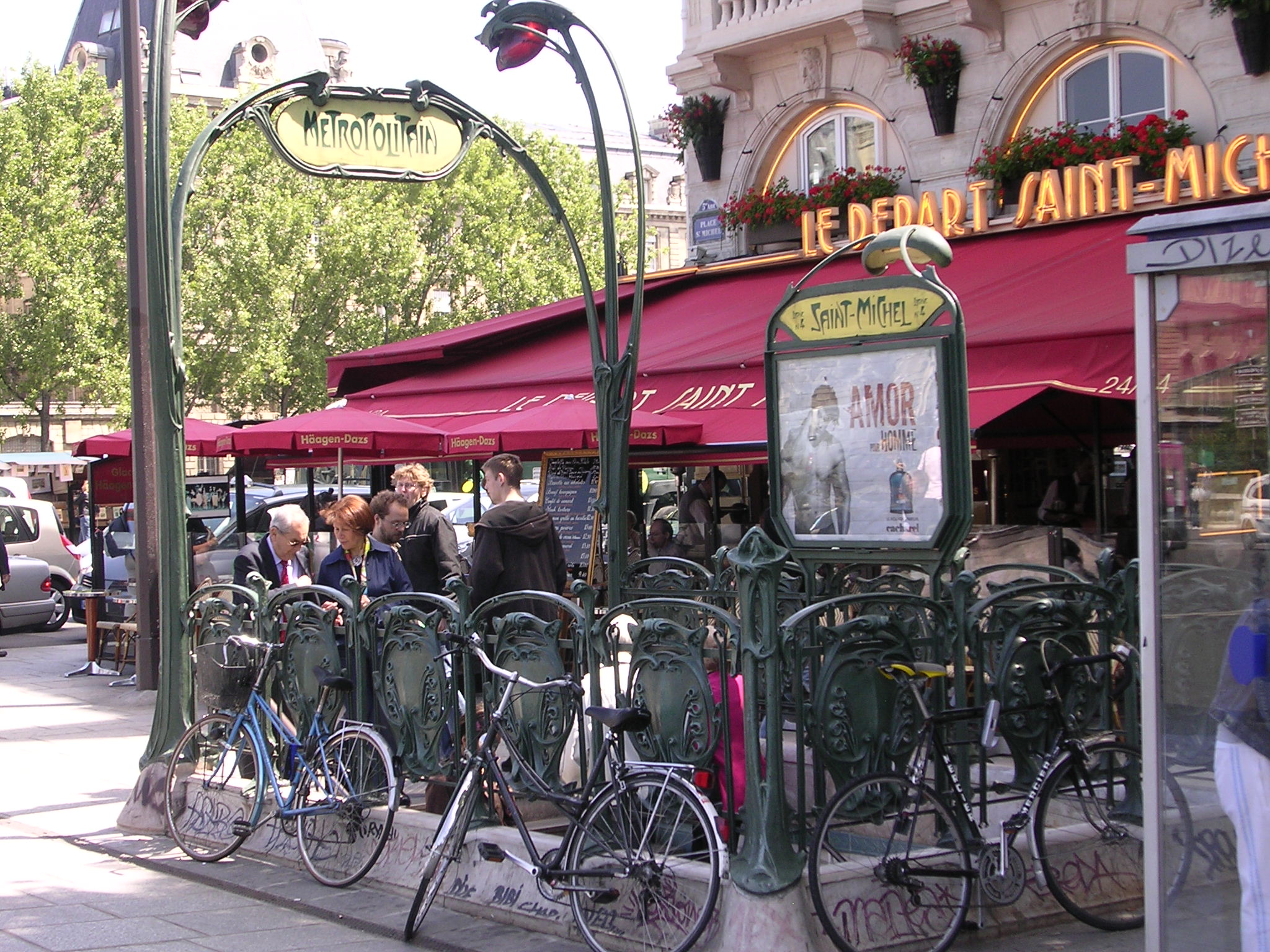
Real French in short, clear lessons. No intimidation here.
A course for travelers..
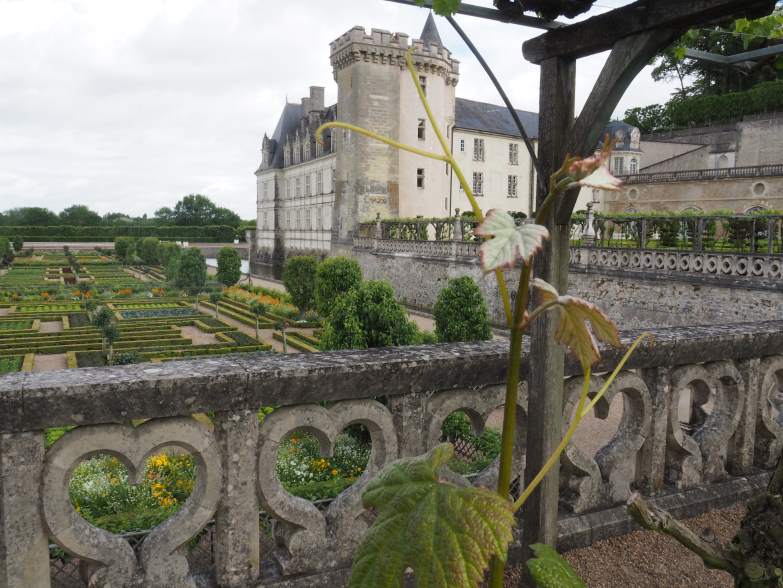
Real French for Travelers Complete Online Course
Includes: , clear, concise videos from zero to past tense. (42 in all), travel-oriented vocabulary covering a variety of situations, dialogues of realistic travel situations, downloadable reference (cheat) sheets, exercises for mastery with answer key, helpful travel tips throughout the course, quick-start phrases after each section give you a head-start in communicating, exercises to help you in listening comprehension, comprehensive pdf workbook that accompanies the videos, full 30-day money-back guarantee if you’re not happy with the course.
What students say
“ Real French for Travelers” online training is excellent! This training provided the right topics at the right pace for me to learn French.” -Cris L.
“i’ve tried a few other resources, but this one was the most comprehensive and easy to follow for a beginner. it’s well laid out, the workbook and exercises are helpful, the pronunciation is clear and easy to repeat, love the vocabulary cheat sheets and travel tips.” -shanna b., “ i highly recommend this teaching platform for beginner as well as advanced students. it can also be an excellent refresher for those who have not studied french for some time. this course will make your visit to paris much more enjoyable without the angst of not having years of french study. bon voyage” -julia w ..
For questions about the course, write to: [email protected]
www.Oliversfrance.com

20 Basic French Travel Phrases for Beginners

When traveling to a French-speaking country, having a basic understanding of the local language can greatly enhance your experience.
Learning a few essential French travel phrases not only enables you to communicate with locals but also shows respect for their culture and makes your interactions more enjoyable.
Today, we will introduce you to 20 basic French travel phrases that are perfect for beginners. Each section will focus on a specific category of phrases, providing translations, guidance, and example usage.
We will leave you with some tips for learning French at home. Follow this guide, and you'll be speaking French in no time.

20 French Travel Phrases
Let's dive into our comprehensive list of 20+ essential French phrases so you have the tools necessary to make yourself understood in France.
We will kick things off with greetings and polite expressions so you can conduct yourself well on your trip to France.
Greetings and Polite Expressions
When interacting with locals in a French-speaking country, it's important to start with a friendly greeting.
- Bonjour - Hello
The phrase bonjour is the most common and widely used greeting in French. It sets a positive tone for your conversation. You can use this greeting all day.
- Bonsoir - Good evening Bonne soirée - Have a good evening Bonsoir is used in the evenings, from around 6 pm onward as a greeting. Meanwhile, bonne soirée is used to express the desire that someone else will have a nice evening.
- Bonne nuit - Good night Just as in English, you would use bonne nuit as "good night" before going to bed.
- Au revoir - Goodbye When leaving someone at any time of day, au revoir is a polite and pleasant way to say "goodbye."
- Comment t'appelles-tu? - What's your name? (informal) Comment vous appelez vous? - What's your name? (formal) Quel est ton nom? - What is your name? (informal) Quel est votre nom - What is your name? (formal)
Once you have greeted someone, you can ask "What is your name?" either formally or informally, as the situation dictates.
- Je m'appelle... - My name is…
- Je viens de ... - I come from... La France - France L'Allemagne - Germany L'Espagne - Spain Le Royaume-Uni - The UK Les États-Unis - The US
- (Comment) ça va? - Are you alright? (most informal) Comment vas-tu? - How are you? (informal) Comment allez vous? - How are you? (formal) To show interest in someone's well-being, ask "How are you?" It's a common way to initiate a friendly conversation and display your courtesy. You can reply to ça va? with ça va or ça va bien , both of which mean "I'm alright". Or, use je vais bien , which also means "I'm alright".
- Merci - Thank you Learning to say "thank you" in the local language wherever you go will endear the natives to you. On your trip to France, you will find yourself saying merci all the time.
For instance, with the phrase ça va bien, merci. Et toi?, meaning "I'm good, thanks. And you?"
- De rien - You're welcome If someone thanks you in a French-speaking country, the standard reply is de rien .
- S'il vous plaît - Please (formal) S'il te plaît - Please (informal) When asking for something in a hotel, restaurant, among friends, or in any other situation, it is always best to say "please". As you can see, there is a more formal and less formal way to say "please". Use the informal with friends, and the formal in other social situations. If you are ever in doubt about whether to use formal language, it is best to err on the side of caution and go for the formal structure.
- Je suis désolé - I am sorry It is always worth knowing how to say sorry if you need to apologize for anything in French, for instance not understanding something or not knowing the answer to a question.
- Je ne comprends pas - I don't understand Je ne sais pas - I don't know
Can You Speak English/ French?
With the following phrases, you can swap out anglais ("English") and français ("French") with any other language, as needed.
- Pourriez vous parler français - Could you speak French?
- Parlez vous anglais? - Do you speak English?
- Je ne parle pas français - I don't speak French
- Je parle un peu français - I speak a little French
- Parlez lentement, s'il vous plaît - Speak slowly, please
Useful French Travel Phrases
One of the most important things to learn in French is how to ask for directions. Let's look at some common questions in French regarding directions.
- Où est la plage/ le gare - Where is the beach/ the train station You can use où est...? for any other singular object, such as la tour Eiffel ("the Eiffel Tower") and le bus ("the bus"). Just make sure to note the gender of the object so you use the right article.
- Où est le guichet? - Where's the ticket booth? Note that you can also say je cherche... , which means "I am looking for..."
- Où sont les toilettes? - Where are the toilets?
- Où sommes-nous - Where are we? As you can see, où means "where" in French. This is followed by a conjugated form of the verb "to be", être , and the object of the sentence.
- Excusez moi, je suis perdu - Excuse me, I am lost Finally, a handy phrase to know is "excuse me, I am lost". It's a good idea to keep a copy of your hotel information on your person so you can show people if you need help directing yourself home.
Miscellaneous Common French Phrases
Now that you have learned 20 French phrases for travel, we will list some other miscellaneous French phrases for everyday life in a French-speaking country.
- Je t'aime - I love you You will come across je t'aime in music, movies, and even on t-shirts, so it is worth knowing what it means. And you never know - you might want to use this French phrase yourself when you get to Paris, the city of love.
- Es-tu célibataire? - Are you single?
- Je ne sais quoi - I don't know what Paris is known as a romantic destination as it has a certain je ne sais quoi in the air that makes it so unique and magical.
- Je voudrais (un café) - I would like (a coffee)
- Un verre de vin - A glass of wine When in France, you will want to get your hands on a coffee or a wine as soon as you find the right spot to sit and people-watch.
- Je voudrais acheter... - I would like to buy…
- Combien ça coûte - How much does it cost?
- C'est trop cher - It's too expensive
Asking a question in French
Finally, a note on forming a French question. In general, to ask a simple question in French, you can use est-ce que. Take a look at the following basic French phrases.
- Est-ce que vous parlez français? - Do you speak French?
- Est-ce qu’il parle français? - Does he speak French?
- Est-ce qu’elle parle français? - Does she speak French?
How to Learn French at Home
So, now that you have this useful vocabulary list to get you started, you will want to know how to start learning French at home. One great method is to watch French TV shows and movies.
This provides natural exposure to French slang and colloquialisms , idiomatic phrases, the French accent, and French culture. You can find great French shows on Netflix and Lingopie. Both streaming services offer French and English subtitles, and Lingopie has bonus language-learning features like digital flashcards and an interactive transcript.
You can also listen to French podcasts and French songs like La Vie en Rose and Je ne Regrette Rien. Any engaging resource that familiarizes you with French pronunciation and introduces you to new French words in a natural way is a great language tool.
Of course, you can also sign up for online French classes or find a private tutor. Many language learners also enjoy using language-learning apps to supplement their learning. You can also buy a French phrasebook if you want to have all of your useful French phrases in one place.,
FAQs About French Phrases for Travelers
Now, let's take a quick look at some frequently asked questions about basic French phrases for travel.
Is there another way to ask "où sont les toilettes?"
Yes, there is another way to ask où sont les toilettes? which means "Where are the toilets?" You can also say où est la salle de bain? , which means "Where is the bathroom?"
Both are appropriate in public and formal situations.
Is it rude to say "je ne comprends pas" in French?
No, it is not rude to say "I don't understand" in French. You can make the statement more polite by saying je suis désolé(e), je ne comprends pas , meaning "I'm sorry, I don't understand".
You might want to add répétez s'il vous plaît , meaning "can you repeat, please", or je ne parle pas français , "I don't speak French."
How do you say "s'il vous plaît" informally?
The phrase s'il vous plaît ("please") literally translates as "if it pleases you", but it is used like "please" in English. You can say "please" informally in French by switching out the vous ("you" - formal) for te ("you" - informal). So, it sounds like s'il te plaît.

Summing Up: Basic French Travel Phrases
Now that you have started to learn these 20+ basic French words and phrases, you are ready to dive into the French language and start practicing today.
Whether you're asking for directions, ordering food, or engaging in basic social interactions, these phrases will serve as a valuable tool during your journey.
French learners can head over to Lingopie's streaming site for access to a host of awesome French TV shows and movies with interactive learning features.
Your language-learning journey starts today with the help of Lingopie and this comprehensive vocab guide. Have fun learning French at home.

Milena Andrade

Learn German with How to Sell Drugs Online (Fast)

Best Podcasts To Learn Portuguese
You might also like.
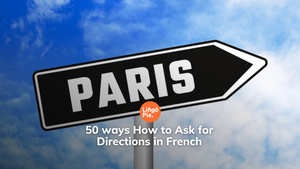
50 ways How to Ask for Directions in French

18 French Pick Up Lines Every Learner Should Know

Human Body in French: A Guide to 30 Essential Terms

French Animal Sounds: A Fun Way to Learn French
Get the secret guide to language learning with tv and music for free, browse posts by popular tags.

French translation of 'travel'

Browse Collins English collocations travel
Video: pronunciation of travel.

Examples of 'travel' in a sentence travel
Trends of travel.
View usage for: All Years Last 10 years Last 50 years Last 100 years Last 300 years
Browse alphabetically travel
- traumatized
- traumatology
- travel agency
- travel agent
- travel arrangements
- All ENGLISH words that begin with 'T'
Related terms of travel
- travel pass
- rail travel
- travel book
- View more related words
Quick word challenge
Quiz Review
Score: 0 / 5

Wordle Helper

Scrabble Tools


25 places other than France where speaking French is helpful
Posted: January 8, 2024 | Last updated: January 8, 2024
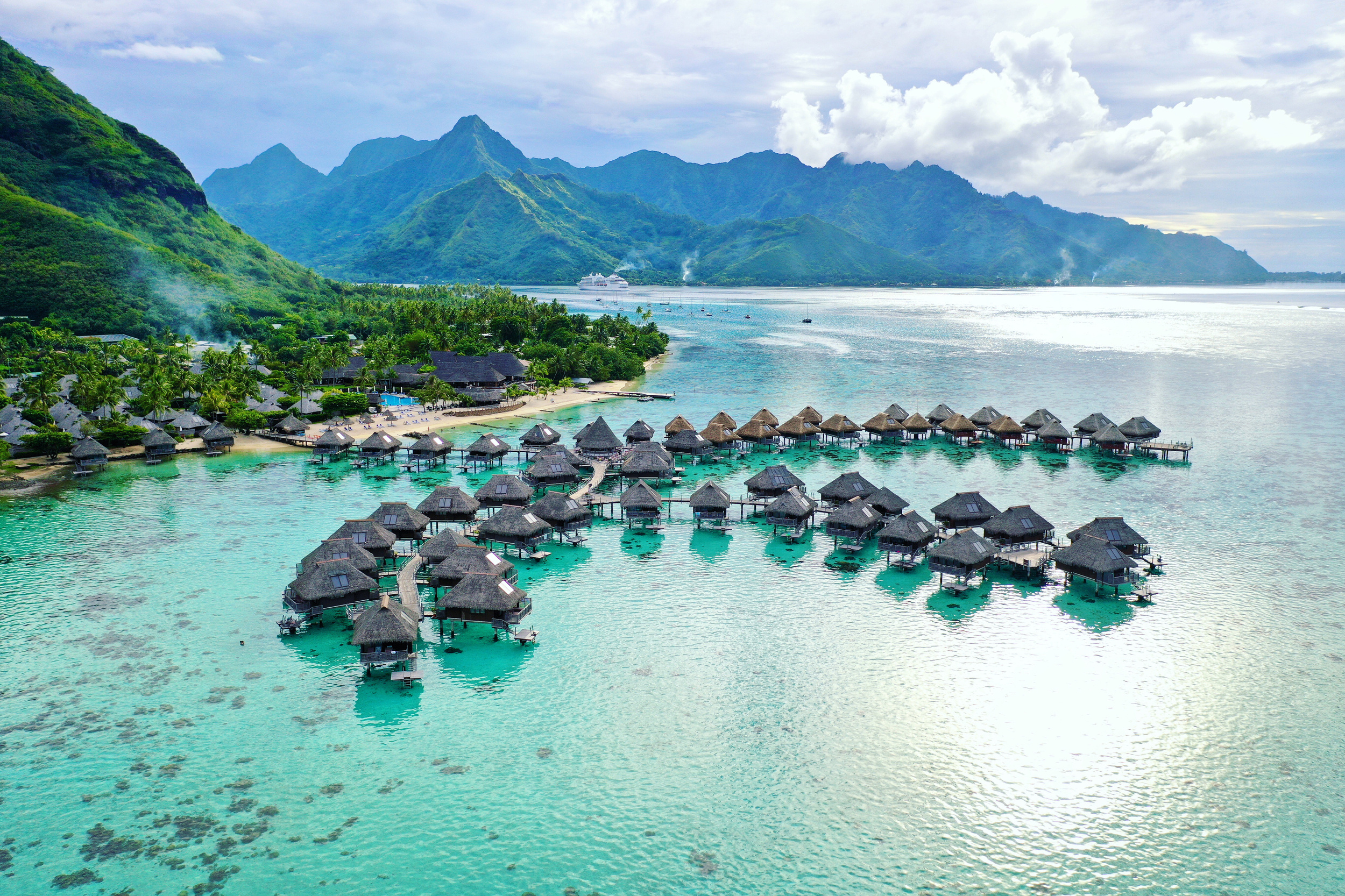
Speaking another language is always helpful, especially if you love to travel. And French, commonly thought of as one of the most beautiful in the world, is also more useful than you might realize. Here are 25 destinations outside of France where you can put your French language skills to good use!
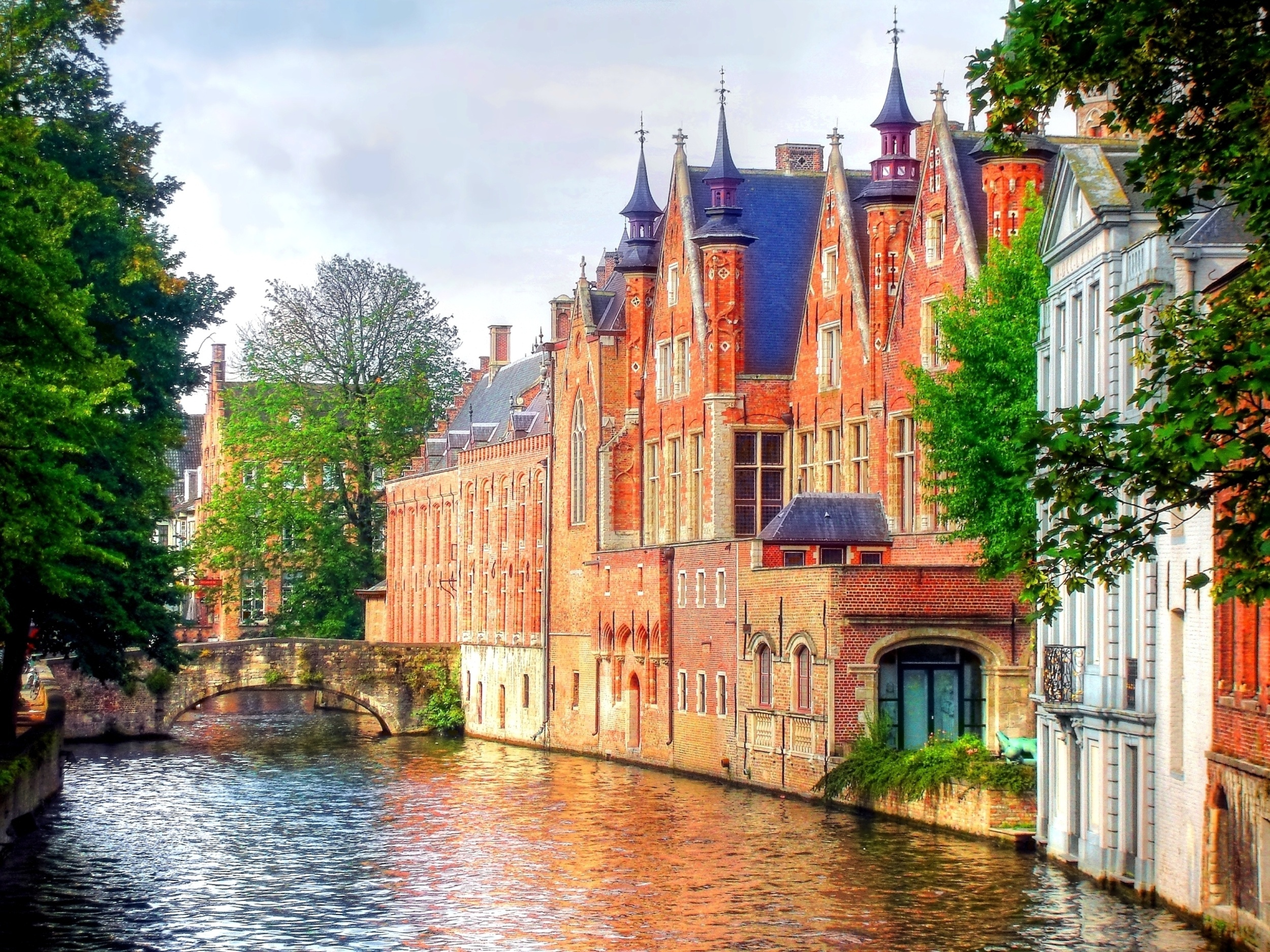
Home to delicious beer, chocolate, waffles, and fries (no, they actually didn’t originate in France), Belgium is also a French-speaking country. The language is one of three officially spoken in the country; the other two are Dutch and German. French is mostly spoken in the capital, Brussels, and in the south of the country.
You may also like: 15 weird & wonderful roadside attractions in the United States
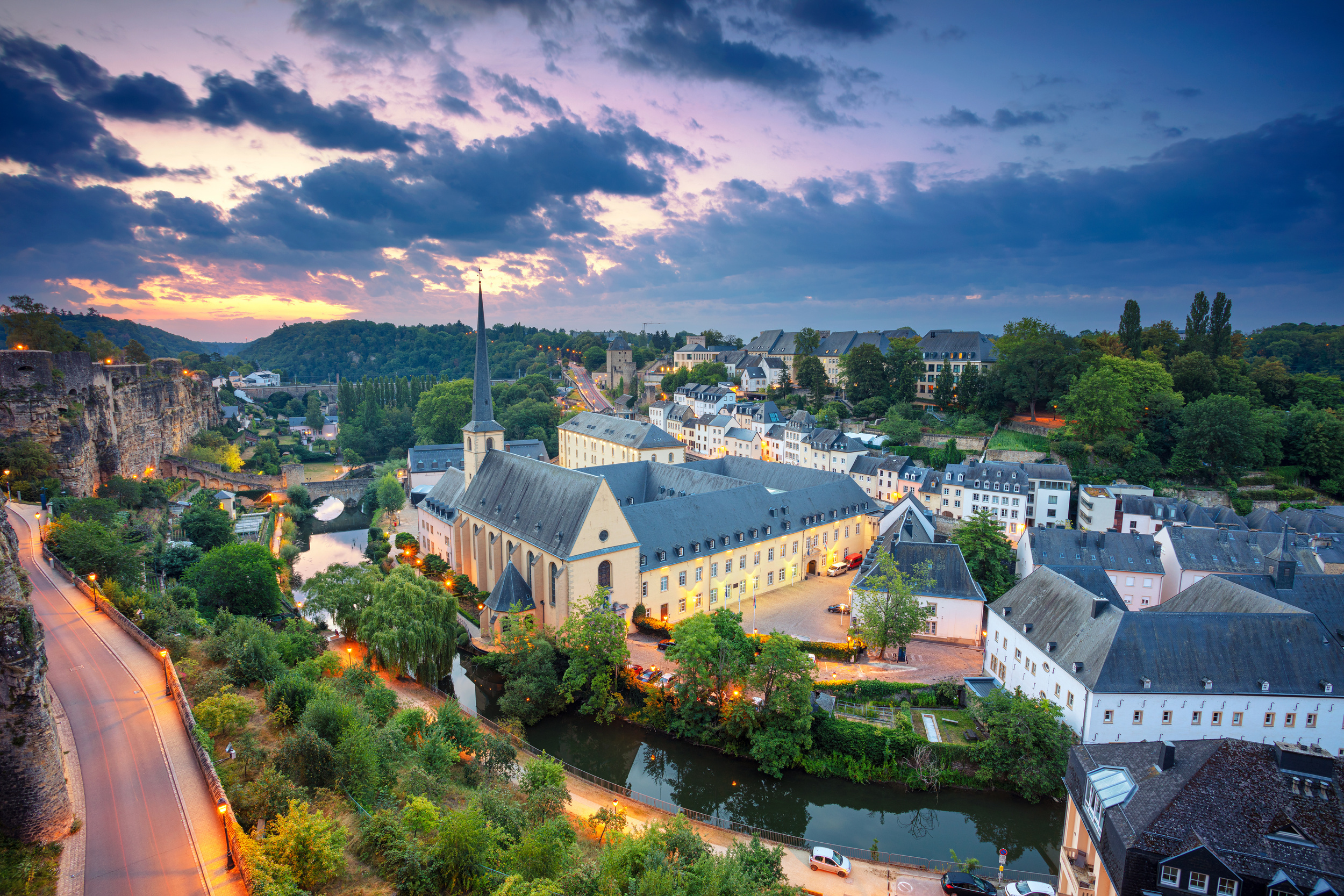
Another multilingual state that borders France, the Grand Duchy has French, German, and Luxembourgish as official languages. However, French is one most commonly used on signs and in written communication in the country. You’ll also find it most helpful for small talk and chatting with residents.
Follow us on MSN to see more of our exclusive lifestyle content.
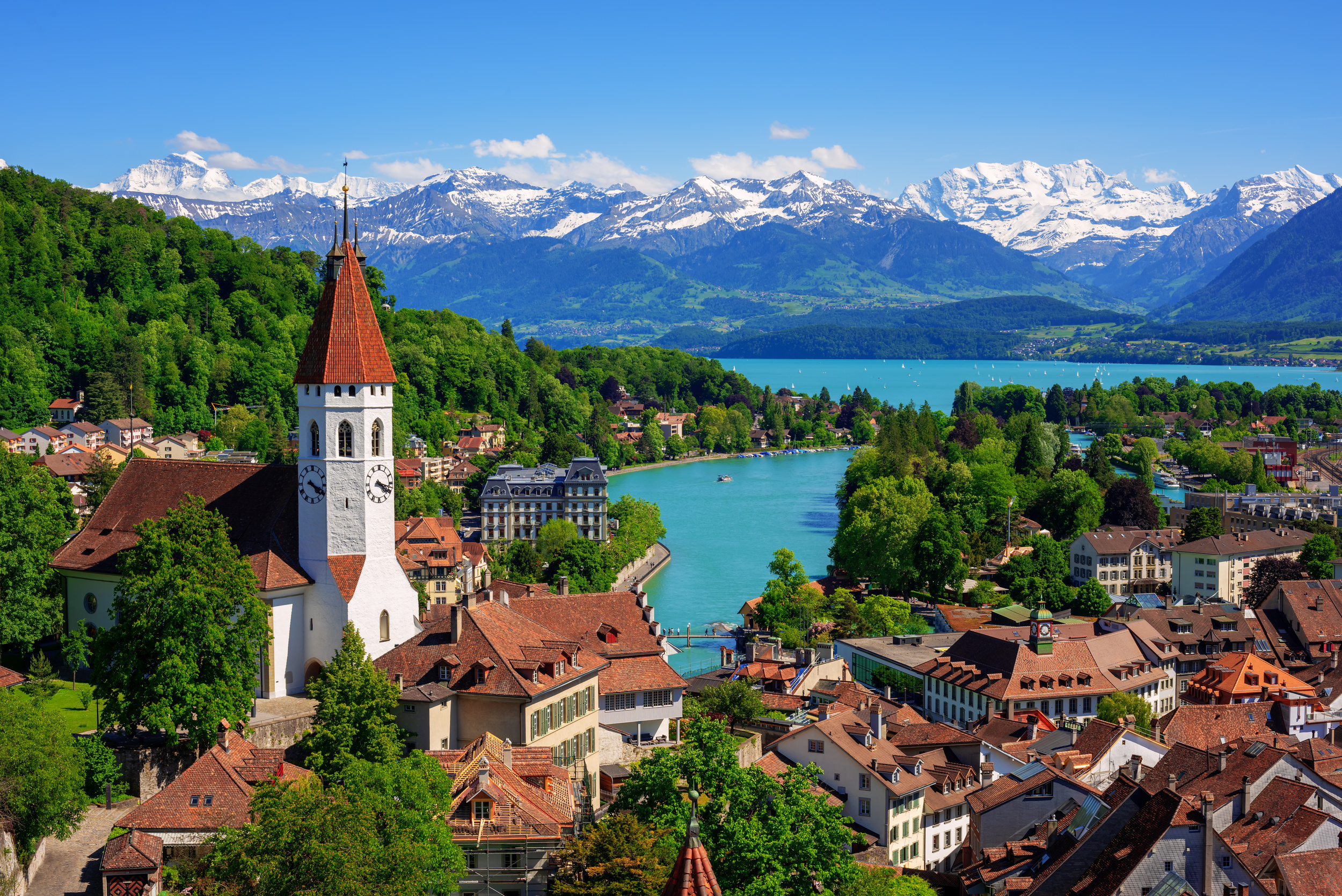
Switzerland
Yet another European country with French as one of the official languages (the others are German, Italian, and Rhaeto-Romance). You’ll find French most useful in Geneva and the surrounding area, although it’s used throughout Switzerland.
You may also like: Layered dips you can make that will feed the whole team
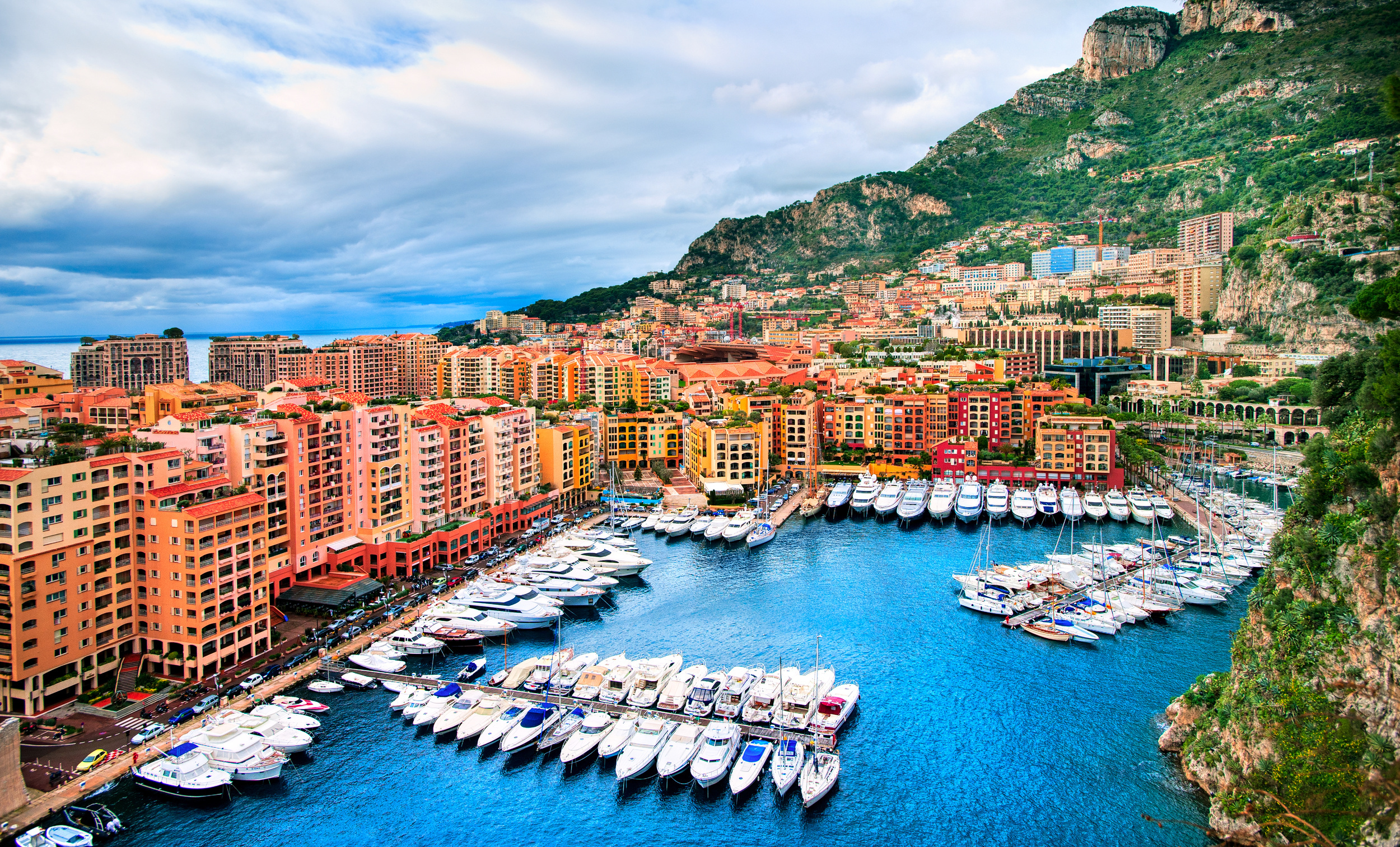
Many people make the mistake of assuming that this tiny state is a part of France. And while Monaco is surrounded by its’ much larger neighbor and uses the French language, it is a sovereign city-state with a monarchy. There is also a Monégasque language that has official status.
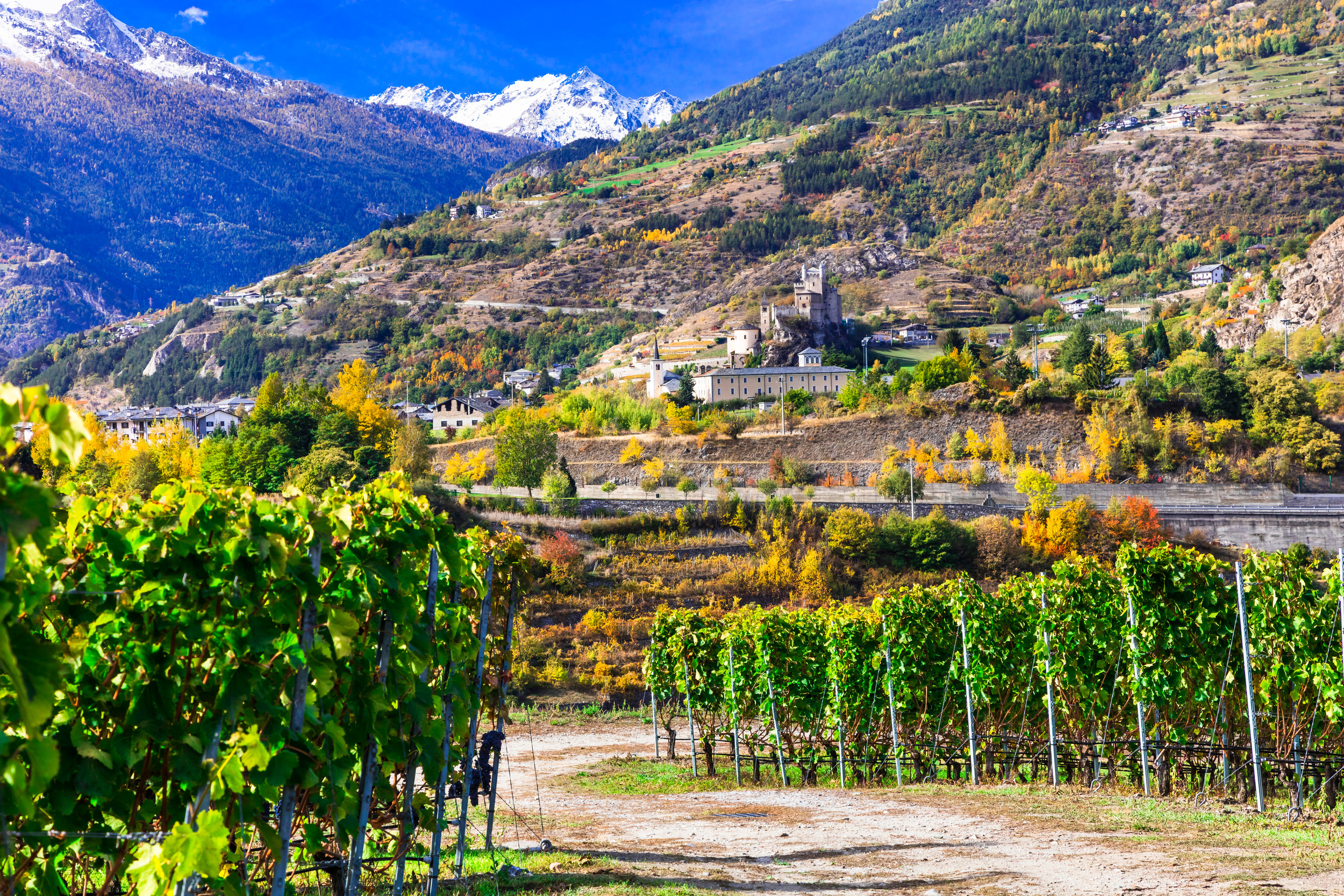
Aosta Valley
This region of Italy is located in the northwest of the country, near France. Latin was replaced by French as the official language after the fall of the Roman Empire and then, in the 19th century, was replaced with Italian. Today, the region is bilingual, and you’ll see French and Italian written on road signs and hear the two spoken by locals.
You may also like: 13 foods & drinks that cause bad breath and 13 that combat it
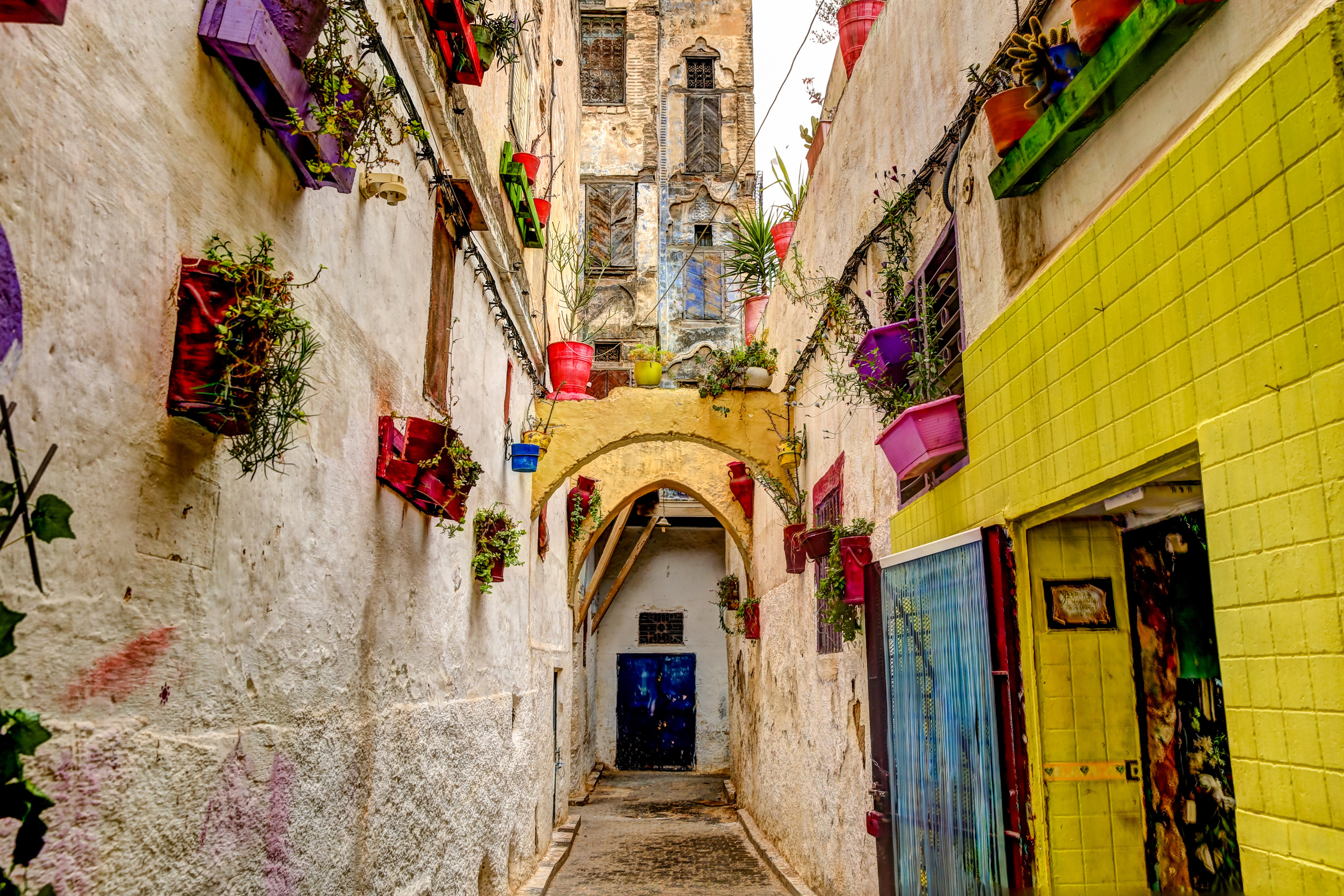
The French Empire had a strong presence in North Africa, and thus many nations in the region still use French as an official language. Morocco is one of these, and French is widespread along with Arabic and various Berber dialects. As a visitor, you’ll find it extremely useful when speaking to locals or reading signs and menus.
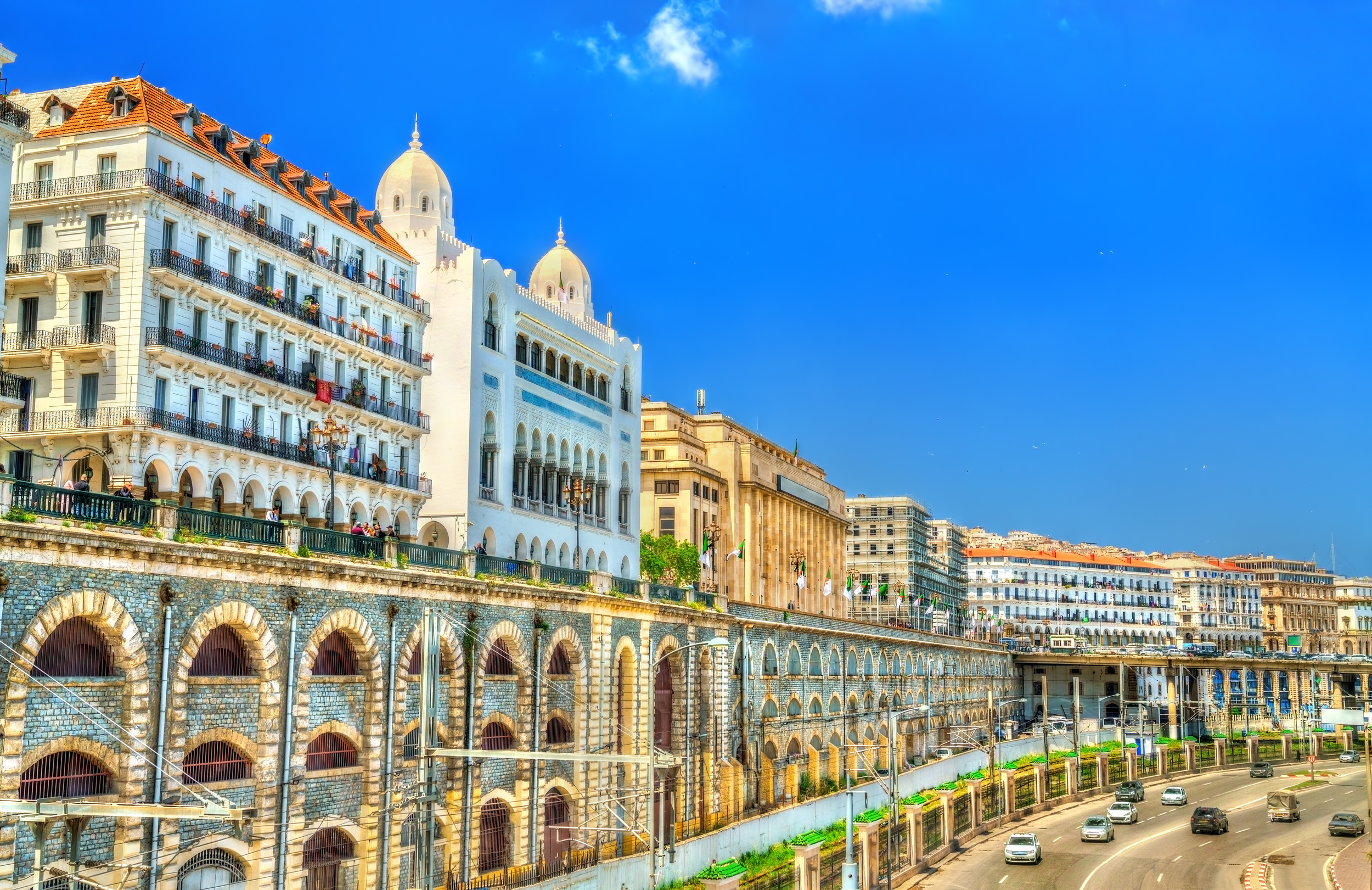
Algeria’s official languages are Arabic and Berber, but French is also commonly understood. While not as widely used as in neighboring Morocco, it will be your best bet if you don’t speak one of the official languages.
You may also like: 20 ingredients that will make your grilled cheese even better
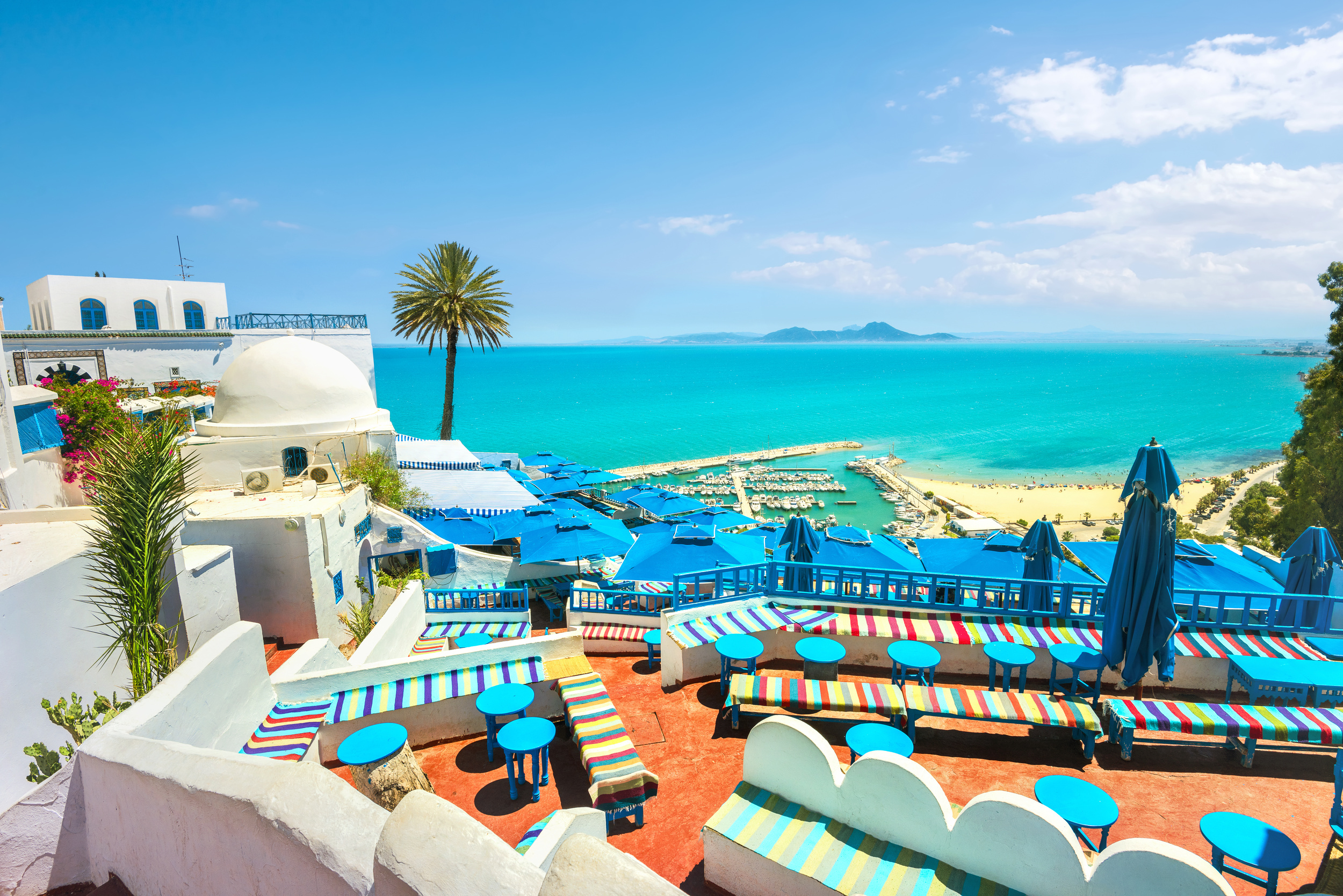
Another former French colonial outpost, the language is used and understood throughout the country in addition to Arabic and Tunisian. It’s estimated over half the population speaks French, and it’s the teaching language of high schools in the country.
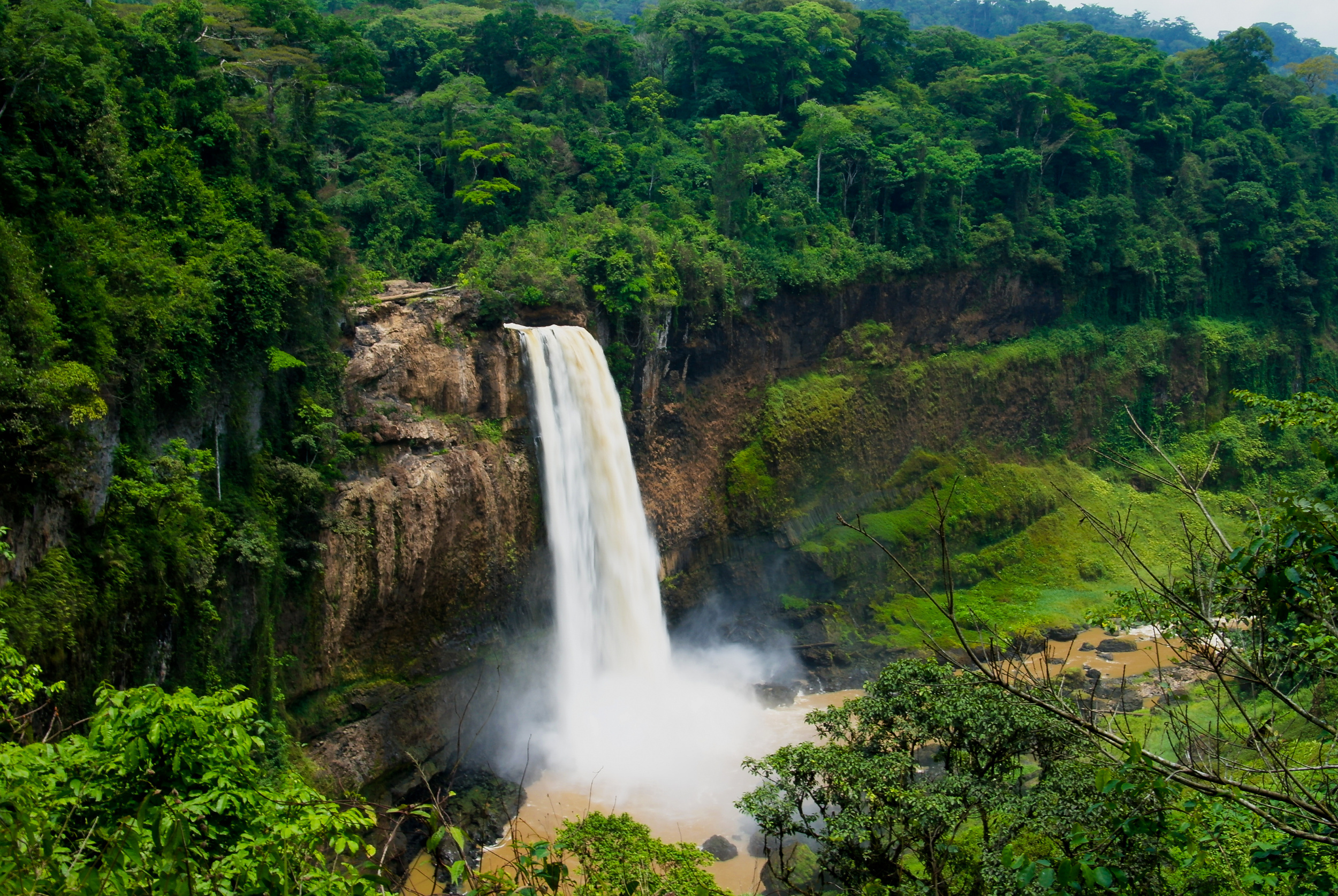
Cameroon was a colony of both the UK and France in the early 20th century. So, English and French are spoken in the country. However, French is the most prevalent, with eight of 10 regions considered Francophone. Locals also speak numerous other indigenous languages.
You may also like: 20 beauty and skincare hacks that actually work
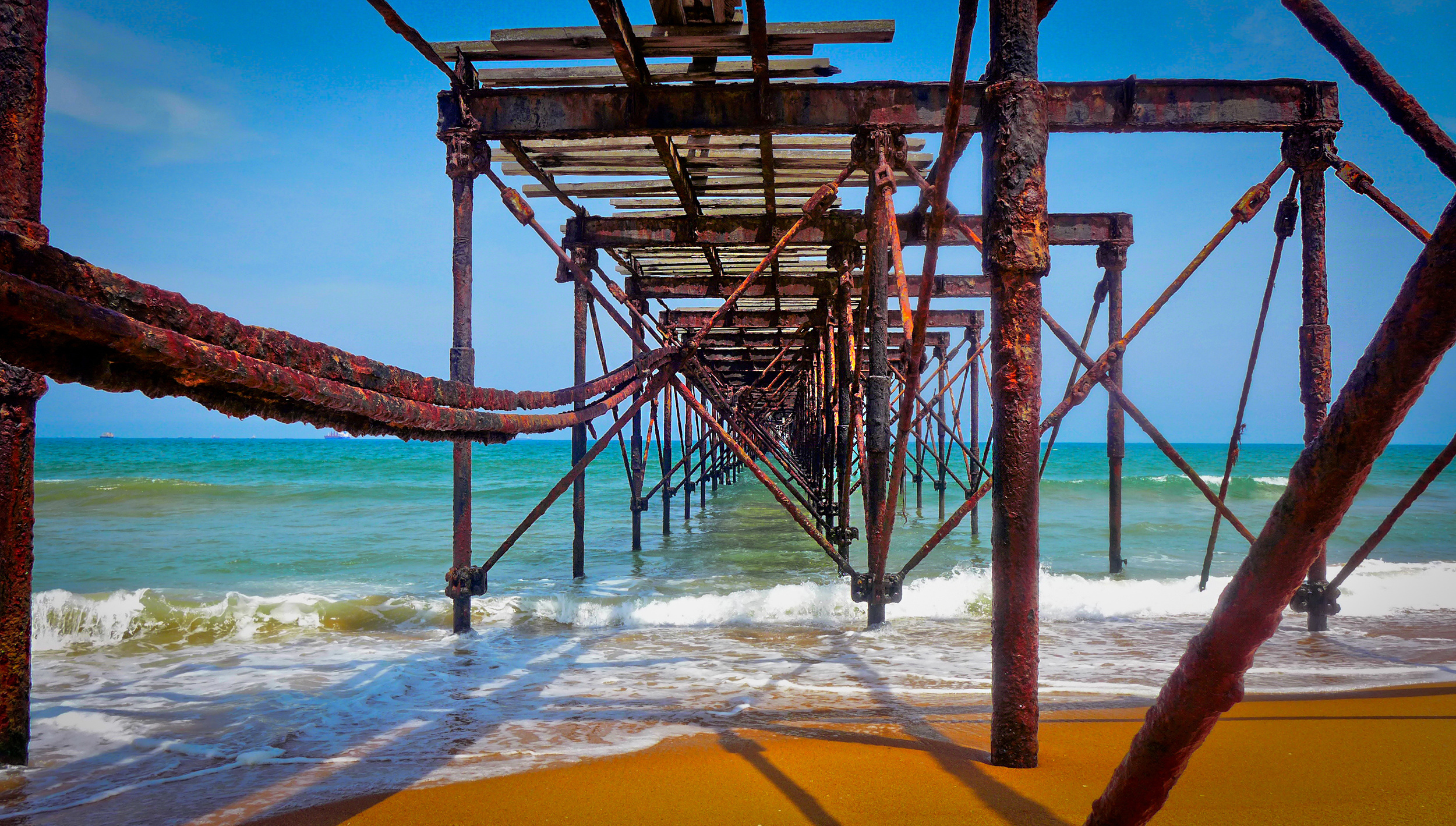
Ivory Coast
Known as “Côte d’Ivoire” in French, this coastal nation uses the old colonial language as the official one. Additionally, numerous indigenous languages also have recognized status in the Ivory Coast.
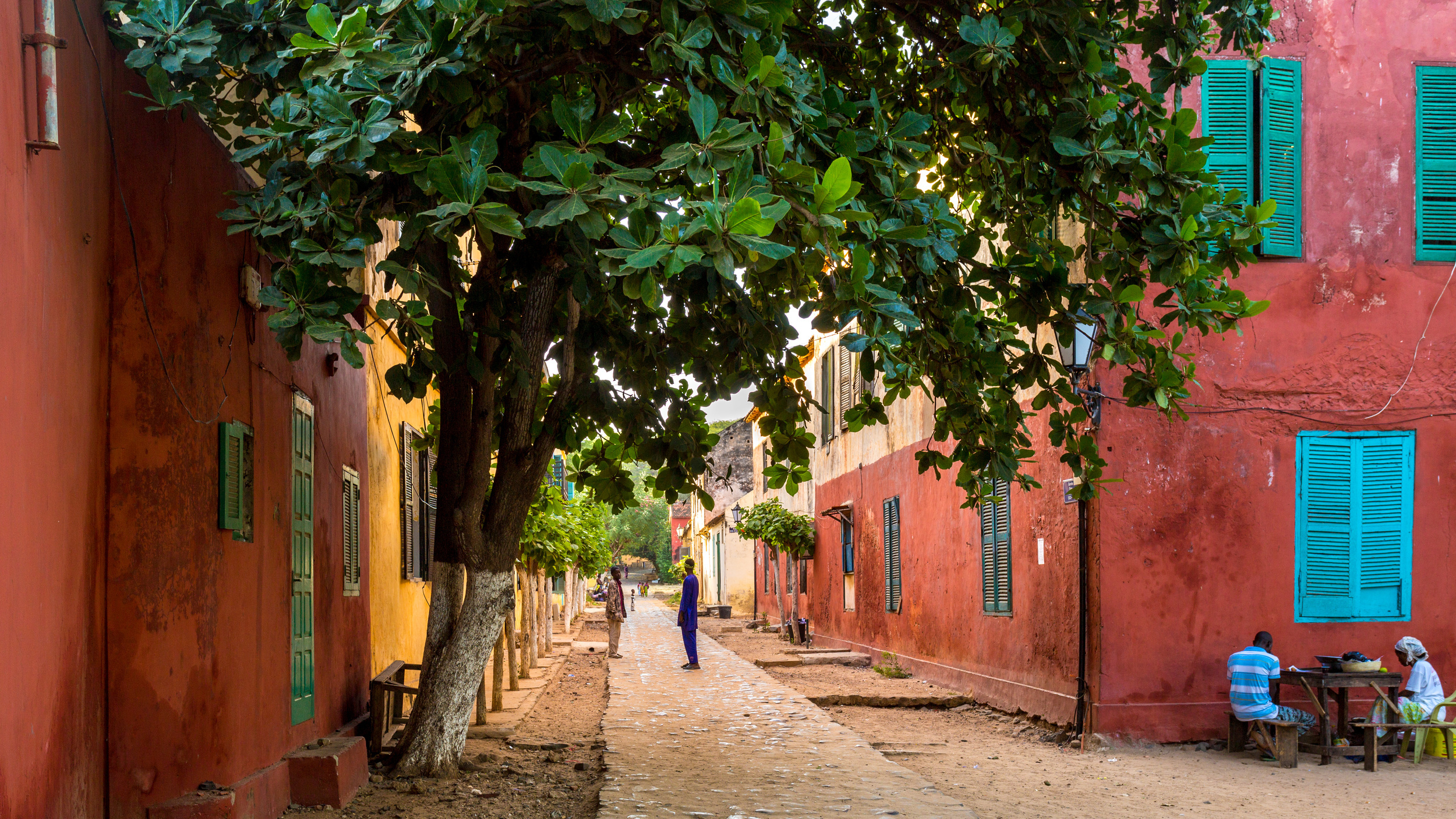
Senegal has six recognized indigenous languages, the most well-known and commonly spoken is Wolof. However, French is still the official language of the country despite Wolof being more widely used and understood.
You may also like: Add these 20 unusual U.S. destinations to your travel bucket list
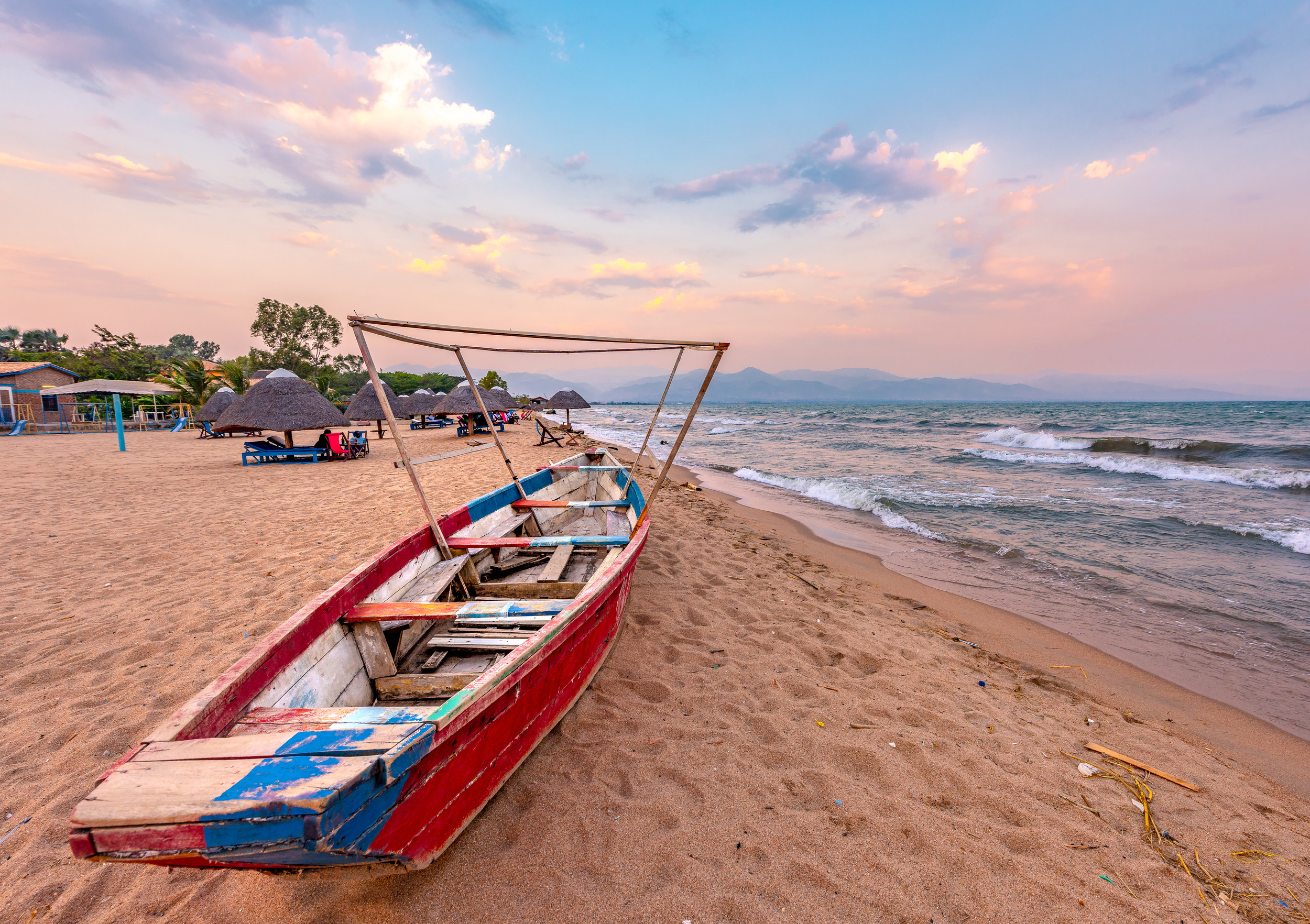
Yet another multilingual former French colony, Burundi has three official languages. In addition to French, Kirundi, and Swahili are recognized by the government. In 2014, English also gained status in the country.
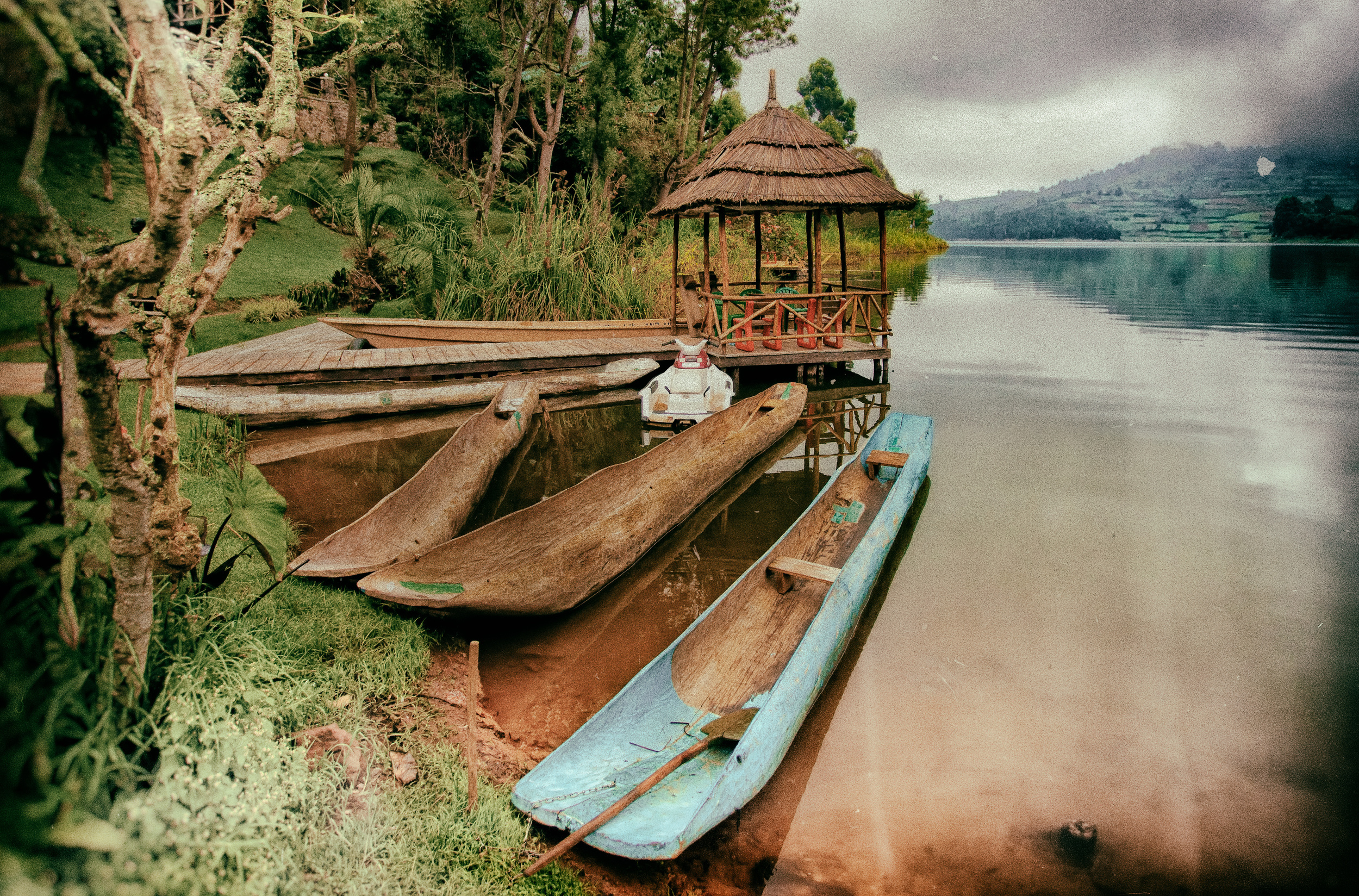
Republic of the Congo
Also known as the Congo or Congo-Brazzaville, it is not to be confused with its neighbor, the Democratic Republic of the Congo. Formerly known as the French Congo, due to colonization, the language is still the official one of use to this day. The local Bantu language, Kituba, Lingala, and numerous other indigenous languages are also widely spoken.
You may also like: 20 cookies you probably never tried before (but should!)
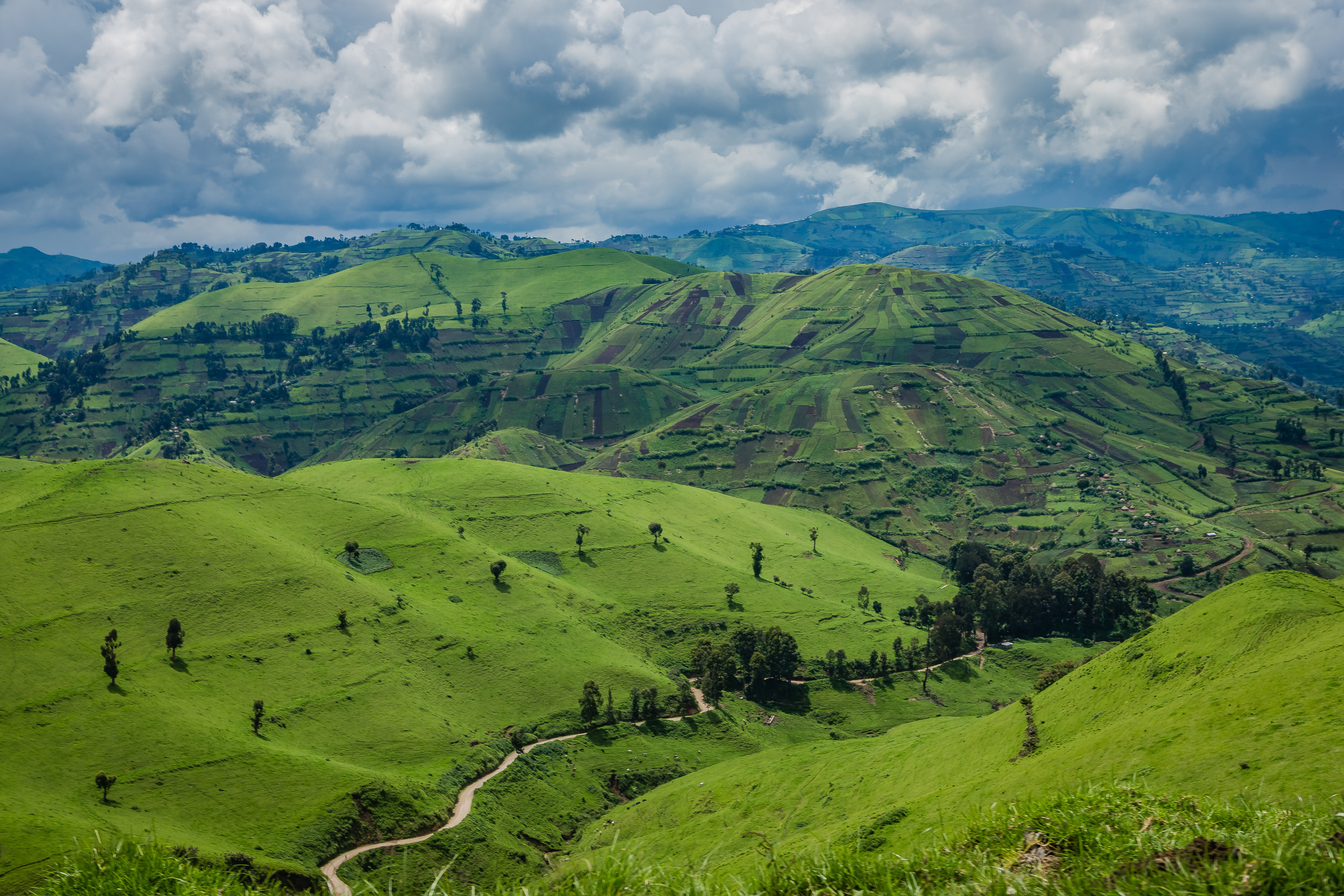
Democratic Republic of the Congo (DRC)
The DRC has four main languages: Kikongo (Kituba), Lingala, Swahili, and Tshiluba. However, as a former Belgian colony, French is still widely used and understood.
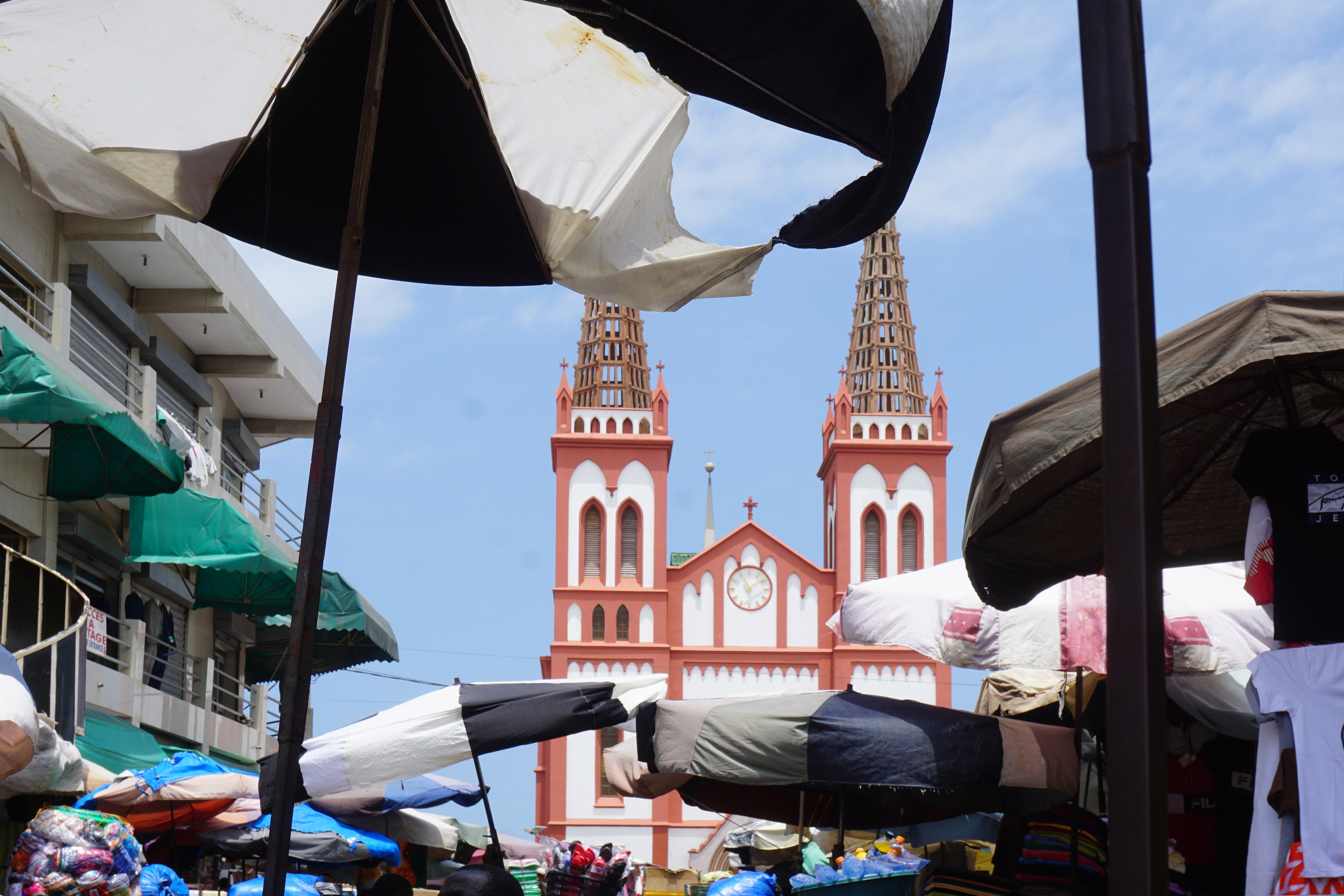
Togo is a very multilingual country, and in addition to the official language, French has over 40 in use throughout the country. Many signs will be in French, and most locals speak some.
You may also like: 25 gameday snacks you can make in a slow cooker
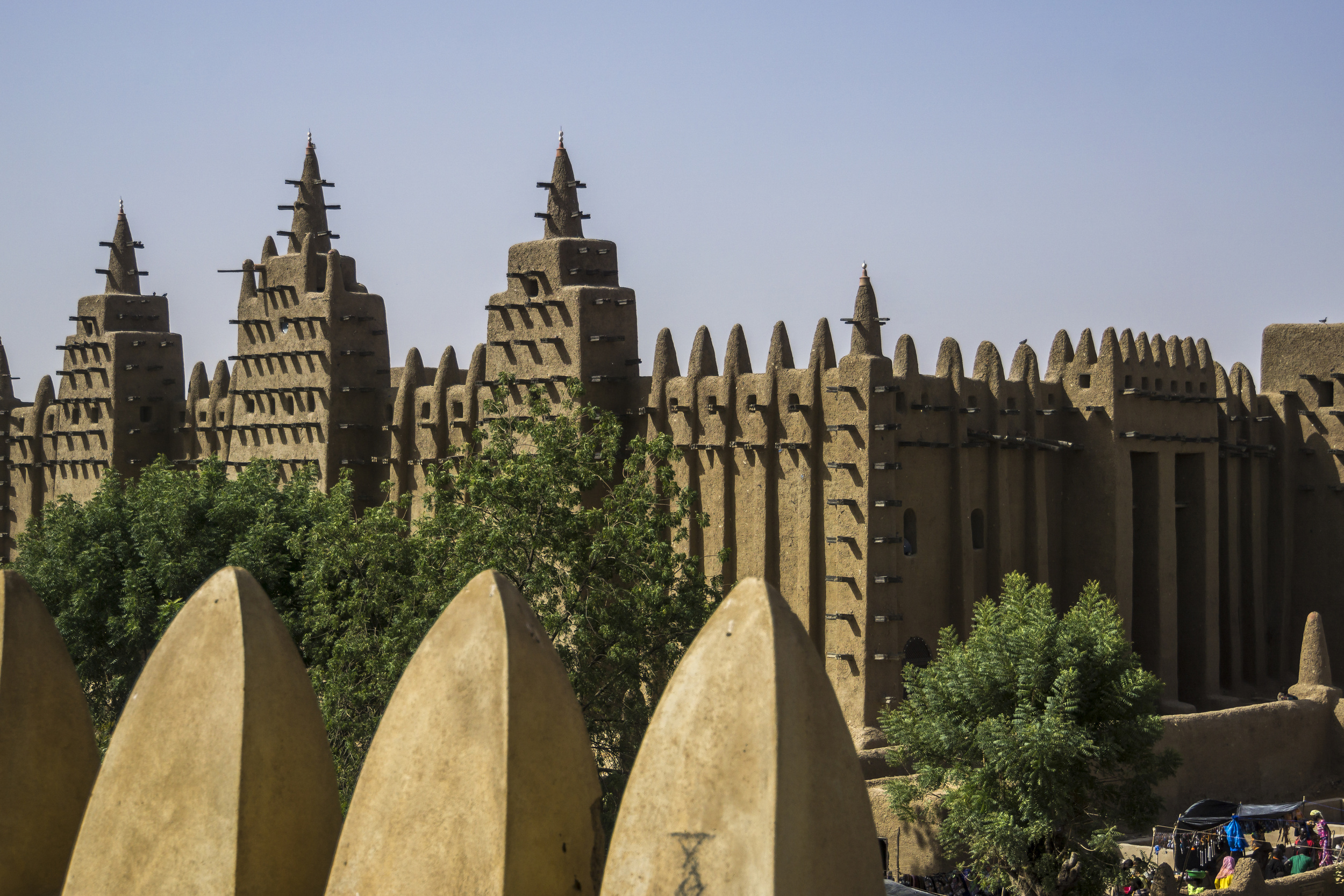
Yet another former French colony, visitors to Mali will find the language very useful in most interactions. Additionally, the country is home to more than 80 other local languages.
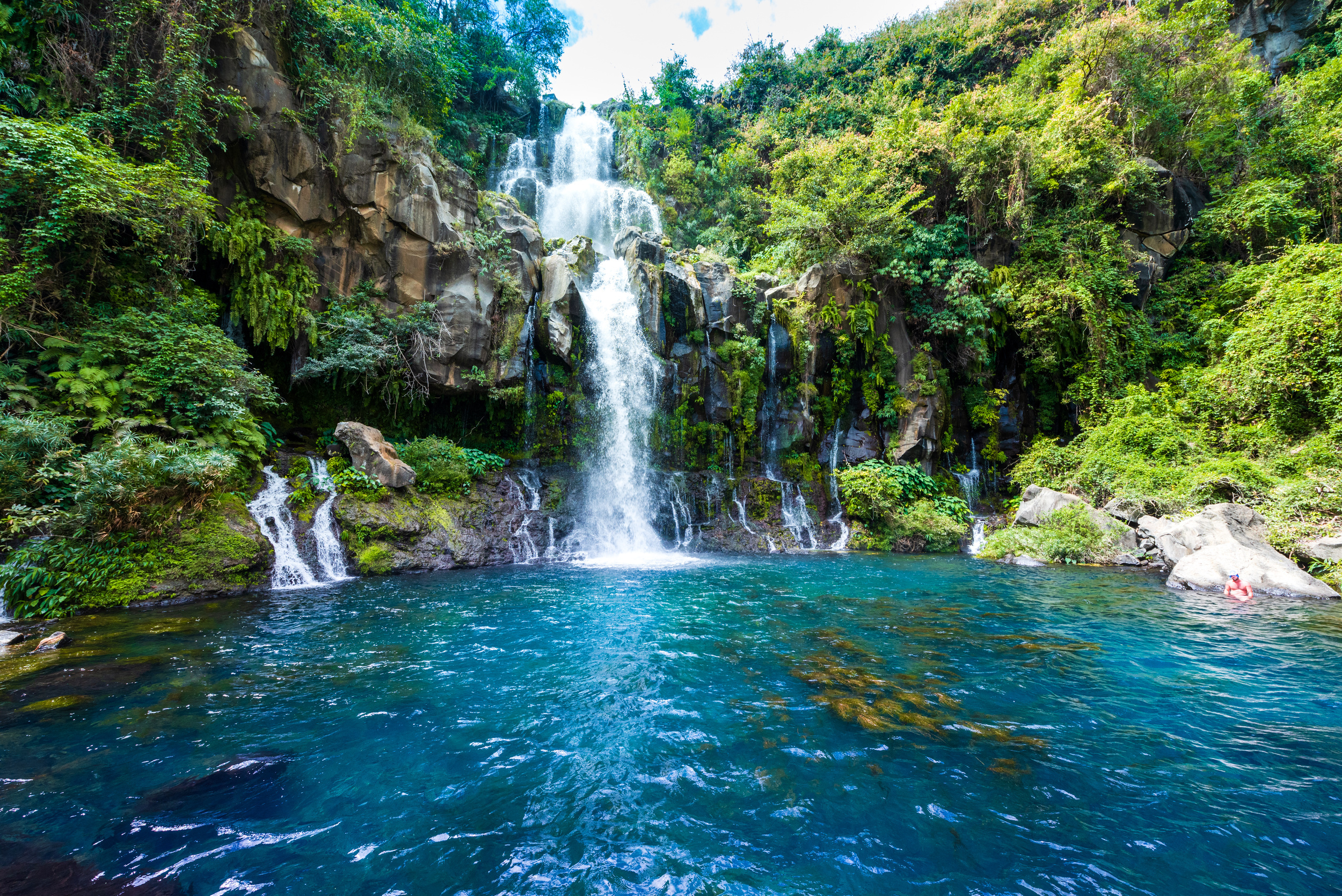
The British and French fought over Canada, with the former finally winning out, but the Francophone portion of the population remained influential. So much so that the country has two official languages: English and French, with over 70 indigenous languages in existence. And the province of Québec only has French as the official language (and frequently threatens to secede from Canada). Its neighbor, New Brunswick, is the only officially bilingual province.
You may also like: 20 essential organizing tips for living in small spaces
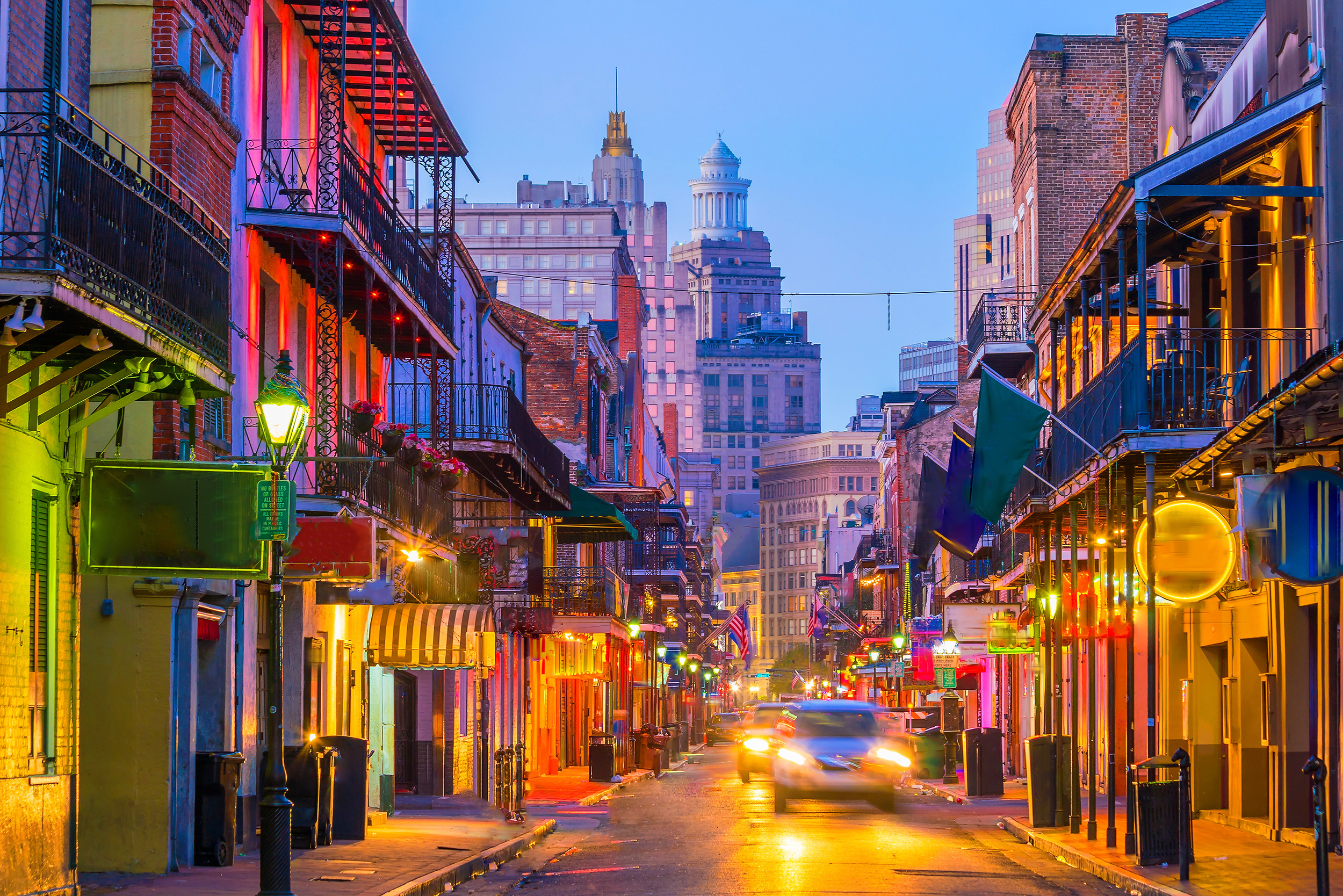
When the U.S. purchased Louisiana territory from the French in 1803, it probably wasn’t considered how long the language would stick around. In the 1960s, efforts were made to revive the language in the state after decades of suppression and Americanization. Now, French is spoken by an estimated 100,000 to 200,000 residents, ranging from traditional and Cajun (Louisiana) French.
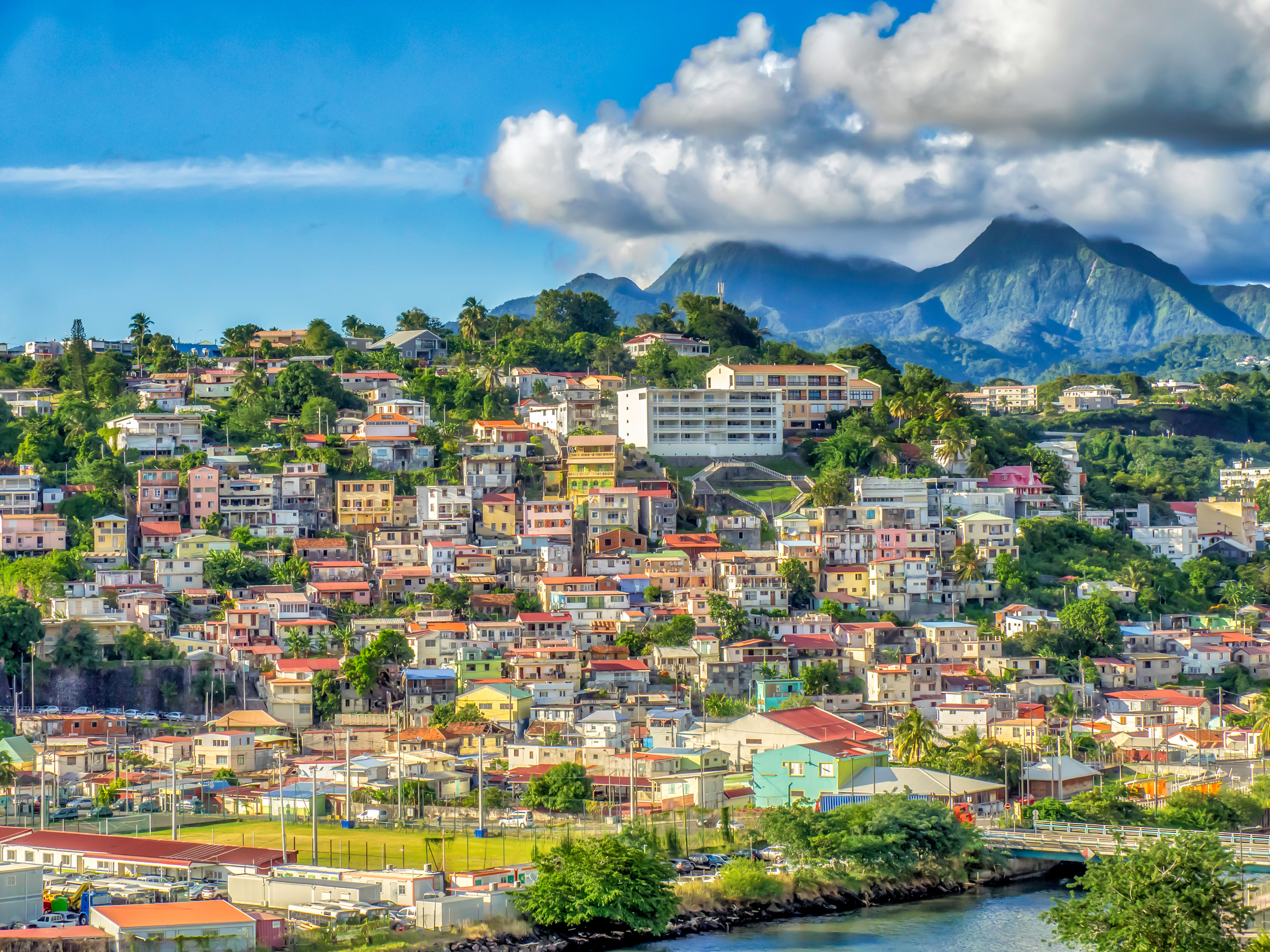
The Spanish colonized this Caribbean island before the Brits and French arrived. Then in 1763, France took over, and in 1943, it became semi-autonomous before gaining its current status as an Overseas Department in 1946. French is the official language, and visitors will find it helpful to know basic phrases, but Martinique Creole is unofficially the local language of communication.
You may also like: 15 quick and easy gameday appetizers
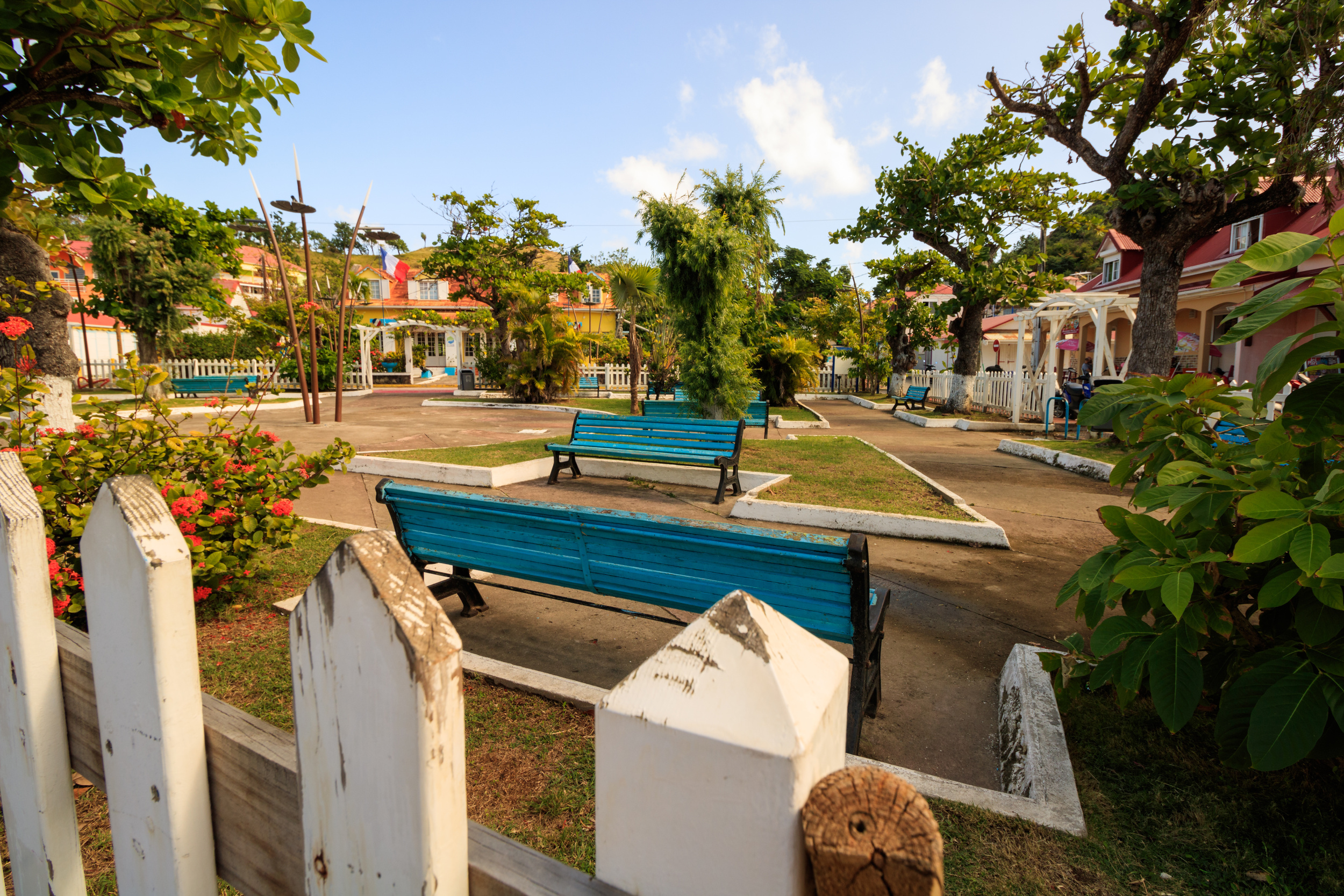
Another current French Overseas Department first colonized by the Spanish, Guadalupe has French as its official language, but like Martinique, Creole is widely used by locals.
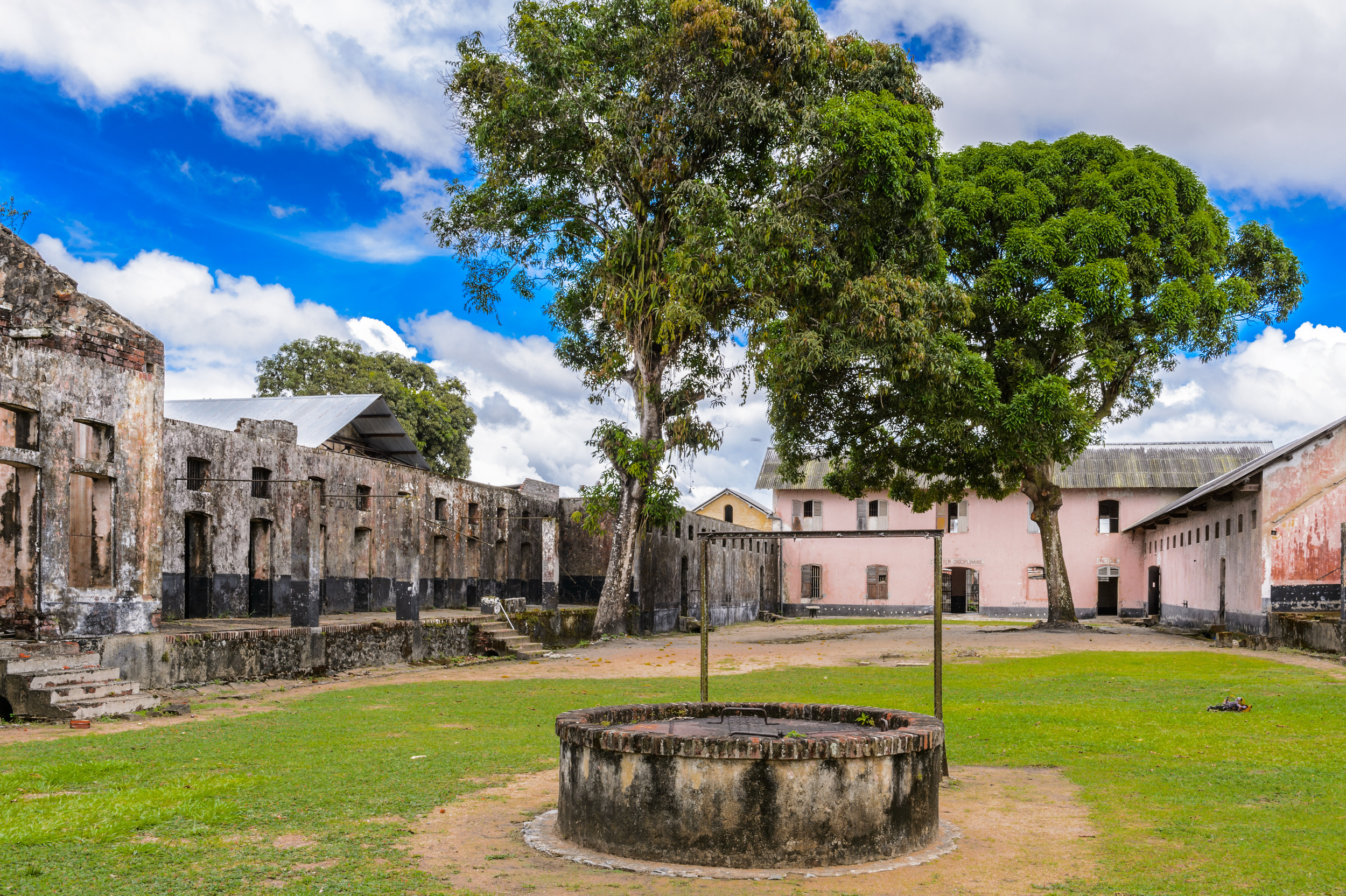
French Guiana
This small section of the South American continent, located between far northeastern Brazil and Suriname and Guyana, is a former colony that housed a penal colony of France. Today, it is a French Overseas Department. Thus, French is the official language, but Creole is the language of use by many residents.
You may also like: 22 healthy snacks you can make on gameday
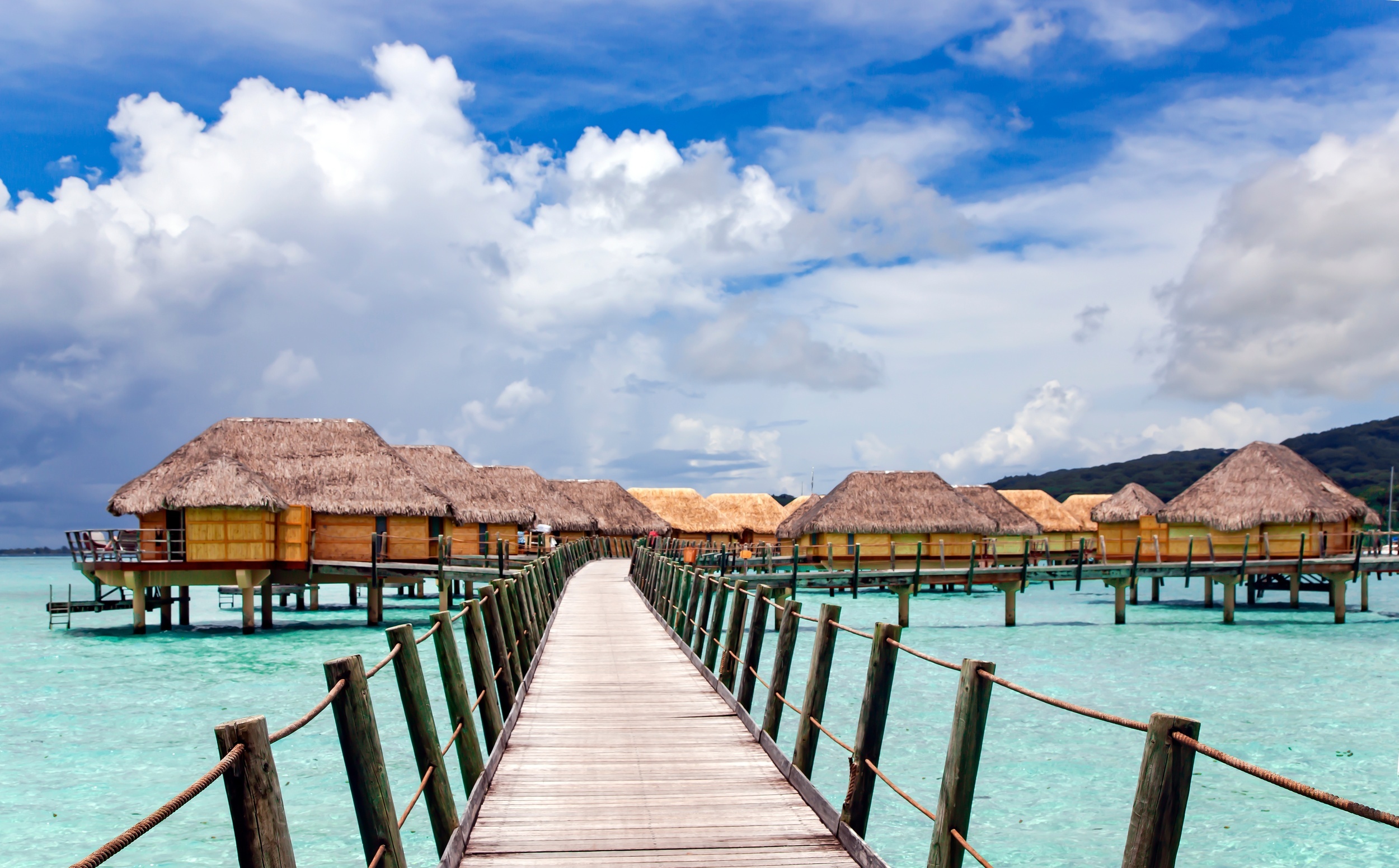
French Polynesia
Colonized by the French, the islands received the name “French Polynesia” after being designated a French Overseas Territory in the '50s. Then, in 1977, the country received autonomy and is now considered an overseas country of the French Republic, with French as the official language.
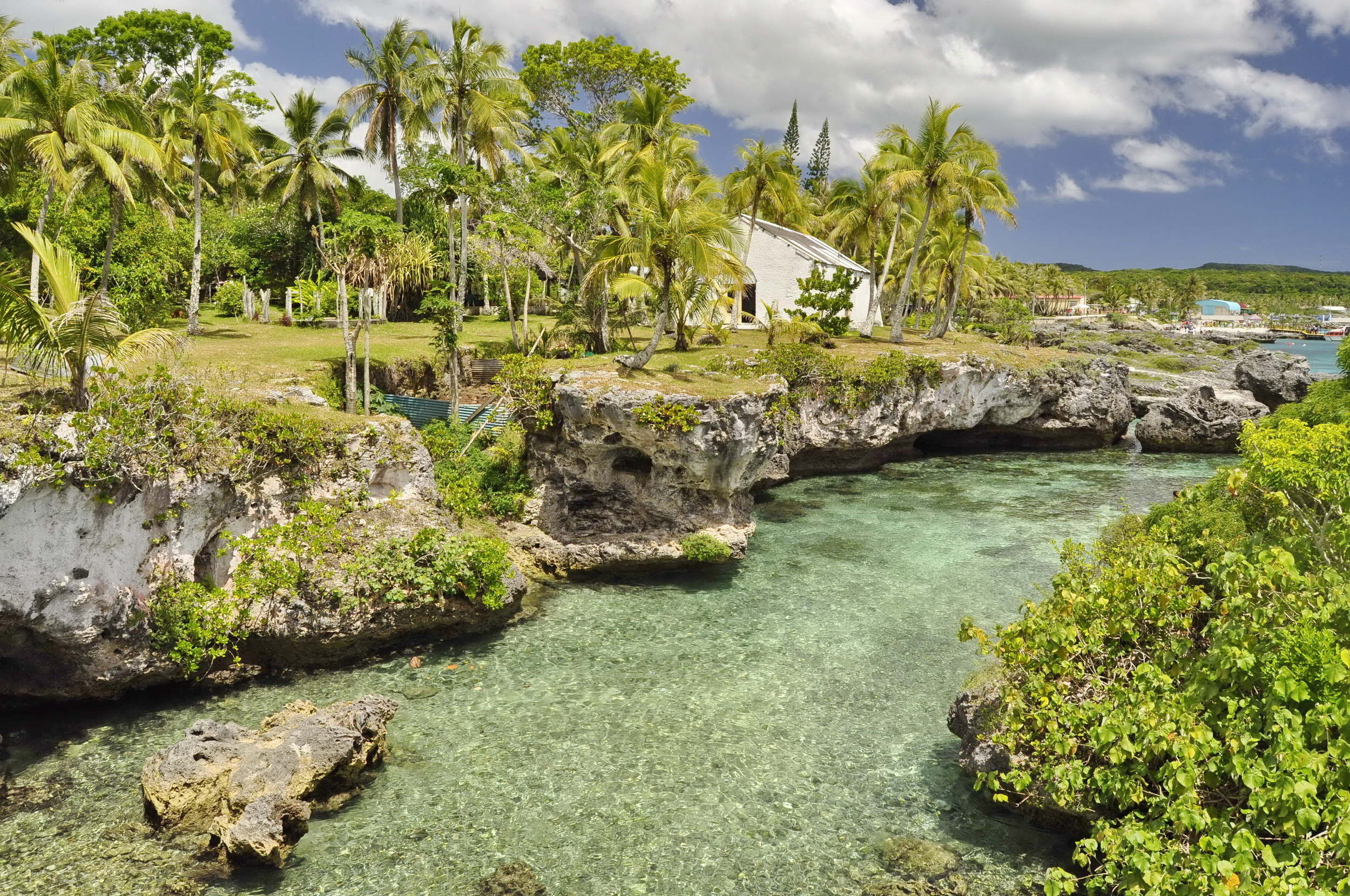
New Caledonia
The British initially colonized these islands in the South Pacific before the French took over in 1853. Recent years have brought referendums for independence, but a slim majority of the population has voted in favor of remaining part of France. French remains the official language of the territory.
You may also like: 20 essential tips for your best hair ever
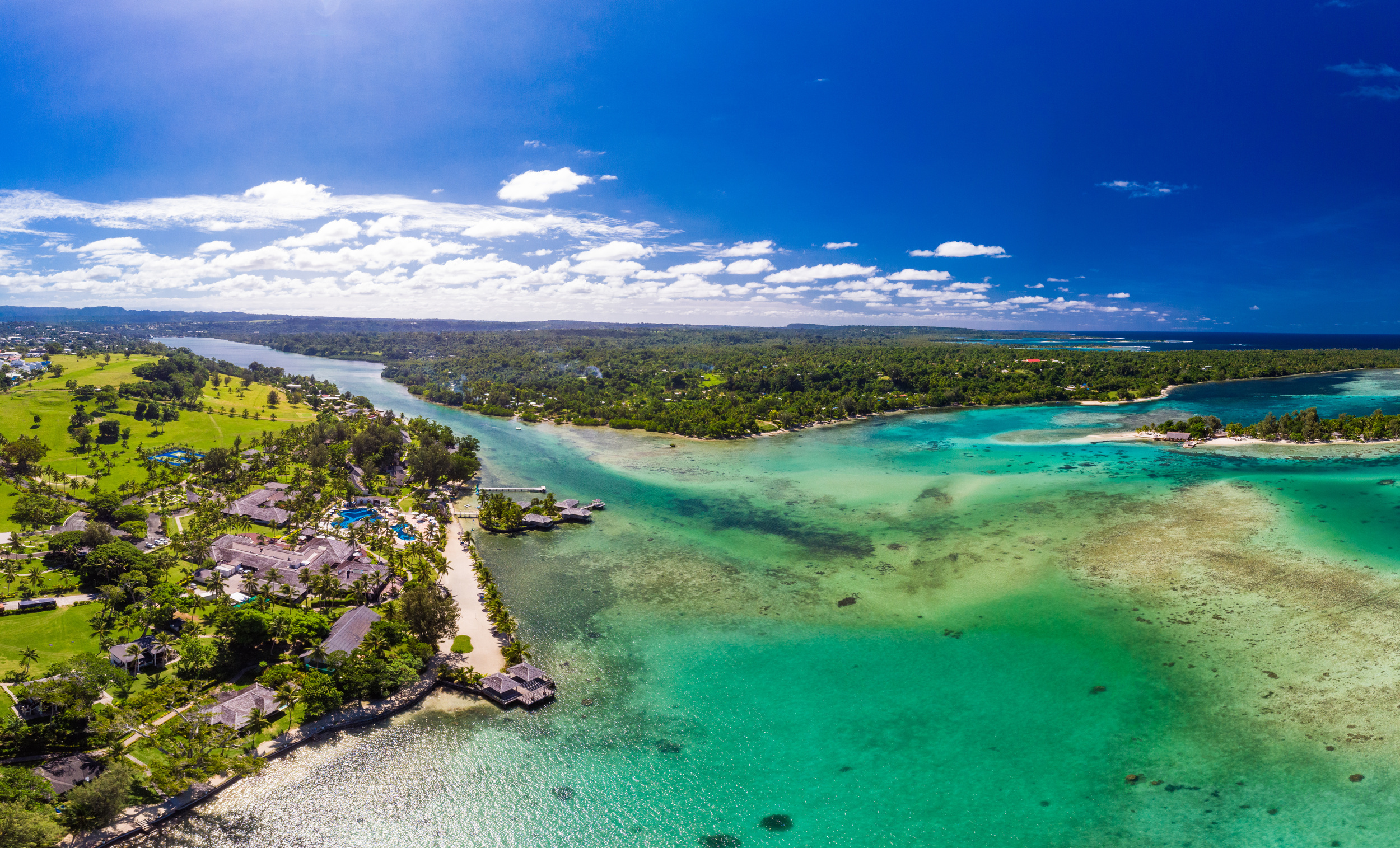
This Pacific country is very multilingual, with French, English, and Bislama all considered official languages. However, it doesn’t stop there, as over 100 languages are spoken on the island. After centuries of colonization, independence was finally declared in 1980.
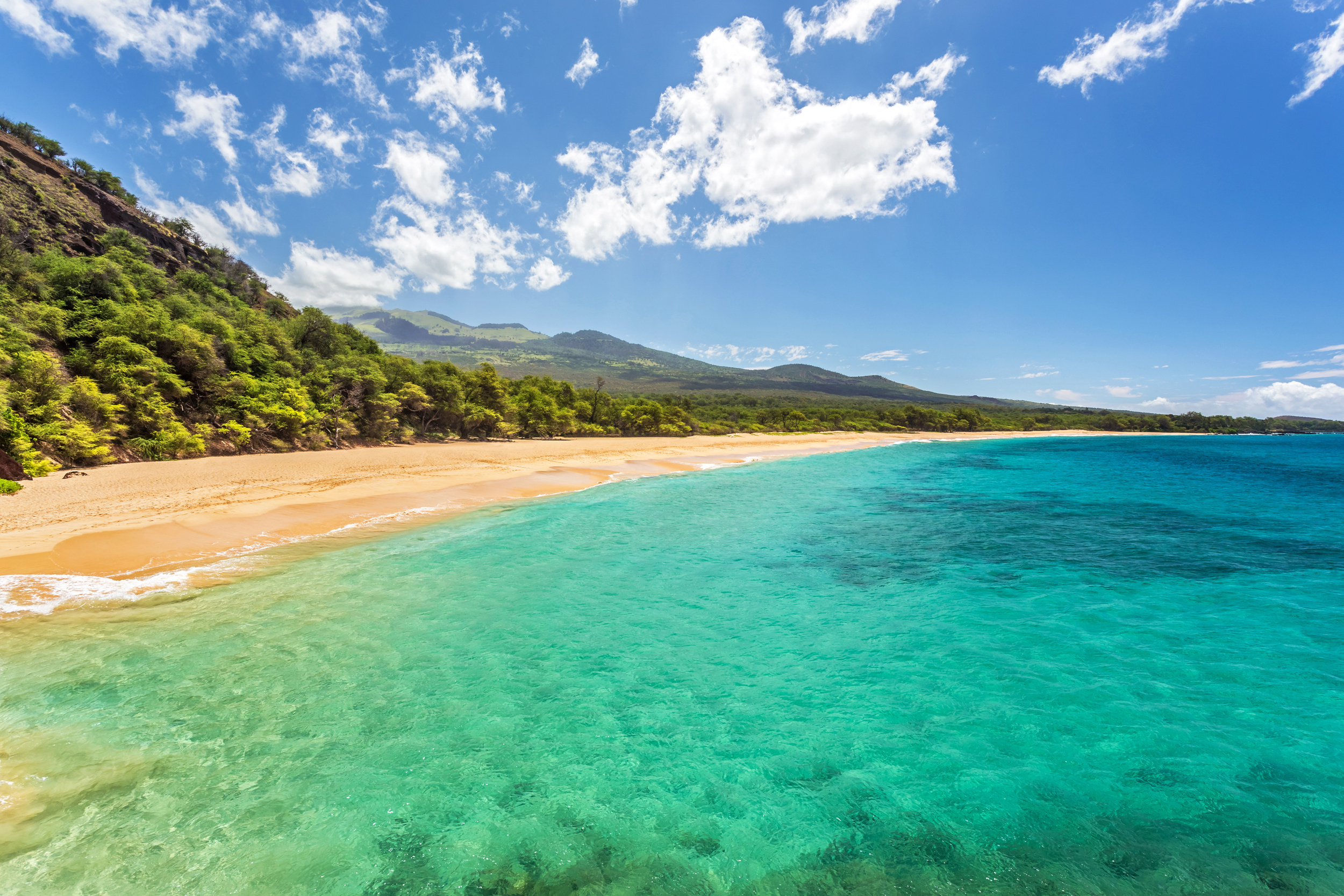
Wallis & Futuna
Made up of the Wallis, Futuna, and Alofi islands, all three were French protectorates and colonies until 1961. Then, the islands became a French Overseas Territory until 2003, when they received status as an Overseas Collectivity. French has been the official language throughout all the status changes.
Did you enjoy this slideshow? Follow us on MSN to see more of our exclusive lifestyle content.
More for You
Caitlin Clark gets fancy and dazzles in a red dress to collect Wooden Award
King and Queen ‘utterly shocked and horrified’ by ‘senseless attack’ in Sydney
Masters fashion: Day was asked by Augusta National to change his wardrobe so 'respectfully' he did
Supreme Court unanimously rules against exorbitant government fees
174 people stranded in the air are rescued, almost a day after a fatal cable car accident in Turkey
30 trans celebrities who broke barriers
Ex-MLB star and Senate candidate Steve Garvey ‘stunned’ by depths of CA homeless crisis, will seek audit
3 underrated Netflix movies you should watch this weekend (April 12-14)
‘I haven’t seen something like that in the skies here’ Robertson reports from Jerusalem
Worried about microplastics in your water? You can get rid of them with common kitchen items
Florida Removes 1.4 Million People from Health Care Plan
78 Riddles for Adults That Will Test Your Smarts
What Happens to Your Body When You Eat Blueberries Every Day
Cover Up Unsightly Floor Scratches In A Pinch With This All-Natural Item
The Talk Canceled After 15 Seasons
The 26 Most Dangerous Cities in the U.S. Ranked
Keanu Reeves' Ballerina Cameo as John Wick Revealed at CinemaCon Screening
Trump says Iran attack on Israel ‘would never have happened if I were president’
7 Off-Brand Foods Worth Buying (and 3 That Aren’t)
Pumpkin seed protein has 1 advantage over other plant-based options, dietitians say
You are using an outdated browser. Please upgrade your browser to improve your experience.
- Restaurants
- Best-of Guides
- MICHELIN Guide Ceremony
- My Favorites
- Subscribe to newsletter
- Booking partnership with OpenTable
- Booking partnership with Resy
- USA - English - USD
- The First MICHELIN Key Hotels: All the Keys in France
The MICHELIN Guide announces top honors for French hotels in 2024.
MICHELIN Keys France Hotels
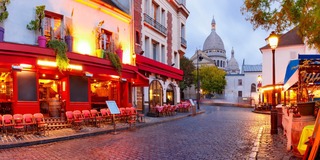
Paris by The MICHELIN Guide
See the Paris guide

On April 8, 2024, the MICHELIN Guide revealed the brand new One, Two, and Three Key distinctions for the most outstanding hotels in France.
This announcement comes four years into a comprehensive refresh of our hotel selection. The MICHELIN Guide now includes over 5,000 hotels across the world, and not a single one is simply a room for the night. These are places that significantly add to your experience as a traveler, each vetted and judged excellent in five categories: architecture and interior design, quality and consistency of service, overall personality and character, value for the price, and a significant contribution to the guest experience in a particular setting. Which brings us back to the Keys. The culmination of countless hours of evaluation by our team of experts, the Key hotels below represent the highlights of our broader selection. Like the MICHELIN Stars for restaurants, the MICHELIN Keys are our most outstanding hotels. In total, the 2024 MICHELIN Guide hotel selection in France includes 24 Three Key hotels, 38 Two Key hotels, and 127 One Key hotels. Want to know more about the MICHELIN Key? Here’s everything you need to know . Or, head below to look at all the Keys.

How To Look Through the List
Jump straight to the list or take a deeper dive into select key hotels..
Take a peek at the top-floor suite of the only chateau hotel in Paris. See what makes this hotel among the greatest art museums in the country. Or find out more about the wine hotel that uses an entire town as its foundation. Subscribe to our newsletter for more like this.
Highlights of the France 2024 Key Hotel List

The Palaces: A Distinctly French High Luxury
Expect: Butler service, high quality spas, and sumptuous spare-no-expense design. The government of France itself bestows an official Palace designation, with French tourism officials judging the most luxurious hotels in France to ensure they provide particular amenities and services (a spa, a multilingual check-in desk, a concierge service, etc.) and an excellent representation of the country. Out of 31 official palace hotels in France, many earned at least one Key — and several make up our Three Key hotels. Of the palaces that earned at least One Key, you’ll find a mix of the most historic ( the Four Seasons George V ), the most modern ( Le K2 Palace ), and the newer takes on the traditional form ( La Réserve Paris ). All are exceptional. Also read: Every Three Key Hotel in Paris

The Country Darlings: Chateaus and Vineyards
Our first annual list of Key hotels in France confirms the supremacy of these two mainstays: chateau and vineyard accommodations. Look to Château Lafaurie-Peyraguey and Château de la Gaude as particular examples of Two Key hotels that combine both. Or look just outside Bordeaux, to Les Sources de Caudalie . Built on a natural hot spring and operated by the famous Caudalie beauty brand, it’s a particularly fascinating Three Key property on the grounds of the Château Smith Haut-Lafitte vineyard.

Paris 2024: Little Boutiques Full of Hip, Trendy Design and Endless Color
We’re thrilled that in our inaugural Key distinctions we can celebrate an especially strong crop of small, design-forward boutique hotels that are anything but content to be conventional. With bright, colorful design that’s of the moment, they’re grounded in technical know-how, impeccable taste, and informed by a fascinating, sometimes quirky history. Explore Hôtel Le Ballu , La Fantaisie , Providence , Les Bains , and Norman Hôtel & Spa to see just what we mean. Also read: Inside Hôtel Le Ballu: A singular, artsy refuge in the heart of Paris
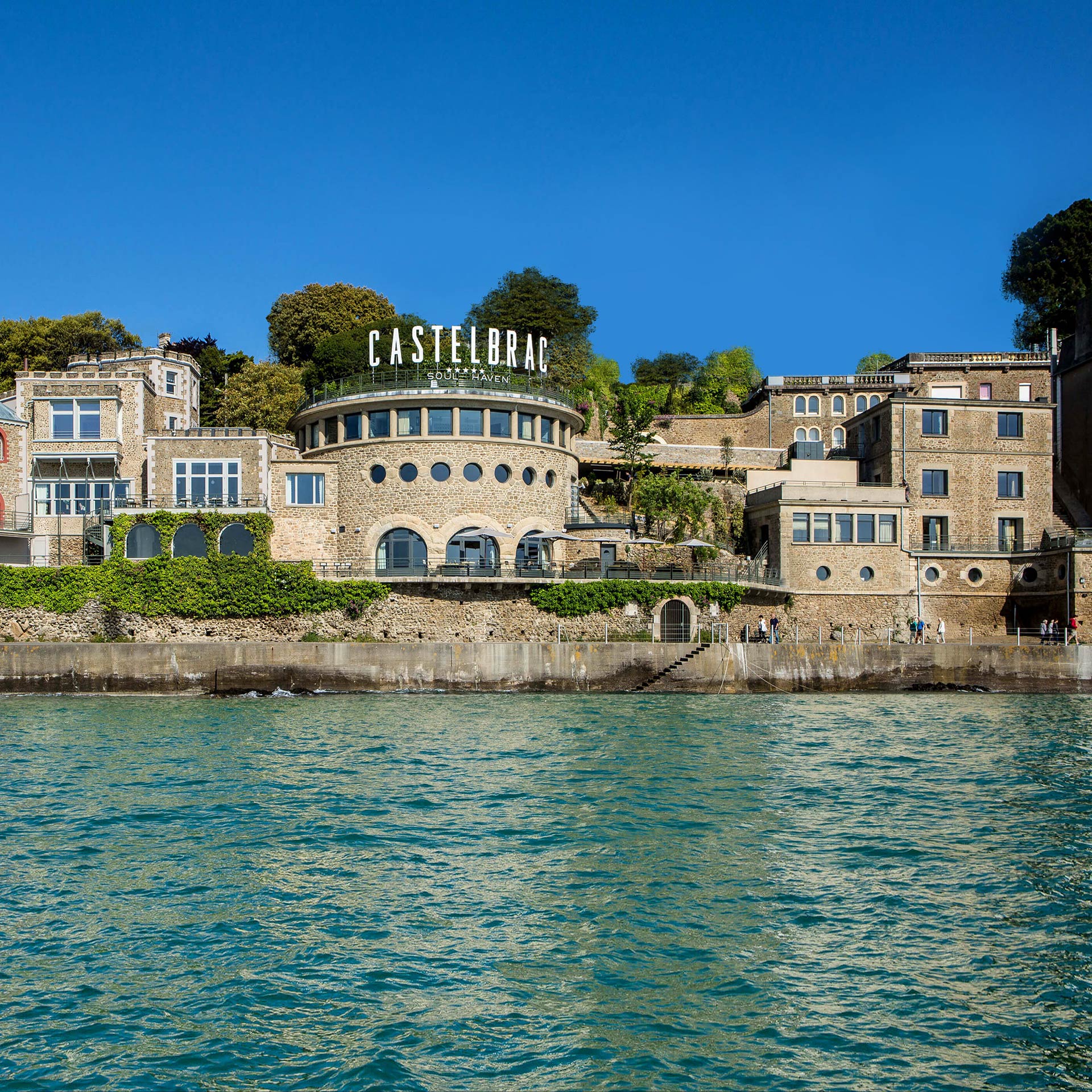
Click below to jump to each distinction:
The three key hotels.
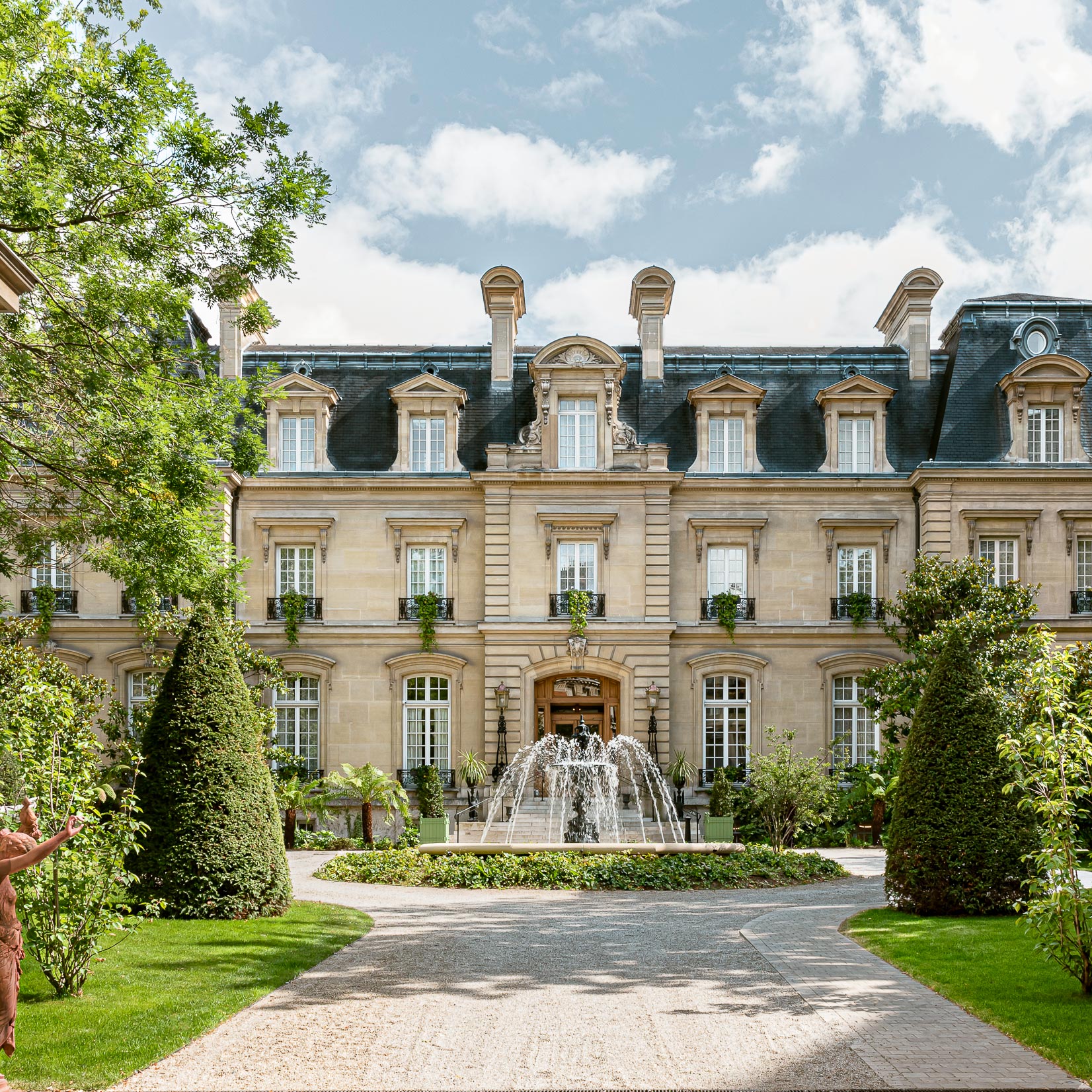
Antibes: Hôtel du Cap-Eden-Roc Bordeaux: Les Sources de Caudalie Champillon: Le Royal Champagne Courchevel: Cheval Blanc Courchevel Courchevel: Le K2 Palace Gordes: La Bastide de Gordes Le Castellet: Hôtel du Castellet Le Puy-Sainte-Réparade: Villa La Coste Les Baux-de-Provence: Baumanière Megève: Four Seasons Megeve Monte-Carlo: Hôtel de Paris Monte-Carlo Paris: Villeroy Paris: La Réserve Paris Paris: Saint James Paris Paris: Four Seasons George V Paris: Cheval Blanc Paris Paris: Ritz Paris Paris: Le Bristol Paris Paris: Le Meurice Paris: Plaza Athénée Reims: Domaine Les Crayères Saint Tropez: La Reserve Ramatuelle Saint-Jean-Cap-Ferrat: Grand Hôtel du Cap-Ferrat Versailles: Airelles Château de Versailles, Le Grand Contrôle
NEW: Paris by The MICHELIN Guide – expert insights on where to dine, stay and explore
The two key hotels.

Aix-en-Provence: Château de la Gaude Avignon: La Mirande Biarritz: Hôtel du Palais Bommes: Château Lafaurie-Peyraguey Busnes: Le Château de Beaulieu Cassis: Les Roches Blanches Cheverny: Les Sources de Cheverny Cognac: Chais Monnet Courchevel: Aman Le Mélézin Courchevel: L'Apogée Courchevel Dinard: Castelbrac Eugenie les Bains: Les Pres d’Eugenie - Michel Guerard Èze: Château Eza Èze: Château de la Chèvre d'Or Gargas: Coquillade - Provence Honfleur: La Ferme Saint-Siméon Lauris: Domaine de Fontenille Le Grand-Lucé: Château du Grand-Lucé Massignac: Domaine des Étangs Monte-Carlo: Hôtel Métropole Monte-Carlo Montpellier: Domaine de Biar Nice: Le Negresco Paris: Crillon Paris: J.K. Place Paris Paris: Lutetia Paris: Nolinski Paris: Bulgari Hôtel Paris Paris: Le Royal Monceau Paris: The Peninsula Paris Paris: Shangri-La Paris Porto-Vecchio: Casadelmar Roquebrune-Cap-Martin: The Maybourne Riviera Sabran: Château de Montcaud Saint Tropez: Airelles Saint-Tropez Château de la Messardière Saint Tropez: Cheval Blanc St-Tropez Saint-Méloir-des-Ondes: Château Richeux - Les Maisons de Bricourt Saint-Paul-de-Vence: Le Domaine du Mas de Pierre Val-d'Isère: Le K2 Chogori
The One Key Hotels

Auvergne-Rhône-Alpes
Bourgogne-franche-comté, centre-val de loire, haut-de-france, île-de-france, nouvelle-aquitaine, pays de la loire, provence-alpes-côte d'azur.

Jean-Georges Vongerichten On His New York
The Starry chef breaks down his go-to spots in Gotham.

Paris in the Spring: 15 Things to See and Do
Have you booked a short break in Paris? Explore our list of Inspector-approved activities to enjoy the warmer weather in the French capital.

In Photos: Every Three Key Hotel in Paris
The ins and outs of the most outstanding hotels in the city.

One, Two and Three MICHELIN Keys
Just as the MICHELIN Stars recognize outstanding restaurants, hotels now have their own distinction.
Keep Exploring - Stories we think you will enjoy reading

How To Turn an Entire Town Into a Bright Pink, One Key Wine Hotel
As you stroll the remote French village of Assignan, you can’t miss the colors of Chateau & Village Castigno, a wine hotel that’s been splashed throughout the town.

Three Keys in Bordeaux: The Hot Spring Hotel in Wine Country
Les Sources de Caudalie combines Vinotherapy from the famous French brand with a natural hot spring and an ancient vineyard.

Inside Room 311 of the Only Three Key Château in Paris
The so-called 'Piano Suite' is an exclusive oasis atop a completely singular Parisian manor.

Inside a Historic Tapestry of French Design: Provence's Two Key La Mirande
In the heart of Provence and steps from the palace where seven Popes once reigned, La Mirande is a time capsule of centuries of French decorative arts — all in an unmistakably luxurious hotel.

Where Bowie and Jagger Partied: Now a Dazzling One Key Hotel in Paris
Les Bains Paris was a spa for Proust and a nightclub for Bowie and Jagger. Now, it might be the city's hippest design hotel — recently awarded one of Paris' first MICHELIN Keys.

Three Key Dreamland: An Art-Drenched Wine Estate Decorated by Gehry and Dylan
Patrick McKillen turned an old French vineyard into a striking hotel with a collection of art and architecture to rival the world’s very best. It's among the first Three Key hotels in France.
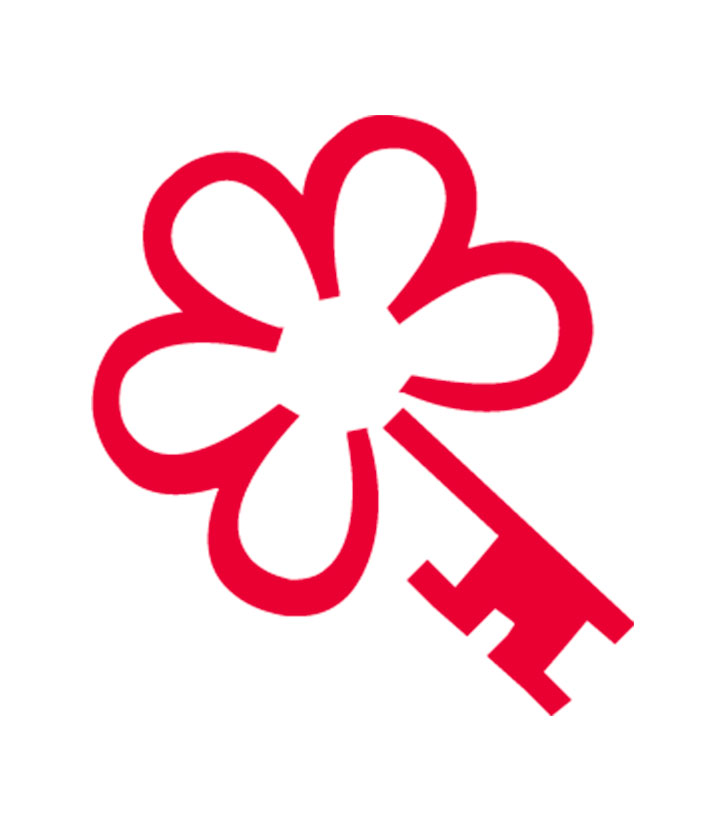
Everything You Need to Know About the MICHELIN Key for Hotels
In April 2024, the MICHELIN Guide debuts a brand new distinction: the MICHELIN Key. While the MICHELIN Star recognizes the most outstanding restaurants in the world, the MICHELIN Key does the same for outstanding hotels. Here’s everything you need to know about the new distinction.

MICHELIN Hotel Lobbies Redefine Coworking for Modern Professionals
Discover the best hotel lobbies for communal working.

Aggro-Tourism: 12 Hotels for Blowing Off Steam
When the real world gets too heavy, you could escape to a comfy chair on a quiet beach. Or, you could release all that stress via more aggressive means. These hotels are for the latter.

This Week’s New Hotels
MICHELIN Guide hotel experts share their most exciting discoveries for the week of March 25.
MICHELIN Guide

Use the app to find the best restaurants and hotels everywhere
Be the first to get news and update about the michelin guide.
MICHELIN Guide selections
The michelin group.
- Terms of Use
- Privacy Policy
- Legal Notice
Display settings
Customize your experience by easily adjusting display settings for territory, and currency to suit your preferences!
Member privileges
The Plus program provides upgrades and amenities at participating hotels. For this hotel, Plus members will receive:
Non-members can add the privileges at checkout through our 30 day free trial, cancellable at anytime.
- History Classics
- Your Profile
- Find History on Facebook (Opens in a new window)
- Find History on Twitter (Opens in a new window)
- Find History on YouTube (Opens in a new window)
- Find History on Instagram (Opens in a new window)
- Find History on TikTok (Opens in a new window)
- This Day In History
- History Podcasts
- History Vault
This Day In History : September 14
Changing the day will navigate the page to that given day in history. You can navigate days by using left and right arrows
Napoleon enters Moscow

One week after winning a bloody victory over the Russian army at the Battle of Borodino, Napoleon Bonaparte ’s Grande Armée enters the city of Moscow, only to find the population evacuated and the Russian army retreated again. Moscow was the goal of the invasion, but the deserted city held no czarist officials to sue for peace and no great stores of food or supplies to reward the French soldiers for their long march. Then, just after midnight, fires broke out across the city, apparently set by Russian patriots, leaving Napoleon’s massive army with no means to survive the coming Russian winter.
In 1812, French Emperor Napoleon I was still at the height of his fortunes. The Peninsular War against Britain was a thorn in the side of his great European empire, but he was confident that his generals would soon triumph in Spain. All that remained to complete his “Continental System”–a unilateral European blockade designed to economically isolate Britain and force its subjugation–was the cooperation of Russia. After earlier conflict, Napoleon and Alexander I kept a tenuous peace, but the Russian czar was unwilling to submit to the Continental System, which was ruinous to the Russian economy. To intimidate Alexander, Napoleon massed his forces in Poland in the spring of 1812, but still the czar resisted.
On June 24, Napoleon ordered his Grande Armée, the largest European military force ever assembled to that date, into Russia. The enormous army featured more than 500,000 soldiers and staff and included contingents from Prussia, Austria, and other countries under the sway of the French empire. Napoleon’s military successes lay in his ability to move his armies rapidly and strike quickly, but in the opening months of his Russian invasion he was forced to be content with a Russian army in perpetual retreat. The fleeing Russian forces adopted a “scorched earth” strategy, seizing or burning any supplies that the French might pillage from the countryside. Meanwhile, Napoleon’s supply lines became overextended as he advanced deeper and deeper into the Russian expanse.
Many in the czarist government were critical of the Russian army’s refusal to engage Napoleon in a direct confrontation. Under public pressure, Alexander named General Mikhail Kutuzov supreme commander in August, but the veteran of earlier defeats against Napoleon continued the retreat. Finally, Kutuzov agreed to halt at the town of Borodino, about 70 miles west of Moscow, and engage the French. The Russians built fortifications, and on September 7 the Grande Armée attacked. Napoleon was uncharacteristically cautious that day; he didn’t try to outflank the Russians, and he declined to send much-needed reinforcements into the fray. The result was a bloody and narrow victory and another retreat by the Russian army.
Although disturbed by the progress of the campaign, Napoleon was sure that once Moscow was taken Alexander would be forced to capitulate. On September 14, the French entered a deserted Moscow. All but a few thousand of the city’s 275,000 people were gone. Napoleon retired to a house on the outskirts of the city for the night, but two hours after midnight he was informed that a fire had broken out in the city. He went to the Kremlin, where he watched the flames continue to grow. Strange reports began to come in telling of Russians starting the fires and stoking the flames. Suddenly a fire broke out within the Kremlin, apparently set by a Russian military policeman who was immediately executed. With the firestorm spreading, Napoleon and his entourage were forced to flee down burning streets to Moscow’s outskirts and narrowly avoided being asphyxiated. When the flames died down three days later, more than two-thirds of the city was destroyed.
In the aftermath of the calamity, Napoleon still hoped Alexander would ask for peace. In a letter to the czar he wrote: “My lord Brother. Beautiful, magical Moscow exists no more. How could you consign to destruction the loveliest city in the world, a city that has taken hundreds of years to build?” The fire was allegedly set on the orders of Moscow Governor-General Feodor Rostopchin; though Rostopchin later denied the charge. Alexander said the burning of Moscow “illuminated his soul,” and he refused to negotiate with Napoleon.
After waiting a month for a surrender that never came, Napoleon was forced to lead his starving army out of the ruined city. Suddenly, Kutuzov’s army appeared and gave battle on October 19 at Maloyaroslavets. The disintegrating Grande Armée was forced to abandon the fertile, southern route by which it hoped to retreat and proceed back along the ravaged path over which it had originally advanced. During the disastrous retreat, Napoleon’s army suffered continual harassment from the merciless Russian army. Stalked by hunger, subzero temperatures, and the deadly lances of the Cossacks, the decimated army reached the Berezina River late in November, near the border with French-occupied Lithuania. However, the river was unexpectedly thawed, and the Russians had destroyed the bridges at Borisov.
Napoleon’s engineers managed to construct two makeshift bridges at Studienka, and on November 26 the bulk of his army began to cross the river. On November 29, the Russians pressed from the east, and the French were forced to burn the bridges, leaving some 10,000 stragglers on the other side. The Russians largely abandoned their pursuit after that point, but thousands of French troops continued to succumb to hunger, exhaustion, and the cold. In December, Napoleon abandoned what remained of his army and raced back to Paris, where people were saying he had died and a general had led an unsuccessful coup. He traveled incognito across Europe with a few cohorts and reached the capital of his empire on December 18. Six days later, the Grande Armée finally escaped Russia, having suffered a loss of more than 400,000 men during the disastrous invasion.
With Europe emboldened by his catastrophic failure in Russia, an allied force rose up to defeat Napoleon in 1814. Exiled to the island of Elba, he escaped to France in early 1815 and raised a new army that enjoyed fleeting success before its crushing defeat at Waterloo in June 1815. Napoleon was then exiled to the remote island of Saint Helena, where he died six years later.
Also on This Day in History September | 14
Pop-tarts debut, dolores huerta beaten by police while peacefully protesting, mlb cancels playoffs, world series, muslim teen arrested for bringing reassembled clock to school.
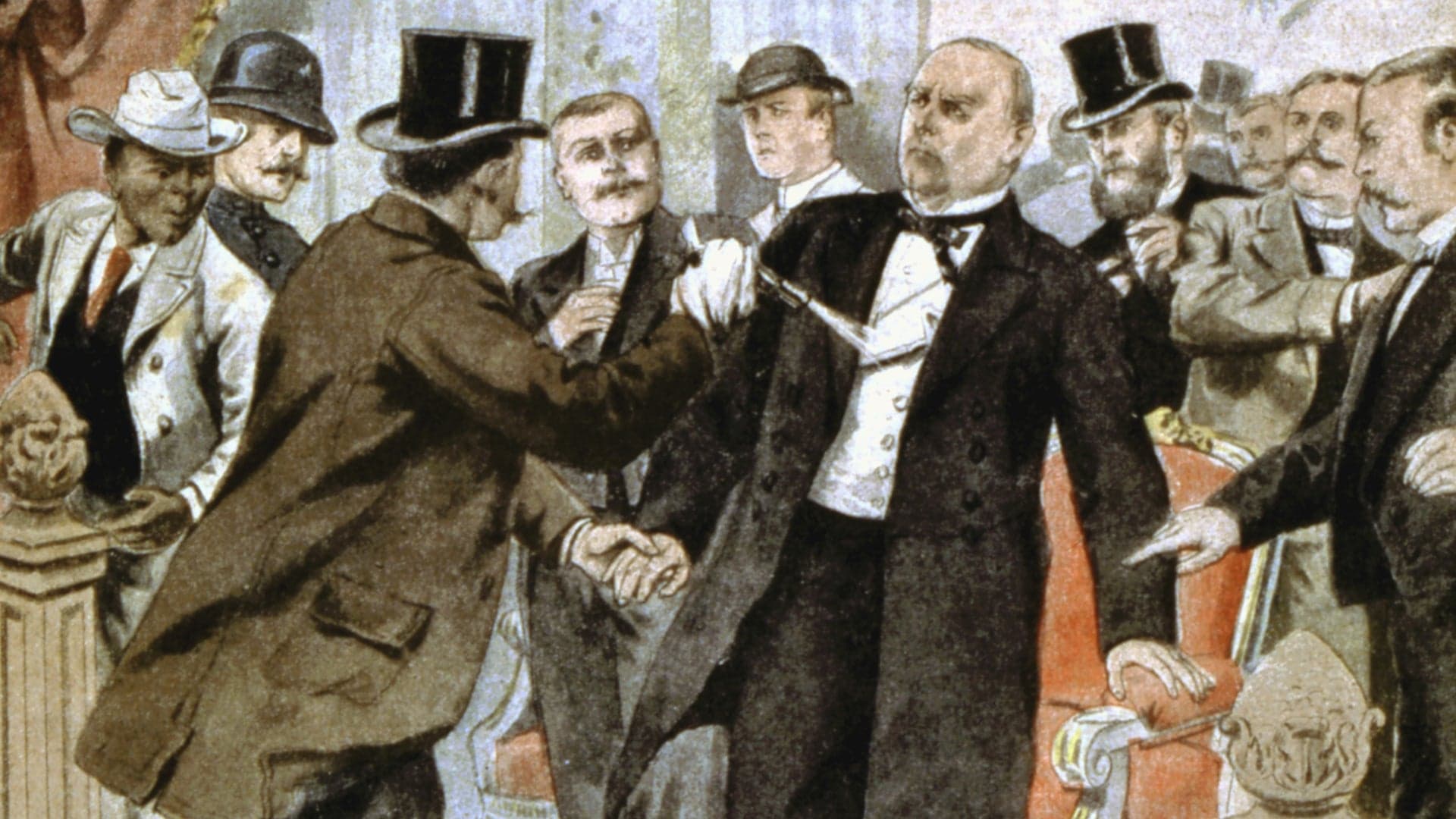
This Day in History Video: What Happened on September 14
General winfield scott captures mexico city.

Wake Up to This Day in History
Sign up now to learn about This Day in History straight from your inbox. Get all of today's events in just one email featuring a range of topics.
By submitting your information, you agree to receive emails from HISTORY and A+E Networks. You can opt out at any time. You must be 16 years or older and a resident of the United States.
More details : Privacy Notice | Terms of Use | Contact Us
Elizabeth Ann Seton becomes one of the first American-born saints
President mckinley dies of infection from gunshot wounds.
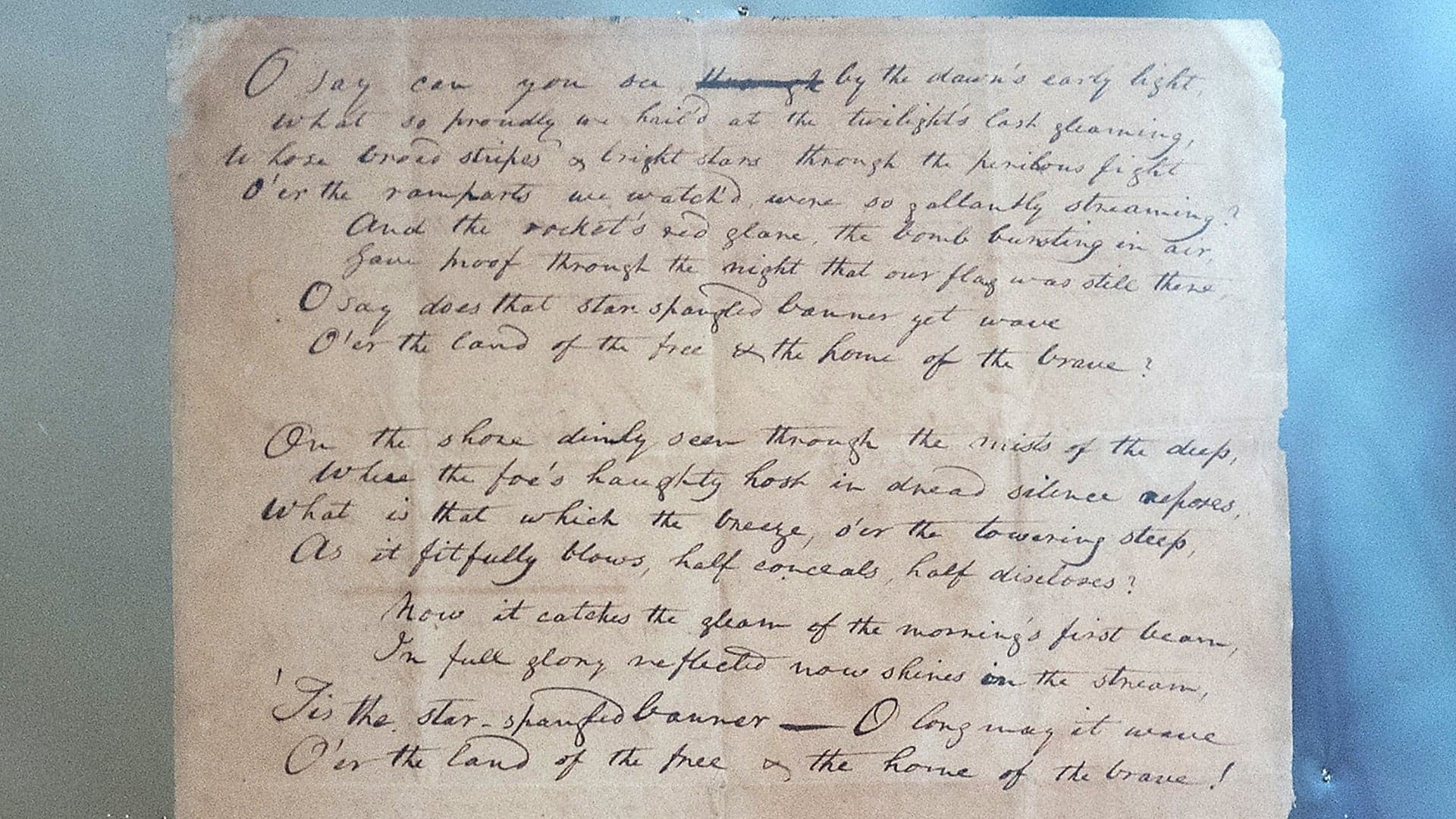
Francis Scott Key pens “The Star-Spangled Banner”
John steinbeck awarded the medal of freedom, hollywood star and real-life princess grace kelly dies, millions flee from hurricane floyd, “i shot the sheriff” hits the song charts, north and south clash at the battle of south mountain, soviet probe reaches the moon.
France tells French citizens not to travel to Iran, Lebanon, Israel, Palestinian Territories
- Medium Text
The Reuters Daily Briefing newsletter provides all the news you need to start your day. Sign up here.
Reporting by Inti Landauro, Charlotte Van Campenhout
Our Standards: The Thomson Reuters Trust Principles. New Tab , opens new tab
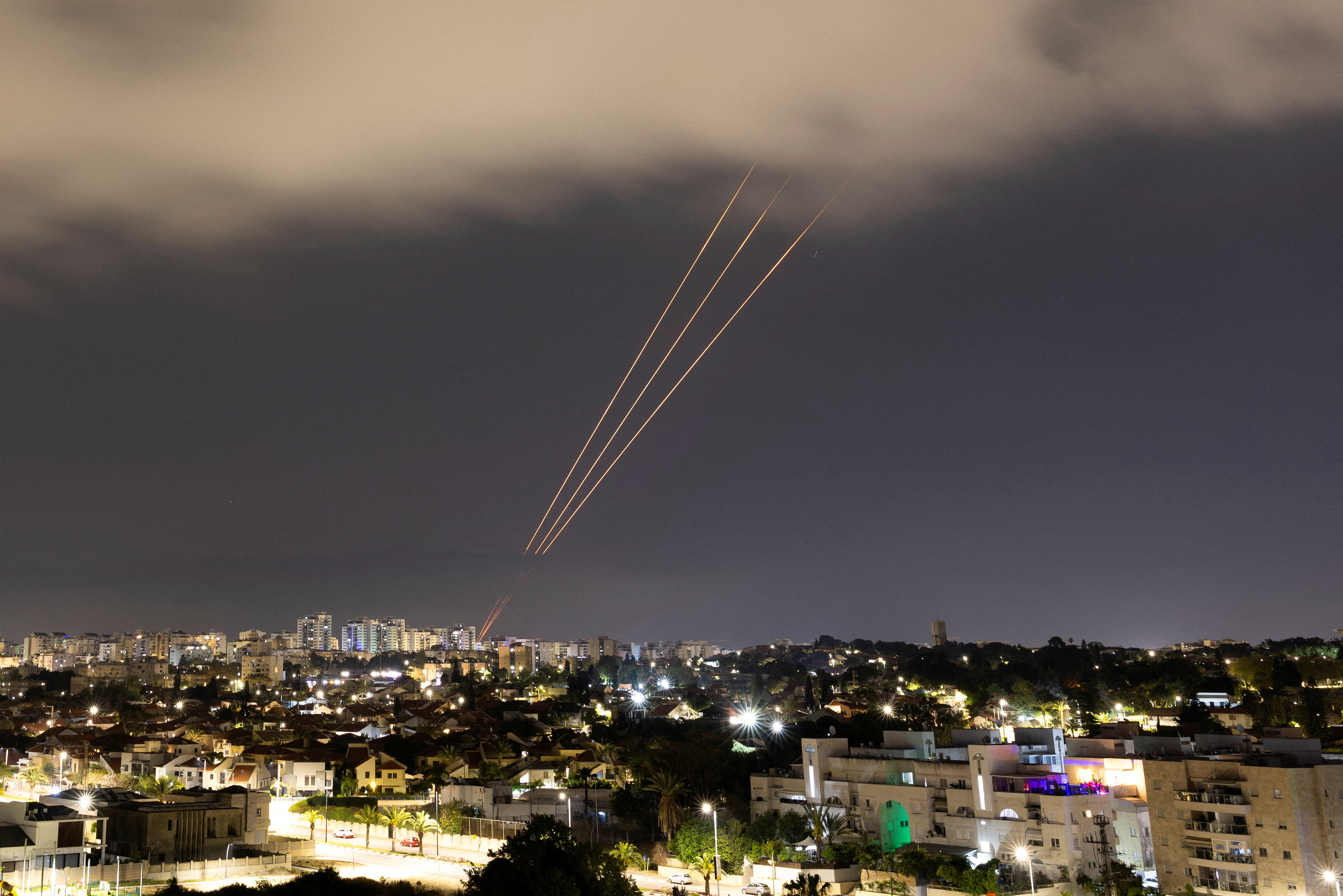
World Chevron
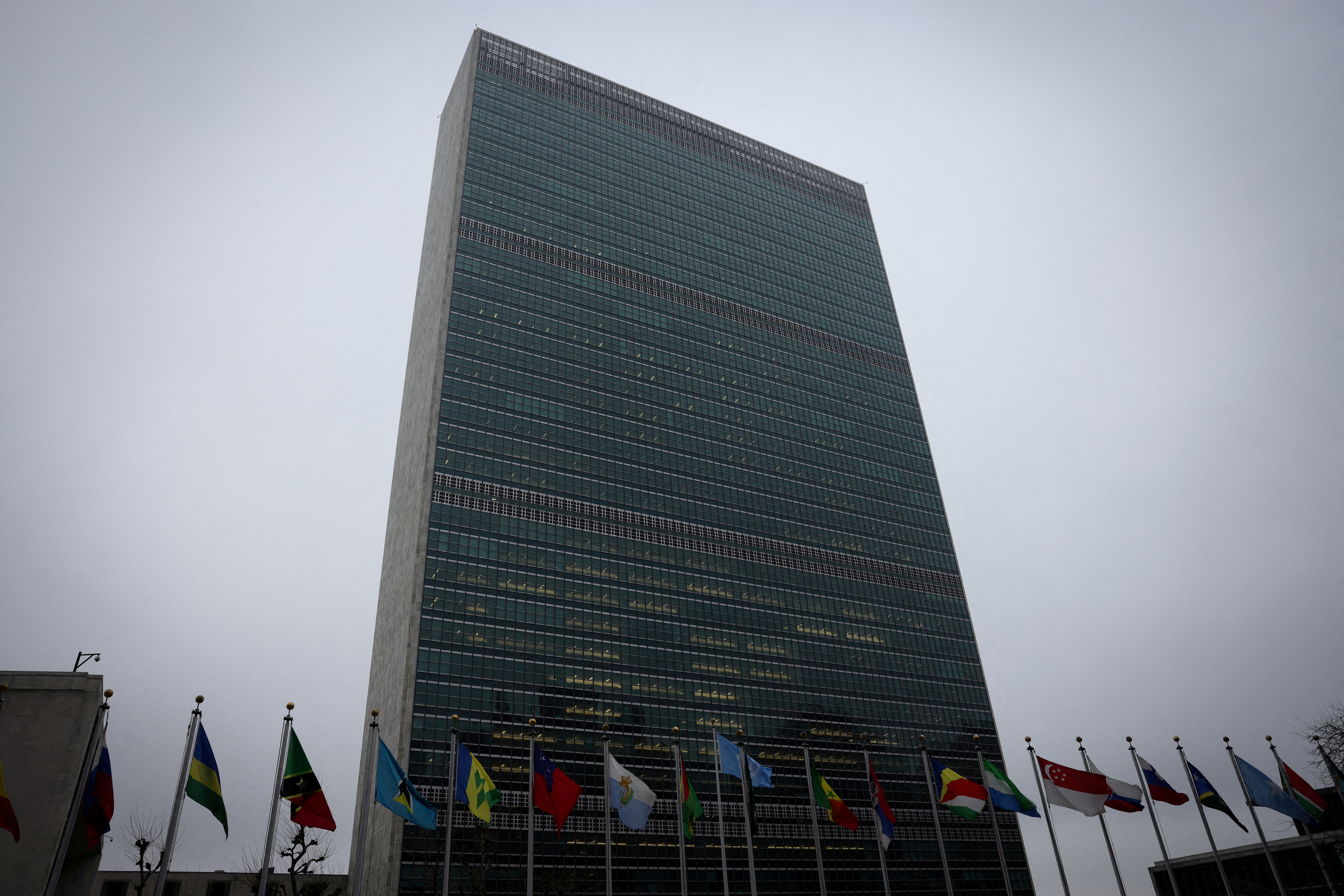
UN Security Council to meet Sunday on Iran attack after Israel request
The United Nations Security Council is set to meet on Sunday after Israel requested the council condemn Iran's attack on Israel and designate the Iranian Revolutionary Guard Corps a terrorist organization.
China is "deeply concerned" about escalating tensions in the Middle East after Iran launched drones and missiles in a retaliatory strike against Israel, a foreign ministry spokesperson said on Sunday.
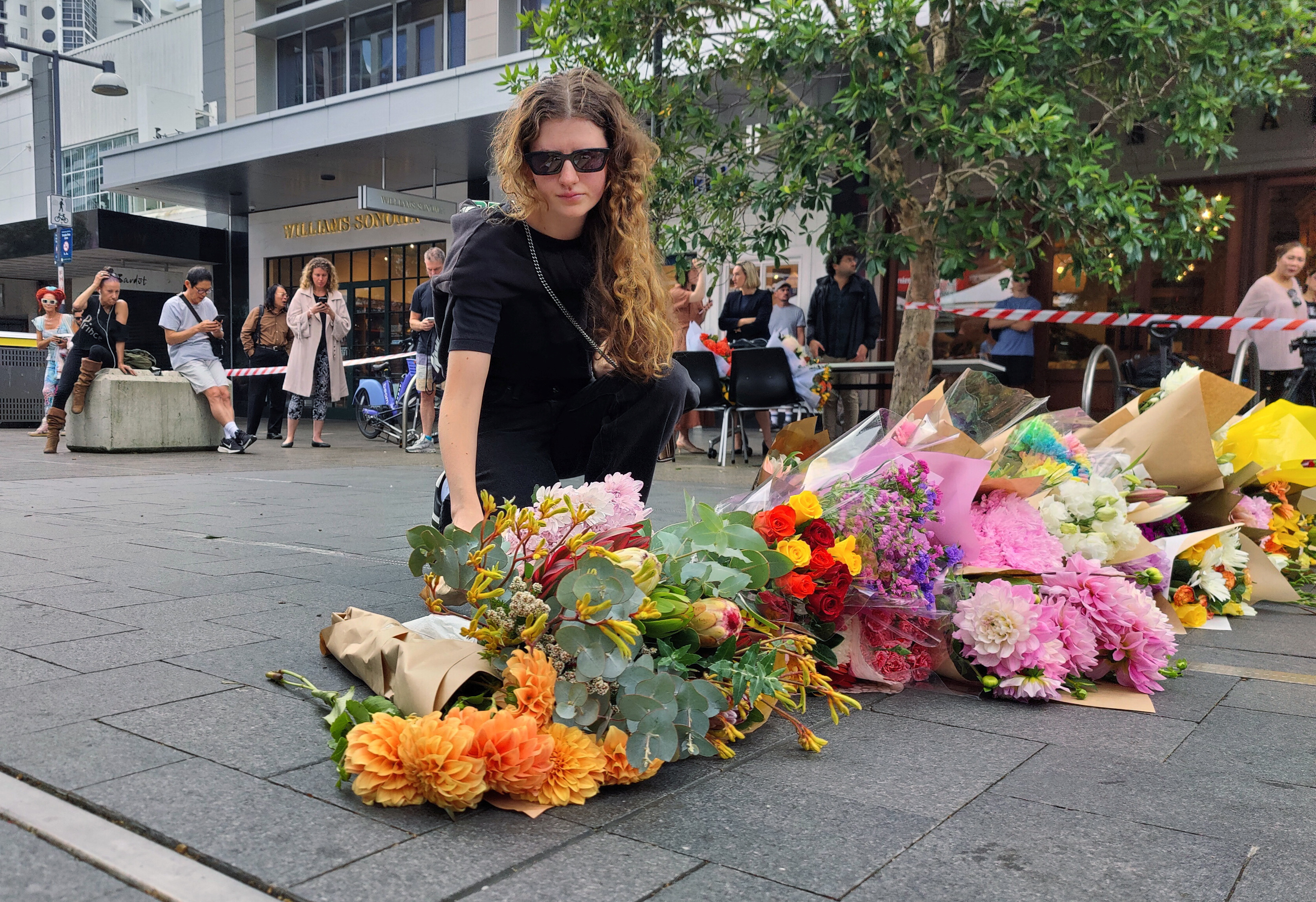
- Australia edition
- International edition
- Europe edition

Iranian attack on Israel expected ‘sooner rather than later’, says Joe Biden
President said US are ‘devoted to the defence of Israel’ as he urged Tehran to show restraint
Joe Biden has said he expects an Iranian attack on Israel “sooner rather than later” and issued a last-ditch message to Tehran: “Don’t.”
“We are devoted to the defence of Israel . We will support Israel. We will help defend Israel and Iran will not succeed,” Biden told reporters on Friday.
Earlier the White House national security spokesperson John Kirby warned that the threat of a significant Iranian attack on Israel remains “viable” despite Washington-led efforts, including calls to Tehran from the UK and Germany, to deter a serious escalation in the conflict in the Middle East.
The White House comments came as several countries, including India, France , Poland and Russia, warned their citizens against travel to the region and Israel’s defence minister, Yoav Gallant, said his country was “prepared to defend [itself] on the ground and in the air, in close cooperation with our partners”.
Later CBS, quoting two unnamed US officials, reported that a substantial missile and drone attack could be launched as early as Friday evening, as a number of countries urgently warned their nationals of the risk of escalating violence in the region, and Israel’s prime minister, Benjamin Netanyahu, convened a security assessment.
Appearing to underline that report, Javad Karimi-Ghodousi, a member of the Iranian parliament’s national security and foreign policy commission, said: “After punishing the Zionist regime in the coming hours, this villain will understand that henceforth, wherever in the world it attempts to assassinate figures of the resistance front, it will again be punished with Iranian missiles.”
German airline Lufthansa said on Friday its planes would no longer use Iranian airspace and extended its suspension of flights to and from Tehran until Thursday.
Qantas has paused its non-stop flights from Perth to London because the 17-and-a-half-hour flight is possible only by using Iranian airspace.
Iran has threatened reprisals against Israel for a strike on the Iranian consulate in Syria on 1 April, in which seven members of the Revolutionary Guards including two generals were killed, sparking fears that an already volatile climate in the Middle East could quickly spiral further.
Tehran’s foreign minister, Hossein Amir-Abdollahian, said on Thursday that Iran felt it had no choice but to respond to the deadly attack on its diplomatic mission after the UN security council failed to take action.
Speaking to reporters, Kirby said the prospect of an Iranian attack on Israel was “still a viable threat” despite concerted efforts by Israel and the US in recent days to deter it .
“We are in constant communication with our Israeli counterparts about making sure that they can defend themselves against those kinds of attacks,” Kirby said. He confirmed that the head of US Central Command, Gen Erik Kurilla, was in Israel talking with defence officials about how Israel could be best prepared.
Israel has said it is strengthening air defences and has paused leave for combat units.
On Friday, France ordered the evacuation of diplomats’ families and warned nationals in several other countries, including Israel and Lebanon, and alerts were issued by Canada and Australia. The US also restricted travel within Israel for US diplomats and their families.
In its strong warning on Friday, the French foreign ministry advised citizens against travelling to Iran, Lebanon, Israel and the Palestinian territories and said French civil servants were banned from conducting any missions there.
The advisories followed a number of media reports that Israel was preparing for the prospect of an attack from Iran, possibly as soon as this weekend.
A US official told the Wall Street Journal that American intelligence reports indicated an Iranian retaliatory strike “possibly on Israeli soil” as opposed to against Israeli interests elsewhere, adding that the strike could come within 24 to 48 hours.
The same report, however, also reported an individual briefed by the Iranian leadership as saying no final decision had been taken by Tehran.
The newspaper reported US officials as saying that the US Navy had repositioned two destroyers in the region in order to protect US and Israeli forces.
While analysts had initially speculated that Iran may not rush into a response, concern has grown in the last two days over the potential for direct conflict between Iran and Israel after years of proxy conflict between the two enemies.
More recently experts have suggested that Iran now feels it is required to act militarily to restore its balance of deterrence with Israel.
On Wednesday, Joe Biden said Iran was threatening a “significant attack” against Israel and that Washington would do all it could to protect Israel’s security.
The US president’s comments in turn followed a televised speech by Iran’s leader saying the attack in Damascus was equivalent to an attack on Iran itself. “When they attacked our consulate area, it was like they attacked our territory,” Ayatollah Ali Khamenei said. “The evil regime must be punished, and it will be punished.”
The Israeli military said it was fully prepared for any strike. Israel was “on alert and highly prepared for various scenarios, and we are constantly assessing the situation,” the Israel Defense Forces spokesperson, R Adm Daniel Hagari, said at a press conference. “We are ready for attack and defence using a variety of capabilities that the IDF has, and also ready with our strategic partners.”
According to reports in the Israeli media, the IDF believes that Iran or one of its proxies are most likely to attempt to strike a military target rather than civilian centres, although some sites such as the Kirya, Israel’s defence headquarters in Tel Aviv, are located in city centres next to shopping malls, offices and restaurants.
Concern over a significant escalation in the Middle East conflict, which has already drawn in Hezbollah in Lebanon, pro-Iranian groups in Iraq and Yemen’s Houthis, came as Israeli forces continued to fight Palestinian militants in the north and centre of the Gaza Strip.
Residents of al-Nusseirat refugee camp in central Gaza said dozens were dead or wounded after Israeli bombardment from air, land and sea that had followed a surprise ground assault on Thursday, and that houses and two mosques had been destroyed.
- Middle East and north Africa

Aid ‘still not reaching Gaza’, as top US official warns famine has started

I believe in another Israel – one not defined by Benjamin Netanyahu and his cronies

US seeking to deter Iran from strike on Israel, officials say

Hamas says it does not have 40 hostages who fit criteria for deal with Israel

Biden vows ‘ironclad’ US commitment to Israel amid fears of Iran attack

Germany faces domestic lawsuit over its arms sales to Israel

Israel’s security at core of German foreign policy due to Holocaust, ICJ hears

‘A new abyss’: Gaza and the hundred years’ war on Palestine

‘This cannot be Eid’: Gaza’s survivors mark the end of Ramadan in the shadow of war
Most viewed.
- Search Please fill out this field.
- Manage Your Subscription
- Give a Gift Subscription
- Sweepstakes
This Iconic Kitchenware Brand Launches Culinary Trips That Include Harvesting Oysters in Normandy and Olive Oil Tasting in Marseille
The food-focused journeys will immerse travelers in French culinary traditions.
:max_bytes(150000):strip_icc():format(webp)/Dobrina-Zhekova-2885480a814f40a2801fda922af4d135.jpeg)
Chalffy/Getty Images/Courtesy of Sur La Table
Hungry for adventures? Sur La Table, the national retailer of cookware and bakeware, is entering the travel industry by launching a series of trips to immerse travelers in the culinary traditions of France. The Seattle-based company partnered with Academic Travel Abroad Inc., a decades-old cultural and educational travel provider, to host two curated itineraries in September and October, with more journeys coming up in 2025.
“At Sur La Table, we’re constantly looking for new ways to engage with our customers that bring to life our passion for cooking and celebrating cuisine from around the world,” Meredith Abbot, culinary director and trip expert at Sur La Table, told Travel+Leisure, noting that the partnership will allow the company to “take our signature cooking programming to the most iconic culinary destinations for a fully immersive trip.”
Hemis/Alamy/Courtesy of Sur La Table
Cooking classes, visits to local markets, food tours, and workshops with artisans will be some of the experiences included in the hyper-local itineraries. The first trip will take place from Sept. 1 until Sept. 8 and will introduce travelers to the gastronomic culture of Northwestern France. From learning to harvest mussels and oysters in the Bay of Biscay to making crepes in the historic port city of Saint-Malo, smoking salmon, and visiting the picture-perfect island of Mont Saint-Michel (at low tide, of course), this week-long trip will whisk travelers to some of the most beautiful corners of Brittany and Normandy.
The second culinary journey, A Taste of Provence and the French Riviera will take place in Marseille and Nice from Sept. 29 to Oct. 6. Guests will try their hand at preparing classic Bouillabaisse seafood soup with a local chef, will learn all about sea salt production in the small village of Salins de Giraud, and will cook a classic Niçois meal with fresh produce from a local organic farm. Another highlight of this trip is a private tour of the Maison Empereur, the oldest specialty store in France.
Both trips will include hands-on experiences and lectures so travelers leave with a better understanding of the history and culture of these distinct culinary regions. Groups will cap at 25 people, and rates start at $7,995, excluding flights.
In a press release, Sur La Table said that its 2025 itineraries will include Paris and the South of Italy.
More From Forbes
Travel style tips from ‘queer eye’ star tan france.
- Share to Facebook
- Share to Twitter
- Share to Linkedin
France is at home in the kitchen or the dressing room.
As Queer Eye ’s fashion expert, Tan France built a reputation on the Netflix reboot for giving transformational makeovers, possessing sharp style sensibilities and leading a relentless campaign for people to French tuck their shirts.
Forbes Travel Guide caught up with France as the Fab Five shoots season nine in Las Vegas , and the Emmy winner revealed that he’s working on his first scripted role. He couldn’t say more about the project, other than it will debut this summer, but he did share plane outfit tips, the two travel destinations he visits on repeat and why castmate Antoni Porowski may have some competition in the kitchen.
What should travelers wear for a long-haul flight while still looking chic?
Here’s my take: I don’t get dressed up. I just wear the nicest version of travel clothes I can find. I like to keep it really slick and just wear all one color. I kind of fall into a rotation where a couple months at a time, I will wear a certain color palette. Right now, I’m in my camel era.
I have these Guest in Residence camel pants that you could liken to pajama pants, but they’re solid. They’re cashmere. They feel gorgeous. And they look dressy enough where I could see Gigi [Hadid, the luxury knitwear brand’s founder] in her heels wearing these. They’re very chic. And then I wear a camel-colored T-shirt that is from Uniqlo and a camel sweater. Those things combined create a really sophisticated look.
Sometimes, I’ll put a large black overcoat over it, a duster coat that comes down to almost my ankles. Then as the flight gets cooler, I’ve got layers I can take off. And no matter how many layers I take off, I still look chic underneath. And that’s my that’s my tip in general, when layering: Don’t forget that the layers underneath aren’t just there for comfort. You may need to take off the outer layers, and you still want to look sophisticated, like you’ve got a full look underneath.
Gmail And YouTube Hackers Bypass Google s 2FA Account Security
Apple confirms innovative iphone 16 pro upgrade, wwe smackdown results winners and grades after wrestlemania 40.
When considering essential fashion pieces, aside from the little black dress, what’s an item that should be in every woman’s wardrobe?
Any leather jacket that works for you. And this doesn’t have to be leather. It could be a vegan leather. Something that you can dress up or dress down very easily. My go-to is a moto jacket and has been for 25 years. That is the thing you can add to your rotation to help you have your own vibe.
What’s a fashion item that you’re obsessed with right now?
Gold jewelry. It doesn’t have to be real — it can be costume. I have plenty of costume jewelry. My castmates on any show I’ve ever done call me the “Persian Prince” because my hands and wrists are typically stacked in gold jewelry. I just think it’s the most beautiful way to dress up a look.
Even if I’m just in my travel outfit, which is, as I said, a pair of very nondescript pants, a simple tee and a sweater, I throw on all of the jewelry, and it looks very intentional that this is the way I dial up my look. As opposed to the “it” bag or shoe, get jewelry that you can build up or take away, so you’ve got minimal or maximalist looks that make it clear that this is very uniquely you. That’s all in how you style that gold jewelry.
France has gotten to know Vegas well.
You’re shooting season nine of Queer Eye in Vegas. Have you discovered any spots there?
I went to a place called Lotus of Siam . I had one of the best Thai meals in my life. We’ve been told by so many people that that was the place to go. They weren’t wrong — it was gorgeous. We had a lot of Thai food in Vegas. It has been wonderful.
There is a boutique that we’re shopping at within the next couple of weeks. It’s called Vasari , and their offering is amazing.
What are some of your favorite travel destinations?
These two places I’ve now been multiple times because they are my favorites. People and my friends say, “Well, there could be other places that will be your favorite.” I know there’s much more to discover, however, I’m a creature of habit. Once I find something I love, I stick with that.
The first one is Iceland . I love Iceland so desperately. I think it’s beautiful, and the landscape is like no other place. The people are so kind. The crime rate is so low, so I feel so safe. And I just find the food wonderful. I love how isolated it is — I feel like I’m on another planet.
I like Reykjavik very much, but what we like is doing the Golden Circle. My favorite thing to do is not book a hotel for the first or the last night, and then drive around, and when we find a place we love, we get a hotel.
Iceland is No. 1, [tied with] Japan. I love Tokyo so much. I went last month for a quick trip and that was my fourth time there. I love Tokyo, I love Kyoto — those are the two places I’ve visited in Japan.
It is truly my favorite place on earth. I love everything about it. I think that it’s so peaceful and the people are so incredibly civilized. I love that culture. I just think it’s magical and light years ahead of the rest of us.
Are there any places that you still want to visit?
Seoul , Korea, that’s my next one. I love Asia so much and Seoul has been on my list for a while. I was going to go last month. I choose my own wardrobe for Queer Eye , but I only have two and a half to three days to shop. So, I went to a place where I knew I could get everything I needed, which is why I went to Tokyo. I wanted to go to Seoul instead. But I want to leave that for when I have a week and Rob [my husband] can join me as well, which is hard right now because we have two very young children, a 2-year-old and a 10-month-old. And so we’re going to wait a couple of years so we can experience it together.
When you travel, what do you use as your carry-on?
I use a brand called Away , and then I will also carry a backpack. For my trip to Japan, I only took carry-on. I can fit three looks on a carry-on and another couple of share options, like tops so I can rotate. I will rewear a pant and a shoe.
I also like a waterproof toiletry bag that was gifted to me by Byredo . I use it as my Dopp kit and fill it with these stackable, refillable containers that take up little space and put moisturizer, night cream, face wash and eye cream in those.
France’s culinary sanctuary.
You recently documented building your dream Tudor-style house in Salt Lake City on the video series Home at Last with Tan France . When unveiling the kitchen, you said, “This L’Atelier stove — I’ve dreamt of having something like this for about 20 years.” Why did you covet this range?
It feels so grand. It feels like the person I desperately wanted to be, which is chic, sophisticated and just so bold. I always dreamt of being the kind of person who had a focal point in the kitchen like this because, for me, it just oozes sophistication. And I’m such a keen cook, that it’s the most practical range for me.
I have friends over for most Thanksgivings and Christmases, and I was always having to really figure out timing for everything I’m cooking. I know that’s a problem that most people experience, but because I’m such a keen cook, I wanted to finally get to a point in life where I could arrive by having a much larger stove. And that’s what I have now.
We moved in a week before Thanksgiving and we did a Thanksgiving and then a Friendsgiving meal, I was able to fully utilize both of the ovens in that stove. That week really solidified why the L’Atelier was so important to me.
What is your dish to cook on the range?
For the stovetop, many things, but in particular, a dish called daal . It’s a South Asian version of comfort food. It’s lentils. The West would liken it to soup, but it’s very thick. That is my favorite thing to make, it’s my husband’s favorite meal and it’s my son’s favorite Indian meal. I make it in large batches — I can also freeze it. This gives me the space to be able to make enough for 20 meals, which is wild.
And then for the oven, I love to make a chocolate cake — in particular, Ina Garten’s chocolate cake that I tweaked, so now it’s a ginger chocolate cake. It’s my favorite thing to bake.
Salt Lake City takes the cake — literally — for France.
When out-of-town guests visit you in Salt Lake City, where do you like to take them?
There’s a bakery that I love, Tulie . They do the best bakes in Salt Lake for sure, but some of the best things I’ve had in the United States. They do a wonderful job, and I’m not just saying that because I’m a Salt Lake local. When it comes to baked goods, I don’t give credit if they’re not formidable, and they really are.
There’s an Indian restaurant that I really like called Mumbai House . That is wonderful.
And then I like taking them on hikes. I’m very outdoorsy. We hike something called the Bonneville Shoreline . And then there’s a place called Antelope Island , which is about a 20-minute to half-an-hour drive out of Salt Lake, and it’s gorgeous, magical, and there’s an island that has a bunch of antelope and mountains to climb. It’s surrounded by the Great Salt Lake.

- Editorial Standards
- Reprints & Permissions
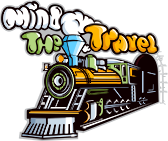
Travel Itinerary For One Week in Moscow: The Best of Moscow!
I just got back from one week in Moscow. And, as you might have already guessed, it was a mind-boggling experience. It was not my first trip to the Russian capital. But I hardly ever got enough time to explore this sprawling city. Visiting places for business rarely leaves enough time for sightseeing. I think that if you’ve got one week in Russia, you can also consider splitting your time between its largest cities (i.e. Saint Petersburg ) to get the most out of your trip. Seven days will let you see the majority of the main sights and go beyond just scratching the surface. In this post, I’m going to share with you my idea of the perfect travel itinerary for one week in Moscow.
Moscow is perhaps both the business and cultural hub of Russia. There is a lot more to see here than just the Kremlin and Saint Basil’s Cathedral. Centuries-old churches with onion-shaped domes dotted around the city are in stark contrast with newly completed impressive skyscrapers of Moscow City dominating the skyline. I spent a lot of time thinking about my Moscow itinerary before I left. And this city lived up to all of my expectations.
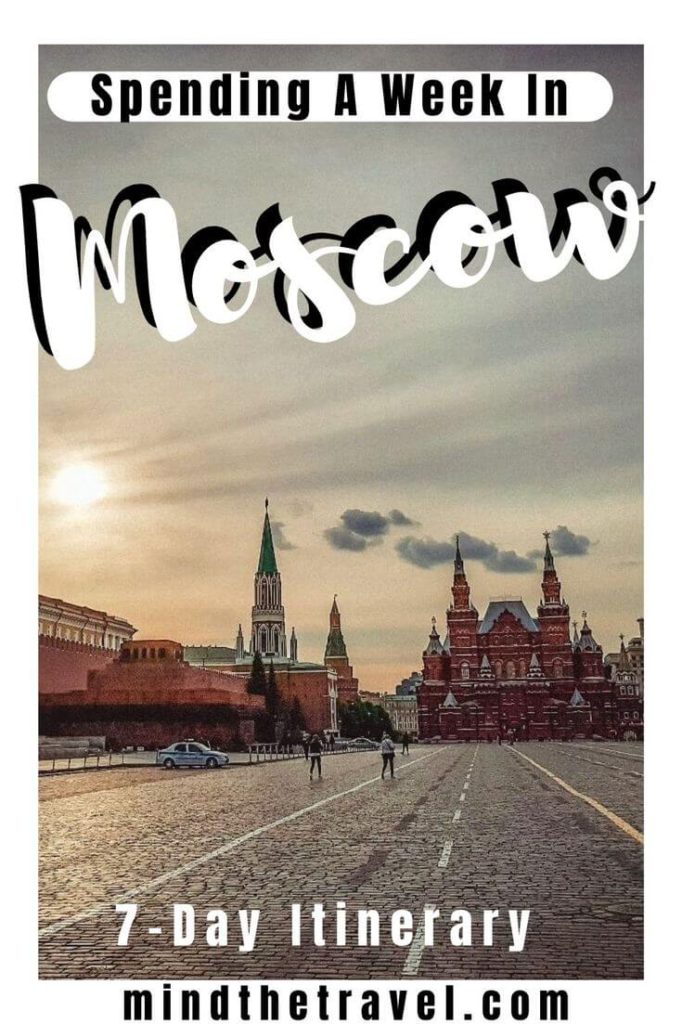
Travel Itinerary For One Week in Moscow
Day 1 – red square and the kremlin.
Metro Station: Okhotny Ryad on Red Line.
No trip to Moscow would be complete without seeing its main attraction. The Red Square is just a stone’s throw away from several metro stations. It is home to some of the most impressive architectural masterpieces in the city. The first thing you’ll probably notice after entering it and passing vendors selling weird fur hats is the fairytale-like looking Saint Basil’s Cathedral. It was built to commemorate one of the major victories of Ivan the Terrible. I once spent 20 minutes gazing at it, trying to find the perfect angle to snap it. It was easier said than done because of the hordes of locals and tourists.
As you continue strolling around Red Square, there’s no way you can miss Gum. It was widely known as the main department store during the Soviet Era. Now this large (yet historic) shopping mall is filled with expensive boutiques, pricey eateries, etc. During my trip to Moscow, I was on a tight budget. So I only took a retro-style stroll in Gum to get a rare glimpse of a place where Soviet leaders used to grocery shop and buy their stuff. In case you want some modern shopping experience, head to the Okhotny Ryad Shopping Center with stores like New Yorker, Zara, and Adidas.
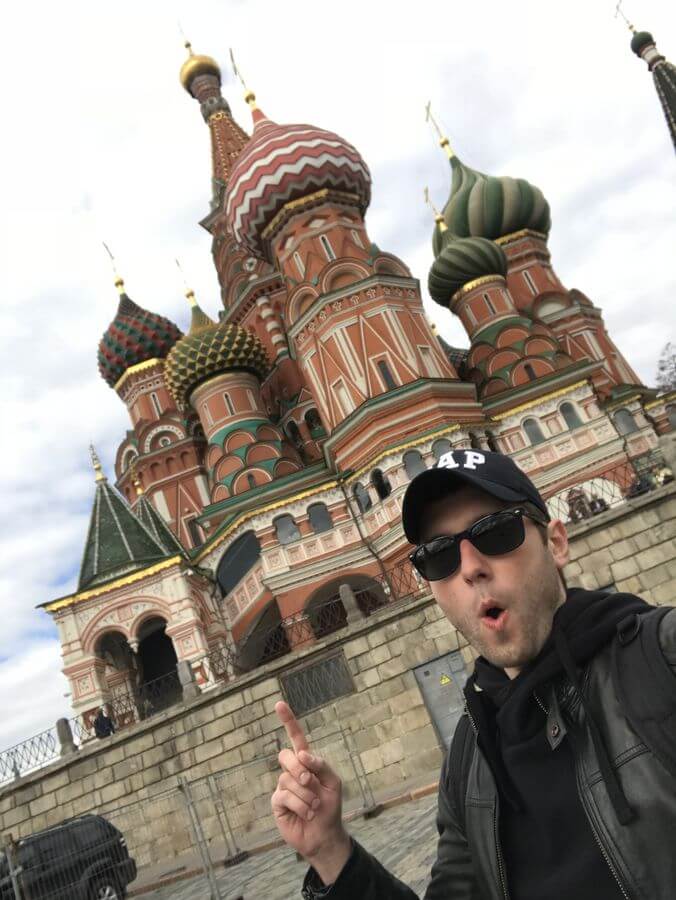
Read Next: Things To Do on Socotra
To continue this Moscow itinerary, next you may want to go inside the Kremlin walls. This is the center of Russian political power and the president’s official residence. If you’re planning to pay Kremlin a visit do your best to visit Ivan the Great Bell Tower as well. Go there as early as possible to avoid crowds and get an incredible bird’s-eye view. There are a couple of museums that are available during designated visiting hours. Make sure to book your ticket online and avoid lines.
Day 2 – Cathedral of Christ the Saviour, the Tretyakov Gallery, and the Arbat Street
Metro Station: Kropotkinskaya on Red Line
As soon as you start creating a Moscow itinerary for your second day, you’ll discover that there are plenty of metro stations that are much closer to certain sites. Depending on your route, take a closer look at the metro map to pick the closest.
The white marble walls of Christ the Saviour Cathedral are awe-inspiring. As you approach this tallest Orthodox Christian church, you may notice the bronze sculptures, magnificent arches, and cupolas that were created to commemorate Russia’s victory against Napoleon.
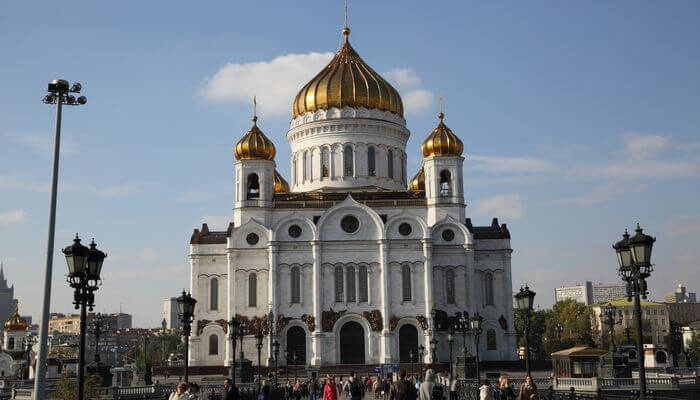
How to Get a Decent Haircut in a Foreign Country
Unfortunately, the current Cathedral is a replica, since original was blown to bits in 1931 by the Soviet government. The new cathedral basically follows the original design, but they have added some new elements such as marble high reliefs.
Home to some precious collection of artworks, in Tretyakov Gallery you can find more than 150,000 of works spanning centuries of artistic endeavor. Originally a privately owned gallery, it now has become one of the largest museums in Russia. The Gallery is often considered essential to visit. But I have encountered a lot of locals who have never been there.
Famous for its souvenirs, musicians, and theaters, Arbat street is among the few in Moscow that were turned into pedestrian zones. Arbat street is usually very busy with tourists and locals alike. My local friend once called it the oldest street in Moscow dating back to 1493. It is a kilometer long walking street filled with fancy gift shops, small cozy restaurants, lots of cute cafes, and street artists. It is closed to any vehicular traffic, so you can easily stroll it with kids.
Day 3 – Moscow River Boat Ride, Poklonnaya Hill Victory Park, the Moscow City
Metro Station: Kievskaya and Park Pobedy on Dark Blue Line / Vystavochnaya on Light Blue Line
Voyaging along the Moscow River is definitely one of the best ways to catch a glimpse of the city and see the attractions from a bit different perspective. Depending on your Moscow itinerary, travel budget and the time of the year, there are various types of boats available. In the summer there is no shortage of boats, and you’ll be spoiled for choice.
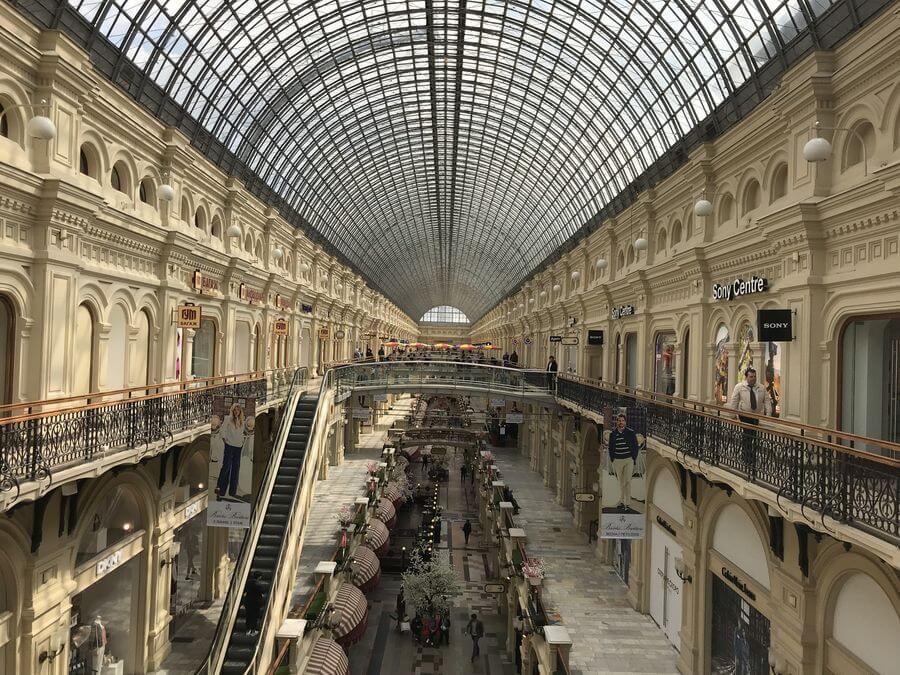
Travel Itinerary for One Week in Beijing
If you find yourself in Moscow during the winter months, I’d recommend going with Radisson boat cruise. These are often more expensive (yet comfy). They offer refreshments like tea, coffee, hot chocolate, and, of course, alcoholic drinks. Prices may vary but mostly depend on your food and drink selection. Find their main pier near the opulent Ukraine hotel . The hotel is one of the “Seven Sisters”, so if you’re into the charm of Stalinist architecture don’t miss a chance to stay there.
The area near Poklonnaya Hill has the closest relation to the country’s recent past. The memorial complex was completed in the mid-1990s to commemorate the Victory and WW2 casualties. Also known as the Great Patriotic War Museum, activities here include indoor attractions while the grounds around host an open-air museum with old tanks and other vehicles used on the battlefield.
How I Planned My Trip to Vietnam
The hallmark of the memorial complex and the first thing you see as you exit metro is the statue of Nike mounted to its column. This is a very impressive Obelisk with a statue of Saint George slaying the dragon at its base.
Maybe not as impressive as Shanghai’s Oriental Pearl Tower , the skyscrapers of the Moscow City (otherwise known as Moscow International Business Center) are so drastically different from dull Soviet architecture. With 239 meters and 60 floors, the Empire Tower is the seventh highest building in the business district.
The observation deck occupies 56 floor from where you have some panoramic views of the city. I loved the view in the direction of Moscow State University and Luzhniki stadium as well to the other side with residential quarters. The entrance fee is pricey, but if you’re want to get a bird’s eye view, the skyscraper is one of the best places for doing just that.
Day 4 – VDNKh, Worker and Collective Farm Woman Monument, The Ostankino TV Tower
Metro Station: VDNKh on Orange Line
VDNKh is one of my favorite attractions in Moscow. The weird abbreviation actually stands for Russian vystavka dostizheniy narodnogo khozyaystva (Exhibition of Achievements of the National Economy). With more than 200 buildings and 30 pavilions on the grounds, VDNKh serves as an open-air museum. You can easily spend a full day here since the park occupies a very large area.
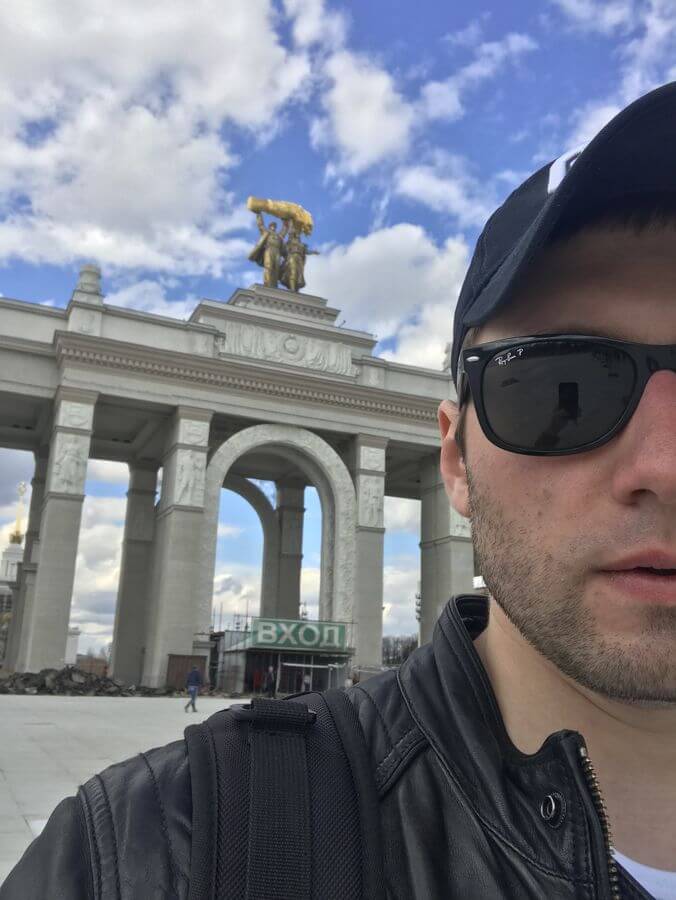
Places to Visit in Barcelona That Aren’t Beaches
First, there are pavilions that used to showcase different cultures the USSR was made of. Additionally, there is a number of shopping pavilions, as well as Moskvarium (an Oceanarium) that features a variety of marine species. VDNKh is a popular venue for events and fairs. There is always something going on, so I’d recommend checking their website if you want to see some particular exhibition.
A stone’s throw away from VDNKh there is a very distinctive 25-meters high monument. Originally built in 1937 for the world fair in Paris, the hulking figures of men and women holding a hammer and a sickle represent the Soviet idea of united workers and farmers. It doesn’t take much time to see the monument, but visiting it gives some idea of the Soviet Union’s grandiose aspirations.
I have a thing for tall buildings. So to continue my travel itinerary for one week in Moscow I decided to climb the fourth highest TV tower in the world. This iconic 540m tower is a fixture of the skyline. You can see it virtually from everywhere in Moscow, and this is where you can get the best panoramic views (yep, even better than Empire skyscraper).

Parts of the floor are made of tempered glass, so it can be quite scary to exit the elevator. But trust me, as you start observing buildings and cars below, you won’t want to leave. There is only a limited number of tickets per day, so you may want to book online. Insider tip: the first tour is cheaper, you can save up to $10 if go there early.
Day 5 – A Tour To Moscow Manor Houses
Metro Station: Kolomenskoye, Tsaritsyno on Dark Green Line / Kuskovo on Purple Line
I love visiting the manor houses and palaces in Moscow. These opulent buildings were generally built to house Russian aristocratic families and monarchs. Houses tend to be rather grand affairs with impressive architecture. And, depending on the whims of the owners, some form of a landscaped garden.
During the early part of the 20th century though, many of Russia’s aristocratic families (including the family of the last emperor) ended up being killed or moving abroad . Their manor houses were nationalized. Some time later (after the fall of the USSR) these were open to the public. It means that today a great many of Moscow’s finest manor houses and palaces are open for touring.

20 Travel Tips I’ve Learned From Travelling The World
There are 20 manor houses scattered throughout the city and more than 25 in the area around. But not all of them easily accessible and exploring them often takes a lot of time. I’d recommend focusing on three most popular estates in Moscow that are some 30-minute metro ride away from Kremlin.
Sandwiched between the Moscow River and the Andropov Avenue, Kolomenskoye is a UNESCO site that became a public park in the 1920’s. Once a former royal estate, now it is one of the most tranquil parks in the city with gorgeous views. The Ascension Church, The White Column, and the grounds are a truly grand place to visit.
You could easily spend a full day here, exploring a traditional Russian village (that is, in fact, a market), picnicking by the river, enjoying the Eastern Orthodox church architecture, hiking the grounds as well as and wandering the park and gardens with wildflower meadows, apple orchards, and birch and maple groves. The estate museum showcases Russian nature at its finest year-round.
12 Stunning National Parks and Regional Parks In France
If my travel itinerary for one week in Moscow was a family tree, Tsaritsyno Park would probably be the crazy uncle that no-one talks about. It’s a large park in the south of the city of mind-boggling proportions, unbelievable in so many ways, and yet most travelers have never heard of it.
The palace was supposed to be a summer home for Empress Catherine the Great. But since the construction didn’t meet with her approval the palace was abandoned. Since the early 1990’s the palace, the pond, and the grounds have been undergoing renovations. The entire complex is now looking brighter and more elaborately decorated than at possibly any other time during its history. Like most parks in Moscow, you can visit Tsaritsyno free of charge, but there is a small fee if you want to visit the palace.
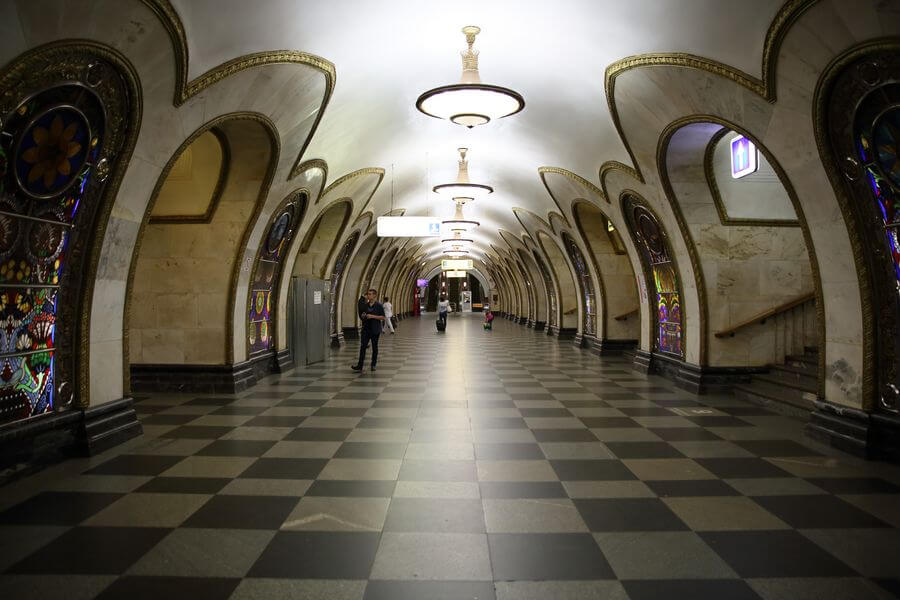
How To Stop Procrastinating When Trip Planning
Last, but by no means least on my Moscow itinerary is Kuskovo Park . This is definitely an off-the-beaten-path place. While it is not easily accessible, you will be rewarded with a lack of crowds. This 18th-century summer country house of the Sheremetev family was one of the first summer country estates of the Russian nobility. And when you visit you’ll quickly realize why locals love this park.
Like many other estates, Kuskovo has just been renovated. So there are lovely French formal garden, a grotto, and the Dutch house to explore. Make sure to plan your itinerary well because the estate is some way from a metro station.
Day 6 – Explore the Golden Ring
Creating the Moscow itinerary may keep you busy for days with the seemingly endless amount of things to do. Visiting the so-called Golden Ring is like stepping back in time. Golden Ring is a “theme route” devised by promotion-minded journalist and writer Yuri Bychkov.
Having started in Moscow the route will take you through a number of historical cities. It now includes Suzdal, Vladimir, Kostroma, Yaroslavl and Sergiev Posad. All these awe-inspiring towns have their own smaller kremlins and feature dramatic churches with onion-shaped domes, tranquil residential areas, and other architectural landmarks.
Two Weeks In Thailand: The Perfect 14-Day Itinerary
I only visited two out of eight cities included on the route. It is a no-brainer that Sergiev Posad is the nearest and the easiest city to see on a day trip from Moscow. That being said, you can explore its main attractions in just one day. Located some 70 km north-east of the Russian capital, this tiny and overlooked town is home to Trinity Lavra of St. Sergius, UNESCO Site.
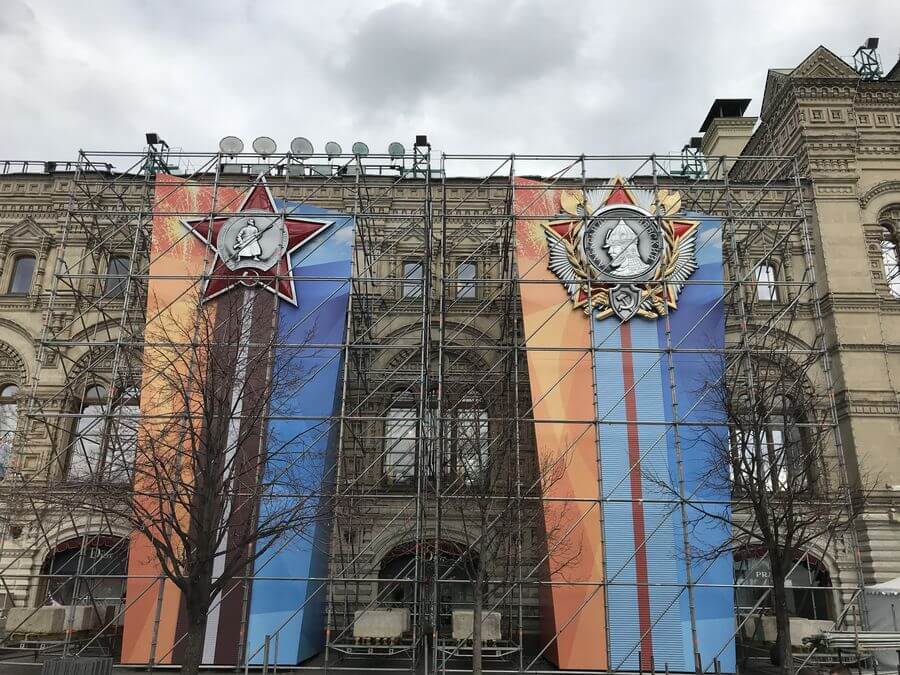
You Will Also Like: 3-Day London Itinerary
Sergiev Posad is often described as being at the heart of Russian spiritual life. So it is uncommon to see the crowds of Russian pilgrims showing a deep reverence for their religion. If you’re traveling independently and using public transport, you can reach Sergiev Posad by bus (departs from VDNKh) or by suburban commuter train from Yaroslavskaya Railway Station (Bahnhof). It takes about one and a half hours to reach the town.
Trinity Lavra of St. Sergius is a great place to get a glimpse of filling and warming Russian lunch, specifically at the “ Gostevaya Izba ” restaurant. Try the duck breast, hearty potato and vegetables, and the awesome Napoleon cake.
Day 7 – Gorky Park, Izmailovo Kremlin, Patriarch’s Ponds
Metro Station: Park Kultury or Oktyabrskaya on Circle Line / Partizanskaya on Dark Blue Line / Pushkinskaya on Dark Green Line
Gorky Park is in the heart of Moscow. It offers many different types of outdoor activities, such as dancing, cycling, skateboarding, walking, jogging, and anything else you can do in a park. Named after Maxim Gorky, this sprawling and lovely park is where locals go on a picnic, relax and enjoy free yoga classes. It’s a popular place to bike around, and there is a Muzeon Art Park not far from here. A dynamic location with a younger vibe. There is also a pier, so you can take a cruise along the river too.
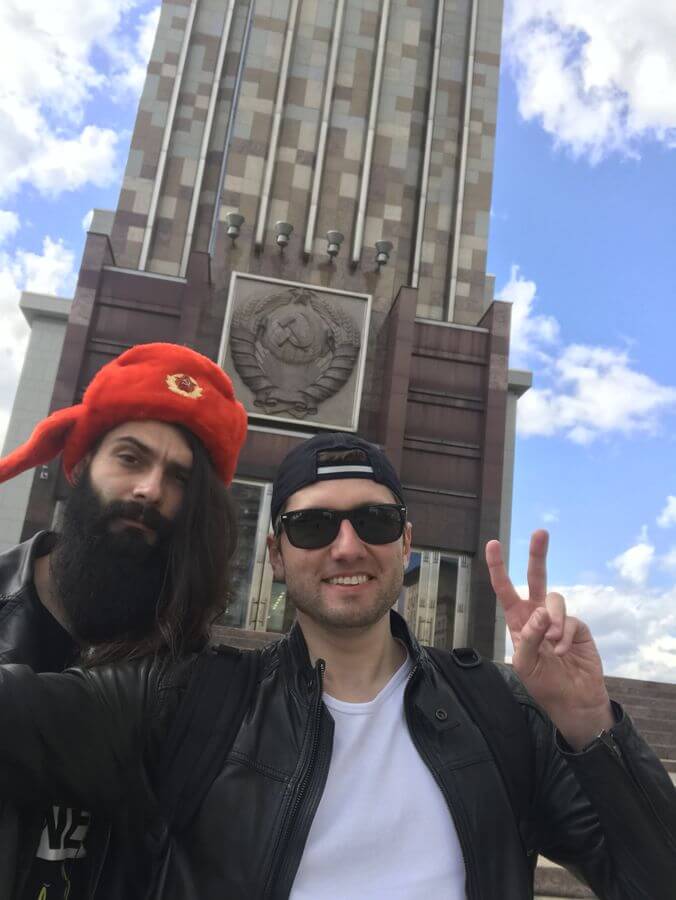
How to Save Money While Traveling in Europe
The Kremlin in Izmailovo is by no means like the one you can find near the Red Square. Originally built for decorative purposes, it now features the Vernissage flea market and a number of frequent fairs, exhibitions, and conferences. Every weekend, there’s a giant flea market in Izmailovo, where dozens of stalls sell Soviet propaganda crap, Russian nesting dolls, vinyl records, jewelry and just about any object you can imagine. Go early in the morning if you want to beat the crowds.
All the Bulgakov’s fans should pay a visit to Patriarch’s Ponds (yup, that is plural). With a lovely small city park and the only one (!) pond in the middle, the location is where the opening scene of Bulgakov’s novel Master and Margarita was set. The novel is centered around a visit by Devil to the atheistic Soviet Union is considered by many critics to be one of the best novels of the 20th century. I spent great two hours strolling the nearby streets and having lunch in the hipster cafe.
Conclusion and Recommendations
To conclude, Moscow is a safe city to visit. I have never had a problem with getting around and most locals are really friendly once they know you’re a foreigner. Moscow has undergone some serious reconstruction over the last few years. So you can expect some places to be completely different. I hope my one week Moscow itinerary was helpful! If you have less time, say 4 days or 5 days, I would cut out day 6 and day 7. You could save the Golden Ring for a separate trip entirely as there’s lots to see!
What are your thoughts on this one week Moscow itinerary? Are you excited about your first time in the city? Let me know in the comments below!
JOIN MY FREE WEEKLY NEWSLETTER!
Email Address *
YOU WILL ALSO LIKE

10 Dishes You Must Try When Going To Moscow

15 Fantastic and Easy Day Trips Close to Moscow

When Is the Best Time To Visit Russia
24 comments.
Ann Snook-Moreau
Moscow looks so beautiful and historic! Thanks for including public transit information for those of us who don’t like to rent cars.
MindTheTravel
Yup, that is me 🙂 Rarely rent + stick to the metro = Full wallet!
Mariella Blago
Looks like you had loads of fun! Well done. Also great value post for travel lovers.
Thanks, Mariella!
I have always wanted to go to Russia, especially Moscow. These sights look absolutely beautiful to see and there is so much history there!
Agree! Moscow is a thousand-year-old city and there is definitely something for everyone.
Tara Pittman
Those are amazing buildings. Looks like a place that would be amazing to visit.
Adriana Lopez
Never been to Moscow or Russia but my family has. Many great spots and a lot of culture. Your itinerary sounds fantastic and covers a lot despite it is only a short period of time.
What was their favourite thing about Russia?
Gladys Parker
I know very little about Moscow or Russia for the\at matter. I do know I would have to see the Red Square and all of its exquisite architectural masterpieces. Also the CATHEDRAL OF CHRIST THE SAVIOUR. Thanks for shedding some light on visiting Moscow.
Thanks for swinging by! The Red Square is a great starting point, but there way too many places and things to discover aside from it!
Ruthy @ Percolate Kitchen
You are making me so jealous!! I’ve always wanted to see Russia.
Moscow is in my bucket list, I don’t know when I can visit there, your post is really useful. As a culture rich place we need to spend at least week.
DANA GUTKOWSKI
Looks like you had a great trip! Thanks for all the great info! I’ve never been in to Russia, but this post makes me wanna go now!
Wow this is amazing! Moscow is on my bucket list – such an amazing place to visit I can imagine! I can’t wait to go there one day!
The building on the second picture looks familiar. I keep seeing that on TV.
Reesa Lewandowski
What beautiful moments! I always wish I had the personality to travel more like this!
Perfect itinerary for spending a week in Moscow! So many places to visit and it looks like you had a wonderful time. I would love to climb that tower. The views I am sure must have been amazing!
I was lucky enough to see the skyline of Moscow from this TV Tower and it is definitely mind-blowing.
Chelsea Pearl
Moscow is definitely up there on my travel bucket list. So much history and iconic architecture!
Thumbs up! 🙂
Blair Villanueva
OMG I dream to visit Moscow someday! Hope the visa processing would be okay (and become more affordable) so I could pursue my dream trip!
Yup, visa processing is the major downside! Agree! Time and the money consuming process…
Save my name, email, and website in this browser for the next time I comment.

- Privacy Overview
- Strictly Necessary Cookies
My website uses cookies so that I can provide you with the best user experience possible. Cookie information is stored in your browser and performs functions such as recognising you when you return to my website and helping me to understand which sections of Mind The Travel you find most interesting and useful.
You can adjust all of your cookie settings by navigating the tabs on the left hand side.
Strictly Necessary Cookie should be enabled at all times so that I can save your preferences for cookie settings.
If you disable this cookie, I will not be able to save your preferences. This means that every time you visit my website you will need to enable or disable cookies again.
2018 Primetime Emmy & James Beard Award Winner
In Transit: Notes from the Underground
Jun 06 2018.
Spend some time in one of Moscow’s finest museums.
Subterranean commuting might not be anyone’s idea of a good time, but even in a city packing the war-games treasures and priceless bejeweled eggs of the Kremlin Armoury and the colossal Soviet pavilions of the VDNKh , the Metro holds up as one of Moscow’s finest museums. Just avoid rush hour.
The Metro is stunning and provides an unrivaled insight into the city’s psyche, past and present, but it also happens to be the best way to get around. Moscow has Uber, and the Russian version called Yandex Taxi , but also some nasty traffic. Metro trains come around every 90 seconds or so, at a more than 99 percent on-time rate. It’s also reasonably priced, with a single ride at 55 cents (and cheaper in bulk). From history to tickets to rules — official and not — here’s what you need to know to get started.
A Brief Introduction Buying Tickets Know Before You Go (Down) Rules An Easy Tour
A Brief Introduction
Moscow’s Metro was a long time coming. Plans for rapid transit to relieve the city’s beleaguered tram system date back to the Imperial era, but a couple of wars and a revolution held up its development. Stalin revived it as part of his grand plan to modernize the Soviet Union in the 1920s and 30s. The first lines and tunnels were constructed with help from engineers from the London Underground, although Stalin’s secret police decided that they had learned too much about Moscow’s layout and had them arrested on espionage charges and deported.
The beauty of its stations (if not its trains) is well-documented, and certainly no accident. In its illustrious first phases and particularly after the Second World War, the greatest architects of Soviet era were recruited to create gleaming temples celebrating the Revolution, the USSR, and the war triumph. No two stations are exactly alike, and each of the classic showpieces has a theme. There are world-famous shrines to Futurist architecture, a celebration of electricity, tributes to individuals and regions of the former Soviet Union. Each marble slab, mosaic tile, or light fixture was placed with intent, all in service to a station’s aesthetic; each element, f rom the smallest brass ear of corn to a large blood-spattered sword on a World War II mural, is an essential part of the whole.
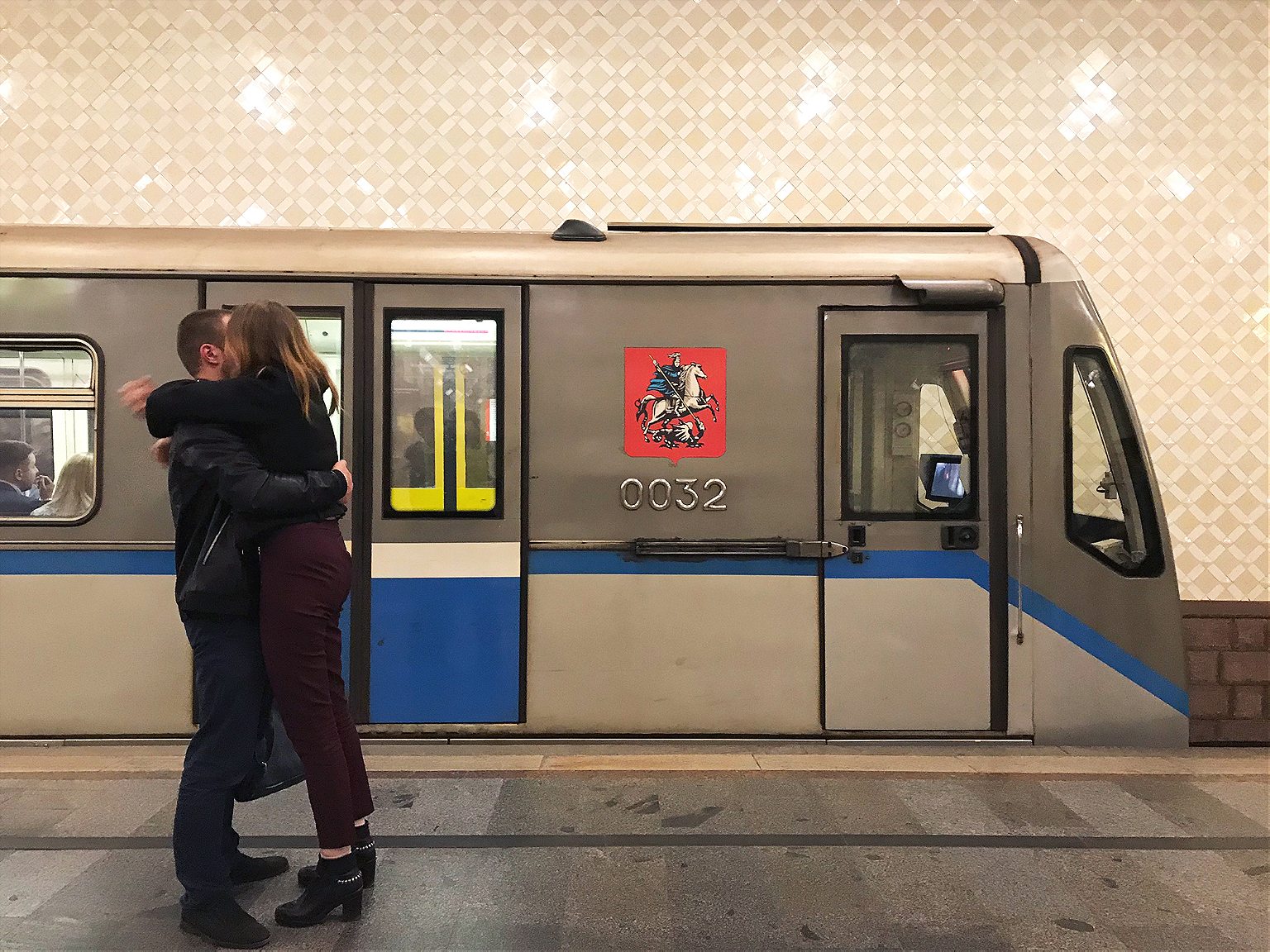
The Metro is a monument to the Soviet propaganda project it was intended to be when it opened in 1935 with the slogan “Building a Palace for the People”. It brought the grand interiors of Imperial Russia to ordinary Muscovites, celebrated the Soviet Union’s past achievements while promising its citizens a bright Soviet future, and of course, it was a show-piece for the world to witness the might and sophistication of life in the Soviet Union.
It may be a museum, but it’s no relic. U p to nine million people use it daily, more than the London Underground and New York Subway combined. (Along with, at one time, about 20 stray dogs that learned to commute on the Metro.)
In its 80+ year history, the Metro has expanded in phases and fits and starts, in step with the fortunes of Moscow and Russia. Now, partly in preparation for the World Cup 2018, it’s also modernizing. New trains allow passengers to walk the entire length of the train without having to change carriages. The system is becoming more visitor-friendly. (There are helpful stickers on the floor marking out the best selfie spots .) But there’s a price to modernity: it’s phasing out one of its beloved institutions, the escalator attendants. Often they are middle-aged or elderly women—“ escalator grandmas ” in news accounts—who have held the post for decades, sitting in their tiny kiosks, scolding commuters for bad escalator etiquette or even bad posture, or telling jokes . They are slated to be replaced, when at all, by members of the escalator maintenance staff.
For all its achievements, the Metro lags behind Moscow’s above-ground growth, as Russia’s capital sprawls ever outwards, generating some of the world’s worst traffic jams . But since 2011, the Metro has been in the middle of an ambitious and long-overdue enlargement; 60 new stations are opening by 2020. If all goes to plan, the 2011-2020 period will have brought 125 miles of new tracks and over 100 new stations — a 40 percent increase — the fastest and largest expansion phase in any period in the Metro’s history.
Facts: 14 lines Opening hours: 5 a.m-1 a.m. Rush hour(s): 8-10 a.m, 4-8 p.m. Single ride: 55₽ (about 85 cents) Wi-Fi network-wide

Buying Tickets
- Ticket machines have a button to switch to English.
- You can buy specific numbers of rides: 1, 2, 5, 11, 20, or 60. Hold up fingers to show how many rides you want to buy.
- There is also a 90-minute ticket , which gets you 1 trip on the metro plus an unlimited number of transfers on other transport (bus, tram, etc) within 90 minutes.
- Or, you can buy day tickets with unlimited rides: one day (218₽/ US$4), three days (415₽/US$7) or seven days (830₽/US$15). Check the rates here to stay up-to-date.
- If you’re going to be using the Metro regularly over a few days, it’s worth getting a Troika card , a contactless, refillable card you can use on all public transport. Using the Metro is cheaper with one of these: a single ride is 36₽, not 55₽. Buy them and refill them in the Metro stations, and they’re valid for 5 years, so you can keep it for next time. Or, if you have a lot of cash left on it when you leave, you can get it refunded at the Metro Service Centers at Ulitsa 1905 Goda, 25 or at Staraya Basmannaya 20, Building 1.
- You can also buy silicone bracelets and keychains with built-in transport chips that you can use as a Troika card. (A Moscow Metro Fitbit!) So far, you can only get these at the Pushkinskaya metro station Live Helpdesk and souvenir shops in the Mayakovskaya and Trubnaya metro stations. The fare is the same as for the Troika card.
- You can also use Apple Pay and Samsung Pay.
Rules, spoken and unspoken
No smoking, no drinking, no filming, no littering. Photography is allowed, although it used to be banned.
Stand to the right on the escalator. Break this rule and you risk the wrath of the legendary escalator attendants. (No shenanigans on the escalators in general.)
Get out of the way. Find an empty corner to hide in when you get off a train and need to stare at your phone. Watch out getting out of the train in general; when your train doors open, people tend to appear from nowhere or from behind ornate marble columns, walking full-speed.
Always offer your seat to elderly ladies (what are you, a monster?).
An Easy Tour
This is no Metro Marathon ( 199 stations in 20 hours ). It’s an easy tour, taking in most—though not all—of the notable stations, the bulk of it going clockwise along the Circle line, with a couple of short detours. These stations are within minutes of one another, and the whole tour should take about 1-2 hours.
Start at Mayakovskaya Metro station , at the corner of Tverskaya and Garden Ring, Triumfalnaya Square, Moskva, Russia, 125047.
1. Mayakovskaya. Named for Russian Futurist Movement poet Vladimir Mayakovsky and an attempt to bring to life the future he imagined in his poems. (The Futurist Movement, natch, was all about a rejecting the past and celebrating all things speed, industry, modern machines, youth, modernity.) The result: an Art Deco masterpiece that won the National Grand Prix for architecture at the New York World’s Fair in 1939. It’s all smooth, rounded shine and light, and gentle arches supported by columns of dark pink marble and stainless aircraft steel. Each of its 34 ceiling niches has a mosaic. During World War II, the station was used as an air-raid shelter and, at one point, a bunker for Stalin. He gave a subdued but rousing speech here in Nov. 6, 1941 as the Nazis bombed the city above.
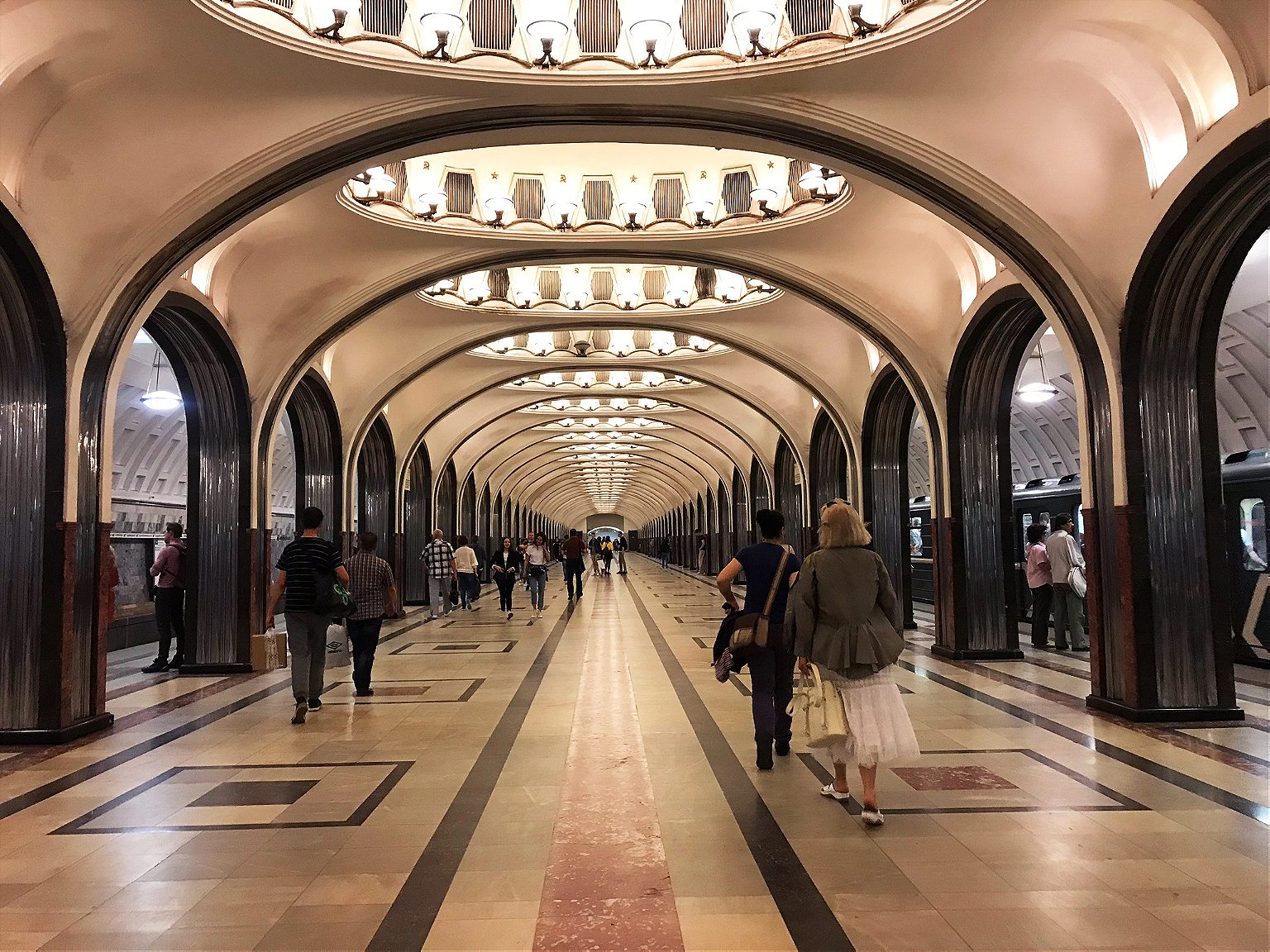
Take the 3/Green line one station to:
2. Belorusskaya. Opened in 1952, named after the connected Belarussky Rail Terminal, which runs trains between Moscow and Belarus. This is a light marble affair with a white, cake-like ceiling, lined with Belorussian patterns and 12 Florentine ceiling mosaics depicting life in Belarussia when it was built.
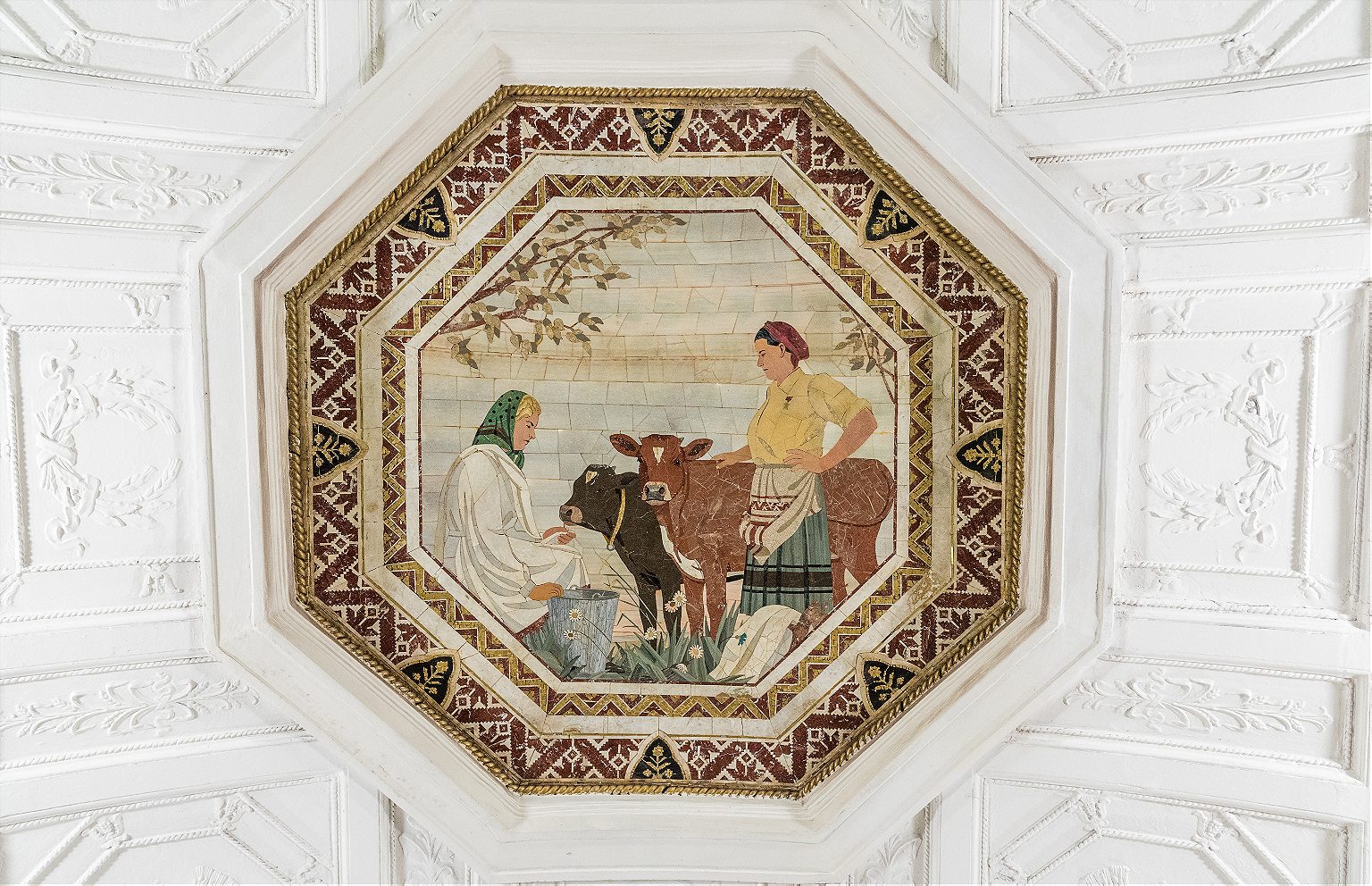
Transfer onto the 1/Brown line. Then, one stop (clockwise) t o:
3. Novoslobodskaya. This station was designed around the stained-glass panels, which were made in Latvia, because Alexey Dushkin, the Soviet starchitect who dreamed it up (and also designed Mayakovskaya station) couldn’t find the glass and craft locally. The stained glass is the same used for Riga’s Cathedral, and the panels feature plants, flowers, members of the Soviet intelligentsia (musician, artist, architect) and geometric shapes.

Go two stops east on the 1/Circle line to:
4. Komsomolskaya. Named after the Komsomol, or the Young Communist League, this might just be peak Stalin Metro style. Underneath the hub for three regional railways, it was intended to be a grand gateway to Moscow and is today its busiest station. It has chandeliers; a yellow ceiling with Baroque embellishments; and in the main hall, a colossal red star overlaid on golden, shimmering tiles. Designer Alexey Shchusev designed it as an homage to the speech Stalin gave at Red Square on Nov. 7, 1941, in which he invoked Russia’s illustrious military leaders as a pep talk to Soviet soldiers through the first catastrophic year of the war. The station’s eight large mosaics are of the leaders referenced in the speech, such as Alexander Nevsky, a 13th-century prince and military commander who bested German and Swedish invading armies.
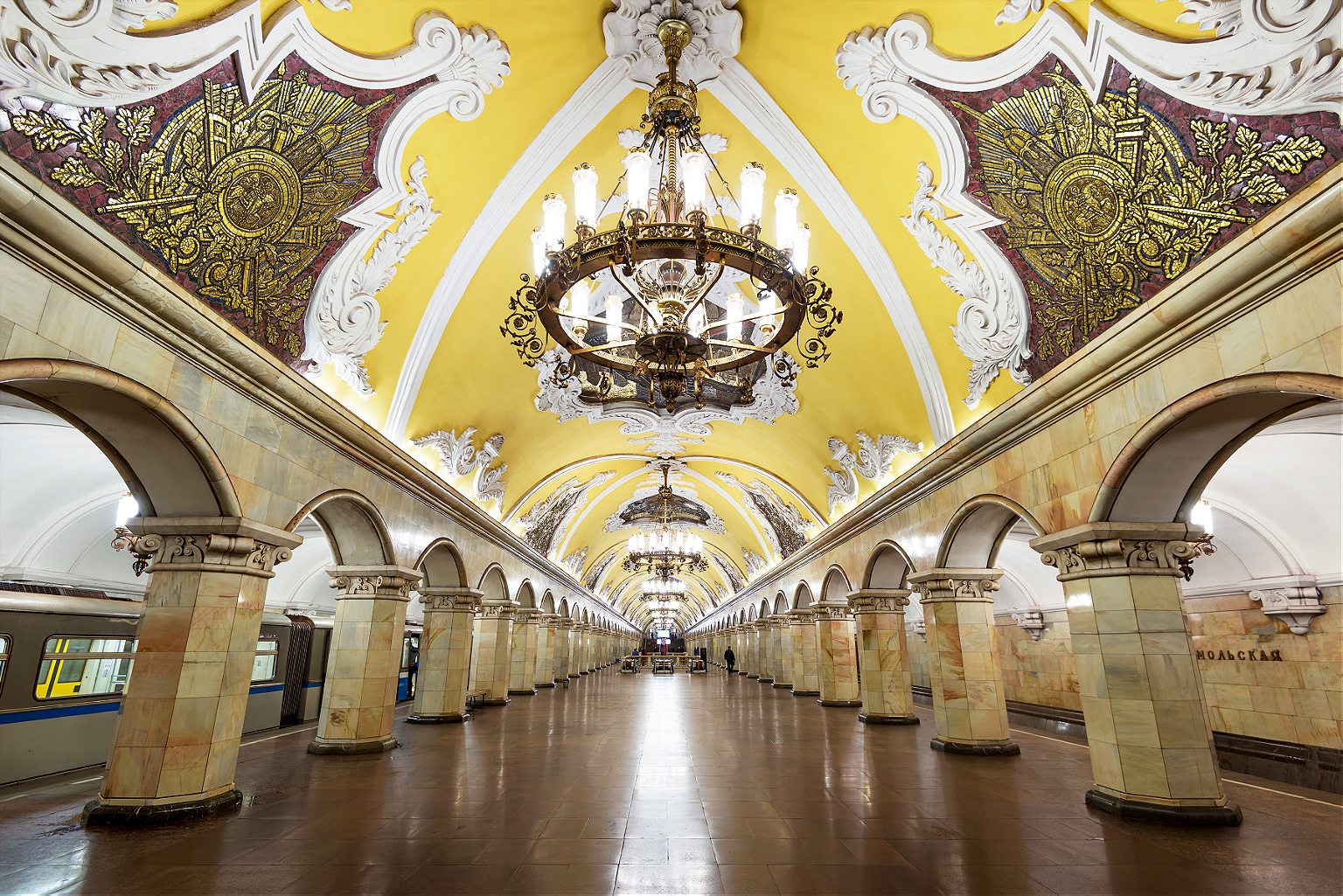
One more stop clockwise to Kurskaya station, and change onto the 3/Blue line, and go one stop to:
5. Baumanskaya. Opened in 1944. Named for the Bolshevik Revolutionary Nikolai Bauman , whose monument and namesake district are aboveground here. Though he seemed like a nasty piece of work (he apparently once publicly mocked a woman he had impregnated, who later hung herself), he became a Revolutionary martyr when he was killed in 1905 in a skirmish with a monarchist, who hit him on the head with part of a steel pipe. The station is in Art Deco style with atmospherically dim lighting, and a series of bronze sculptures of soldiers and homefront heroes during the War. At one end, there is a large mosaic portrait of Lenin.
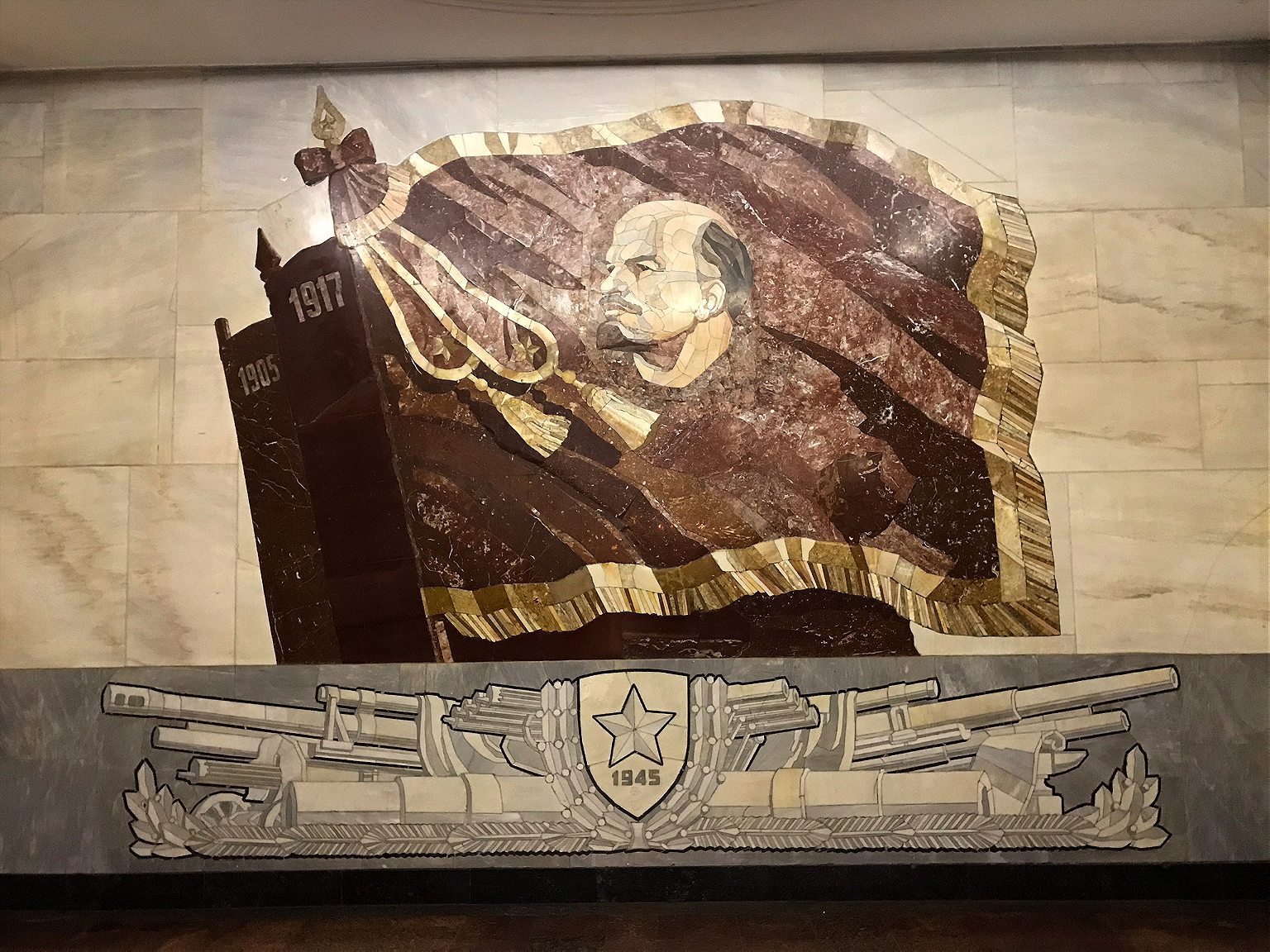
Stay on that train direction one more east to:
6. Elektrozavodskaya. As you may have guessed from the name, this station is the Metro’s tribute to all thing electrical, built in 1944 and named after a nearby lightbulb factory. It has marble bas-relief sculptures of important figures in electrical engineering, and others illustrating the Soviet Union’s war-time struggles at home. The ceiling’s recurring rows of circular lamps give the station’s main tunnel a comforting glow, and a pleasing visual effect.
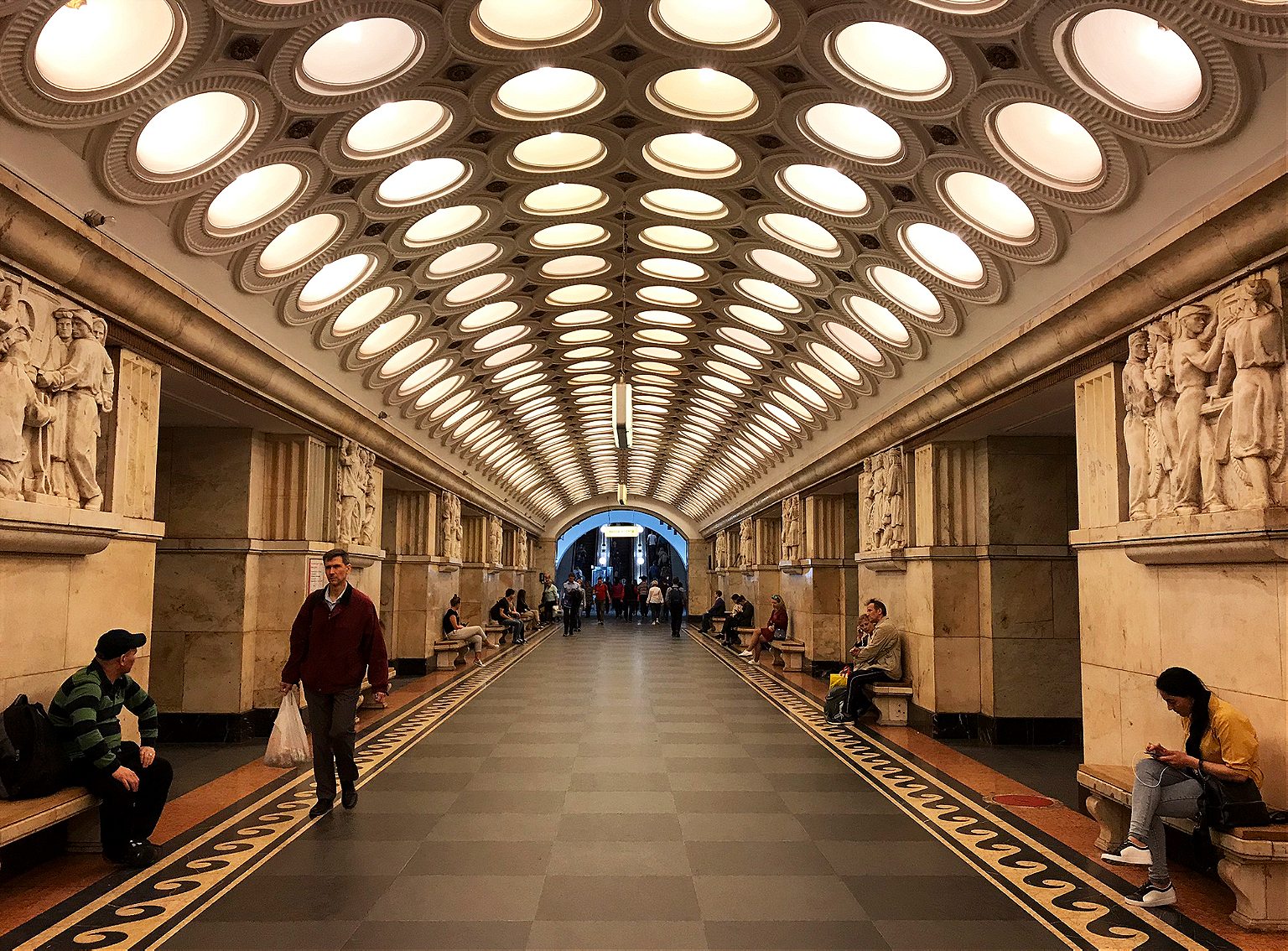
Double back two stops to Kurskaya station , and change back to the 1/Circle line. Sit tight for six stations to:
7. Kiyevskaya. This was the last station on the Circle line to be built, in 1954, completed under Nikita Khrushchev’ s guidance, as a tribute to his homeland, Ukraine. Its three large station halls feature images celebrating Ukraine’s contributions to the Soviet Union and Russo-Ukrainian unity, depicting musicians, textile-working, soldiers, farmers. (One hall has frescoes, one mosaics, and the third murals.) Shortly after it was completed, Khrushchev condemned the architectural excesses and unnecessary luxury of the Stalin era, which ushered in an epoch of more austere Metro stations. According to the legend at least, he timed the policy in part to ensure no Metro station built after could outshine Kiyevskaya.
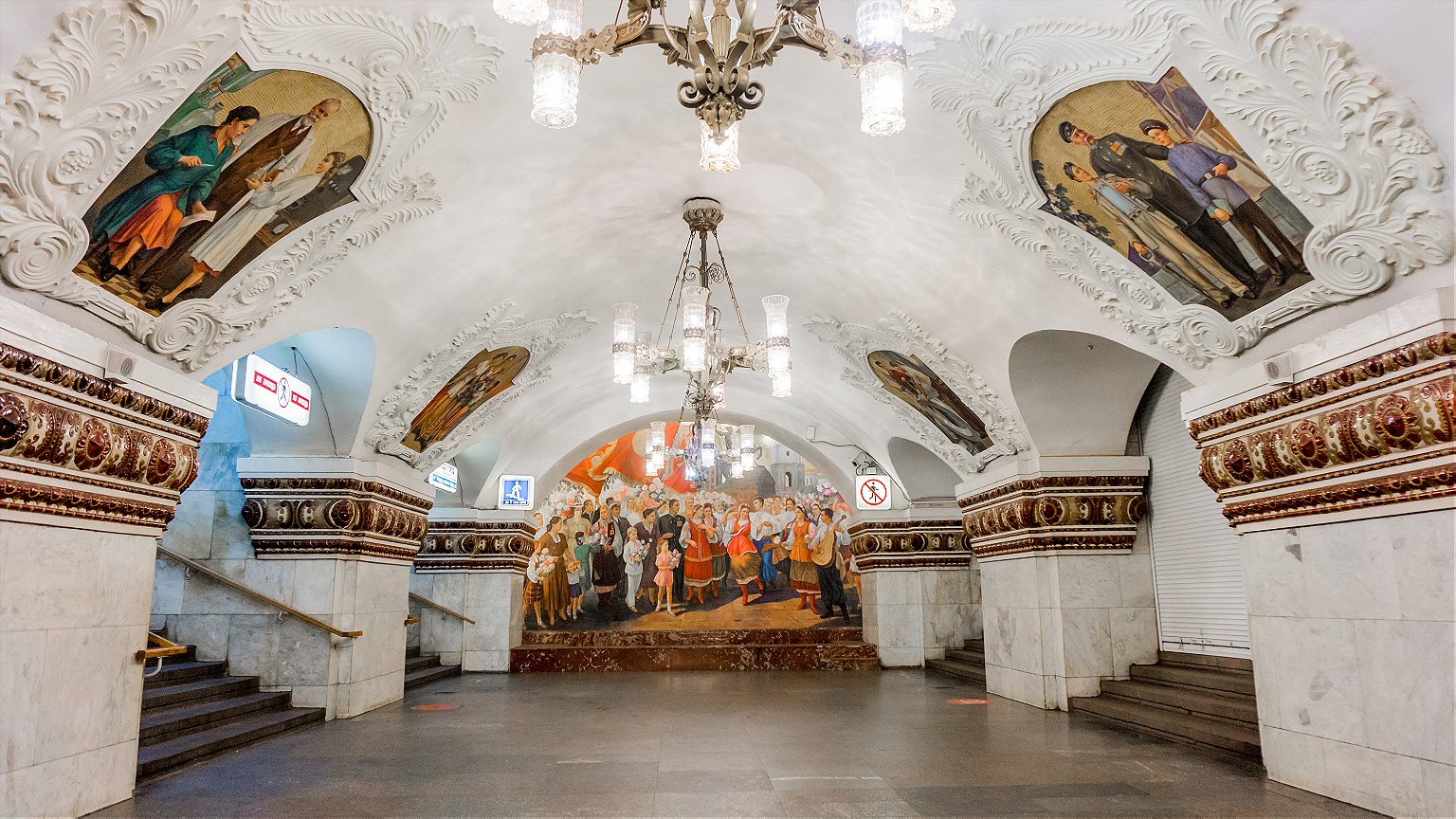
Change to the 3/Blue line and go one stop west.
8. Park Pobedy. This is the deepest station on the Metro, with one of the world’s longest escalators, at 413 feet. If you stand still, the escalator ride to the surface takes about three minutes .) Opened in 2003 at Victory Park, the station celebrates two of Russia’s great military victories. Each end has a mural by Georgian artist Zurab Tsereteli, who also designed the “ Good Defeats Evil ” statue at the UN headquarters in New York. One mural depicts the Russian generals’ victory over the French in 1812 and the other, the German surrender of 1945. The latter is particularly striking; equal parts dramatic, triumphant, and gruesome. To the side, Red Army soldiers trample Nazi flags, and if you look closely there’s some blood spatter among the detail. Still, the biggest impressions here are the marble shine of the chessboard floor pattern and the pleasingly geometric effect if you view from one end to the other.

Keep going one more stop west to:
9. Slavyansky Bulvar. One of the Metro’s youngest stations, it opened in 2008. With far higher ceilings than many other stations—which tend to have covered central tunnels on the platforms—it has an “open-air” feel (or as close to it as you can get, one hundred feet under). It’s an homage to French architect Hector Guimard, he of the Art Nouveau entrances for the Paris M é tro, and that’s precisely what this looks like: A Moscow homage to the Paris M é tro, with an additional forest theme. A Cyrillic twist on Guimard’s Metro-style lettering over the benches, furnished with t rees and branch motifs, including creeping vines as towering lamp-posts.
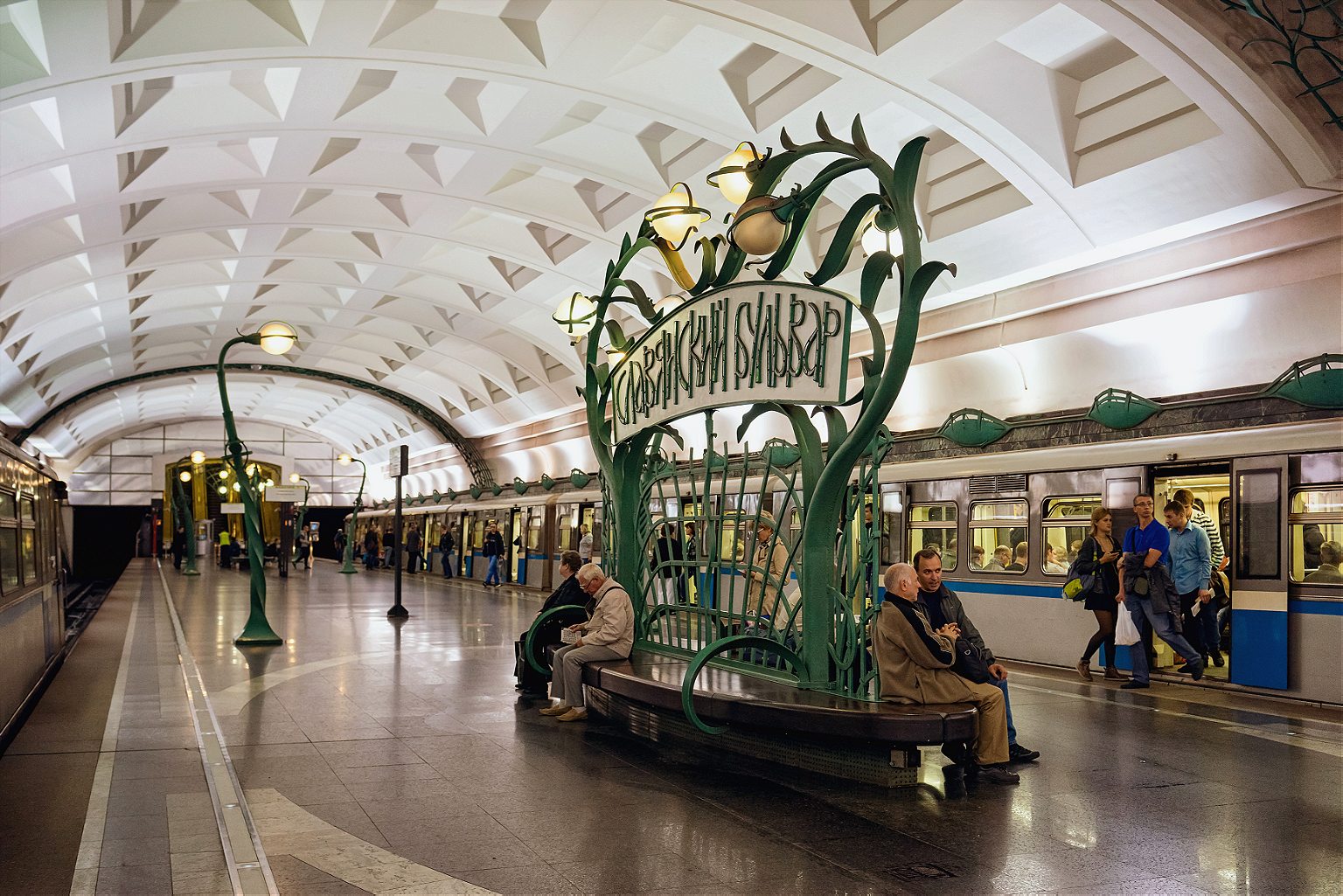
Stay on the 3/Blue line and double back four stations to:
10. Arbatskaya. Its first iteration, Arbatskaya-Smolenskaya station, was damaged by German bombs in 1941. It was rebuilt in 1953, and designed to double as a bomb shelter in the event of nuclear war, although unusually for stations built in the post-war phase, this one doesn’t have a war theme. It may also be one of the system’s most elegant: Baroque, but toned down a little, with red marble floors and white ceilings with gilded bronze c handeliers.
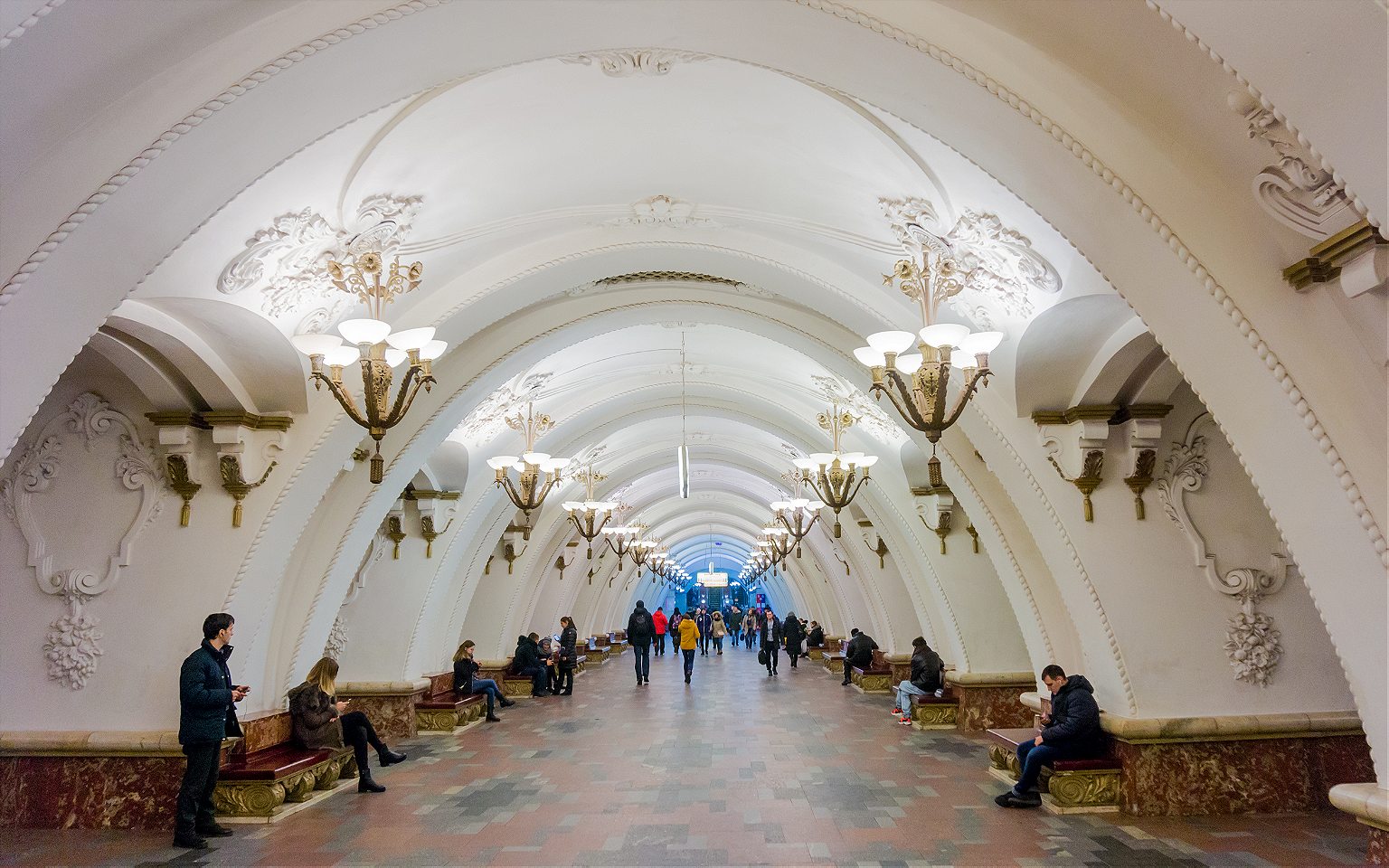
Jump back on the 3/Blue line in the same direction and take it one more stop:
11. Ploshchad Revolyutsii (Revolution Square). Opened in 1938, and serving Red Square and the Kremlin . Its renowned central hall has marble columns flanked by 76 bronze statues of Soviet heroes: soldiers, students, farmers, athletes, writers, parents. Some of these statues’ appendages have a yellow sheen from decades of Moscow’s commuters rubbing them for good luck. Among the most popular for a superstitious walk-by rub: the snout of a frontier guard’s dog, a soldier’s gun (where the touch of millions of human hands have tapered the gun barrel into a fine, pointy blade), a baby’s foot, and a woman’s knee. (A brass rooster also sports the telltale gold sheen, though I am told that rubbing the rooster is thought to bring bad luck. )
Now take the escalator up, and get some fresh air.
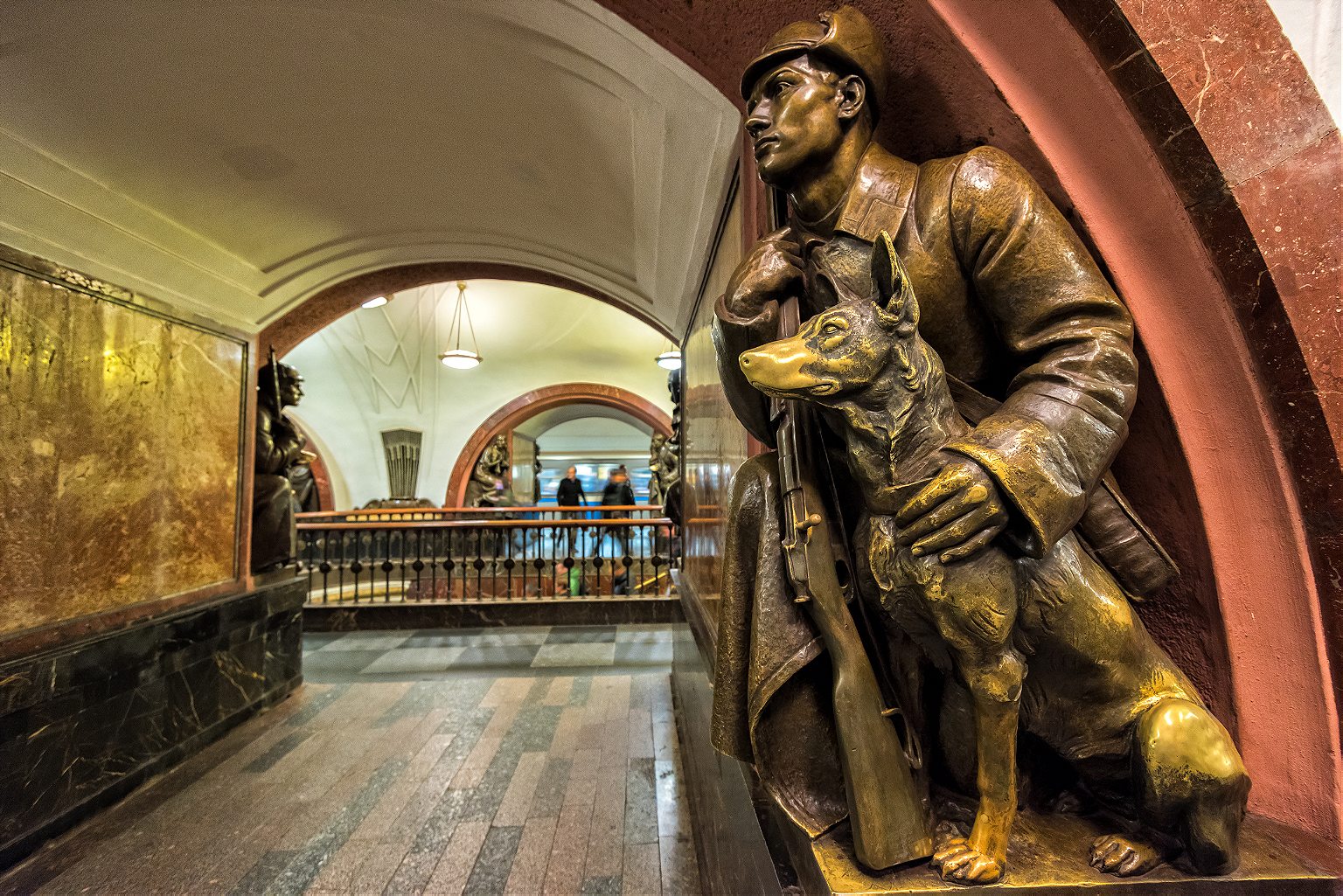
R&K Insider
Join our newsletter to get exclusives on where our correspondents travel, what they eat, where they stay. Free to sign up.
21 Things to Know Before You Go to Moscow
Featured city guides.

IMAGES
VIDEO
COMMENTS
ap-leh lah po-lees. Fire! Au Feu! au fur. **There are a few places that use unique words for the numbers 70 ( septante) and 90 ( nonante ), such as Belgium and Switzerland. With the numbers 80 to 89, combine the number 4, the number 20, and the ones. For example, in French 80 is four 20s, 81 is four 20s plus 1, and so forth.
Discover the key to unlocking a more immersive travel experience in France with our complete guide, featuring over 30 basic French phrases for travel. Whether it's greeting locals, navigating your way through picturesque streets, ordering culinary delights, or shopping for unique souvenirs. Perfect for first-time visitors or seasoned travelers ...
Travelers to France and other countries where French is spoken will want to learn a few basic words in the local language. It will help you on your trip (le voyage) as you make your way around and speak to people. In this French vocabulary lesson, you will learn how to ask for directions, navigate your transportation options and rent a car ...
These useful French travel phrases will give any tourist the trip of a lifetime! From asking, "Où est l'hôtel ? (Where is the hotel?)" and much more, this post is full of French for travelers. Bookmark or print this handy list of 108 French phrases, conveniently organized by theme, like directions, dining and beyond.
Merci beaucoup - "Thanks a lot". And of course, don't forget to say thank you! The French word for "thank you" is merci. Or you can make it stronger by saying merci beaucoup - "thanks very much". Use merci in all the same situations you'd say "thank you" in English.
Greetings and general phrases. There is quite a lot of different French greetings but the most basic is the Bonjour. If there is only one word to remember on your trip, this is the one. French phrases. English translation. Bonjour. Good day, Hello. Salut. Hi, hello, goodbye.
Learn French for travel. It is an excellent idea to learn the French language before traveling because it is widely spoken, especially in France and other French-speaking nations in Europe, Africa, and Canada. A few basic French phrases will enable you to interact with locals, find your way around foreign locales, and make the most of your trip.
French Travel Phrases. The most essential French travel phrases are Bonjour (hello), au revoir (goodbye), Où est? (Where is), C'est combien? (How much is it?) and l'addition s'il vous plaît (the check, please). This page covers over 60+ useful words and phrases which you can use on a trip to France.
French is a widely spoken language that is popular among travelers and tourists. Whether you're planning a trip to France or any other French-speaking country, learning a few key phrases can greatly enhance your travel experience. This article presents the top 50 common French phrases that every traveler should know.
Summing Up: Mastering French for Your Next Travel. This guide to French travel phrases and French pronunciation is a great starting point for your French learning journey. While you are learning French, try to use all of the available learning resources, such as TV and movies, music and apps. The more you engage with native French content, the ...
Days 4-6: Practice Ordering A Meal! Ratatouille, bœuf bourguignon, crêpes, quiche … the list goes on! France is a veritable wonderland of food and flavor, and you'll most likely be spending a fair amount of time in restaurants and cafés. That being said, you should plan to brush up on some useful words and phrases for ordering a meal.
In France, politeness is not just a gesture—it's a way of life. By understanding and using basic French phrases for travel, such as "S'il vous plaît" and "Merci," you can navigate social interactions with grace. Embrace the cultural nuances of courtesy that enrich every conversation. French Phrase. English Translation. Merci.
Airport. If there's anything worse than having to spend time at the airport, it's having to spend time at the airport when you don't speak the local language. Sure, most airport employees speak another language or two, but you'll still be better off if you have these key French words and phrases in your pocket. Bon voyage !
These basic words and phrases are the first level of interactions while traveling, and probably the words you will use the most in everyday conversations. So pay special attention to them! English. French. Pronunciation. Hello / good morning. Bonjour. Play.
This is your ultimate compilation to learn how to travel in France! And if you want to study more, click here https://goo.gl/MexUPk and get the best resour...
Traveling to France or a French-speaking country? Learn these Top 10 French phrases for travellers so you can greet people, order food and travel with confid...
I lived in France for 13 years and have been teaching French to adults ever since. Learning travel French will add depth, fun, and rich memories to your France trips. I found from experience that knowing some French paves the way to a better trip: a less "lost" feeling as well as warmer relationships with the locals.
Bonjour - Hello. The phrase bonjour is the most common and widely used greeting in French. It sets a positive tone for your conversation. You can use this greeting all day. Bonsoir - Good evening. Bonne soirée - Have a good evening. Bonsoir is used in the evenings, from around 6 pm onward as a greeting.
French Translation of "TRAVEL" | The official Collins English-French Dictionary online. Over 100,000 French translations of English words and phrases.
Speaking another language is always helpful, especially if you love to travel. And French, commonly thought of as one of the most beautiful in the world, is also more useful than you might realize ...
The Palaces: A Distinctly French High Luxury. Expect: Butler service, high quality spas, and sumptuous spare-no-expense design. The government of France itself bestows an official Palace designation, with French tourism officials judging the most luxurious hotels in France to ensure they provide particular amenities and services (a spa, a multilingual check-in desk, a concierge service, etc ...
On September 14, the French entered a deserted Moscow. All but a few thousand of the city's 275,000 people were gone. Napoleon retired to a house on the outskirts of the city for the night, but ...
The French foreign ministry on Friday advised French citizens against travelling to Iran, Lebanon, Israel, and the Palestinian territories amid Iran's threats against its regional adversary.
In its strong warning on Friday, the French foreign ministry advised citizens against travelling to Iran, Lebanon, Israel and the Palestinian territories and said French civil servants were banned ...
The second culinary journey, A Taste of Provence and the French Riviera will take place in Marseille and Nice from Sept. 29 to Oct. 6. Guests will try their hand at preparing classic Bouillabaisse ...
Forbes Travel Guide caught up with France as the Fab Five shoots season nine in Las Vegas, and the Emmy winner revealed that he's working on his first scripted role.He couldn't say more about ...
France has issued new warnings for its citizens and government employees in the Middle East amid fears that Iran is planning on launching an imminent attack against Israel. While the French governm…
So to continue my travel itinerary for one week in Moscow I decided to climb the fourth highest TV tower in the world. This iconic 540m tower is a fixture of the skyline. ... 12 Stunning National Parks and Regional Parks In France. If my travel itinerary for one week in Moscow was a family tree, Tsaritsyno Park would probably be the crazy uncle ...
Moscow, the European metropolis on Asia's western flank, has always been a canvas for competing cultures. Its cuisine is no different. The ancient baselines of winter grains, root vegetables, and cabbage acquired scaffolding from both directions: eastern horsemen brought meat on sticks, western craftsmen brought pastries, and courtly French chefs came and drowned it all in cream.
The sweet spot for Moscow Metro travel ... One mural depicts the Russian generals' victory over the French in 1812 and the other, the German surrender of 1945. The latter is particularly striking; equal parts dramatic, triumphant, and gruesome. To the side, Red Army soldiers trample Nazi flags, and if you look closely there's some blood ...